|
| O Embaixador Aleksandar Ristic apresentou as cartas credenciais, 22 de maio de 2024. |
|
O Embaixador Aleksandar Ristic apresentou as cartas credenciais ao Presidente da República Federativa do Brasil, Luiz Inácio Lula da Silva.
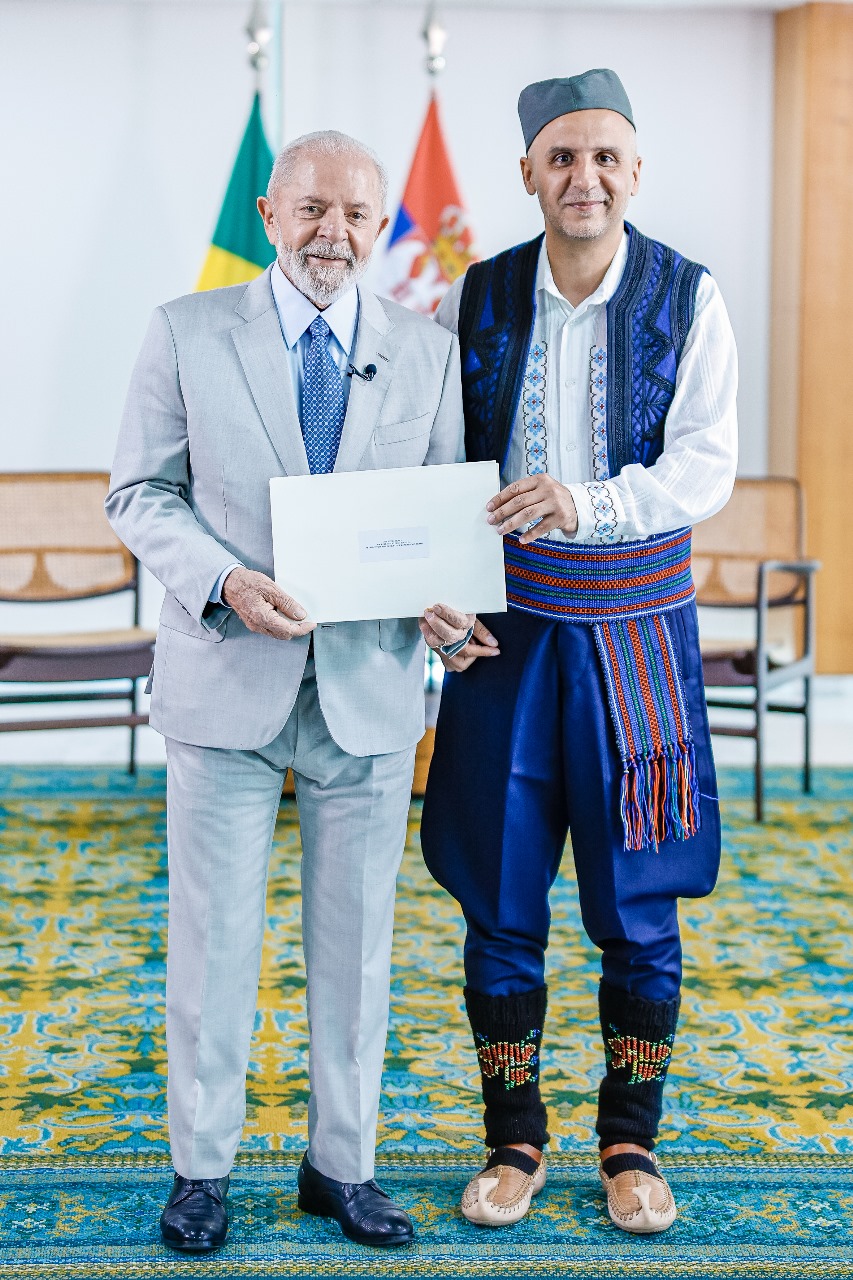
Na conversa após a cerimônia, o presidente Lula transmitiu ao embaixador o interesse do Brasil em desenvolver a cooperação com a Sérvia não apenas no comércio, mas também na ciência, tecnologia e cultura.
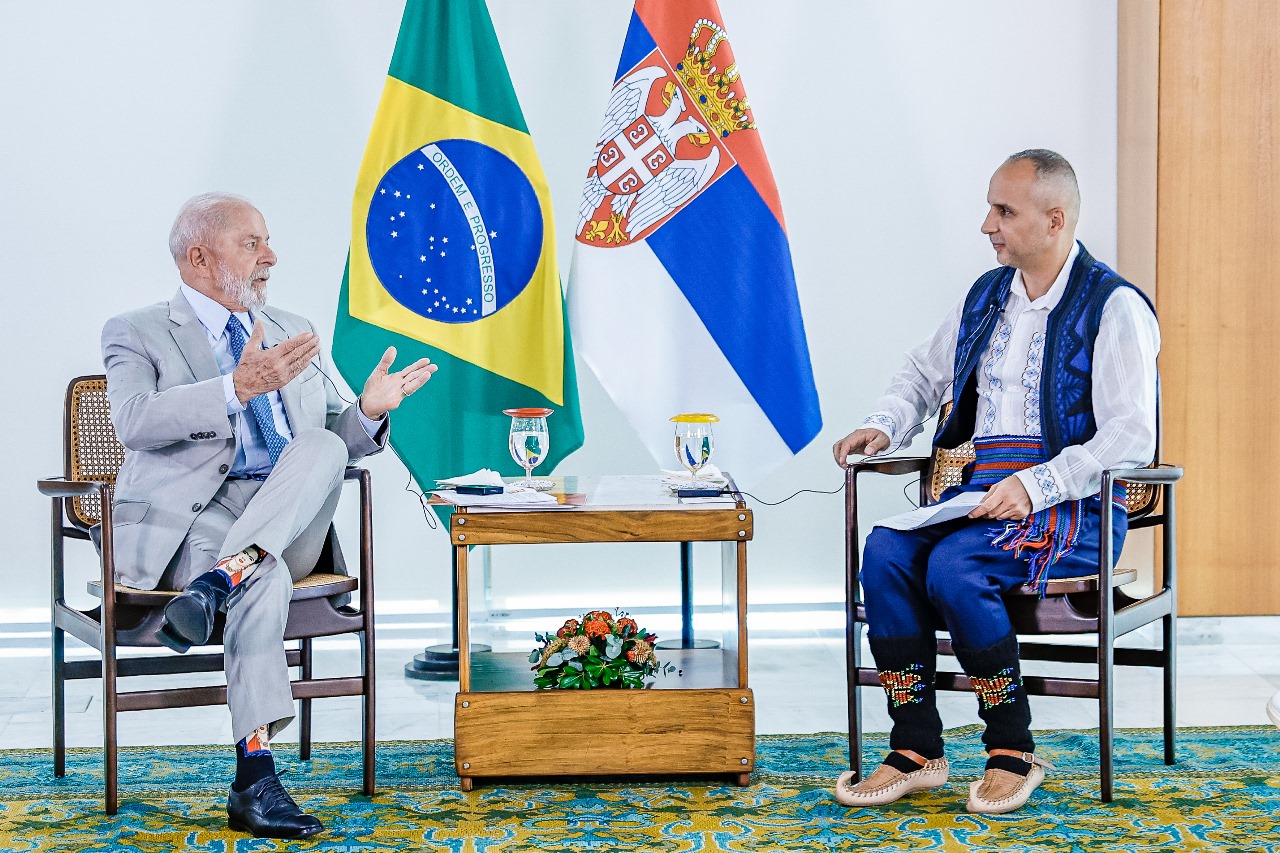
Agradeceu ao povo sérvio e às lideranças pelas suas expressões de solidariedade em relação às inundações que atingiram o estado do Rio Grande do Sul e manifestou interesse na reconstrução que foi realizada na Sérvia após as inundações de 2014, pedindo ajuda e troca de experiências nessa área.
A cerimônia também contou com a presença de Jelena Blažević, conselheira da Embaixada da República da Sérvia no Brasil, e de Dejan Petković, Cônsul Honorário da Sérvia no Rio de Janeiro, famoso jogador de futebol, cuja presença atraiu a atenção da mídia brasileira e causou reações positivas e alta visibilidade do próprio evento e da República da Sérvia nas redes sociais.
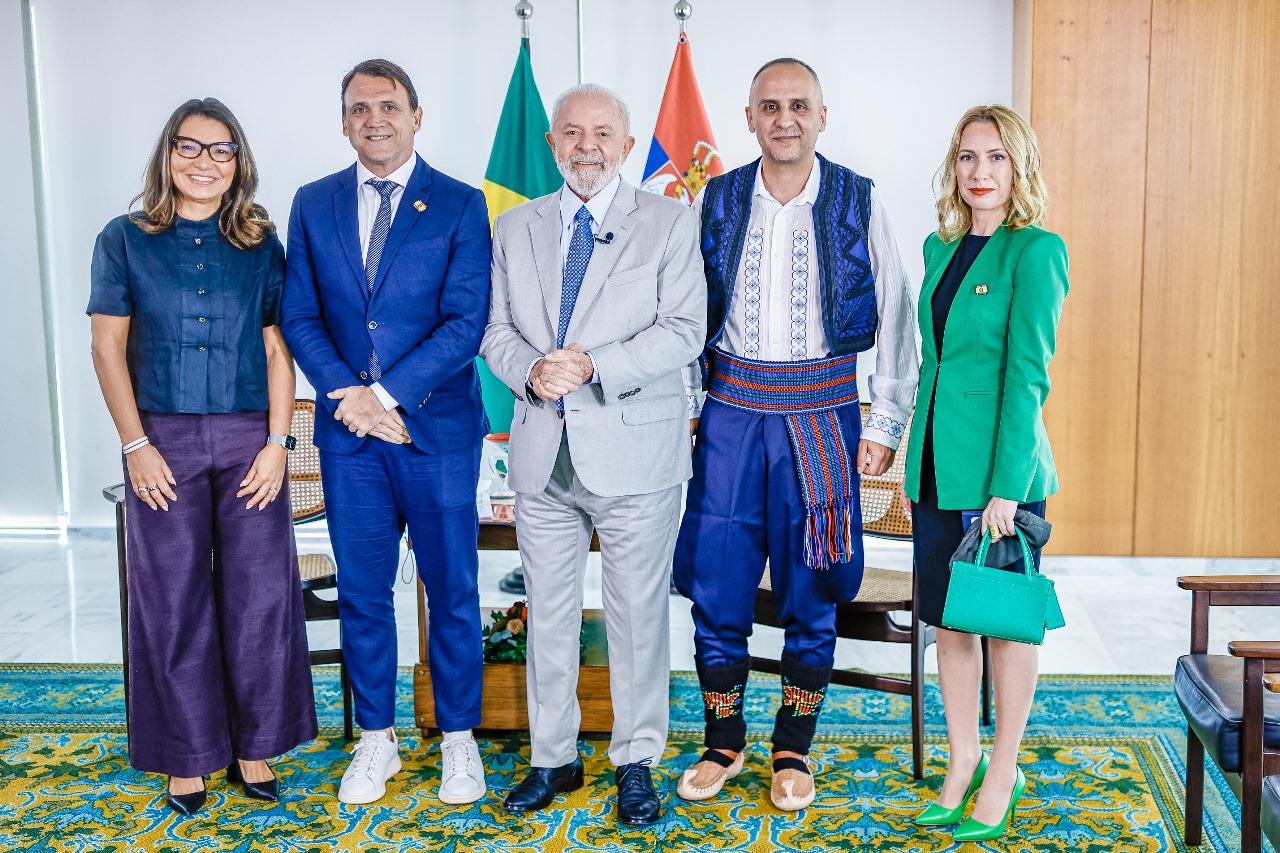 |
|
|
| Ajuda ao Estado do Rio Grande do Sul, atingido por inundações |
|
A Embaixada recebeu a visita no dia 17 de maio de 2024 de José Henrique Medeiros Pires, Secretário Executivo da Representação do Estado do Rio Grande do Sul em Brasília (cada Estado da federação brasileira tem seu próprio escritório na capital) e Fabio Paiva, Coordenador de Comunicação da Representação.
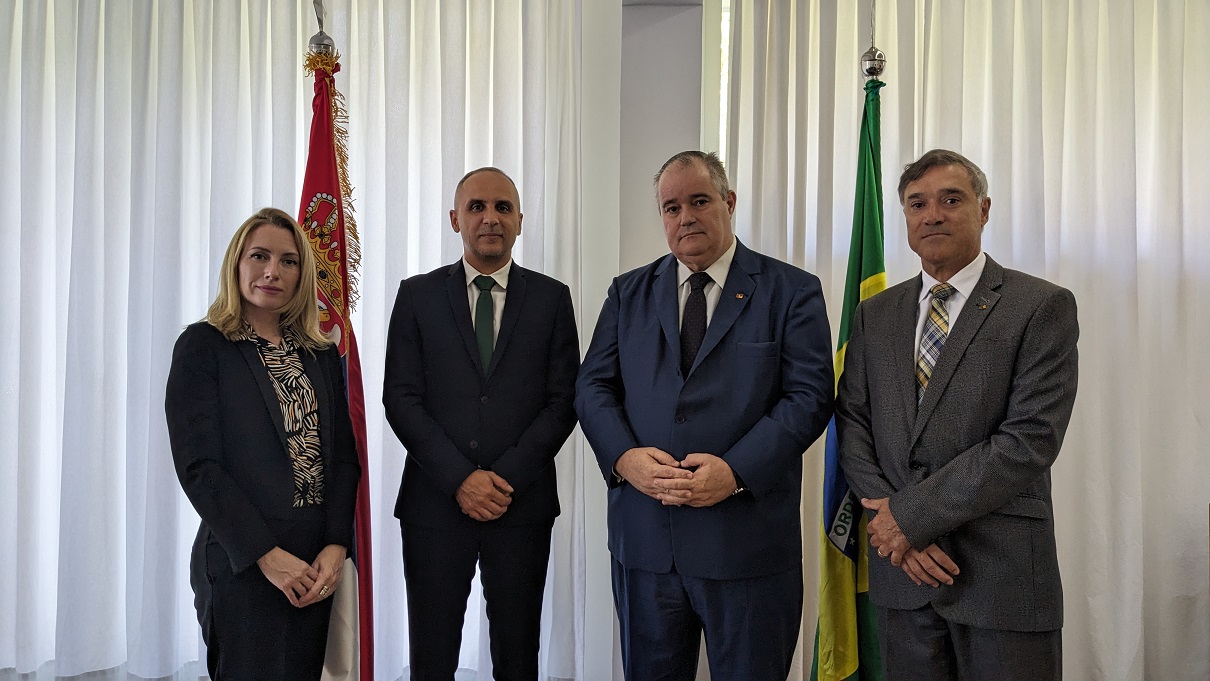
Pires informou sobre a difícil situação humanitária após as enchentes, as maiores desde 1941, no Rio Grande do Sul (onde o inverno está chegando e a população está sem teto, roupas, sapatos, comida e água) e o enorme dano material (a infra-estrutura foi danificada e as colheitas foram completamente destruídas).
A primeira fase da resposta à catástrofe consistiu em salvar vidas, a segunda fase analisa como preservar as propriedades, enquanto a terceira deveria ser a reconstrução.
A reconstrução de edifícios, estradas e pontes será uma tarefa difícil, e a revitalização dos terrenos agrícolas (de onde os rios que atravessam grande parte do estado simplesmente levaram a camada mais fértil), numa região que é uma grande produtora de grãos e carne, durará anos.
O embaixador Aleksandar Ristić entregou ao interlocutor um certificado de assistência que a Embaixada, a convite do Governo do Distrito Federal (unidade federativa brasileira que inclui Brasília e seu entorno), doou ao Estado do Rio Grande do Sul.
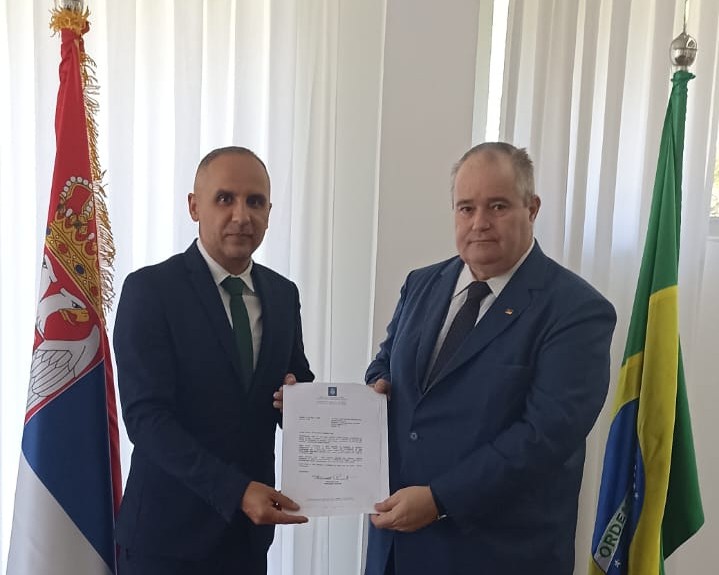
Salientando que, tendo em mente a nossa experiência com as inundações de 2014, compreendemos perfeitamente a situação em que se encontra, transmitimos as mensagens de solidariedade do povo sérvio e de sua liderança com o Brasil e, em particular, com o Rio Grande do Sul (que goza de especial simpatia na Sérvia porque foi em Porto Alegre, capital daquele país, que se disputou o primeiro jogo de futebol da seleção nacional de futebol da Iugoslávia após a suspensão das sanções em 1994).
Pires agradeceu a ajuda e pediu que a Sérvia se envolvesse adicionalmente, entre outras coisas, no plano de troca de experiências na reconstrução das inundações e na sua prevenção.
|
|
|
| Visita de alunos do Ensino Fundamental Escola Classe Natureza – 12 de abril de 2024 |
|
Na visita de alunos do Ensino Fundamental Escola Classe Natureza da Região Administrativa do Paranoá, Distrito Federal, na Embaixada da Sérvia em Brasília, foi inaugurado este ano o programa do governo do Distrito Federal denominado “Portas Abertas”.
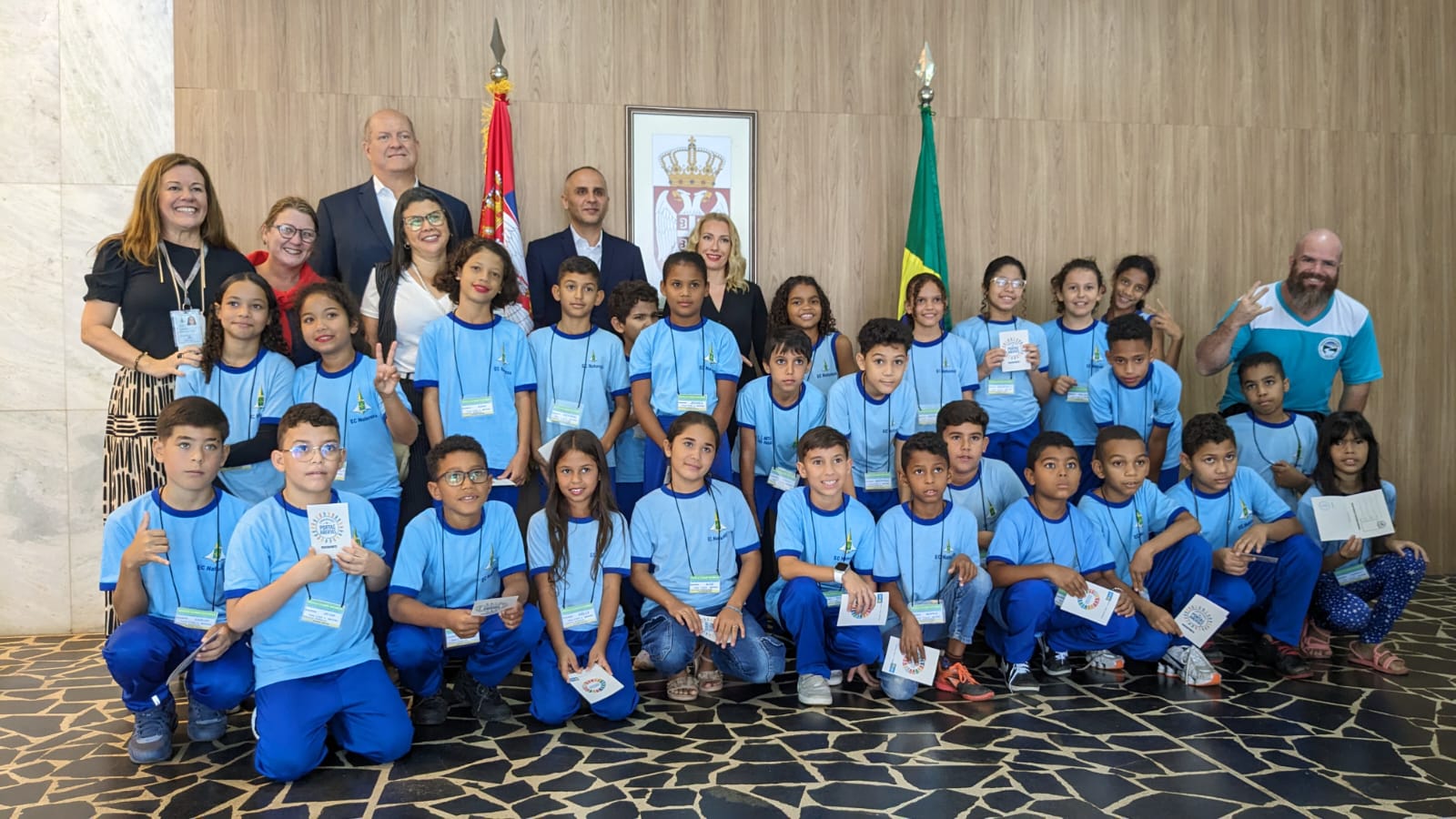
Em cooperação com a Secretaria de Relações Internacionais, com o apoio da Secretaria de Educação, o Embaixador Aleksandar Ristić e a conselheira Jelena Blažević levaram os alunos da Escola Classe Natureza em uma viagem pela Sérvia.
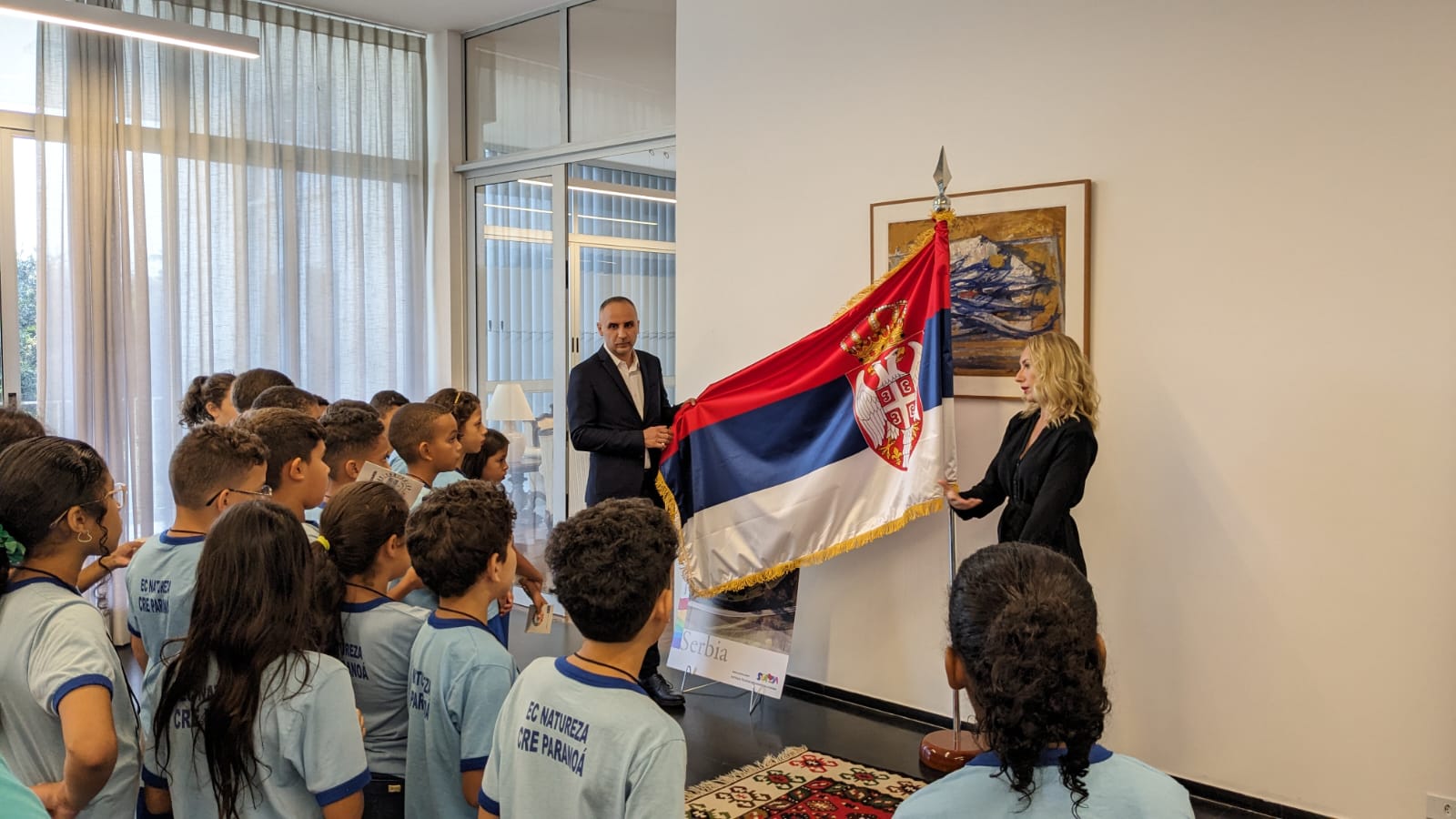
Durante a visita à Embaixada, os alunos, com idades entre os 9 e os 10 anos, conheceram os costumes tradicionais sérvios, o nosso patrimônio cultural, histórico e religioso, e tiveram a oportunidade de descobrir os segredos do alfabeto cirílico e aprender a escrever o seu nome na língua sérvia.
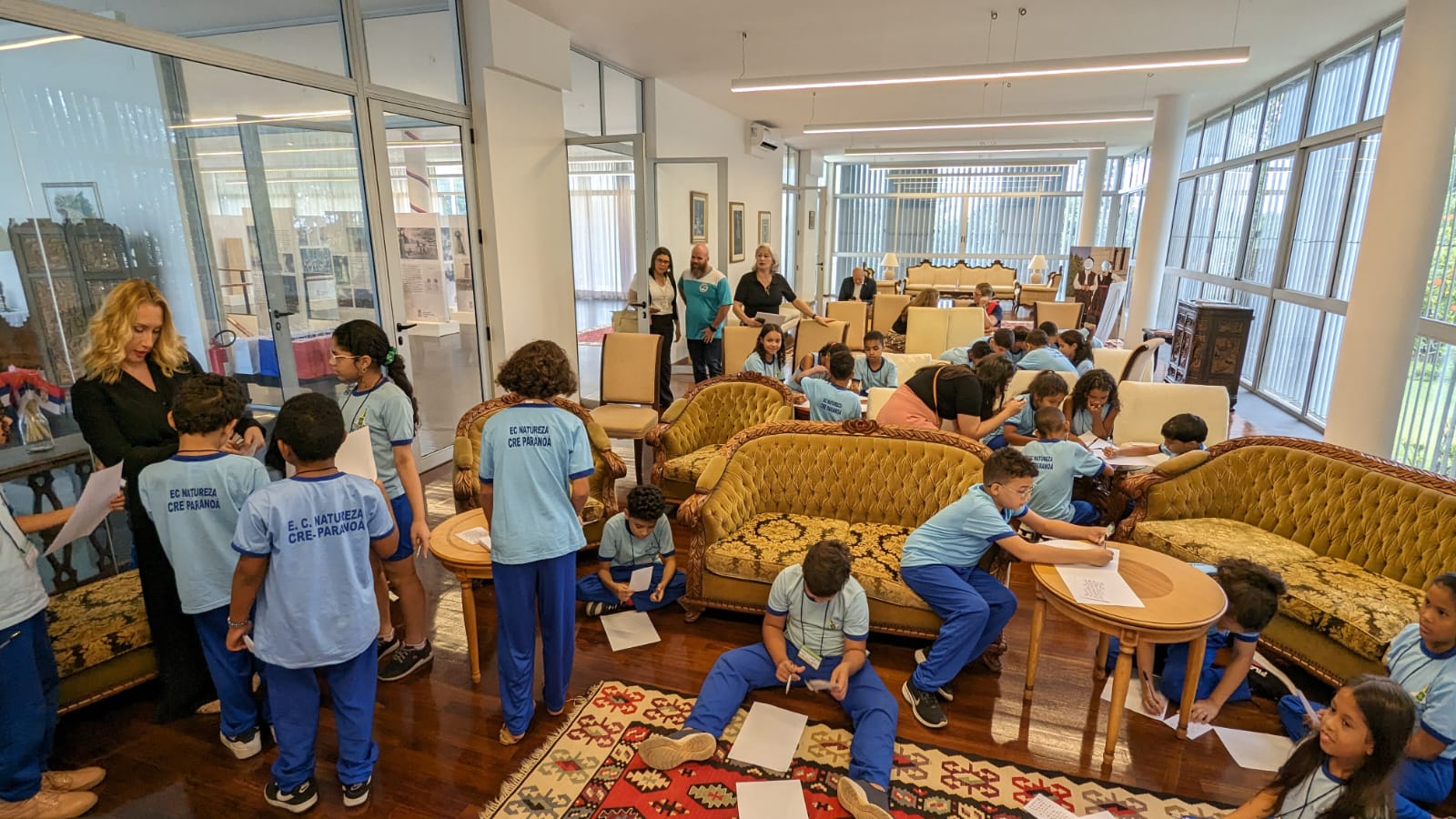
Falou-se também dos sucessos dos atletas sérvios, tanto no mundo quanto de suas atividades no Brasil.
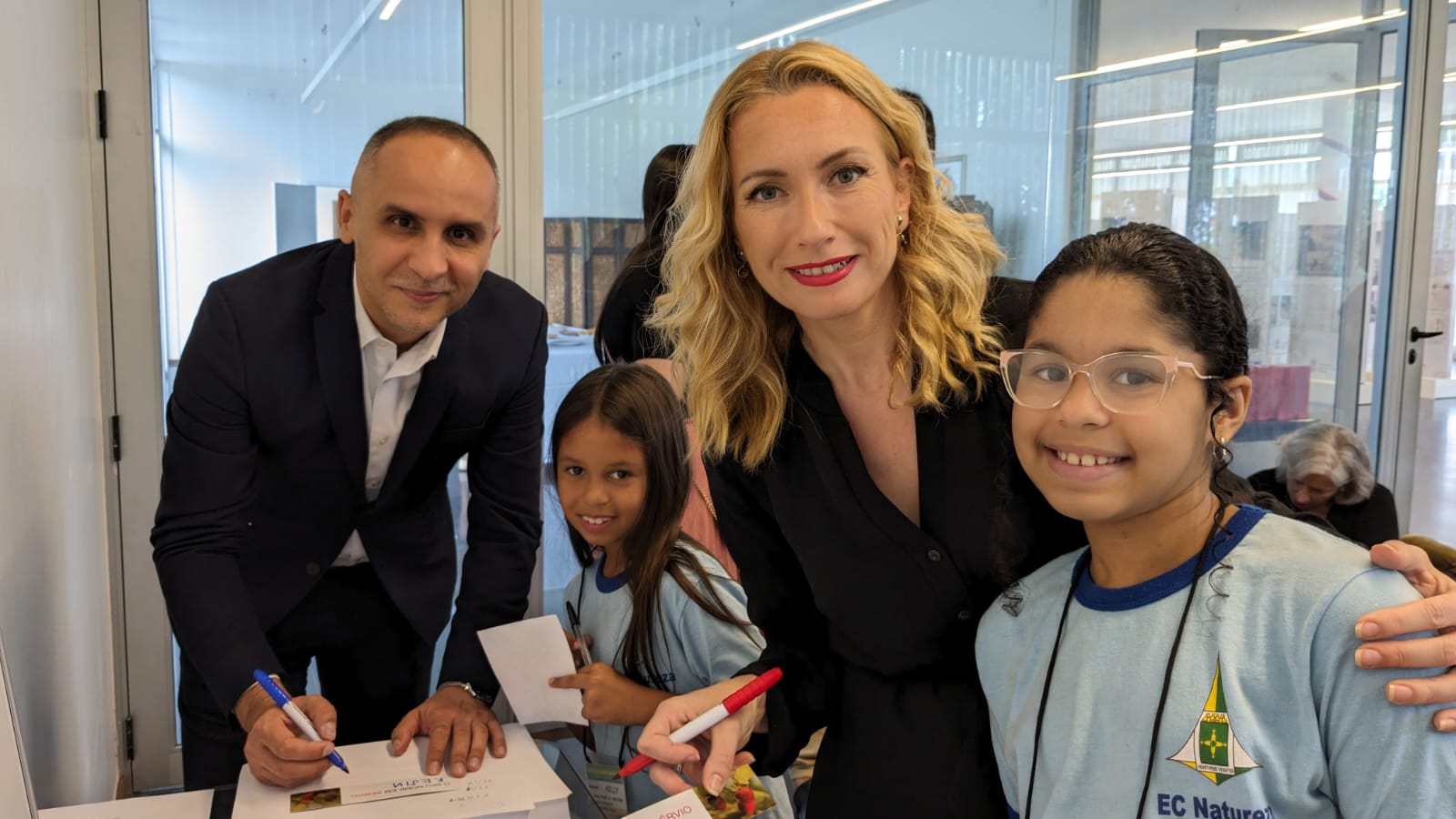
O lanche da Embaixada, feito segundo receitas tradicionais sérvias, também foi indispensável.
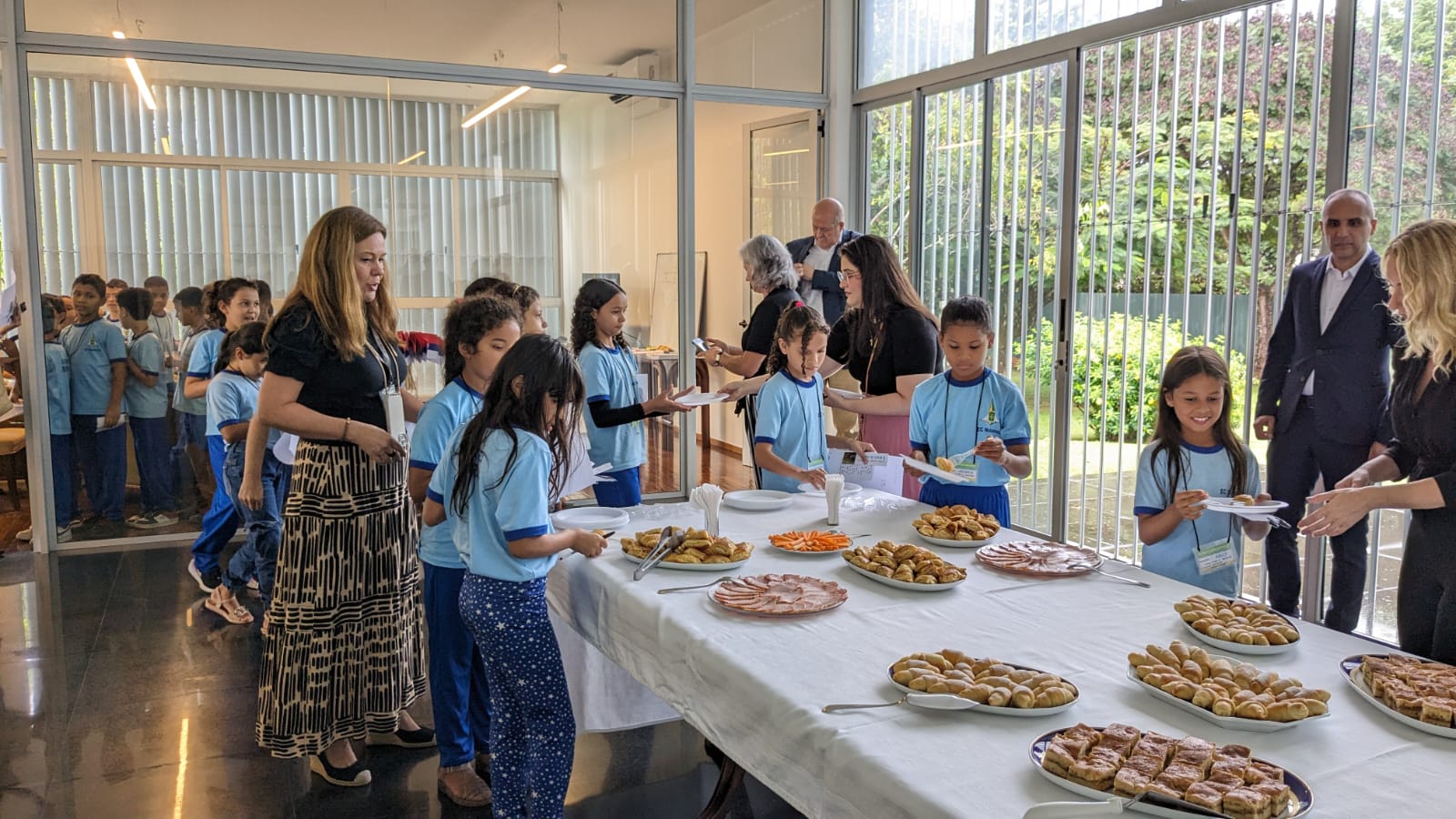
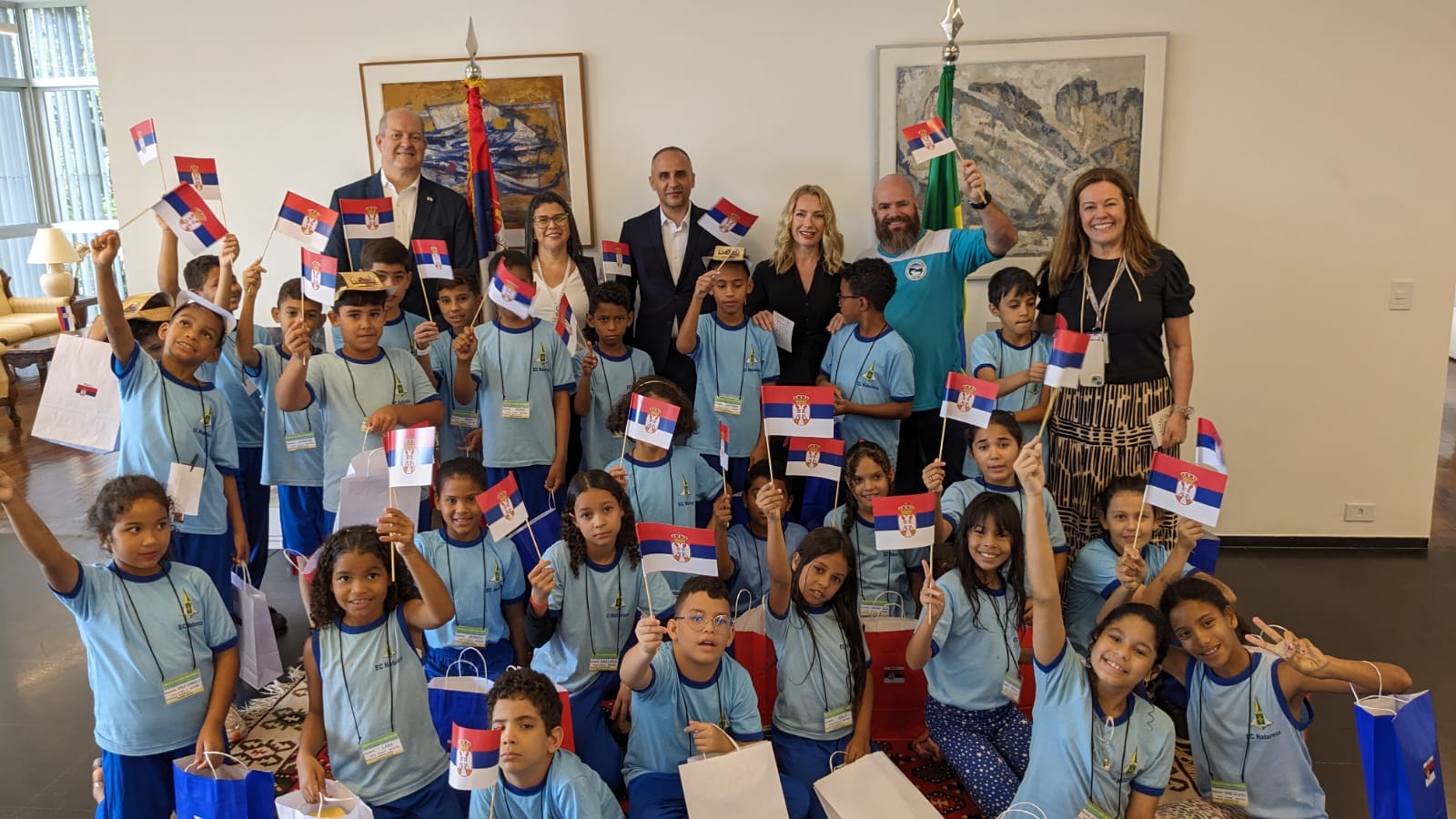
A visita foi noticiada por diversos meios de comunicação locais, que, entre outras coisas, transmitiram as impressões das crianças durante o evento (Agencia Brasilia, Brasilia in Foco, O Mundo diplomatico, Brasilian news, Portal 10, Foco na politica, Jornal A voz do cidadão, Jornal Taguatinga, Reporter Malu).
Como experiência particularmente interessante, os alunos enfatizaram a escrita em cirílico. |
|
|
| COMEMORAÇÃO DO DIA DO ESTADO DA SÉRVIA |
|
No dia 22 de fevereiro de 2024, foi realizada uma recepção na Embaixada da República da Sérvia em Brasília por ocasião do Dia do Estado da Sérvia.
A primeira embaixada inaugurada na nova capital brasileira foi a então embaixada da ex-Iugoslávia, que tem como sucessora a Sérvia.
O recém designado Embaixador Aleksandar Ristić, que chegou ao Brasil há três semanas, e sua vice, Jelena Blažević, abriram as portas da reformada Embaixada e organizaram um evento para amigos da Sérvia.
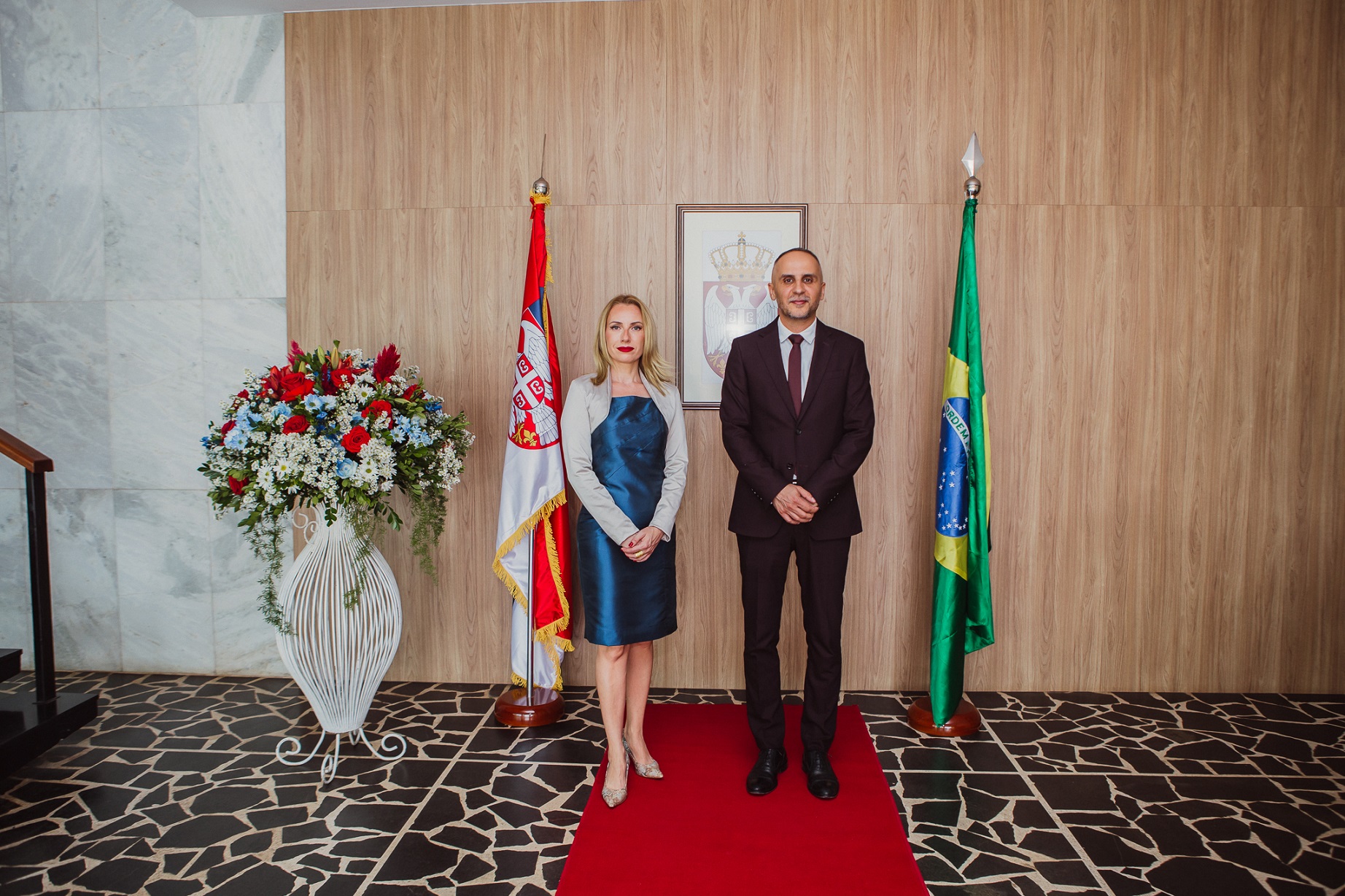
A recepção contou com a presença de representantes do Congresso Nacional, do Itamaraty, do Governo do Distrito Federal e de outros estados da federação, da Polícia Federal, embaixadores e diplomatas, empresários, analistas, além da Arquidiocese Ortodoxa Antioquina de São Paulo e Todo o Brasil, bem como numerosos jornalistas e membros da diáspora sérvia.
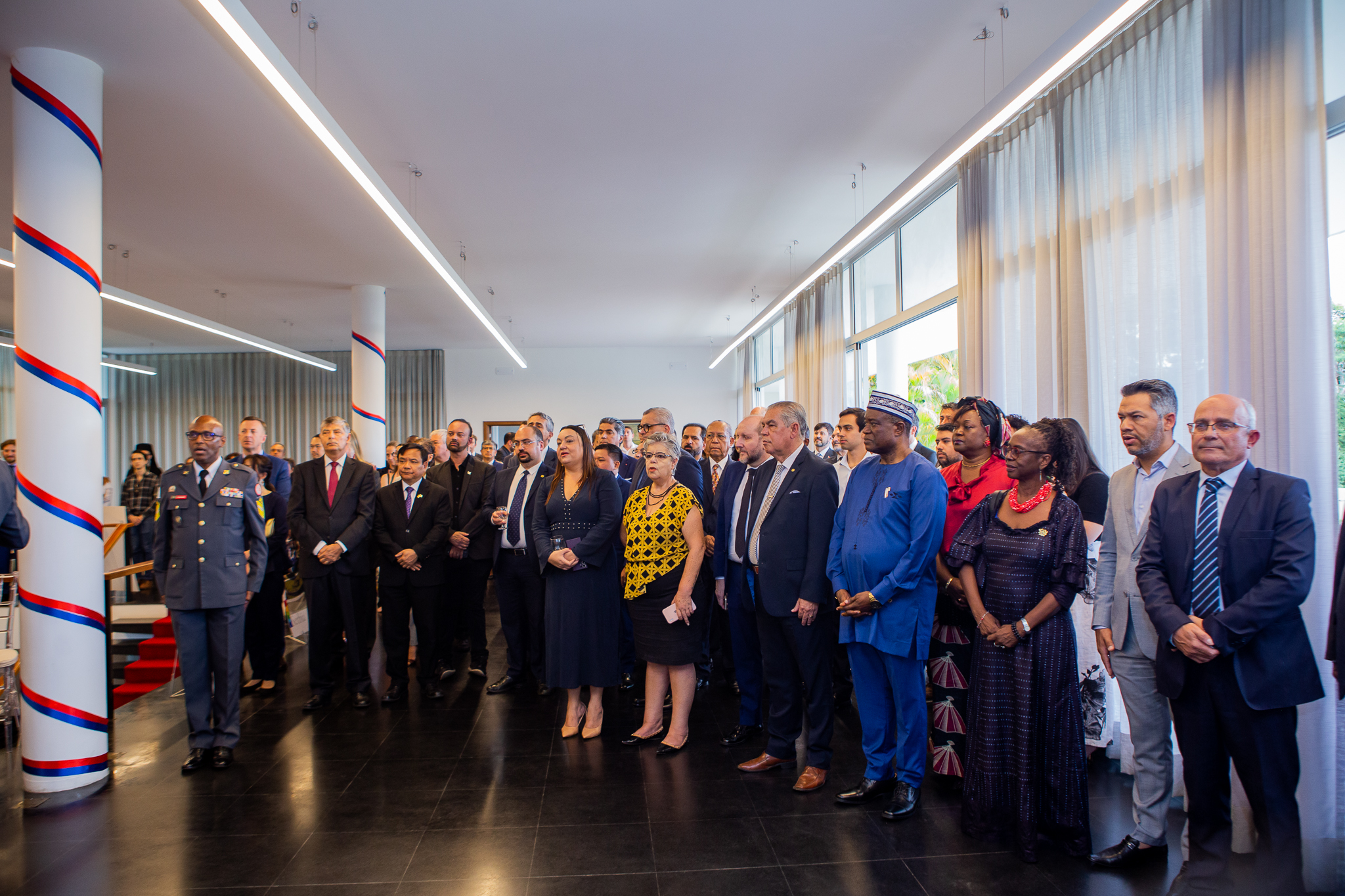
A participação da orquestra de Corpo de Bombeiros Militar do Distrito Federal e a execução dos hinos nacionais da Sérvia e do Brasil deram um brilho ao todo evento.
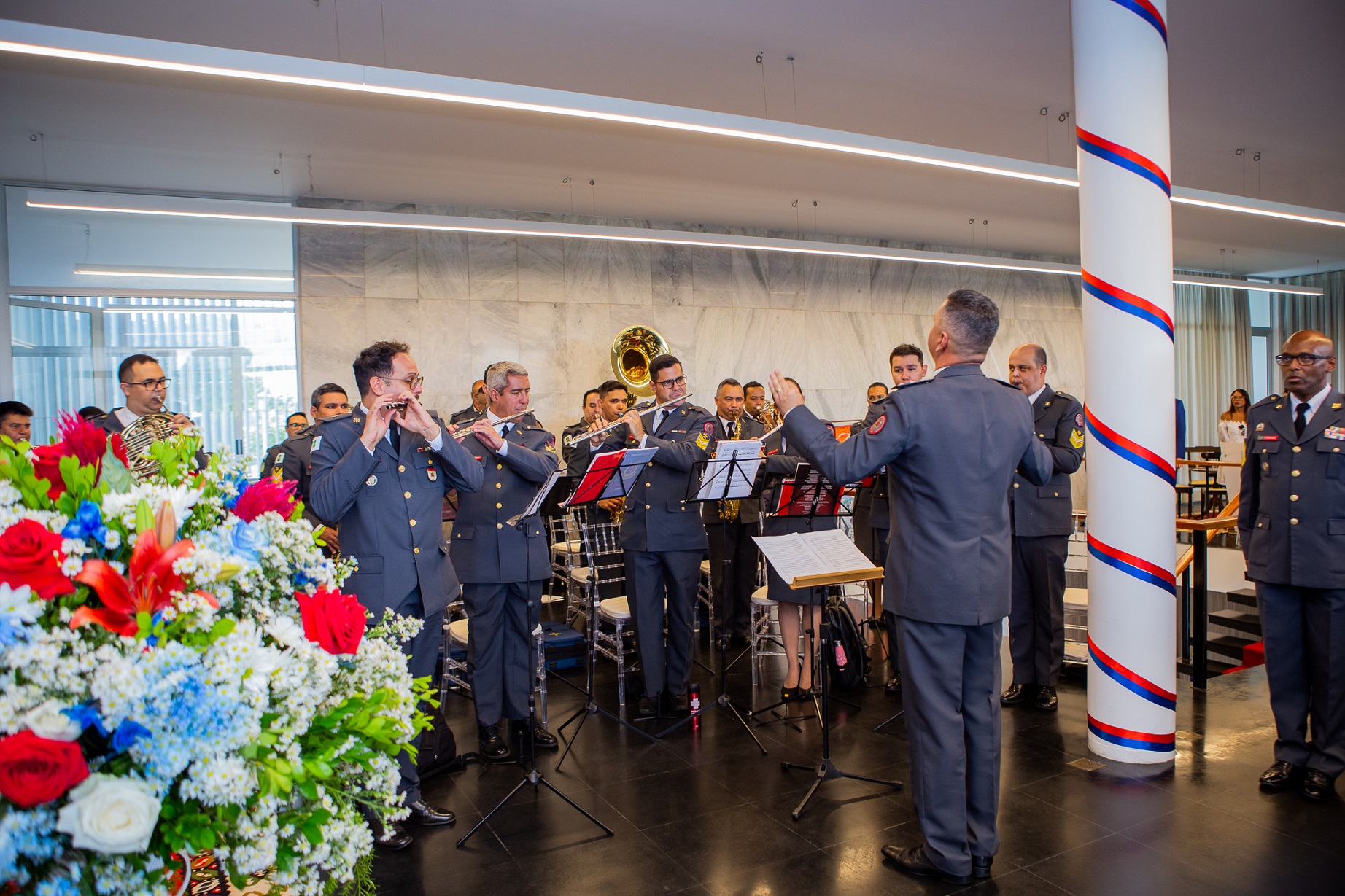
No seu discurso, o Embaixador Aleksandar Ristić ressaltou que o Dia do Estado Sérvio é comemorado em memória de dois eventos da Revolução Sérvia que ocorreram em 15 de fevereiro - a Primeira Revolta Sérvia (1804), que deu início à luta pela libertação da ocupação otomana que durou quase cinco séculos, e a adoção da primeira constituição sérvia (1835). Embora essa constituição tenha ficado em vigor durante apenas 55 dias, o seu espírito libertário ainda hoje é uma inspiração na Sérvia. Ainda hoje as atuais gerações de líderes e cidadãos encontram nela a força para preservar a unidade nacional e a integridade territorial da Sérvia e para trabalhar no seu desenvolvimento.
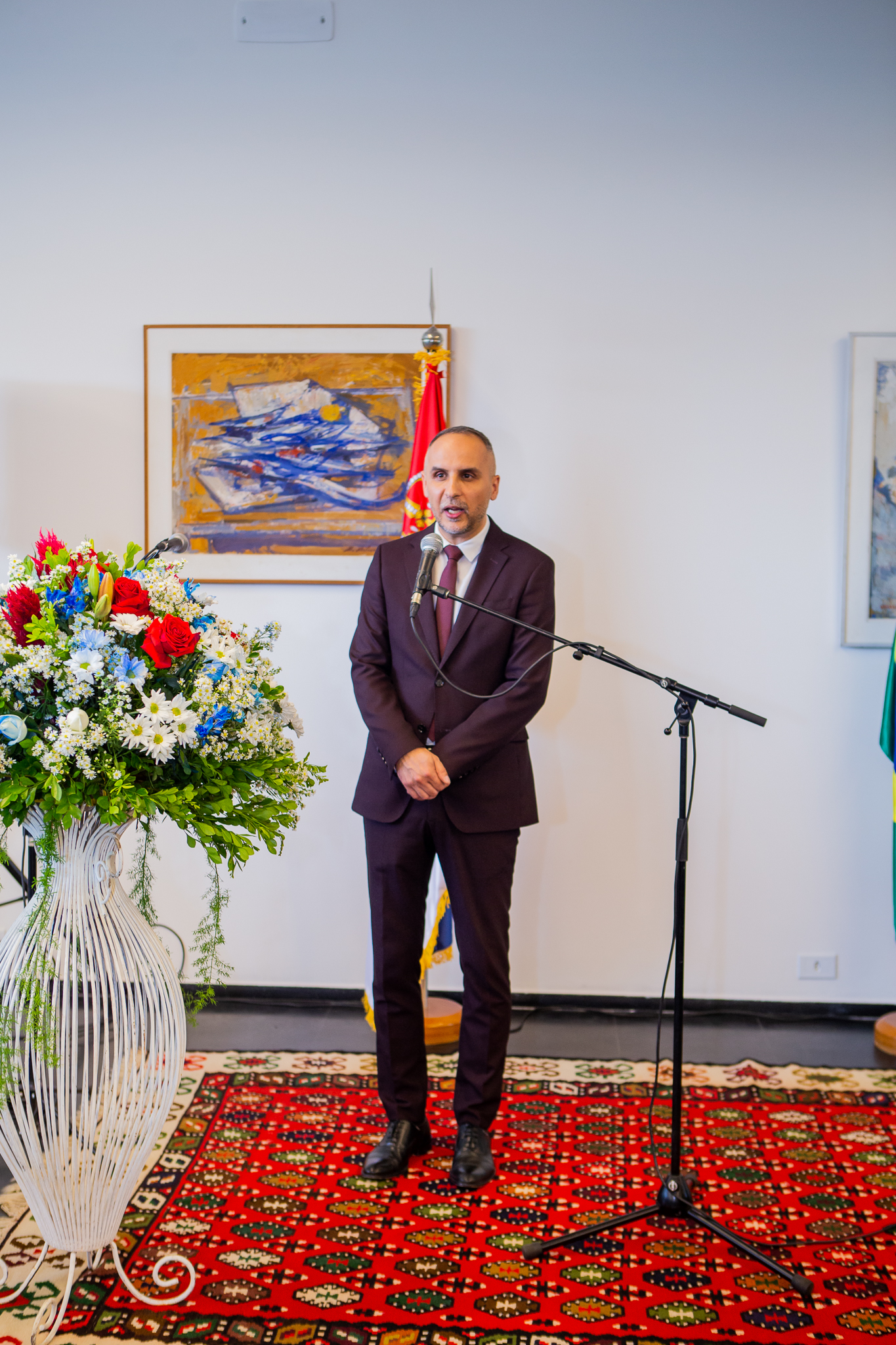
A Sérvia e o Brasil tradicionalmente mantêm uma excelente cooperação e apoiam-se mutuamente. As relações diplomáticas foram estabelecidas em 1938 e caracterizam-se por um elevado nível de acordo sobre as questões internacionais mais importantes. Existe a possibilidade de desenvolvimento da cooperação em várias áreas, com ênfase à agricultura, às tecnologias da informação, ao comércio, à defesa e à cultura.
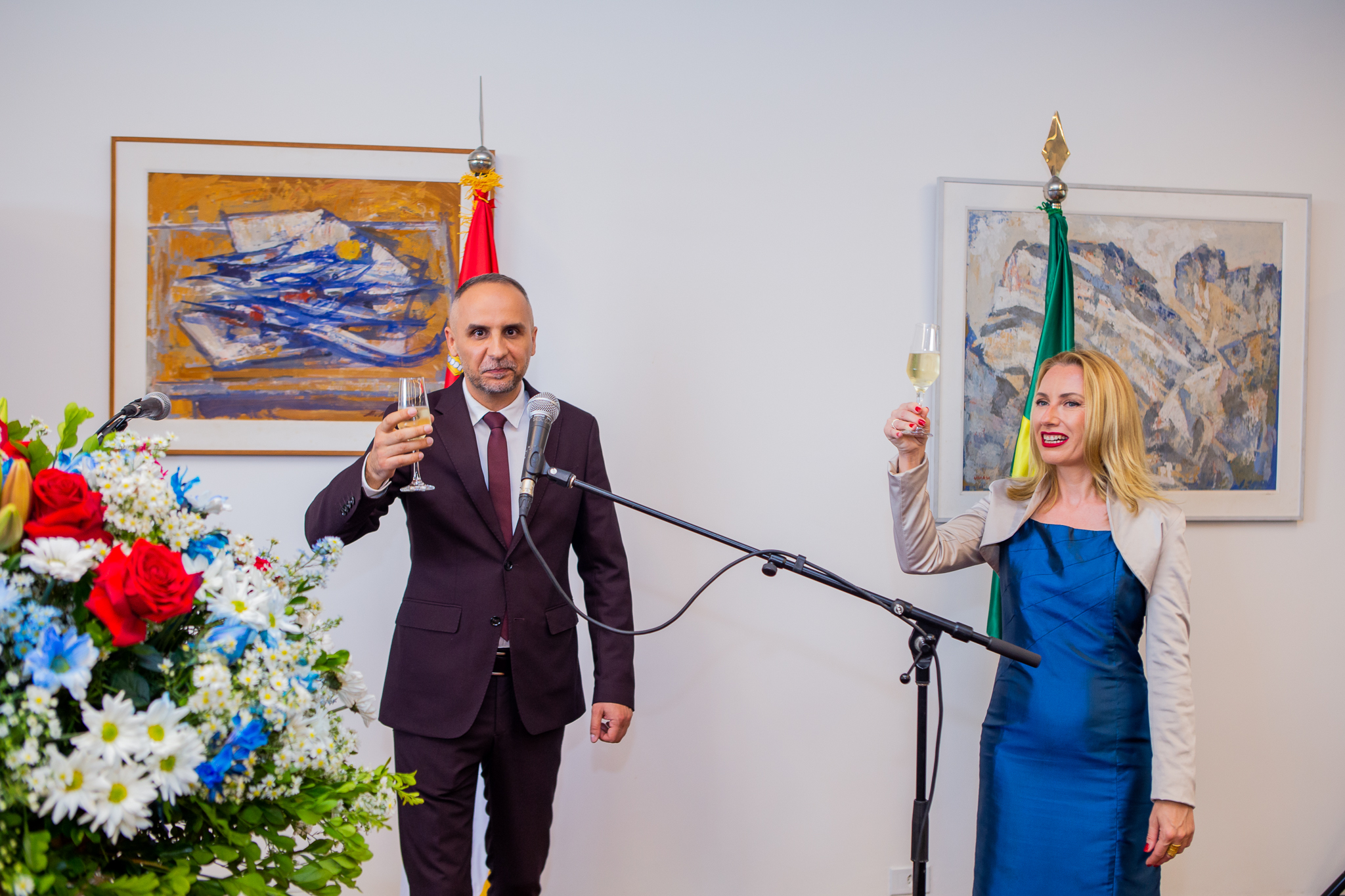
A recepção atraiu a atenção da mídia local como Brasília News, Brasília in Foco, Mundo Diplomático, Radar Brasília, Portal R10, Brasília World News, Jornal de Taguatinga, Repórter Malu, Foco na Política entre outros, relatando sobre a comemoração da data nacional da Sérvia no Brasil. |
|
|
| Entrega das copias figuradas do embaixador da Aleksandar Ristić, 2 de fevereiro de 2024 |
|
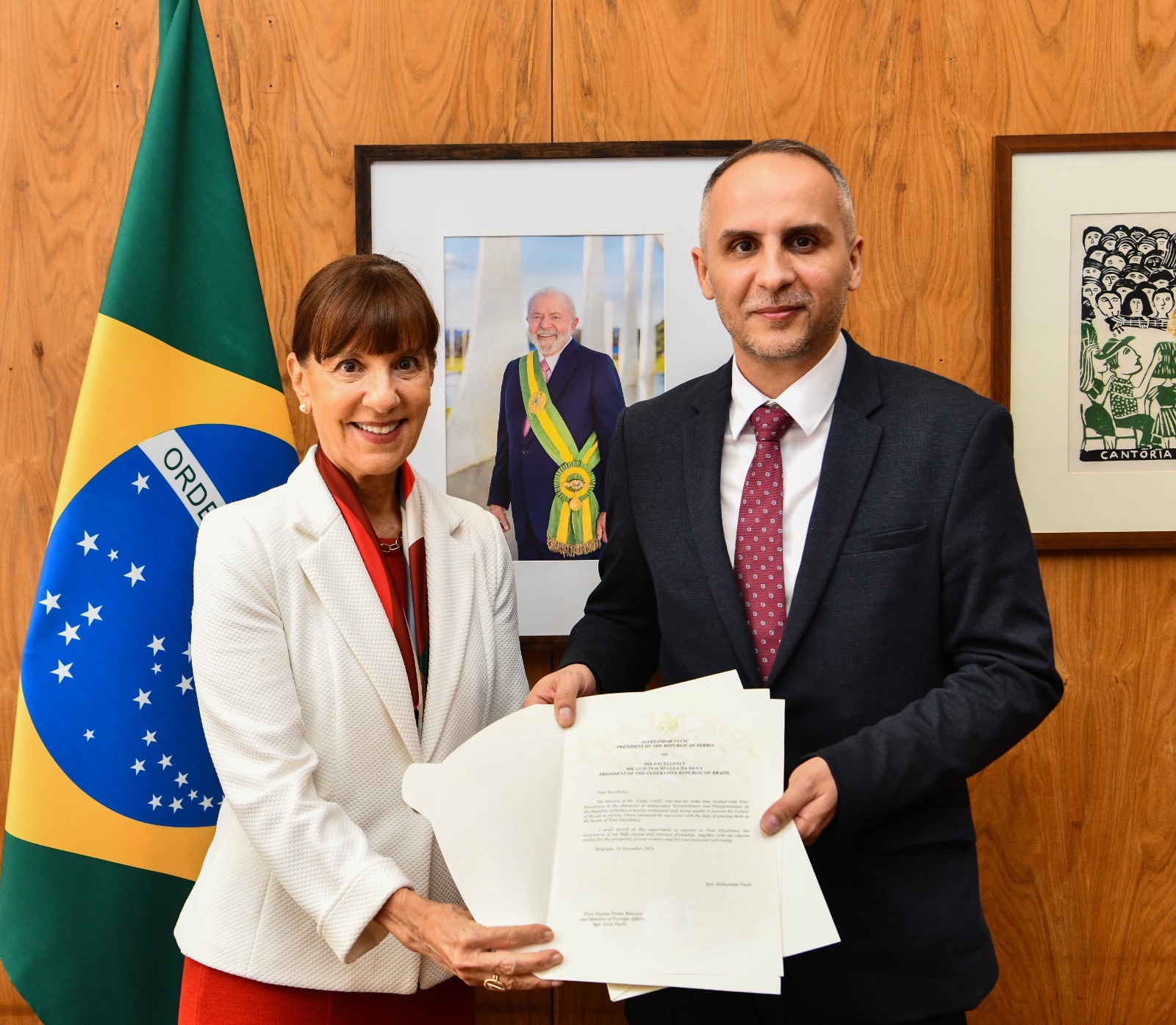
O novo embaixador da Sérvia no Brasil, Aleksandar Ristić, entregou as copias figuradas das cartas credenciais à Secretária de Europa e América do Norte embaixadora Maira Luisa Escorel. As relações da Sérvia e Brasil possuem grande potencial de desenvolvimento em diversos setores.
|
|
|
| Participação da Embaixada na Feira do Livro de Brasília, 28.11.2023. |
|
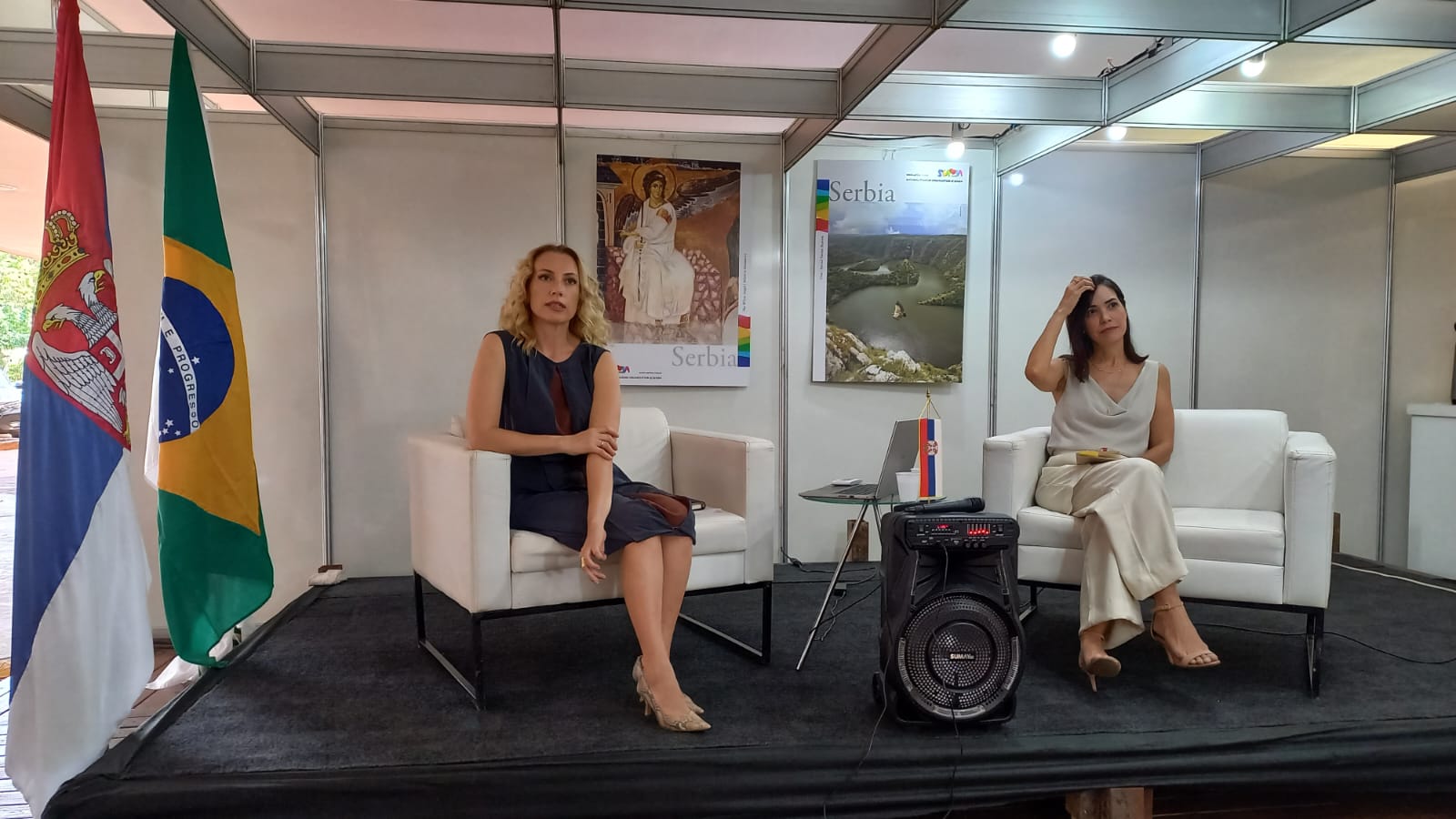
A Embaixada da República da Sérvia em Brasília participou no dia 28.11.2023 da 37ª Feira do Livro de Brasília, que acontece na Biblioteca Nacional de Brasília no período de 24 de novembro a 3 de dezembro de 2023.
No estande da Secretaria de Relações Internacionais do Distrito Federal (SERINTER-DF), a Encarregada de Negócios, a.i. J. Blažević aproveitou a oportunidade para apresentar a Sérvia e o conteúdo literário do país aos visitantes da Feira.
Jelena Blažević apresentou ao público as características gerais da Sérvia, bem como o potencial turístico e o patrimônio cultural e histórico do país. Em seguida foram apresentadas algumas obras da literatura sérvia traduzidas para o português. Em cooperação com a atriz e tradutora Katia de Nogueira Tatić, foram apresentadas as obras em prosa de uma das poetisas sérvias mais importantes, Desanka Maksimović. A seguir, em cooperação com Jovan Tatić, tradutor literário de sérvio para a língua portuguesa, foi apresentada a obra "Ponte sobre o Drina" de Ivo Andrić.
Os visitantes mais jovens foram presenteados com uma coleção de livros ilustrados interativos "O que Ana sabe..." do autor Simeon Marinković e do ilustrador Dušan Pavlić, traduzidos para o português. J.Blažević, ao apresentar as obras, destacou como os livros ilustrados do autor sérvio podem ajudar na criação de bons hábitos nas crianças.
Por fim, foi apresentada a obra “Biografia de Novak Djokovic” de Blaža Popović, e nesta ocasião o público tomou conhecimento não só dos feitos do melhor tenista de todos os tempos, mas também das conquistas globais dos melhores atletas da Sérvia. |
|
|
| Abertura da Exposição „Nikolа Tesla – Energia para o Futuro“ |
|
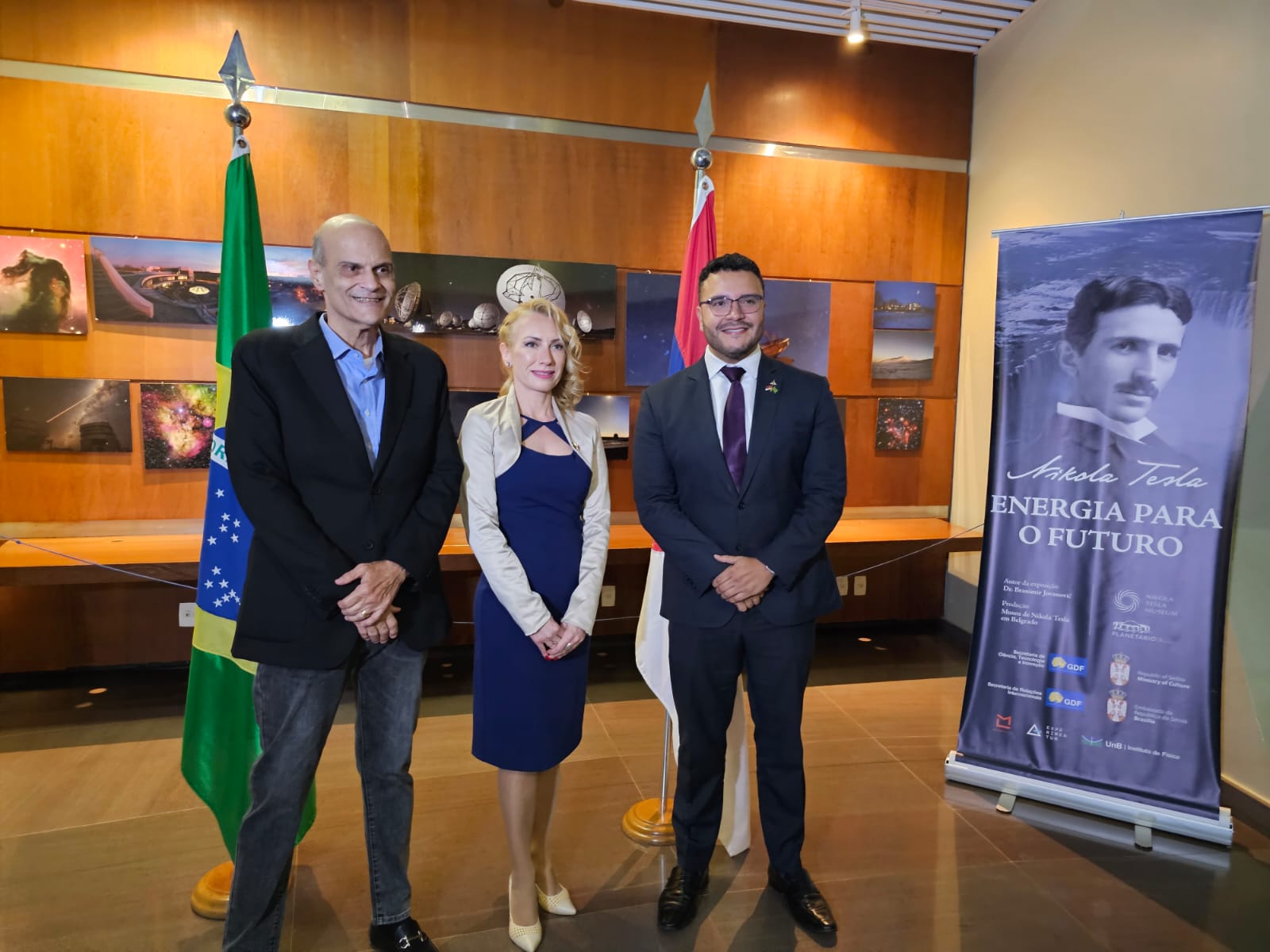
No contexto dos 85 anos do estabelecimento das relações diplomáticas entre a Sérvia e o Brasil, a abertura oficial da exposição "Nikola Tesla - Energia para o Futuro" foi realizada na noite de ontem, 24 de julho de 2023, no Planetário de Brasília.
No prestigiado espaço, que nutre e promove as conquistas científicas e tecnológicas e o patrimônio cultural, a exposição do Museu Nikola Tesla do Belgrado foi solenemente inaugurada pelo Secretário de Relações Internacionais do Distrito Federal Paco Brito, o Secretário de Ciência, Tecnologia e Inovação Gustavo Carvalho Amaral e a Encarregada de Negócios a.i. Jelena Blažević da Embaixada da Sérvia em Brasília, na presença de representantes do MRE do Brasil. Após os discursos, como fruto da cooperação da Embaixada com a Universidade de Brasília, para deleite geral, o prof. do Instituto de Física Cassio Laranjeiras, apresentou na prática um modelo funcional do transformador de Tesla.
A exposição estará aberta aos visitantes do Planetário durante os próximos três meses. A entrada é gratuita e o horário de funcionamento é de terça a domingo, das 7h30 às 19h.
|
|
|
| LIVRO DAS CONDOLÊNCIAS |
|
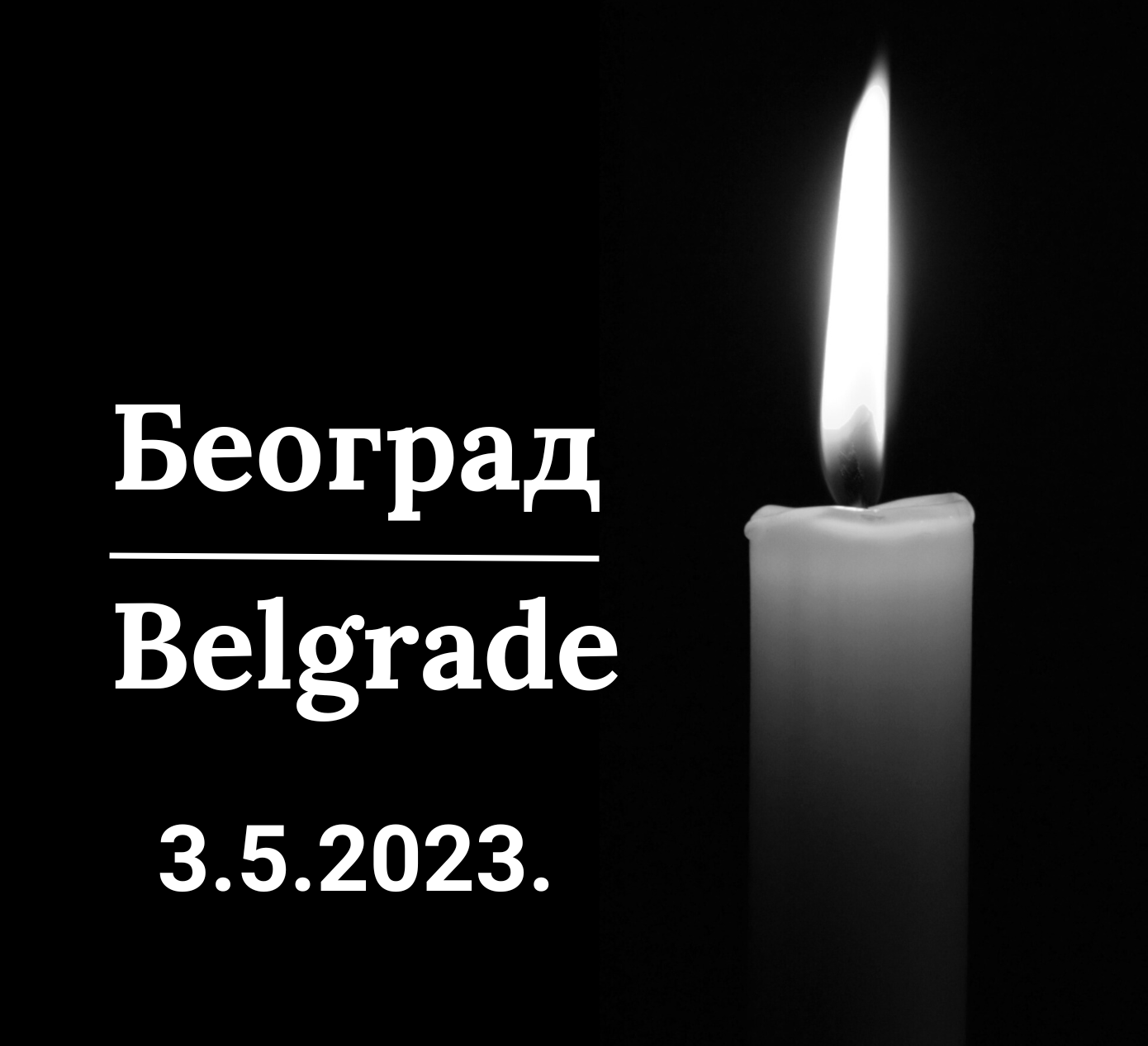
Informáramos com grande pesar que, por ocasião da trágica perda de vidas no tiroteio ocorrido na escola elementar "Vladislav Ribnikar" na data de 03 de maio de 2023, o governo da República da Sérvia declarou três dias de luto nacional, entre 05 de maio a 07 maio de 2023.
Nesse sentido, será aberto um livro de condolências na sede desta Missão Diplomática nos seguintes dias e horários:
- sexta-feira dia 05/05/2023 das 10h às 13h;
- segunda-feira dia 08/05/2023 das 09:30h 12h e 13:00h às 15:00:
- terça-feira dia 09/05/2023 das 09:30h ás 12h;
Endereço: SES Avenida das Nações Quadra 803 Lote 15 (entrada virada de frente para a L3)
A Embaixada da República da Sérvia informa ainda que aqueles que não puderem vir pessoalmente, poderão assinar um livro de condolências virtual no seguinte endereço eletrônico: condolencias@terra.com.br |
|
|
| Participação do Presidente da Assembleia Nacional da República da Sérvia, Dr. Vladimir Orlić, na posse do Presidente do Brasil Lula da Silva em Brasília |
|
01.01.2023.
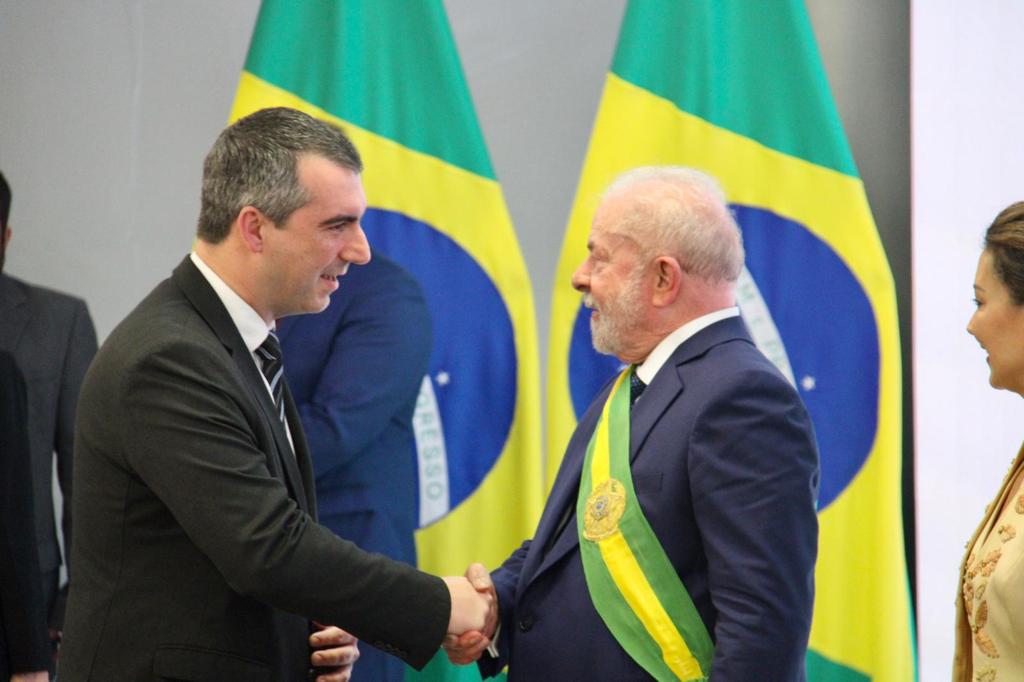
O Presidente da Assembleia Nacional da República da Sérvia, Dr. Vladimir Orlić, realizou visita oficial à Brasília, por ocasião da posse do Presidente do Brasil, S.E. o Sr. Luis Inácio Lula da Silva, realizada em 01.01.2023. Parabenizando o Presidente do Brasil Lula da Silva, o Presidente da Assembleia Nacional da República da Sérvia Dr. V. Orlić expressou sua crença de que durante seu mandato, os dois países continuarão a fortalecer a amizade de décadas e intensificar o diálogo político. Ele expressou a expectativa de uma cooperação ainda mais dinâmica e substancial em todas as áreas de interesse mútuo. Ele expressou satisfação particular com o fato de que este ano marca o 85º aniversário do estabelecimento das relações diplomáticas entre a Sérvia e o Brasil, bem como o fato de que a cooperação bilateral ser caracterizada pelo entendimento mútuo, apreciação e apoio em todas as questões importantes. Aproveitou a oportunidade para agradecer ao Presidente Lula da Silva o apoio de princípios do Brasil à integridade territorial e à soberania da República da Sérvia e ao apoio que seu país oferece às posições de nosso país em organismos internacionais.
O Presidente da Assembleia Nacional da Sérvia V. Orlić transmitiu as sinceras felicitações do Presidente da República da Sérvia, A. Vučić, ao Presidente Lula da Silva, bem como os votos de sucesso e bem-estar da República Federativa do Brasil, ao mesmo tempo que lhe agradeceu o convite para participar da solenidade de posse, que pelo número de participações de autoridades estrangeiras foi considerada a maior da história do Brasil.
Às margens da cerimônia, o Presidente da Assembleia Nacional da República da Sérvia V. Orlić da Sérvia realizou uma série de reuniões com dignitários de alto escalão que participaram da cerimônia, com quem discutiu as relações bilaterais gerais, bem como oportunidades para o fortalecimento adicional da cooperação interparlamentar e econômica.
|
|
|
| Partida Sérvia-Brasil acompanhada em Brasília |
|
24.11.2022.
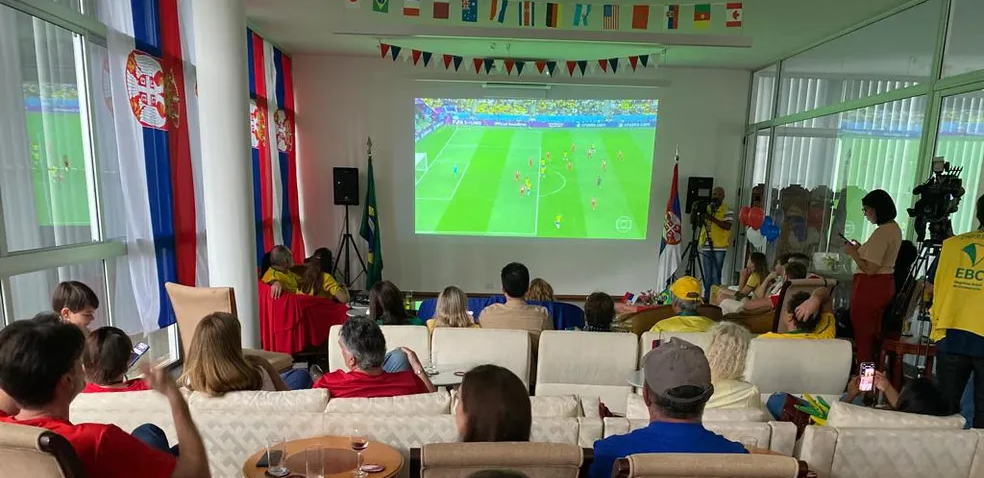
No contexto da partida entre a Sérvia e Brasil pela atual Copa do Mundo de futebol, foi organizado o acompanhamento do evento na Embaixada com a nossa diáspora, amigos do corpo diplomático e Ministério das Relações Exteriores do Brasil. Destaca-se especialmente o interesse inédito da mídia pelo evento, que superou todas as coberturas anteriores sobre nosso país. A partida foi acompanhada por equipes da TV Globo (nacional e local), SBT, TV Brasil, TV Banderantes (nacional e local), TV Jovem Pan News, bem como Correio Brasiliense, Jornal O Globo, Metropolis, Radio Nacional e etc...
As reportagens podem ser encontradas nos seguintes links:
https://g1.globo.com/df/distrito-federal/noticia/2022/11/24/copa-do-mundo-brasileiros-e-servios-assistiram-jogo-juntos-na-embaixada-da-servia-no-df.ghtml
DF2 - Edição de quinta-feira, 24/11/2022 | DF2 | Globoplay
https://youtu.be/ljpx1VYKMvs?t=2039 – 33’
https://www.metropoles.com/distrito-federal/servios-em-brasilia-se-juntam-para-acompanhar-jogo-em-embaixada
RN TV 2ª Edição | Família trocou Sérvia por Natal há seis anos | Globoplay
https://agenciabrasil.ebc.com.br/radioagencia-nacional/esportes/audio/2022-11/embaixada-da-servia-em-brasilia-assiste-derrota-da-selecao-na-copa
https://oglobo.globo.com/esportes/catar-2022/noticia/2022/11/estou-mais-triste-que-feliz-diz-embaixadora-da-servia-apos-derrota-para-a-selecao-brasileira.ghtml
https://www.correiobraziliense.com.br/cidades-df/2022/11/5054249-embaixada-da-servia-recebe-brasileiros-e-servios-na-estreia-das-secoes.html
https://www.youtube.com/watch?v=-a9rrV2orII&feature=youtu.be – 32’
https://portaldaki.com.br/servia-tenta-avanco-historico-na-copa-do-mundo/
|
|
|
| Concurso público para atribuição de prémios nacionais a sérvios da região e da diáspora |
|
Mais informações no site em idioma sérvio:
http://brasilia.mfa.gov.rs |
|
|
| Statement by Minister of Foreign Affairs of the Republic of Serbia Nikola Selaković at the meeting of the UN Security Council on the report on the work of UNMIK |
|
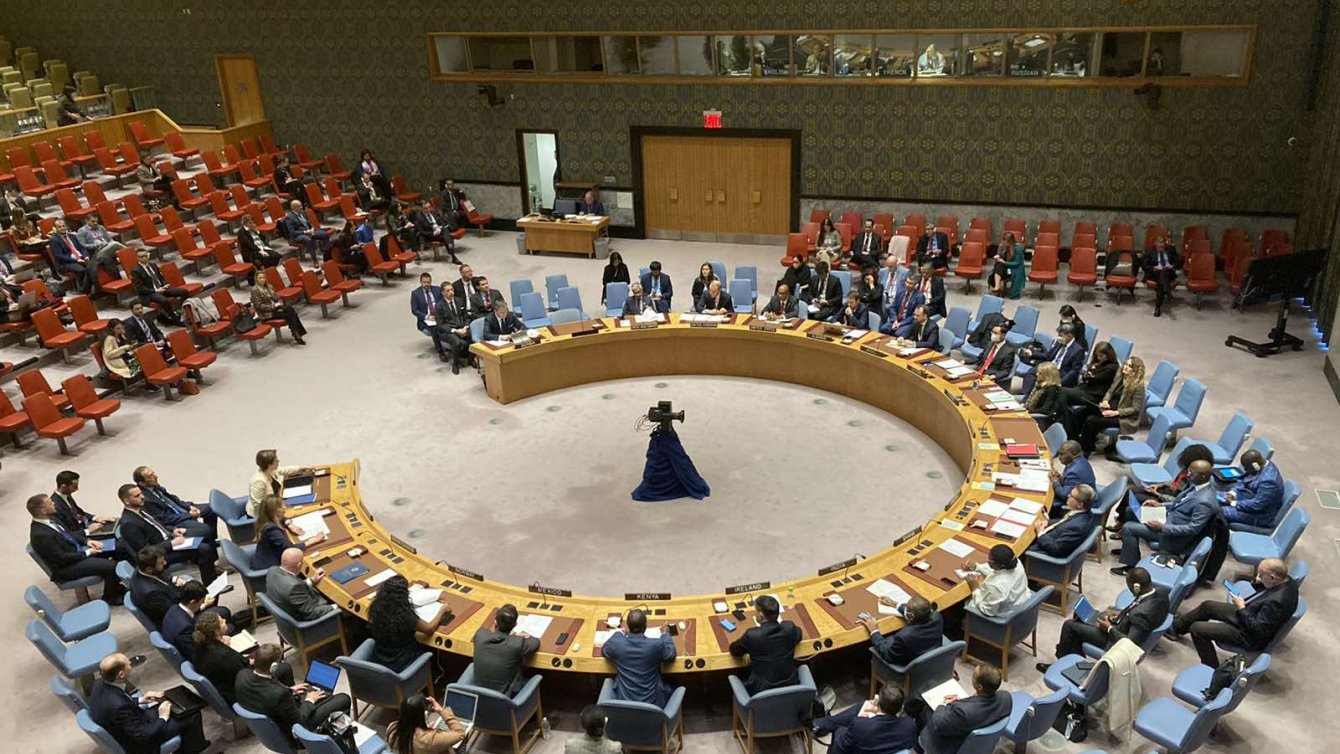
18. Oct 2022.
Mr. President,
Madam Special Representative,
Ladies and gentleman,
It gives me honor to address this distinguished body once again and to discuss the latest report of the Secretary-General on the work of the UNMIK.
I would like to thank the Secretary-General and the Special Representative for submitting the report. We take note of the efforts that Ms. Ziadeh makes in performing this very responsible duty, especially bearing in mind the necessity of a comprehensive overview and the complexity of the situation on the ground.
I also take this opportunity to underline that the Republic of Serbia highly values the activities of UNMIK in Kosovo and Metohija, established under UN Security Council Resolution 1244. We advocate for its continued operation in an unchanged and undiminished scope and capacity, especially bearing in mind that the Mission has not yet achieved the main goal of its mandate - a peaceful and normal life for all citizens of our southern province.
Ladies and gentlemen,
Unfortunately, the last few months have not brought more stability in Kosovo and Metohija and the situation in the Province is not exactly as presented in the report. Unilateral moves of Pristina continue to consciously and systematically deepen ethnic differences, causing discrimination against the non-Albanian population. To our knowledge, 105 ethnically motivated attacks have been recorded since the beginning of this year. In addition, Pristina is actively working on administrative and bureaucratic obstacles, by taking measures that were not agreed upon in the dialogue as the basic mechanism for negotiations and reaching solutions between Belgrade and Pristina. Pristina’s approach is problematic in many ways. This irresponsible conduct of Pristina is consciously sabotaging the efforts not only of Belgrade, but also of the EU and other involved parties of the international community, with the clear intention of achieving two goals - the first being to avoid the implementation of assumed commitments. The second, the ultimate and far more alarming goal is the intimidation, marginalization and persecution of Serbs.
In all previous statements before this this distinguished body, Pristina focused on what happened in the past while failing to mention, which is painful to witness, how non-Albanians in Kosovo and Metohija live today. Serbs are still intimidated in different ways, forced to leave their homes, villages and cities. Those displaced are discouraged from returning to where they were born and lived their lives.
The provisional institutions work systematically to remove and erase as much as possible of the cultural and national diversity that is left. At the same time, Pristina is consciously fueling inter-ethnic tensions using all available methods.
Attending religious celebrations seems to be a crime in Kosovo and Methohija. It is the case of Nikola Nedeljković who was arrested for allegedly "inciting ethnic hatred and intolerance", but actually his imprisonment was for attending the St. Vitus Day (Vidovdan) celebration.
Nikola was sentenced to eight months in prison without any material evidence. On the other hand, let me remind you that even to this day there is not a single perpetrator held legally accountable for the more than 1,000 Serbs killed since 1999. Due to planned intimidation, almost all towns and villages in Kosovo and Metohija are ethnically cleansed. Representatives of Pristina are ignoring the suffering, insulting the open wounds of the Serbs who had to leave their ancestral homes, and I underline, there are more than 200,000 of them. Such conduct has not change for last 23 years and is in complete opposite to the democratic values and principles that the provisional institutions of self-government often promote in their statements.
Therefore, I consider it necessary to emphasize that the true political will of the involved international actors and Pristina is necessary in order to create the conditions for the beginning of the end of discrimination on a national basis and common life in the Province.
Esteemed members of the Security Council, I would like to draw your attention to the rigid, problematic and extremely irresponsible conduct of the other negotiating party within the dialogue. In achieving the above-mentioned goals, Pristina applies the so-called policy of reciprocity, a well-thought-out, malicious strategy that, unfortunately, was not constructed independently. By continuously insisting on mutual recognition as a central part of the dialogue, the so-called policy of reciprocity demonstrates the essential unwillingness of the current political leadership of Pristina to find any compromise solution. Let me remind you that the talks between Belgrade and Pristina did not start with last elections in Pristina, but have been in progress for 11 years since the technical dialogue started (8 March 2011). Therefore, we assess as inadmissible attempts to disregard the current format of the dialogue, and annul the agreements only because they are not to the liking of the current political factors. It is unacceptable that the current geopolitical circumstances are being used to simply erase what has been painstakingly worked on for years. Belgrade, I underline, was institutionally involved in the dialogue from the very beginning, while the commitment of the other side has varied and continues to vary depending on the political option that is in power.
The harsher political rhetoric and narrative of the current leadership of the provisional institutions of self-government in Pristina are accompanied by concrete destabilizing steps. In the reporting period, measures on license plates were imposed, disguised as attempts at alleged integration into society.
Let me remind you again, there was no agreement on such measures in the dialogue between Belgrade and Pristina. I believe, ladies and gentlemen, that even today we will hear from the representative of Pristina that their side has fulfilled all obligations, but the decision on re-registration of license plates shows that Pristina is not only failing to fulfill what has been agreed upon, but it nullifies the results of the dialogue, creating a new crisis all over again. The effect of such forcibly imposed measures is best illustrated by the fact that since the decision was made a single-digit number of re-registered vehicles with Serbian license plates has been recorded, of which only two are Serbs from the north of Kosovo and Metohija. This is another indicator that Pristina does not enjoy full support, but that, on the other hand, it continuously provokes the natural reaction of the Serbian population, which cannot endlessly be subject to the arbitrariness of temporary institutions.
I believe that even today we will hear already known narrative of representatives from Pristina who try to present every reaction of the Serbs in Kosovo and Metohija as an activity organized by Belgrade in alleged attempts at destabilization. Such claims are simply not true. Serbia, for its part, cannot in any way contain the revolt present among the non-Albanian population of Kosovo and Metohija. It is an undeniable fact that citizens' protests represent a voice against many years of institutional violence and the deprivation of rights of the non-Albanian population, which, in this case, is denied the right to peaceful enjoyment of private property acquired in a legal manner.
Pristina does not cease in its attempts to confiscate property, and, as is well-known, one of the targets is the Serbian Orthodox Church. By calling into question the return of property to the Dečani Monaster Pristina paradoxically does not execute the decisions of its own so-called Constitutional Court.
Ladies and gentlemen,
I thought for a long time how to best illustrate the true picture of everyday life of the non-Albanian population in Kosovo and Metohija. I will mention only some of the facts. Numerous ethnically motivated incidents, hate speech, intimidation, violations of the right to a fair trial, threats to the right to freedom of movement and religious rights, desecration of churches and graves were recorded in the last reporting period as well. The frequent attacks on the sites of the Serbian Orthodox Church are also unacceptable, and especially the humiliating attitude towards the Serbian cultural and spiritual heritage, including the 4 monuments that have been inscribed on the UNESCO World Heritage List. Numerous administrative and technical barriers are imposed on priests and monastic communities, making it difficult and even impossible for them to survive on church properties.
When it comes to civil rights, try to imagine that the basic political and civil right to vote has been taken away from you.
This is precisely what the Serbs in the Province have experienced along with frequent intimidation and violent incursions of the ROSU special forces, which are an instrument for the implementation of Pristina's goals under the pretext of allegedly fighting crime.
In December last year Bratislav Nikolić the president of municipality of Štrpce has been detained, as suspected of the organized crime and corruption - still not charged, kept in detention unit in Podujevo, only for the reason to make additional and final pressure on the Serbian community living in the enclave of Štrpce. How can this be justified as the fight against crime when special forces are used to raid village festivals, schools and kidnap drivers of ambulance transporting infusion containers and medicines? What are the motives behind and how can one rationalize these actions? Just try to imagine and put yourself in the shoes of Ms. Dragica Gašić, the only Serbian returnee in Djakovica. Imagine that you are still not allowed to buy bread because of your origin and nationality, because you live in a municipality that the local Albanians proudly consider forbidden to non-Albanians. Imagine that as many as eleven Albanian civil society organizations demand your expulsion, as well as a ban on any non-Albanian ever returning to that town. Then you will realize the level of intimidation that Serb returnees are facing. It will be clear to you why the percentage of returnees is below 2% and why it is still one of the lowest in the world. Let me pose a question - are these the characteristics of a society that presents itself to the world as a fully fledged democracy and a factor of stability in the region?
We are aware that the dialogue has a wider dimension and that it can affect the situation in the entire region.
This is reflected in every statement given by Serbian officials, including the President of the Republic of Serbia, Aleksandar Vučić. "It is better to negotiate for a hundred years than to fight for a day" are the words of our President that best describe the policy of peace, reconciliation, and regional cooperation pursued by the Serbian leadership, which is guided by the vision of building a common and prosperous future of the Balkans.
I believe that it is a duty of today's leaders to create a clear common vision for the future generations. Such a vision was shown by the leaders of Belgrade, Skoplje and Tirana by creating Open Balkan, an initiative from the region for the region, which is already producing concrete results. Serbia has on several occasions reached out to Pristina inviting it to join this initiative. We counted on an awareness of the importance of economic connectivity and progress for the benefit of the citizens of the entire Balkans. However, our invitation was not met with understating from the other side.
Ladies and gentlemen,
We categorically reject Pristina's argumentation regarding the alleged unconstitutionality of the formation of the Community of Serb Municipalities. It is clear that Pristina's attitude towards this obligation reflects its attitude towards the Serbian people in the Province. It also indicates that Pristina is against Serbian people being organized as an ethnic community and thus exercising their collective rights.
The aim of their approach, as a preferred model, is a community without Serbs, such as those in Pristina, Djakovica or Pec, or some similar localities in the Province. For our side, it is unacceptable that Pristina has refused to fulfil its obligations and discuss the formation of the Community of Serb Municipalities for as much as 3,470 days but I assure you that, regardless of this fact, Serbia will not give up on its efforts to find a compromise solution for the current situation.
I will remind you that the representatives of Pristina, although they often repeat in their statements that the case of the so-called Kosovo is a fait accompli, continue not to be recognized by the majority of UN member states for 14 years now. If the so-called Kosovo's independence is a reality, how come that we have the dialogue? And how come that Belgrade is faced with increasing pressures as regards the need for mutual recognition? What the current political leadership of Pristina refuses to accept is that Belgrade cannot be left out in the search for a final solution. The same also applies to the case of the increasingly frequent indications about Pristina's upcoming membership in international organizations. Will these moves help to create the necessary atmosphere for dialogue? Are we, in this way, rewarding Pristina's destructive behaviour and refusal of dialogue? Our view is that the attempts of the so-called Kosovo to join international organizations are an unacceptable act and Serbia will work decisively against such steps.
During the last session in April this year, we could hear the calls of some members of the UN Security Council to reduce and even terminate UNMIK, with the explanation that Pristina has its own functional institutions. However, the circumstances I have presented to you and the situation on the ground remind us again that international presence in our southern province is still necessary. In this regard, we support the efforts made by UNMIK, KFOR, EULEX and OMIK within their mandates. The Serbian and other non-Albanian population in Kosovo and Metohija has the highest confidence in the international presence and considers it a guarantor of security, which additionally confirms that international missions need to remain engaged in an undiminished scope and capacity in accordance with UN Security Council Resolution 1244.
In conclusion,
I would like to point out that lately in all international forums we keep hearing calls for respect of the principles of the UN. We support the territorial integrity of all UN member states. But, what about Serbia? I would like to ask the esteemed members of this distinguished body whether the need to implement the principles of the UN Charter applies only to some or all of its members? As a country that consistently respects international law and still suffers the consequences of it being violated, we believe that the UN Charter and international law, including the territorial integrity and sovereignty of states, should be respected by all and apply indiscriminately to all UN member states.
Ladies and gentleman,
It was this body that more than two decades ago adopted Resolution 1244, which confirmed the territorial integrity of Serbia. This fact did not prevent certain countries from recognizing the so-called “Kosovo” and thus violating the UN principles, but also the resolution that they adopted, by adjusting international law to their interests and goals. Precisely because of this, the more and more frequent mentioning of the case of "Kosovo" is an indication that the precedent made opened a Pandora's box, because the strength of each principle rests on its full and universal application and unconditional adherence.
You will notice that I posed a lot of questions in my statement and I express hope that today we will hear answers to at least some of them from you, esteemed members of the UN Security Council and representatives of Pristina, because the inhabitants of Kosovo and Metohija, of any nationality, whether they are Serbs or Albanians deserve it.
All the inhabitants of Kosovo and Metohija have every right to expect an improvement in the atmosphere and the reduction of tensions on the ethnic level, which are a prerequisite for a normal life. For such a step to be made, we need constructiveness, which is not lacking on the Serbian side, genuine support of international actors. I emphasize that Serbia has always been and remains deeply committed to finding a sustainable solution by peaceful means, for the sake of peace, stability and a common future.
Thank you.
|
|
|
| O Presidente Vučić presidiu a Cimeira como parte da iniciativa Balcãs Abertos |
|
02.09.2022.
O Presidente da República da Sérvia, Aleksandar Vučić, presidiu a Cimeira como parte da iniciativa dos Balcãs Abertos, juntamente com o Primeiro-Ministro da República da Albânia, Edi Ram, e o Primeiro-Ministro da República da Macedónia do Norte, Dimitar Kovačevski. O Primeiro Ministro de Montenegro Dritan Abazović, o Presidente do Conselho de Ministros da Bósnia e Herzegovina Zoran Tegeltija, o Ministro dos Negócios Estrangeiros e Comércio da Hungria Peter Sijarto e o Ministro dos Negócios Estrangeiros da República da Turquia Mevlut Cavusoglu participaram da cimeira.
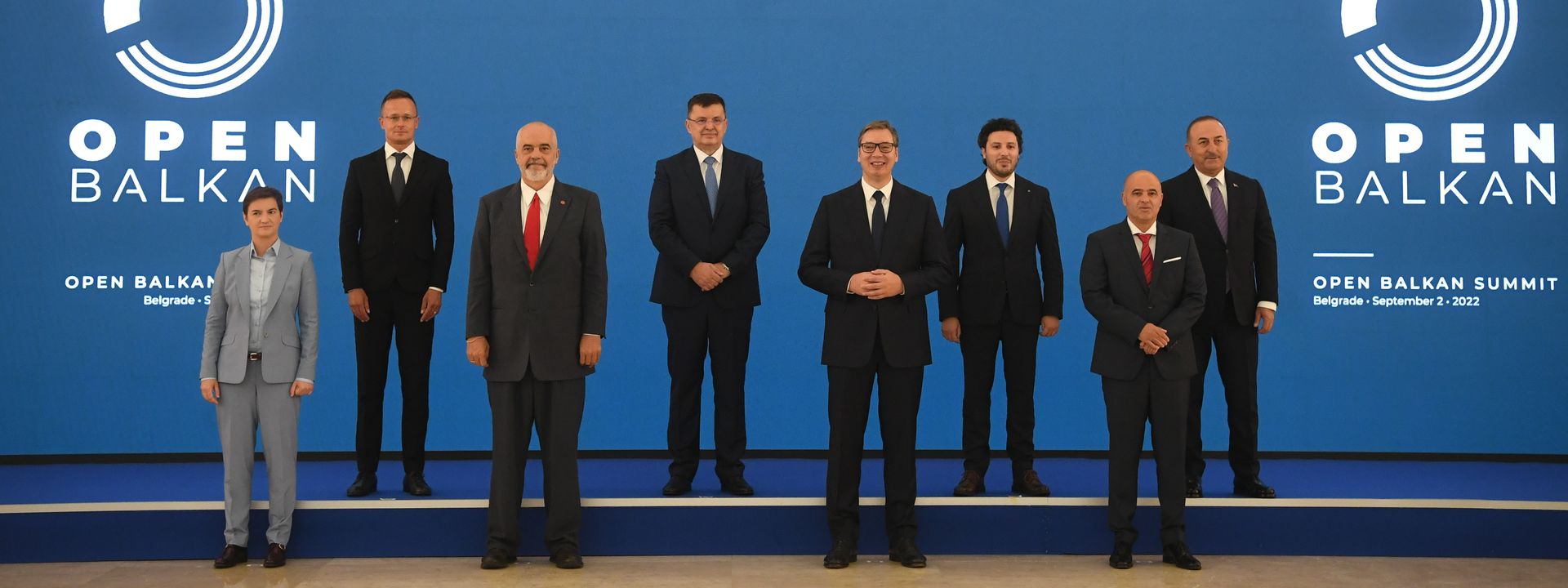
Abrindo a Cimeira de Líderes no âmbito da iniciativa Balcãs Abertos, o Presidente Vučić disse que nunca antes se concentrou mais atenção e energia no sucesso deste projeto desde a sua fundação, e que o sucesso dos Balcãs Abertos também depende de quão bem os países membros conseguirão garantir um bom futuro econômico para seus países, assim como a consolidação da paz e estabilidade na região.
"Esperamos que a iniciativa Open Balkans contribua ainda mais para o fortalecimento e conexão econômica, mas também ofereça uma oportunidade, que é de grande importância para nós, de falarmos na região a uma só voz quando se trata de questões-chave de interesse de todos nossos países e para a região como um todo. O progresso até agora não é pequeno, mas estaria mentindo se dissesse que estamos sempre satisfeitos com o ritmo do progresso. Parece-me que sempre podemos fazer mais rápido, mais forte e melhor. Ao estabelecer o corredor verde dos Balcãs Abertos para o transporte de produtos alimentares, levou a um aumento de 17% no comércio neste setor. Além disso, a abertura de faixas exclusivas nos postos fronteiriços reduziu a espera de algumas horas para 10 a 15 minutos, o que facilita imensamente os negócios para empresas da Sérvia, Albânia e Macedônia do Norte", sublinhou o Presidente Vučić, sublinhando que os documentos foram assinados durante o dia, como resultado do empenho e trabalho e uma expressão da determinação de todos os membros dos Balcãs Abertos para alcançar um nível de cooperação ainda mais elevado no futuro.
De acordo com o presidente Vučić, entre os documentos assinados está o Acordo sobre Mecanismos para Garantir o Abastecimento Livre de Alimentos Básicos na região dos Balcãs Abertos, que prevê o comércio livre de certos alimentos dentro da iniciativa, e se um dos países membros decidir proibir a exportação desses alimentos.
“O plano operacional no domínio da proteção civil é uma continuação do anterior acordo de cooperação em situações civis e de emergência de julho de 2021”, disse o presidente, lembrando que uma ideia particularmente sábia do primeiro-ministro albanês Edi Rama resultou na assinatura de um Memorando de Entendimento na área de cinematografia e atividades audiovisuais que estabelecerá um fundo de coprodução conjunto "Open Balkans" para profissionais de cinema.
Além disso, o presidente Vučić avaliou que a emissão das primeiras autorizações de trabalho e números de registro será um ponto de virada que direcionará o desenvolvimento econômico de nossos três países e acrescentou que é particularmente importante estabelecer um grupo de trabalho para prevenção de crises antes do próximo duro inverno.
O Presidente Vučić também se referiu à feira internacional de vinhos Wine Vision, organizada no âmbito da iniciativa Open Balkans, salientando que os três países membros demonstraram que podem organizar um evento tão importante e extremamente difícil no mais alto nível mundial, trazendo a maior parte das suas vinícolas, as vinícolas mais famosas do mundo e promovendo as capitais e seus países.
O Presidente Vučić agradeceu especialmente ao Primeiro-Ministro do Montenegro, ao Presidente do Conselho de Ministros da Bósnia e Herzegovina, bem como aos Ministros dos Negócios Estrangeiros da Hungria e da Turquia, por terem vindo a Belgrado para a Cimeira.
"Vocês não são nossos convidados, estamos tão conectados e precisamos uns dos outros, e isso é demonstrado pela frequência de nossas reuniões. Acredito que, independentemente do fato de alguns não fazerem parte formalmente dos Balcãs Abertos e outros não sejam, seremos capazes de desenvolver a maior cooperação possível", acrescentou o presidente Vučić, acrescentando que as relações entre os países da iniciativa estão em um nível histórico.
Após o discurso dos participantes e convidados da Cimeira, o Presidente Vučić disse que para todos os países que participam na iniciativa "Bálcãs Abertos", a paz e a estabilidade são de importância fundamental, independentemente do facto de não terem as mesmas opiniões sobre todos os eventos e questões políticas. Salientou ainda que todos os países participantes na Cimeira estão no caminho europeu e estão comprometidos com ele. É por isso que ele pediu aos parceiros europeus que mostrem respeito e mais compreensão para com a região dos Balcãs e agradeceu aos representantes da UE por respeitarem a decisão da Sérvia, Albânia e Macedônia do Norte de criar um projeto como os Balcãs Abertos.
Origem/Foto: www.predsednik.rs |
|
|
| Selakovic com o chefe da diplomacia do Brasil sobre o fortalecimento da cooperação bilateral |
|
07 de agosto de 2022.
O ministro das Relações Exteriores, Nikola Selaković, conversou hoje em Bogotá com o Chefe da diplomacia do Brasil, Carlos Alberto Franco França, sobre o fortalecimento da cooperação bilateral entre os dois países.
Selaković discutiu com seu colega brasileiro as relações bilaterais tradicionalmente amistosas e a intensificação do potencial de investimentos brasileiros na Sérvia.
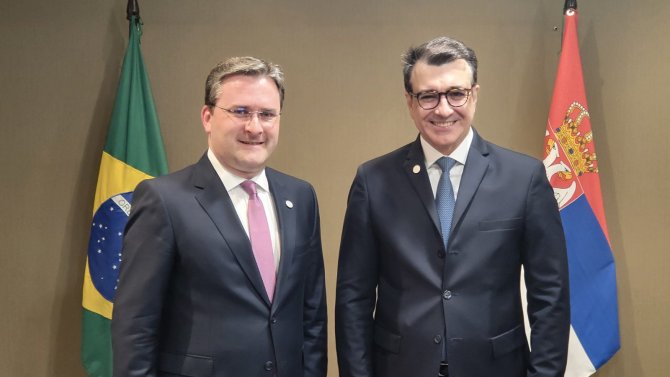
Em conversa com o França, o chefe da diplomacia sérvia agradeceu ao Brasil a firme posição de respeito à integridade territorial e à soberania da Sérvia.
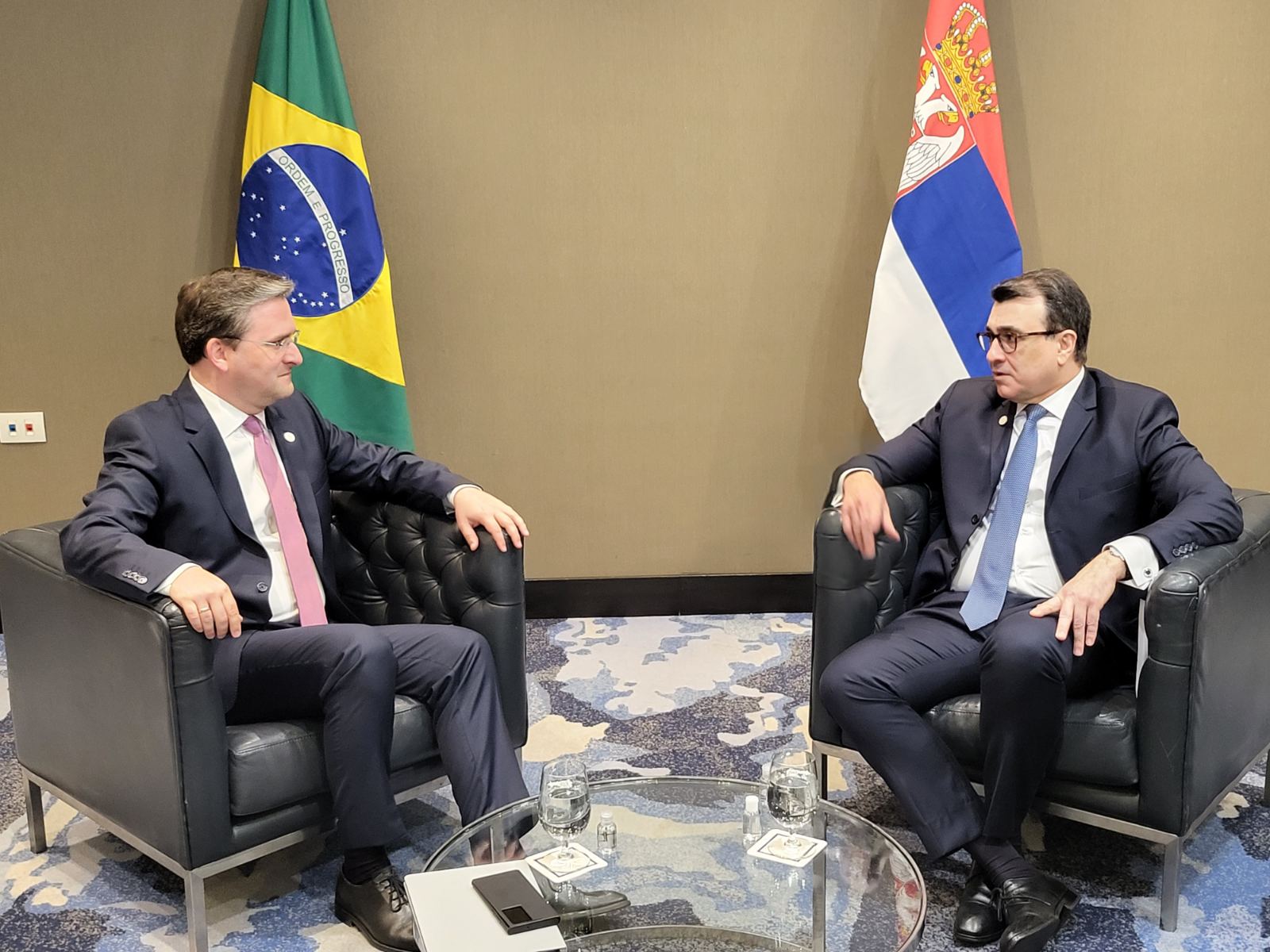
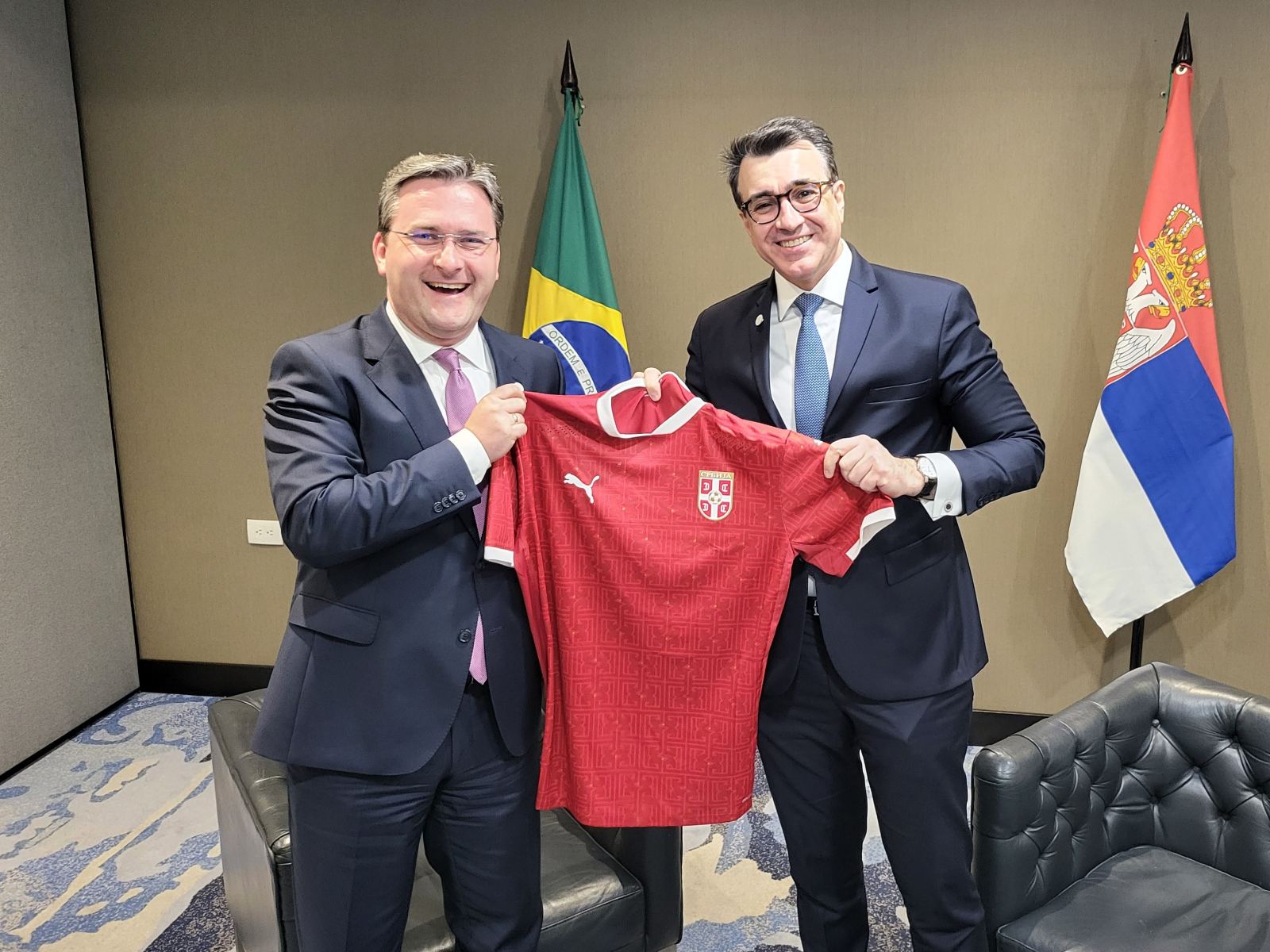 |
|
|
| Fórum de Investimentos em São Paulo, 14-15 de junho de 2022 |
|
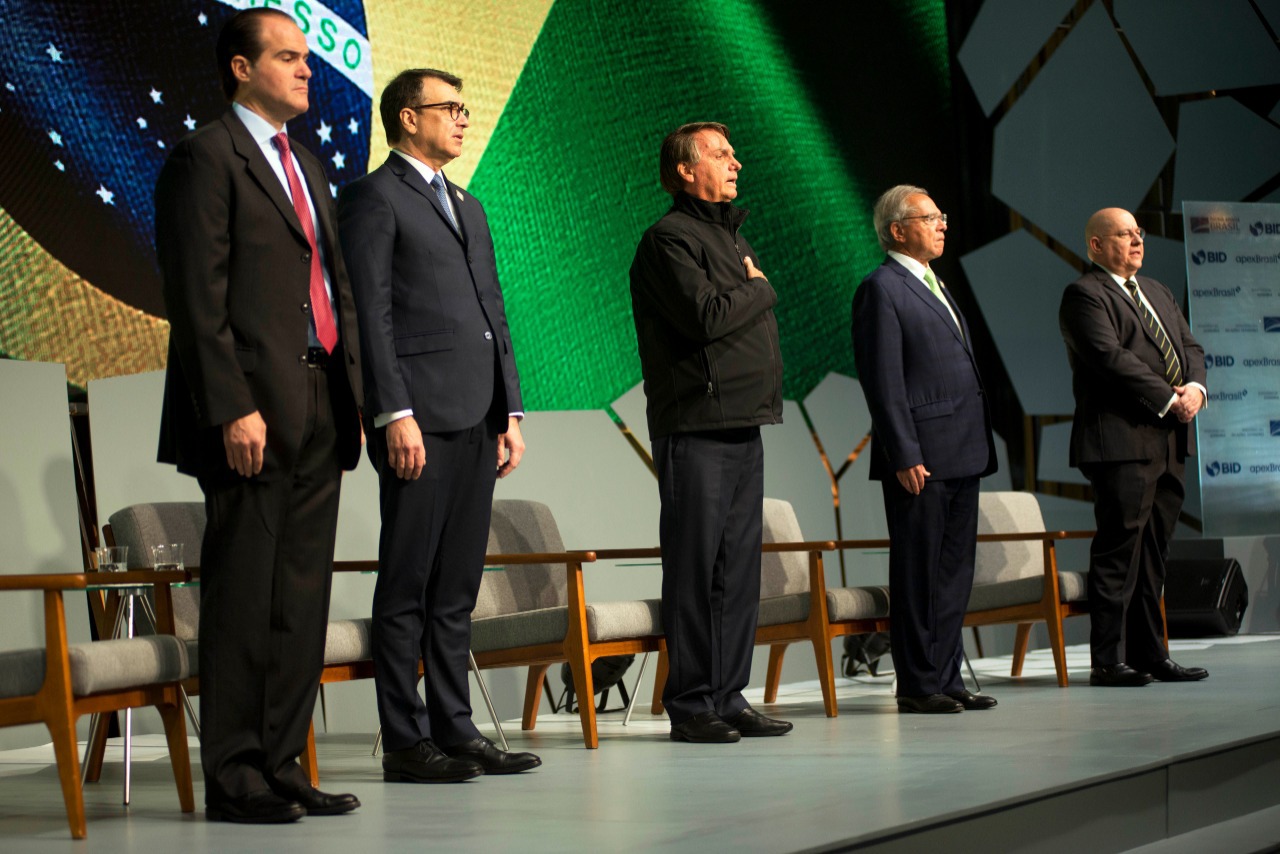
A Encarregada de Negócios a.i. Jelena Blažević participou do Fórum de Investimentos em São Paulo nos dias 14 e 15 de junho de 2022, organizado pela Agência Brasileira de Promoção de Exportações e Investimentos (APEX). A reunião foi aberta pelo presidente Jair Bolsonaro, o chanceler Carlos França, o ministro da Economia Paulo Guedes, o presidente do Banco Interamericano de Desenvolvimento (BID) Mauricio Klever-Carone e o presidente da APEX Augusto Pestana.
No fórum, através de painéis, discutiu-se as oportunidades de investimentos em setores estratégicos da economia brasileira, incluindo agroindústria, defesa, energia, infraestrutura, inovação e tecnologia. Esta foi uma oportunidade de encontro com autoridades brasileiras, representantes de departamentos governamentais, bem como inúmeros investidores e representantes de empresas durante as quais foram discutidas as possibilidades de cooperação econômica.
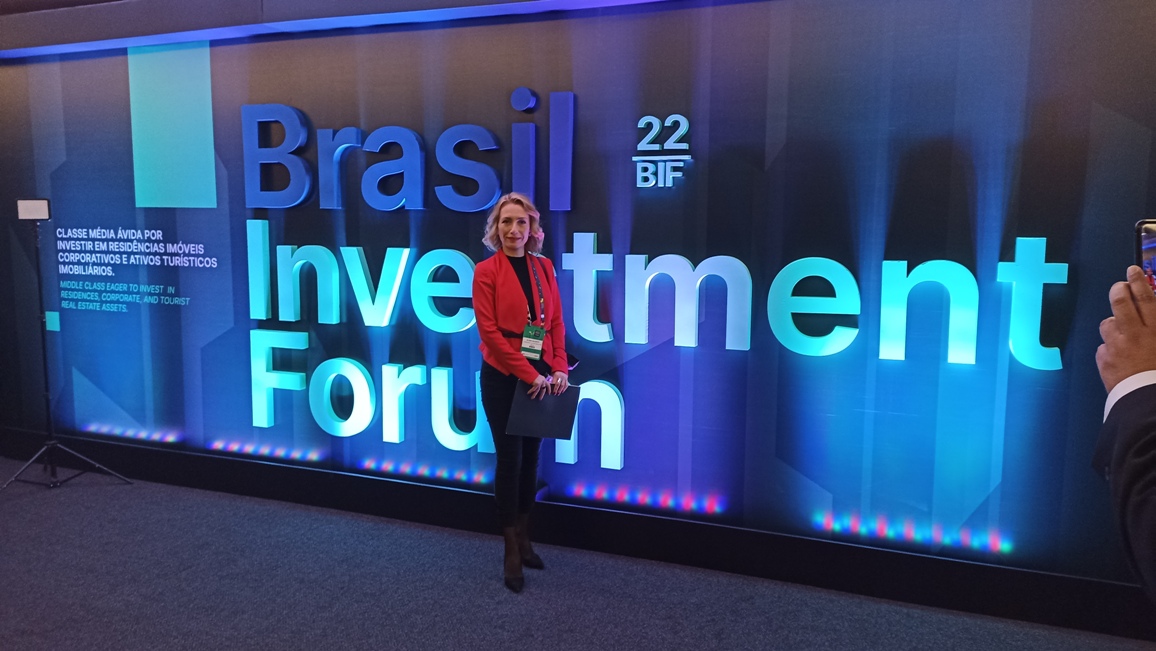 |
|
|
| ENCARREGADA DE NEGÓCIOS JELENA BLAŽEVIĆ RECEBE O TÍTULO “DIPLOMATA DO ANO 2022” – 29.03.2022. |
|
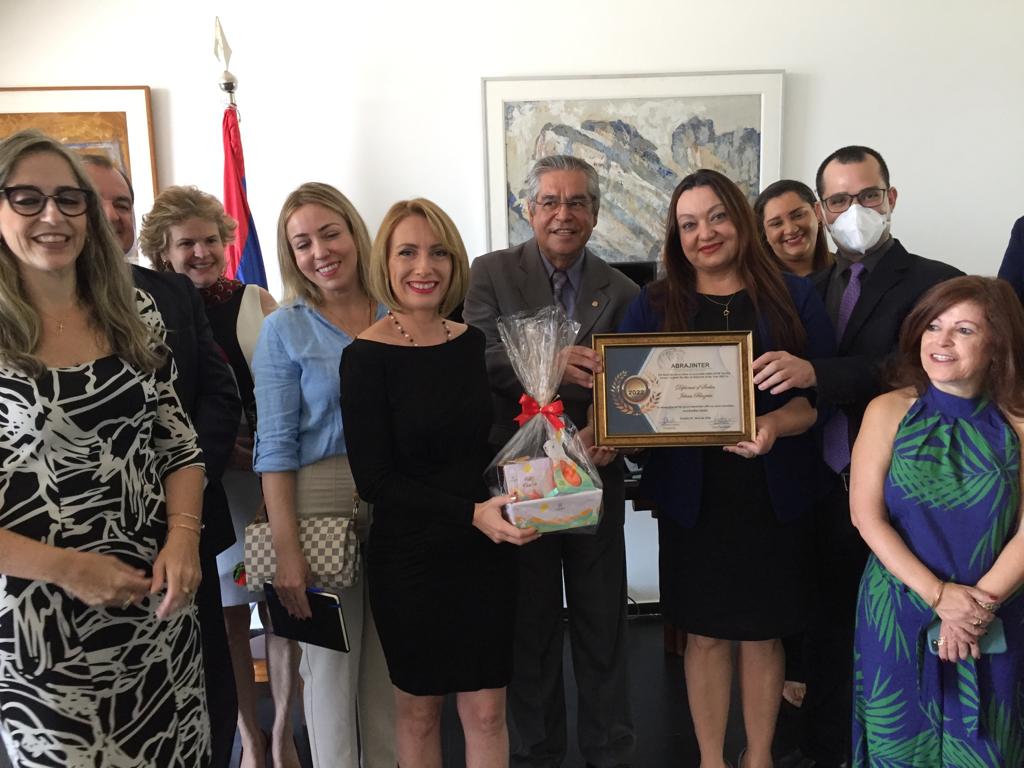
ENCARREGADA DE NEGÓCIOS JELENA BLAŽEVIĆ RECEBE O TÍTULO “DIPLOMATA DO ANO 2022” – 29.03.2022.
Na embaixada da República da Sérvia, no dia 29 de março foi realizada uma recepção para representantes da mídia brasileira, que contou com a presença de representantes dos principais meios de comunicação, membros da ABRAJINTER - Associação dos Jornalistas Brasileiros na área de política externa e diplomacia.
Durante o evento, encarregada de negócios Jelena Blazevic, realizou uma apresentação sobre o potencial de investimentos estrangeiros na República da Sérvia. A Chefe da Missão diplomática enfatizou a importância dos atuais acordos de livre comércio da República da Sérvia, que permitem a colocação de bens produzidos na Sérvia em terceiros mercados de mais de 1,3 bilhão de consumidores e benefícios do governo sérvio introduzidos como incentivo ao investimento estrangeiro. Em seguida, apresentou as características culturais e históricas do país, onde se destacaram as belezas e riquezas naturais, bem como o património religioso e histórico, com especial destaque aos potencias turísticos da Sérvia. Durante o almoço oferecido pela embaixada foram servidas especialidades da gastronomia da Sérvia, preparadas de acordo com receitas tradicionais.
Na ocasião foi concedida uma placa de homenagem de Diplomata do Ano de 2022 a Blazevic devido a sua interação com jornalistas brasileiros por formação e grande imprensa Brasileira. Sua maneira democrática e aberta de expressão e sua amizade com jornalistas foi fundamental para a escolha da honraria. Jelena foi a primeira Diplomata a receber o Título no ano de 2022.
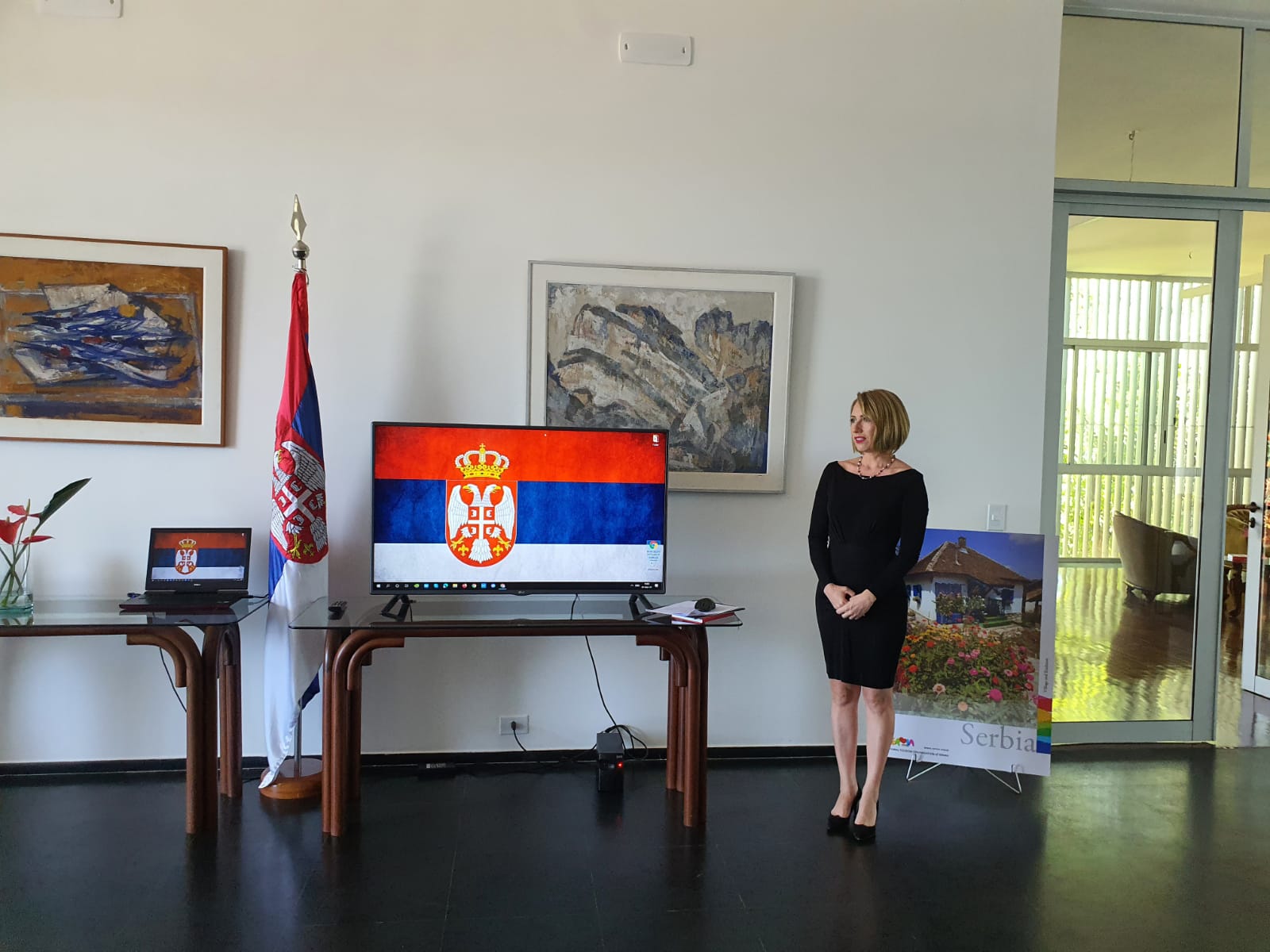
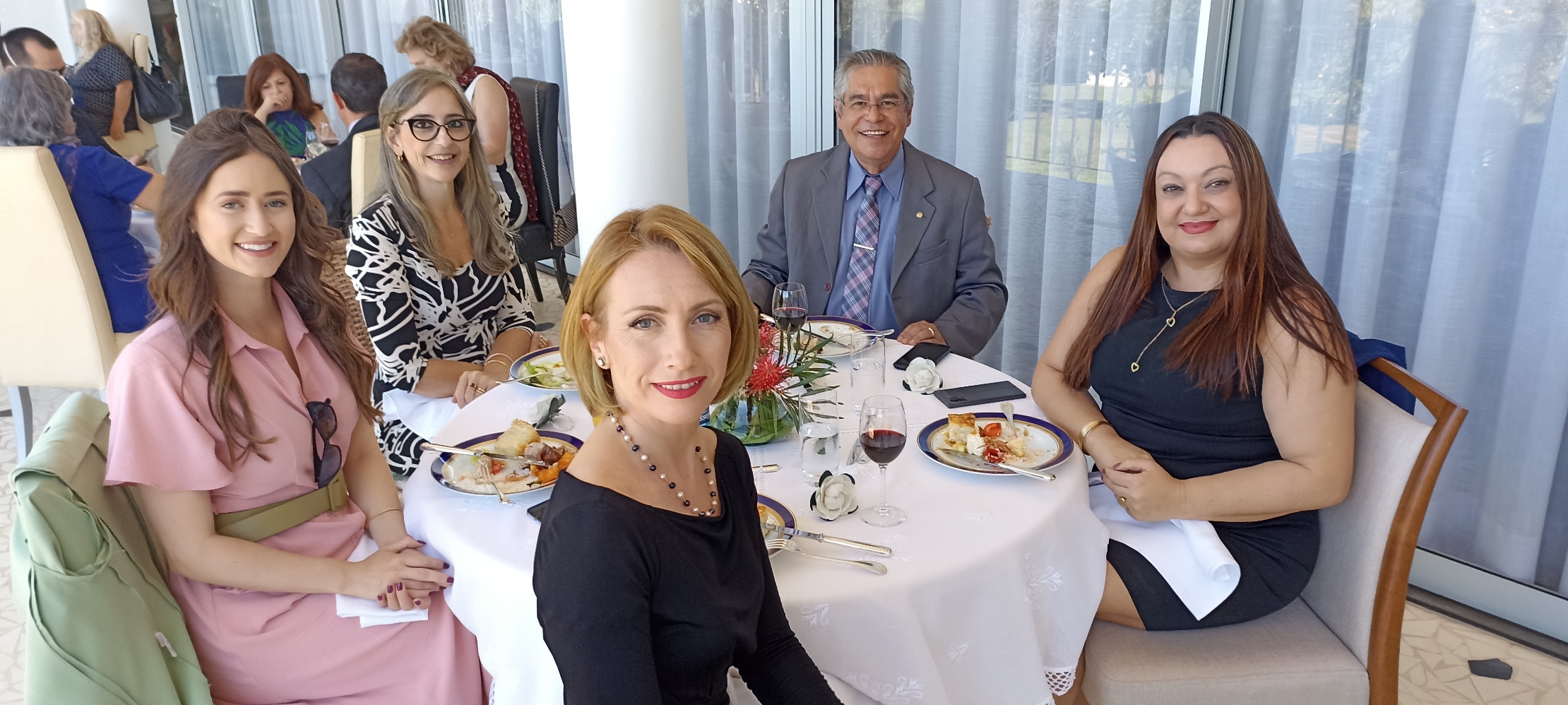
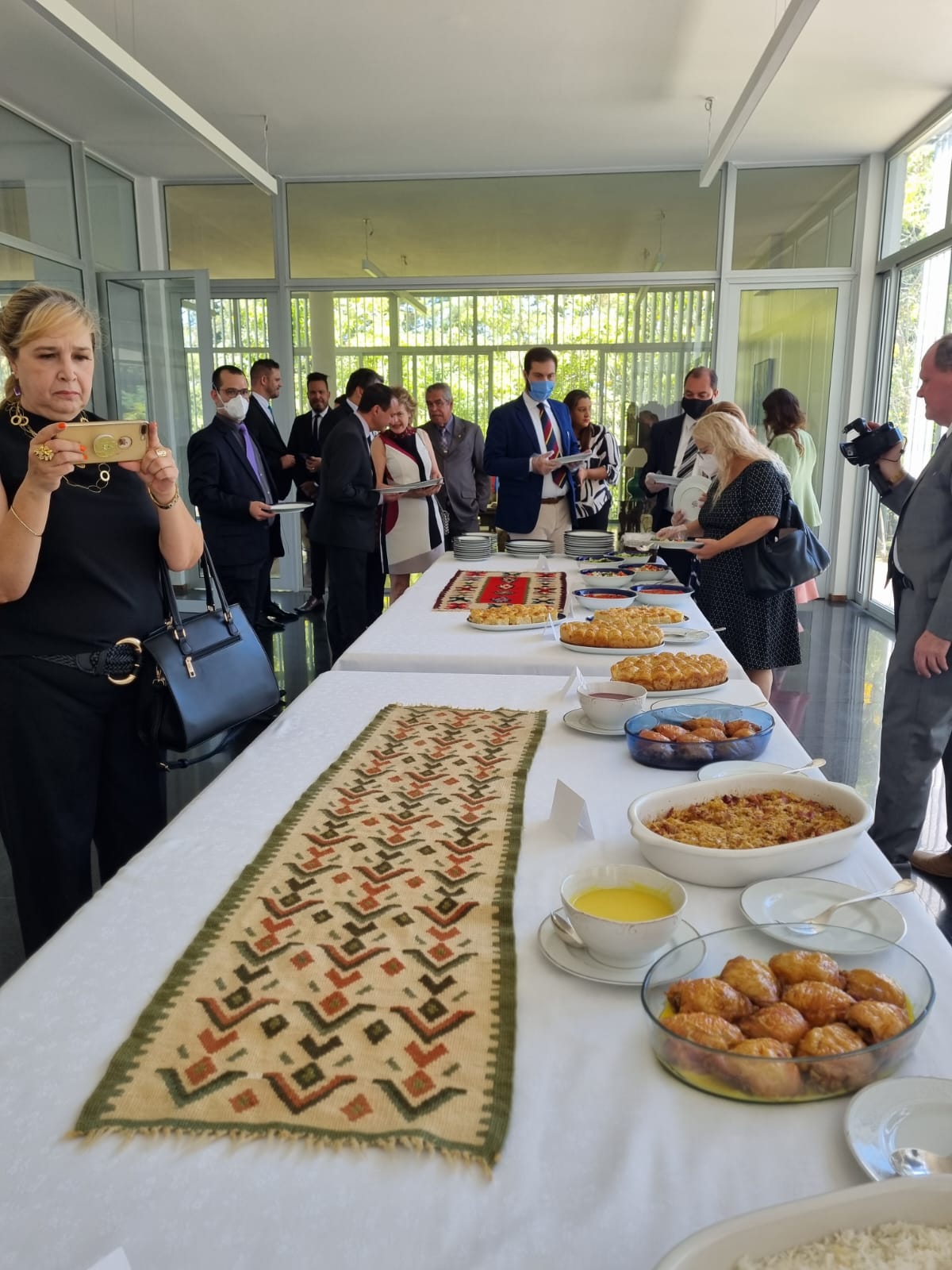
|
|
|
| Selaković: Brazil is a very important political and economic partner of Serbia |
|
10. Mar 2022.
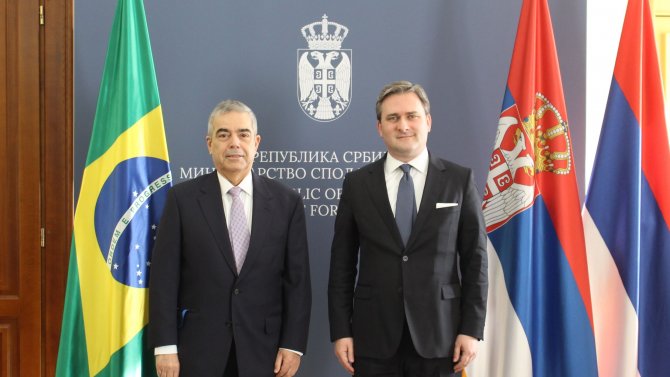
Today, the Minister of Foreign Affairs, Nikola Selaković, met with the Ambassador of Brazil, Eduardo Botelho Barbosa, whose term of office in our country is ending.
Noting that the two countries are bound by decades of friendship, mutual understanding, and support, Selaković said that Serbia is determined to continue strengthening overall relations with Brazil
The Minister pointed out that Brazil is one of our most important political and economic partners in Latin America, but also pointed out that there are untapped potentials for improving cooperation in many areas.
The head of Serbian diplomacy pointed out that Serbia is constantly improving the business environment as well as the conditions in order to attract foreign direct investment, and called on Brazilian investors to increase their presence in our country.
Selaković thanked Brazil for its principled position on Kosovo and Metohija and support for Serbia's positions in international organizations, and noted that Brazil has taken over the position of non-permanent member of the Security Council, saying that we can expect continued Brazilian support on issues of interest to Serbia.
Finally, Selaković thanked Ambassador Barbosa for his contribution in strengthening friendly relations between Serbia and Brazil, wishing him good health, happiness, and professional success. |
|
|
| Edifícios da Bibliuoteca Nacional e do Museu Nacional com as cores da bandeira sérvia 15 de fevereiro de 2022 |
|
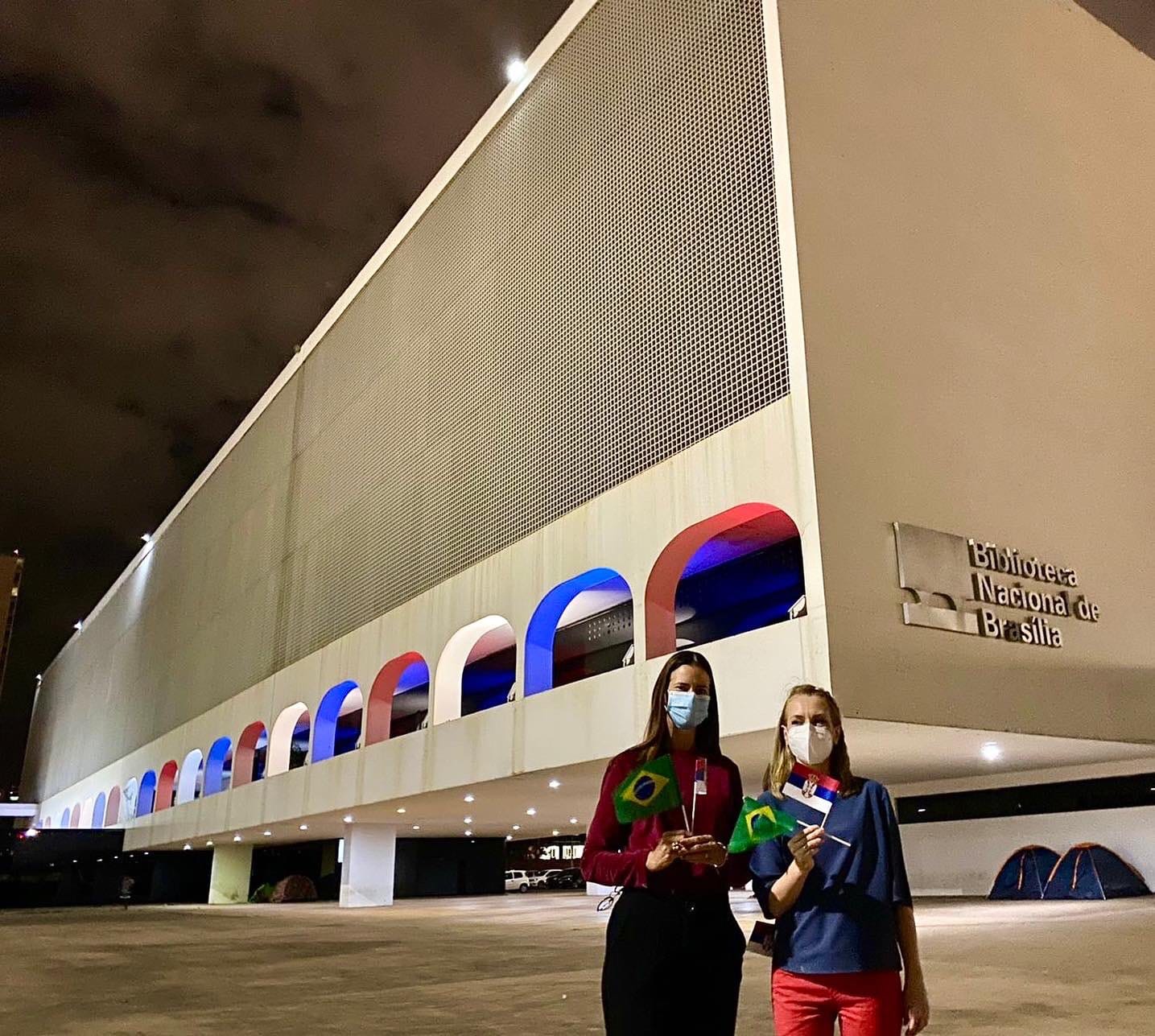
Por ocasião da Data Nacional da República da Sérvia, no dia 15 de fevereiro, em cooperação com a Embaixada e o Escritório de Assuntos Internacionais do Governo do Distrito Federal, foram iluminados com as cores da nossa bandeira os prédios da Biblioteca Nacional do Brasil e do Museu Nacional da República.
Os prédios, que estão localizados na principal praça cultural de Brasília, ficarão iluminados até o final desta semana, ou seja, até 18 de fevereiro.
A Encarregada de Negócios a.i. da República da Sérvia em Brasília, Sra. Jelena Blažević, e os funcionários da Embaixada, em cumprimento das medidas introduzidas para evitar a propagação da pandemia, celebraram a Data Nacional de maneira adequada , na presença de Renata Zuquim, chefe da Secretaria de Cooperação Internacional do Governo do Distrito Federal e vários cidadãos sérvios residentes em Brasília.
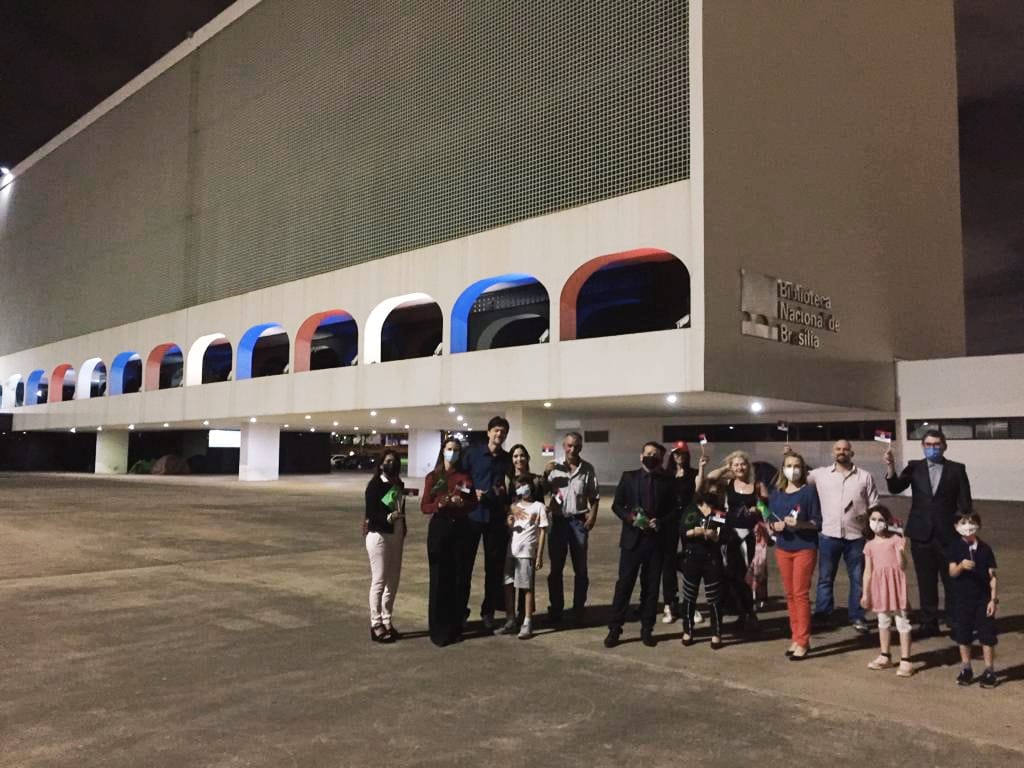
A Encarregada de Negócios a.i. Jelena Blažević participou do projeto do Governo do Distrito Federal "Minuto dos Embaixadores" por ocasião da Data Nacional da República da Sérvia. Em uma mensagem de um minuto, ela falou sobre o turismo e inúmeras outras potencialidades do nosso país, além da história do prédio da Embaixada. Ela mencionou que o prédio também é a primeira embaixada (antiga República Federativa Socialista da Iugoslávia) a ser construída em Brasília após a decisão do governo brasileiro de transferir a capital do Rio de Janeiro para Brasília.
O vídeo pode ser assistido aqui:
https://www.instagram.com/tv/CaAc8pQs6TZ/?utm_source=ig_web_copy_link |
|
|
| Belgrade to get Centre for Fourth Industrial Revolution |
|
7 February 2022
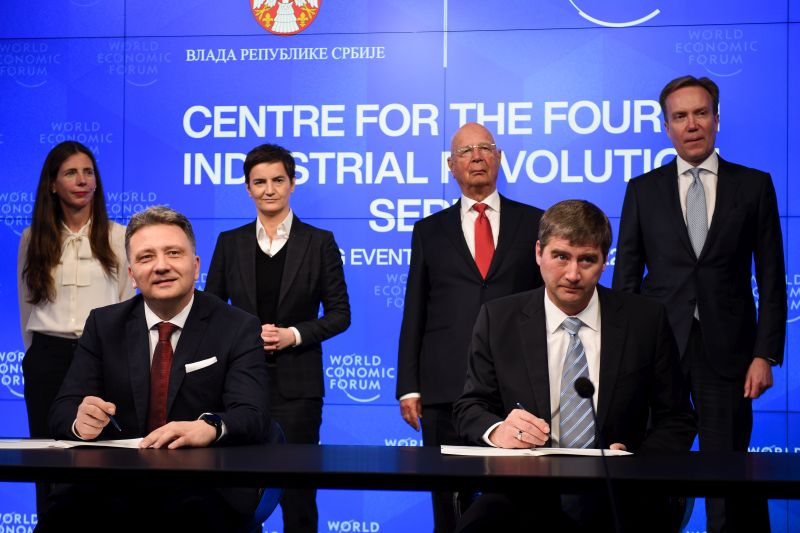
Prime Minister Ana Brnabic attended today in Geneva the signing of the Agreement on the Establishment of the World Economic Forum Centre for the Fourth Industrial Revolution in Serbia, the first of its kind in the Western Balkans.
The agreement was signed at the headquarters of that forum by Director of the Office for Information Technologies and eGovernment Mihailo Jovanovic and Managing Director and Head of the Forum's Centre for the Fourth Industrial Revolution Jeremy Jurgens.
The centre in Serbia will be the 16th in the network of centres of the World Economic Forum in the world and the first in the region of the Western Balkans.
The new centre will start operating on 1 March and will function as a non-profit organisation and a platform for public-private partnership and cooperation for the Fourth Industrial Revolution, while the focus of work will be on artificial intelligence and bioengineering.
This centre will work within the Serbian government’s Office for Information Technologies and eGovernment and will cooperate with scientific institutes, state institutions and the private sector.
The signing of this document was also attended by founder and Executive Director of the World Economic Forum Klaus Schwab and President of the World Economic Forum Borge Brende, with whom Brnabic had previously met.
Addressing the press, Brnabic pointed out that this agreement is the result of many years of joint work between Serbia and the World Economic Forum.
We started talking in 2018, signed a Memorandum of Understanding, then 2020 hampered us a bit, but we continued to plan in 2021 and here we are today, she said.
According to her, the centre will be focused on the development of artificial intelligence, biomedicine and biotechnology, and on the ways in which digitalisation can raise the productivity of companies and the entire economy.
This is what further leads to higher salaries, a better standard of living, as well as to an economy that is mainly based on knowledge, creativity and innovation, Brnabic emphasised.
Today, we have received great recognition for everything that Serbia has done in the field of digitalisation, development of high technologies and paradigm shift – from an economy that was based on labour-intensive investments to digital development.
That is why this agreement shows that Serbia has been recognised as one of the leaders in the economy and IT industry in the last six years, the Prime Minister pointed out and assessed that this is the announcement of the beginning of an even closer cooperation between Serbia and WEF.
She added that they will have a joint meeting with the 16 WEF centres for the fourth industrial revolution in the world every month, at which they will talk about what each of them is doing, since each has a different focus.
That is how we will hear what everyone is doing every month, learn from each other and I am sure that the centre in Belgrade will be one of the best, the Prime Minister said.
According to her, this gives us visibility, the opportunity to further establish Serbia as an investment destination, a country good for living and investing in new technologies and knowledge.
Jovanovic said that the ecosystem formed around the centre will use the infrastructure of the National Platform for the Development of Artificial Intelligence, the Centre for Genome Sequencing and the future bioeconomic centre – BIO4 Campus.
|
|
|
| ENTRY REGIME FOR FOREIGN CITIZENS - REGIME DE ENTRADA PARA CIDADÃOS ESTRANGEIROS |
|
(updated December 27, 2021)
Foreign citizens are allowed to enter the Republic of Serbia provided that they have one of the following documents:
1. Negative RT-PCR test for the presence of SARS-CoV-2 virus while the negative Antigen FIA Rapid test is valid only if it is done in the United States of America or Republic of Slovenia, not older than 48 hours from the date of issue of the results (if there is a delay in entering the Republic of Serbia, which cannot be attributed to the passenger's fault, but is a consequence of an external event that could not have been foreseen, avoided or eliminated – delay of the flight, the departure of buses, trains, etc, then the test cannot be older than 72 hours when entering the Republic of Serbia);
2. Certificate of complete vaccination issued by the Republic of Serbia, i.e. a foreign state with which the Republic of Serbia has concluded an agreement on the recognition of vaccination (those are: Greece, Hungary, Romania, Slovenia*, Turkey, United Arab Emirates, Czech Republic, India) or with which there is de facto reciprocity in the recognition of the vaccination certificate (those are: Andorra, Armenia, Austria, Belgium, Cabo Verde, Croatia, Cuba, Cyprus, Egypt, Estonia, Finland, France, Georgia, Germany, Iceland, Ireland, Italy, Lebanon, Liechtenstein, Lithuania, Malta, Mauritania, Morocco, Moldova, Netherlands, San Marino, Slovakia, Spain, Switzerland, Tunisia, United Kingdom of Great Britain and Northern Ireland, Ukraine);
3. Certificate of overcome COVID-19 disease – a certificate or other public document stating that the holder of the document has overcome the disease caused by the SARS-CoV-2 virus, i.e. that this person has been diagnosed with the SARS-CoV-2 virus, provided that no less than 14 days or more than six months may elapse from the first test, issued by the Institute of Public Health established for the territory of the Republic of Serbia, i.e. the competent authority of the state with which the Republic of Serbia has concluded an agreement or de facto reciprocity on the recognition of such documents (those are: Andorra, Austria, Bulgaria, Greece, Denmark, Croatia, Estonia, Ireland, Iceland, Cabo Verde, Liechtenstein, Luxembourg, Germany, Romania, San Marino, United States of America, Slovenia, Tunisia, Turkey, Switzerland, Spain);
4. EU digital certificate issued by the competent authorities of states in the EU Digital COVID certificate system, regarding the trust framework for issuing, verifying and recognizing interoperable vaccination certificates of vaccination against COVID-19, tests and recovery certificates (EU Digital COVID Certificate).
Beside EU member states, the above mentioned applies also to EU digital certificate issued by the competent authorities of countries outside EU that are part of the EU Digital COVID certificate system. (List of these states may be found via following link https://ec.europa.eu/info/live-work-travel-eu/coronavirus-response/safe-covid-19-vaccines-europeans/eu-digital-covid-certificate_en#recognition-of-covid-certificates-from-third-non-eu-countries - part “Recognition of COVID certificates from third (non-EU countries”)).
The specified restrictions do not apply to:
1. Foreign citizens in transit through the Republic of Serbia – a period not longer than 12 hours from the moment of entry into the territory of the Republic of Serbia;
2. Minors up to 12 years of age.
For detailed information on COVID-19 entry into Serbia requirements, please visit website: https://mfa.rs/en/citizens/travel-serbia/covid-19-entry-requirements.
____________________________________________________________________________
(atualizado em 27 de dezembro de 2021)
Cidadãos estrangeiros podem entrar na República da Sérvia desde que possuam um dos seguintes documentos:
1. Teste de RT-PCR negativo para a presença do vírus SARS-CoV-2, enquanto que o teste rápido de antígeno FIA negativo é válido apenas se for feito nos Estados Unidos da América ou na República da Eslovênia, com não mais de 48 horas a partir da data de emissão dos resultados (se houver atraso na entrada na República da Sérvia, que não pode ser atribuído a culpa ao passageiro, mas uma consequência de um evento externo que não poderia ter sido previsto, evitado ou eliminado – atraso do voo , partida de ônibus, trens, etc, então o teste não pode ter mais de 72 horas ao entrar na República da Sérvia);
2. Certificado de vacinação completa emitido pela República da Sérvia, ou por um Estado estrangeiro com o qual a República da Sérvia celebrou um acordo sobre o reconhecimento da vacinação (são eles: Grécia, Hungria, Romênia, Eslovênia*, Turquia, Emirados Árabes Unidos, República Tcheca, Índia) ou com um no qual haja reciprocidade de fato no reconhecimento do certificado de vacinação (são eles: Andorra, Armênia, Áustria, Bélgica, Cabo Verde, Croácia, Cuba, Chipre, Egipto, Estónia, Finlândia, França, Geórgia, Alemanha, Islândia, Irlanda, Itália, Líbano, Liechtenstein, Lituânia, Malta, Mauritânia, Marrocos, Moldávia, Holanda, São Marino, Eslováquia, Espanha, Suíça, Tunísia, Reino Unido da Grã-Bretanha e Irlanda do Norte, Ucrânia);
3. Certificado de superação da doença COVID-19 – um certificado ou outro documento público atestando que o titular do documento superou a doença causada pelo vírus SARS-CoV-2, ou seja, que essa pessoa foi diagnosticada com o vírus SARS-CoV-2, desde que não menos de 14 dias ou mais de seis meses decorridos a partir do primeiro teste, emitido pelo Instituto de Saúde Pública estabelecido para o território da República da Sérvia, ou a autoridade competente do Estado com o qual a República da Sérvia celebrou um acordo ou reciprocidade de fato sobre o reconhecimento de tais documentos (são eles: Andorra, Áustria, Bulgária, Grécia, Dinamarca, Croácia, Estônia, Irlanda, Islândia, Cabo Verde, Liechtenstein, Luxemburgo, Alemanha, Romênia, San Marino, Estados Unidos da América, Eslovênia, Tunísia , Turquia, Suíça, Espanha);
4. Certificado digital da UE emitido pelas autoridades competentes dos Estados no sistema de certificado COVID-19 Digital da UE, no que diz respeito ao quadro de confiança para emissão, verificação e reconhecimento de certificados de vacinação interoperáveis de vacinação contra COVID-19, testes e certificados de recuperação (Certificado COVID-19 Digital da UE).
Além dos estados membros da UE, o mencionado acima também se aplica ao certificado digital da UE emitido pelas autoridades competentes de países fora da UE que fazem parte do sistema de certificado digital COVID da UE. (A lista destes Estados pode ser encontrada seguindo o seguinte link: https://ec.europa.eu/info/live-work-travel-eu/coronavirus-response/safe-covid-19-vaccines-europeans/eu-digital-covid-certificate_en#recognition-of-covid-certificates-from-third-non-eu-countries – na parte “Recognition of COVID certificates from third (non-EU countries”)).
As restrições especificadas não se aplicam para:
1. Cidadãos estrangeiros em trânsito através da República da Sérvia – em um período com não mais de 12 horas a partir do momento de entrada no território da República da Sérvia;
2. Menores de 12 anos de idade;
Para informações detalhadas sobre os requisitos de entrada na Sérvia em relação à COVID-10, por favor visite o website: https://mfa.rs/en/citizens/travel-serbia/covid-19-entry-requirements. |
|
|
| UNESCO’s role extremely important for preservation of Serbian heritage in Kosovo and Metohija |
|
12 November 2021
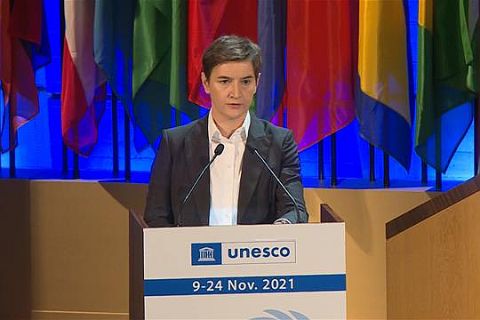
Prime Minister Ana Brnabic stated today that severe examples of endangering the Serbian cultural, historical and spiritual heritage in Kosovo and Metohija are proof of the important role of UNESCO in protecting and preserving heritage.
At the 41st session of the General Conference of UNESCO in Paris, Brnabic emphasized that four jewels of the Serbian medieval cultural heritage in Kosovo – Visoki Decani, Pec Patriarchate, Gracanica and Bogorodica Ljeviska, have been preserved thanks to the fact that they are inscribed on the endangered world heritage list. Hundreds of other sites and monuments are endangered.
The Serbian heritage in Kosovo and Metohija is of immeasurable importance, not only for the national identity of Serbia, but also as a part of the esteemed European and world heritage, she underlined |
|
|
| Address of the President of the Republic of Serbia at the United Nations climate change conference COP26 held in Glasgow |
|
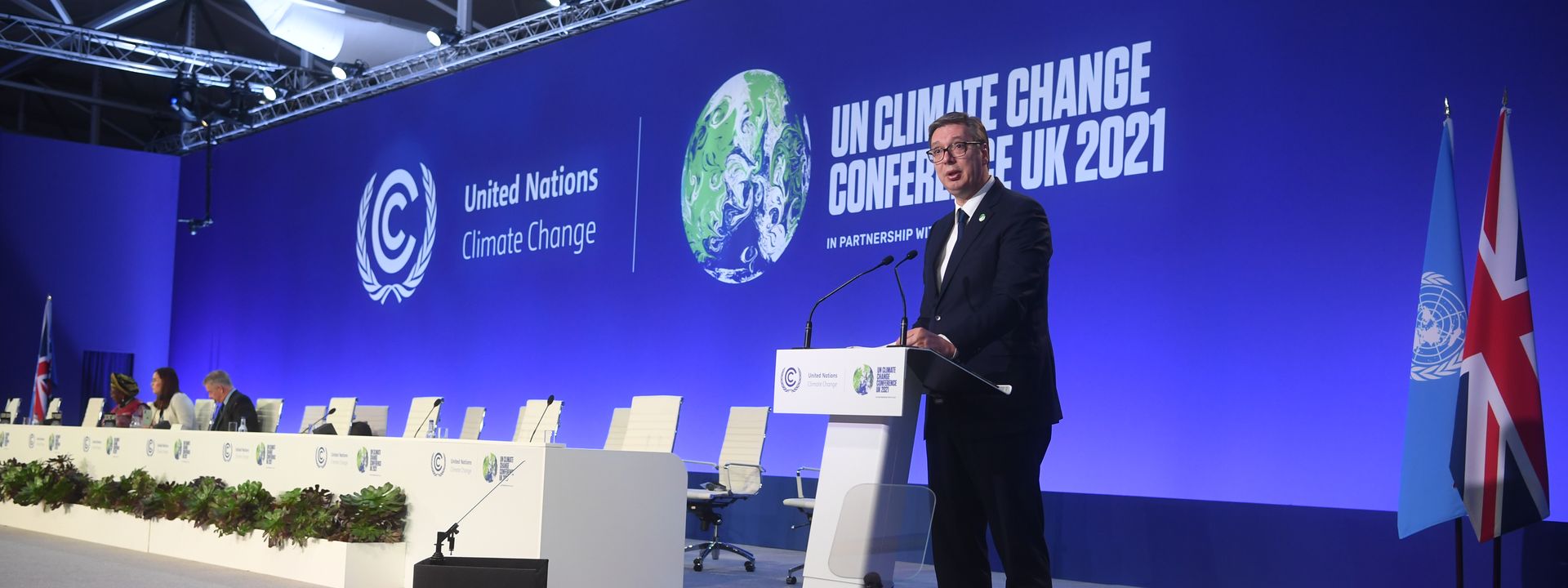
2nd November 2021
"Your Excellences,
distinguished delegates,
dear Sarah,
At the very beginning, I feel obliged to thank Prime Minister Boris Johnson and Her Majesty’s Government for exceptional hospitality.
I feel privileged to represent the Republic of Serbia at this important place and at the highest-level world forum, in working on the most important topic of today – promoting climate awareness.
We all agree that we must make investment into climate and environment.
We all, likewise agree, that future generations must be educated in order not to repeat the mistakes we made, by hurting the only Planet that makes life possible.
I am very honoured that the Republic of Serbia is co-chairing this year’s Conference as a Non-EU representative of the Eastern Europe Group.
In concrete terms, we see the special contribution of our expert team in finalising negotiations on the implementation of Article 6 of the Paris Agreement, which refers to the establishment of the global market and non-market mechanisms for reducing greenhouse gas emissions, as well as to remaining provisions referring to advanced transparency framework and common timeframes for Nationally Determined Contributions, which are the key provisions of the Agreement that have not yet been covered by the decision that is to be adopted by the Conference, i.e. all member states.
We, therefore, believe that this is an exceptional opportunity for Serbia to give its full contribution to the finalization of negotiations, which, we hope, will secure full implementation of the Paris Agreement.
As a result of strong economic development, modelled for Serbia by 2050, the impact of the implementation of climate measures to employment will be optimal, through new jobs creation and creation of new industries which have not existed so far.
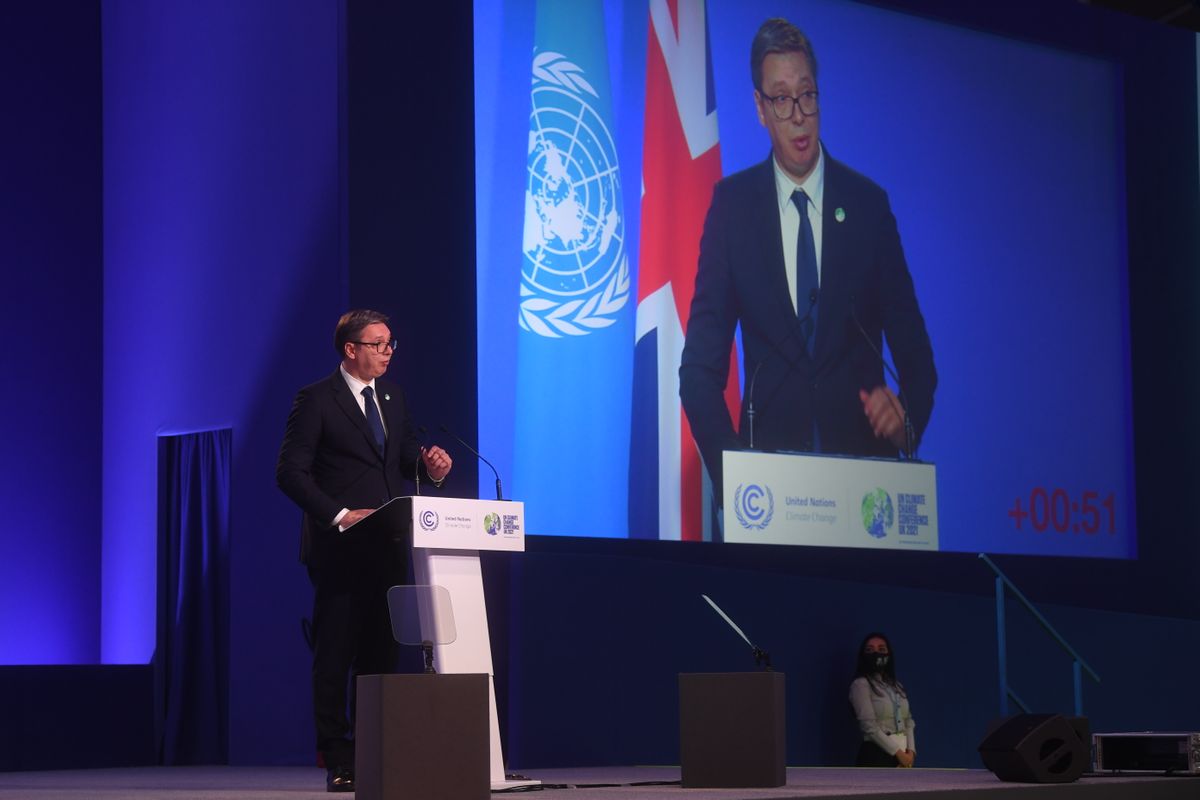
One billion euros was raised at the first green bonds auction in Serbia, which clearly confirms the trust of international investors in our green agenda, but also to the economic and political stability of our country.
Incomes from green bonds issuance will be used for financing renewables, energy efficiency, sustainable water management, prevention of pollution and circular economy development and biodiversity preservation.
And as you can see, dear friends, my people made a terrific speech for me, but I am going to add a few more words and a few more questions for those that are coming from big powers and that haven’t answered yet several questions:
Number one is: how are we going to finance all these activities?
We’ve heard the story of trillions of dollars that are at our disposal. My question would be: what would be the interest rate, what would be the terms for taking these amounts of money, and actually how are we going to tackle that issue?
Number two: how are we going to treat the nuclear power plants? Are we going to shut them all or are we going to build them more?
Then, how are we going to build more renewables if we already started endorsing populist movements against wind parks, new hydropower plants, and are we going to put in jeopardy the level of our public debt to GDP ratio if we raise huge amounts of money?
How are we going to treat natural gas, and how are we going to secure decent prices of natural gas and electricity power as well?
And, I came here using an electric car from Edinburgh to Glasgow. But, how are we going to do mining and refining of lithium, nickel, cobalt and many other very important minerals?
In the end, we all know what is our final aim, what is our final target. But, it’s not a fairytale – we’ll have to work a lot, we’ll have to be 100 per cent dedicated, and we’ll have to be more honest with each other.
The health of people living in Serbia depends directly on the implementation of this Agenda, just like the health and life of each living being on Earth depends on arrangements that will be reached here and on national implementation of the respective arrangements.
Perhaps it is the right time to listen and hear the cry of Mother Earth because if we lose this race against time, our children will inherit an irreparably polluted Planet.
Thank you very much for listening to me." |
|
|
| Selaković in UNSC: Dialogue and the implementation of the agreements reached are the only right way to resolve all open issues |
|
15th October 2021
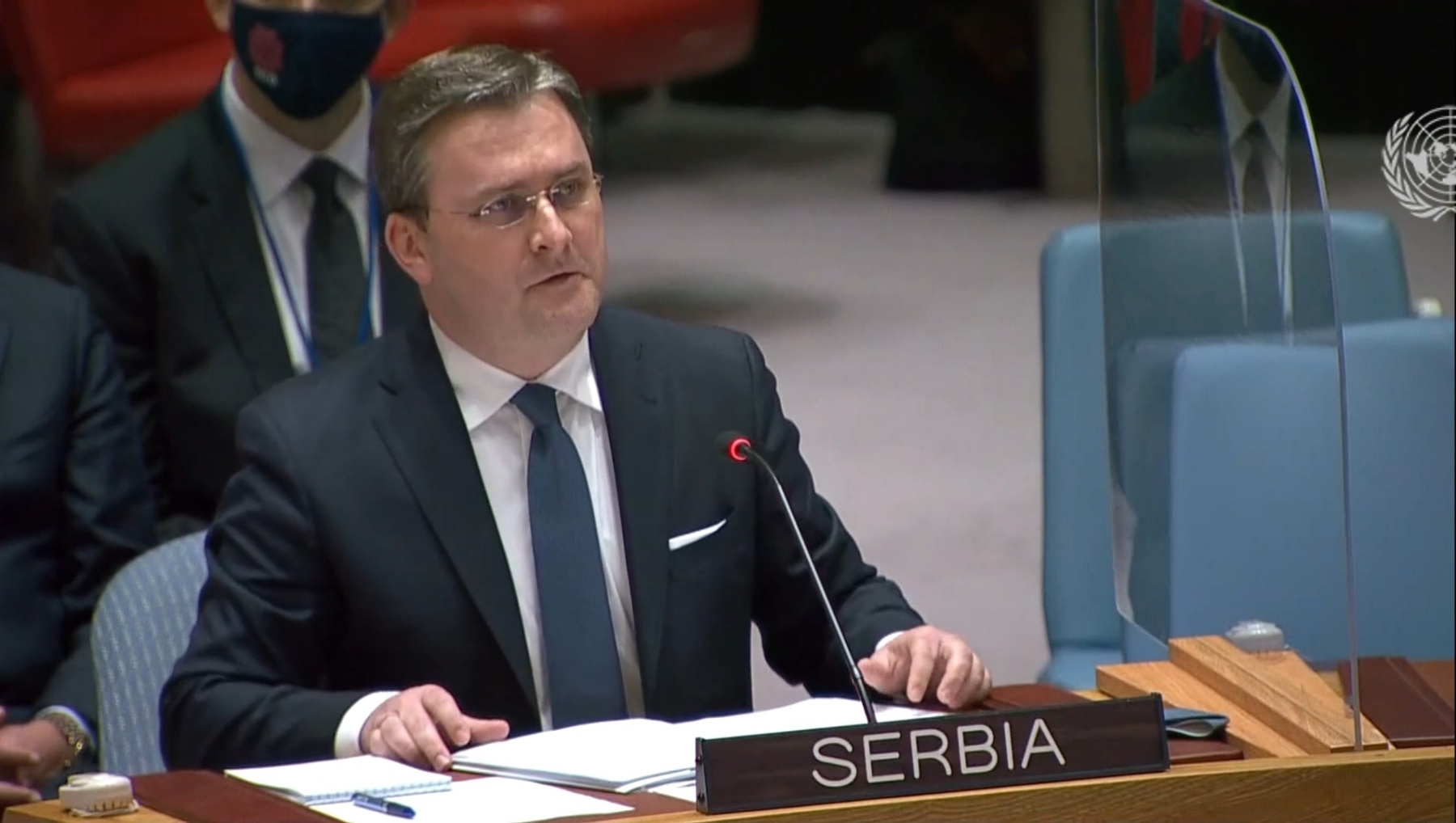
Distinguished President of the Security Council,
Esteemed members of the Security Council,
Distinguished Special Representative,
I would like to thank Secretary-General of the United Nations Mr. Guterres and Special Representative of the Secretary-General and Head of UNMIK Mr. Tanin for the report submitted and for their efforts made towards the implementation of the UNMIK mandate. I would also like to thank the members of the Security Council for the continued attention they have devoted to the issue of Kosovo and Metohija. The Republic of Serbia highly values the activities of the Mission of the United Nations in Kosovo and Metohija and supports it in carrying out its work as efficiently as possible, pursuant to the UN Security Council Resolution 1244, and undiminished in scope, aiming to build and preserve lasting peace, stability and security in the Province.
Mr. Tanin,
Please accept the expressions of our gratitude for your engagement and the cooperation we achieved during your term of office.
Mr. President,
Deep regret and concerns are raised by the fact that the security situation in Kosovo and Metohija in the past period has been marked by an increasing number of various ethnically motivated attacks and incidents targeting Serbs, which was also stated in the Report; that the provisional institutions of self-government (PISG) in Pristina continue to take unilateral steps and refuse to implement the agreements reached in the Brussels dialogue; and that institutional discrimination against Serbs, attacks on the sites of the Serbian Orthodox Church and the undermining of the economic sustainability of Serb communities in the Province have continued.
We are witnessing that dangerous provocations by Pristina are taking place every day, at an accelerated pace, thus seriously threatening the safety of Serbs in Kosovo and Metohija and directly violating the agreements and arrangements reached within the Brussels dialogue.
The latest violent incursion of the so-called ROSU units into the northern part of Kosovska Mitrovica, on 13 October, is the ninth incursion of its kind. Tear gas, shock bombs and unbridled violence are becoming a matter of everyday life for Serbs in the north of Kosovo and Metohija, and that must be stopped immediately.
In the last attack with firearms and chemicals used by Pristina special forces, 71-year-old Verica Djelic died as a result of chemicals used in the intervention, 10 unarmed civilians were wounded, one of them 36 years old Srećko Sofronijević was critically wounded in the back with of an automatic rifle. A three-month-old baby, who miraculously remained unharmed, was also the target of the shooting.
The false excuse for the latest unilateral action, as EU High Representative for Foreign Affairs and Security Policy Josep Borrell called it, was the fight against organized crime and smuggling. Ladies and gentlemen, Serbia is strongly against organized crime and smuggling, but the members of the UNSC should know that such an important and general global goal, which we all share, was cynically used for an armed attack on unarmed civilians, which began with an automatic rifle raid of pharmacies in which patients of Serbian and other nationalities are supplied with vitally important medicines. Four days before the local elections in Kosovo and Metohija, in order to gain votes in an irresponsible and inhumane way, fully motivated by separatist goals, the current PISG regime used medicines on which people’s lives depend to prove its position on the status contrary to UNSCR 1244.
Only a few days earlier, another provocation on the part of Pristina led to a dangerous crisis, when personnel of the so-called ROSU unit, armed with long firearms and reinforced with armoured vehicles, were deployed to administrative crossings between central Serbia and Kosovo and Metohija - Brnjak and Jarinje – in order to remove Serbian license plates and replace them with temporary ones, thus violently preventing the free movement of citizens.
These events do not fall within the reporting period covered by the latest Report of the UN Secretary General on the work of UNMIK, but it is incumbent upon us to address them on this occasion, in order to have everyone understand how dramatic the situation on the ground has been and how serious the consequences of Pristina's unilateral actions can be.
The incursions of heavily armed Pristina police formations, composed exclusively of Albanians, into the north of Kosovo and Metohija, under various pretexts and motives, with the use of excessive force, are provocations that have an extremely dangerous potential to destabilize the already sensitive security situation on the ground. The goal of the latest incursions of Pristina’s special force personnel into the north of the province was to provoke the Serbs and additionally intimidate them with a demonstration of force, as well as to provoke Belgrade to react hastily in some way.
It is obvious that with such moves Pristina aims to erase the 10 years of dialogue, which is the only way to resolve open issues. These provocations once again demonstrate that the provisional institutions of self-government in Pristina, not only do not intend to implement everything agreed in the Brussels dialogue, but that their goal is to completely deny dialogue as a means of resolving problems. An effective response to Pristina's lack of credibility and their dangerous play with fire, which could have unforeseeable consequences, cannot be provided by calling on "both sides" for constructiveness and restraint, which has long been a manner in public communication of some important factors in the international community. There is only one source of destabilization, it has a name – and that is the provisional institutions of self-government in Pristina - and after the events of 13 October, it is clear that it can and needs to be stopped by urgent and decisive action of the international community. It is now quite obvious that these are no longer sporadic and isolated provocations by Pristina, but that this is an organized campaign of ethnically motivated violence and discrimination against Serbs.
We also express our concern over the latest imposition of tariffs by Pristina on certain products originating from central Serbia, which was made public on 8 October. We remind you that the unilateral decision of Pristina to impose duties on products from central Serbia in November 2018 resulted in a de facto complete trade blockade and a long-term stalemate in the dialogue between Belgrade and Pristina. In contrast to Pristina, which persistently seeks to raise barriers towards central Serbia through unilateral acts, Belgrade is persistently and consistently working to liberalize the flow of people, goods, services and capital, which is the basic goal of our "Open Balkan" initiative. North Macedonia and Albania joined this initiative, but Pristina did not.
Distinguished members of the Security Council,
In the period from March to September this year, which is covered in the latest Report, close to 100 ethnically motivated attacks were carried out against Serbs, their private property, religious and cultural heritage sites. The increase in the frequency of attacks was accompanied by the strengthening of the intensity of ethnically motivated violence, which more and more often targets children, the elderly, women, the few returnees present there, as well as churches and other property of the Serbian Orthodox Church.
This systematically intensifies the ubiquitous sense of insecurity of the remaining Serbs, but also deters potential returnees, who are in fact being told that local Albanian communities can attack them with impunity and prevent them from returning to live in their own homes.
The most striking example of the position of Serbs in Kosovo and Metohija is the case of the displaced person Dragica Gašić, who moved into her apartment in the municipality of Djakovica again in early June. In that town – to which local Albanians proudly refer as a place forbidden to Serbs - Ms. Gašić, on her return, first faced physical and verbal attacks by citizens of Albanian nationality living there. Instead of being provided protection, that seriously ill woman then became a victim of institutional persecution as well, that the local self-government bodies and the police unleashed against her. Since this is a person who is the first and only Serb returnee to Đakovica after more than twenty years, it was to be expected that, at that moment, at least civil society organizations would attempt to protect her rights. However, NGOs from Djakovica soon joined the activities aimed at the expulsion Ms. Gašić, including those receiving funding from international donors for projects related to strengthening democracy and the rule of law.
I must also mention the latest attack on the house of the only remaining Serbian woman in the center of Pec, retired teacher Rumena Ljubić, whose windows were stoned twice in just 24 hours on 13 October.
Dragica's and Rumena’s fate is a frightening reflection of the real situation of human rights that almost every one of over 200,000 displaced Serbs and non-Albanians would face in Kosovo and Metohija - provided that they gather the courage to return to their homes in the Province after more than twenty years. I would like to remind you again that since 1999, only around 1.9% of internally displaced Serbs and other non-Albanians have achieved a sustainable return to Kosovo and Metohija.
Therefore, I believe that the aforementioned will encourage the members of the Security Council and the international presence on the ground to devote priority attention in the future
to the issue of the return of displaced persons, which is an important part of the UNMIK mandate under UN Security Council Resolution 1244.
I therefore thank the Secretary-General in particular for keeping this extremely important issue in focus and for calling again, in the conclusions of his Report, for the creation of conditions for the sustainable return of internally displaced persons and the sustainable reintegration of returnees.
Distinguished members of the Security Council,
Serbian medieval monuments in Kosovo and Metohija, including monuments that, due to their exceptional value but also constantly being subject to threats are inscribed on the UNESCO List of World Heritage in Danger, are still among the most endangered cultural heritage in Europe.
I wish to recall that there are over 1,300 Serbian churches and monasteries in Kosovo and Metohija. Attacks on Serbian cultural and religious heritage are at the same time attacks on the identity of Serbs in the Province and directly affect their sense of safety.
A striking example of disrespect for Serbian cultural and religious monuments in the Province is the case of the Visoki Decani monastery. The monastery, which has been the target of attacks and shelling several times since 2000, is still secured by KFOR forces due to being under a threat. It is faced with a series of hostile actions, and the perpetrators are not deterred by the fact that this is a World Heritage Site. Despite frequent declaratory statements, even the decision of the so-called "constitutional court" of the PISG in Pristina five years ago confirming ownership of Visoki Decani Monastery over 24 hectares, is not respected. We welcome the assessment made by the UN Secretary General in his Report.
Dear Mr. President,
The Republic of Serbia remains committed to finding a compromise political solution, as prescribed under Resolution 1244, which will ensure lasting peace and stability. We firmly believe that dialogue and the implementation of the agreements reached are the only right way to resolve all open issues.
As a state committed to the respect for international law and a member of the United Nations, Serbia opposes any attempt at establishing an artificial balance between the parties in the dialogue, as well as the relativization of responsibility for unilateral acts.
We note with concern that not even eight years after reaching the Brussels Agreement, the establishment of the Community of Serb Municipalities has not been initiated, although Belgrade has fulfilled all its obligations under that agreement.
There are also numerous and repeated examples of Pristina violating or obstructing agreements reached in dialogue, in the areas of energy, justice, freedom of movement and visits by officials.
One such example is the verdict sentencing Ivan Todosijevic to two years in prison, which is also pointed out in the Secretary General's Report. The Brussels Agreement was directly breached, which was also stated by the representatives of the European Union. With its conduct Pristina caused immeasurable damage to the reconciliation process in Kosovo and Metohija.
Despite the interpretation from the European Commission that this is a violation of the Brussels Agreement, because Todosijevic had to be sentenced by a panel consisting of the majority of judges of Serbian ethnicity, Pristina still does not take any action in this regard.
Pristina also continued with the practice of banning Serbian officials from entering the territory of the Autonomous Province of Kosovo and Metohija.
We believe that it is important that the international community, and especially the European Union, as the guarantor of the agreement, firmly insists that the provisional institutions of self-government in Pristina start implementing all the agreements reached.
Distinguished members of the Security Council,
As before, the Republic of Serbia remains fully committed to resolving the issue of missing persons, as also demonstrated through full cooperation with relevant international mechanisms as well as participation in the work of the Working Group on Missing Persons. We expect that the representatives of the provisional institutions of self-government in Pristina will fulfill their obligations.
Bearing in mind everything I delivered here today in my address, we hold the position that the international presence in Kosovo and Metohija, pursuant to UN Security Council Resolution 1244, is still necessary. In addition to UNMIK, the presence of KFOR as the main guarantor of security and EULEX, due to its engagement in the field of the rule of law, is also important. I would like to emphasize once again that Serbia fully supports respect for international law, comprehensive implementation of UN Security Council Resolution 1244 and activities of UNMIK in an undiminished scope and with adequate financial resources, so that the Mission fulfills the mandate entrusted to it under the Resolution.
Thank you.
|
|
|
| Selaković in New York with 28 foreign ministers on economic successes of Serbia and K&M situation |
|
25 September 2021
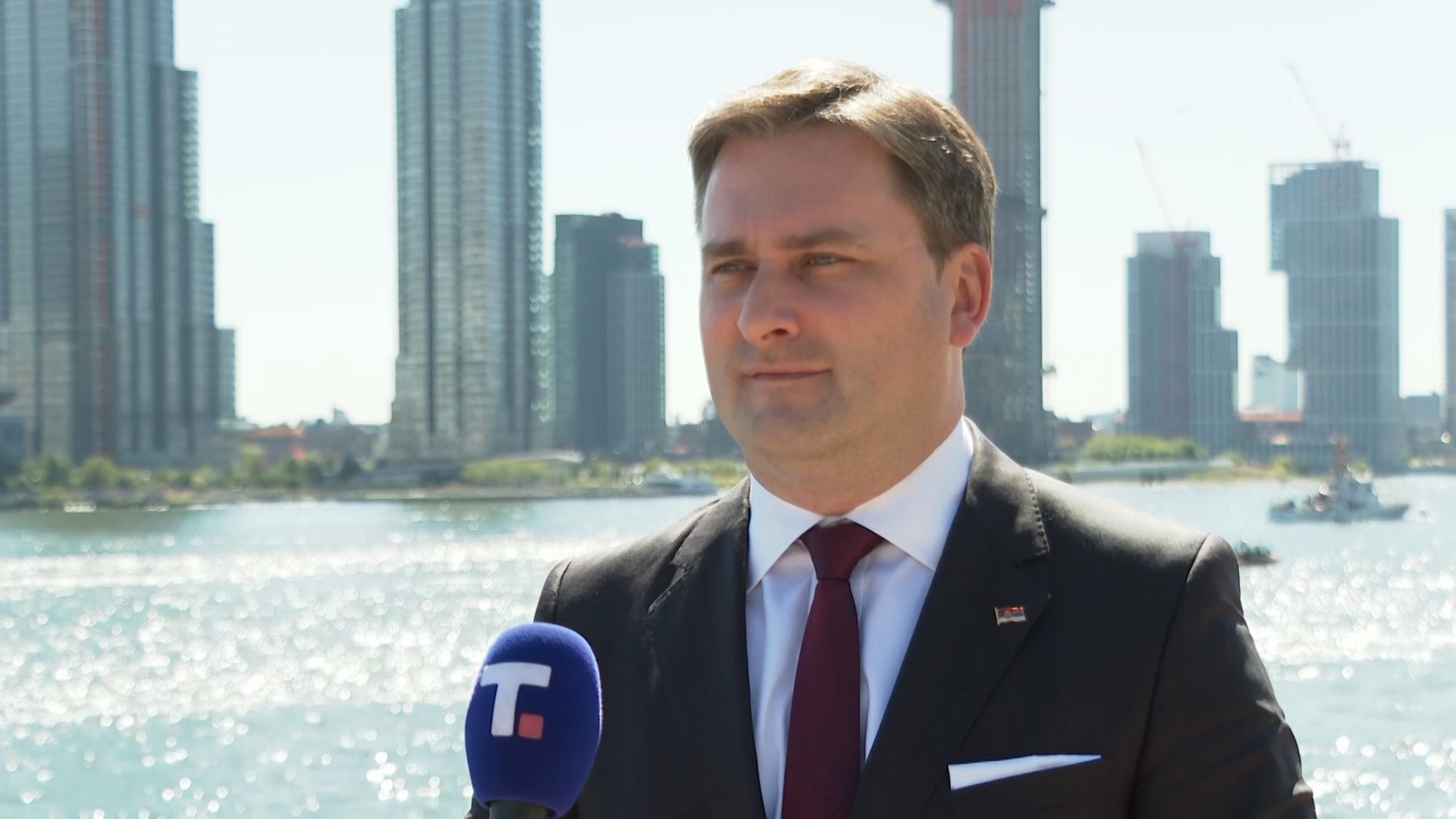
The Minister of Foreign Affairs of Serbia, Nikola Selaković, has stated that in New York he introduced foreign ministers of 28 countries to economic success of Serbia but also to the situation in Kosovo and Metohija, which he also discussed with the Russian Minister of Foreign Affairs, Sergey Lavrov, who told him that we could count on the support of the Russian Federation, with regards to Serbian interests in K&M.
Summarizing results of his visit to New York within the session of the UN General Assembly, Minister Selaković says that one of the last meetings was with Minister Lavrov, which was their third meeting in the previous nine months.
The Serbian Foreign Minister says that he surely used this opportunity, too, to introduce Minister Lavrov to the latest events in northern Kosovo and Metohija, the situation of the dialog between Belgrade and Priština and very clear and unambiguous attitude of President Aleksandar Vučić regarding the continuation of the dialog and subsequent events in K&M.
“We discussed the principled support of the Russian Federation, which is constantly present not just in Moscow, Belgrade, in the field, but also here in the East River, by the delegation of the Russian Federation as the permanent member of the UN Security Council. Of course, we will continue to maintain this type of dialog. What Minister Lavrov said was that we could count on the support of the Russian Federation in future with regards to our interests in K&M”, highlighted Minister Selaković.
He said that he had had the opportunity in New York to hold 33 meetings, of which 28 with ministers of foreign affairs, whom he had introduced also to topicalities related to the latest events in Kosovo and Metohija, but also to our principled position regarding the observance of the international public law, territorial integrity and sovereignty.
Minister Selaković said that his colleagues at the meetings had praised the substantial and fantastic success of Serbia in the consolidation of the economic sphere and transformation of what had been on the edge of collapse and economic disaster seven years before to the fastest growing economy in Europe, which Serbia was in the past two years.
He said that most of his interlocutors had supported our reforms and expressed great respect toward what President Aleksandar Vučić and Serbia had done in the previous period.
Many of them, says the Serbian Foreign Minister, showed great interest in the manner in which Serbia organized the figth against Covid 19.
“It was a great pleasure and pride to represent the Republic of Serbia in all these meetings. Many of my colleagues confirmed their arrival to Belgrade to the Conference on 11th and 12th October, which is dedicated to the 60th anniversary of the foundation of the Non-Allied Movement”, said Minister Selaković.
He emphasized that it was not just the evidence of how much they had cared to come to Belgrade to the conference, but also to see and witness the Serbia which after several decades of attempts to fight different challenges rose to its feed, was economically consolidated and turned towards its traditional friends.
“That is a great deal and our country will surely during October be one of the spots on Earth of greatest importance for multilateralism, for cooperation among the countries which share the same values, the values entered into the UN Charter and which are based on the promotion and fight for peace, equality, observance of the international public law and rights of every country to pursue its path to happiness and better and more ordered society in compliance with the wishes of its population”, said Minister Selaković.
He said that the Minister of Foreign Affairs of Azerbaijan, Jeyhun Bayramov, would come to Belgrade to the conference on the occasion of the Non-Allied Movement adding that we had strategic cooperation with Azerbaijan and frequent contacts.
“We agreed to realize as soon as possible after the Belgrade conference his bilateral visit to Serbia”, added Minister Selaković.
He said that it had been agreed to intensify the cooperation and finalize the agreements which should be signed and after that realized when the meeting of Serbian President Aleksandar Vučić and Azerbaijan President Ilham Aliyev took place.
Minister Selaković says that the Ministry of Foreign Affairs had recently received its sector for economic diplomacy and there were great expectations from it and one of the tasks was to deepen the cooperation with Azerbaijan. |
|
|
| Telephone conversation of President Vučić and General Secretary of NATO |
|
26 September 2021
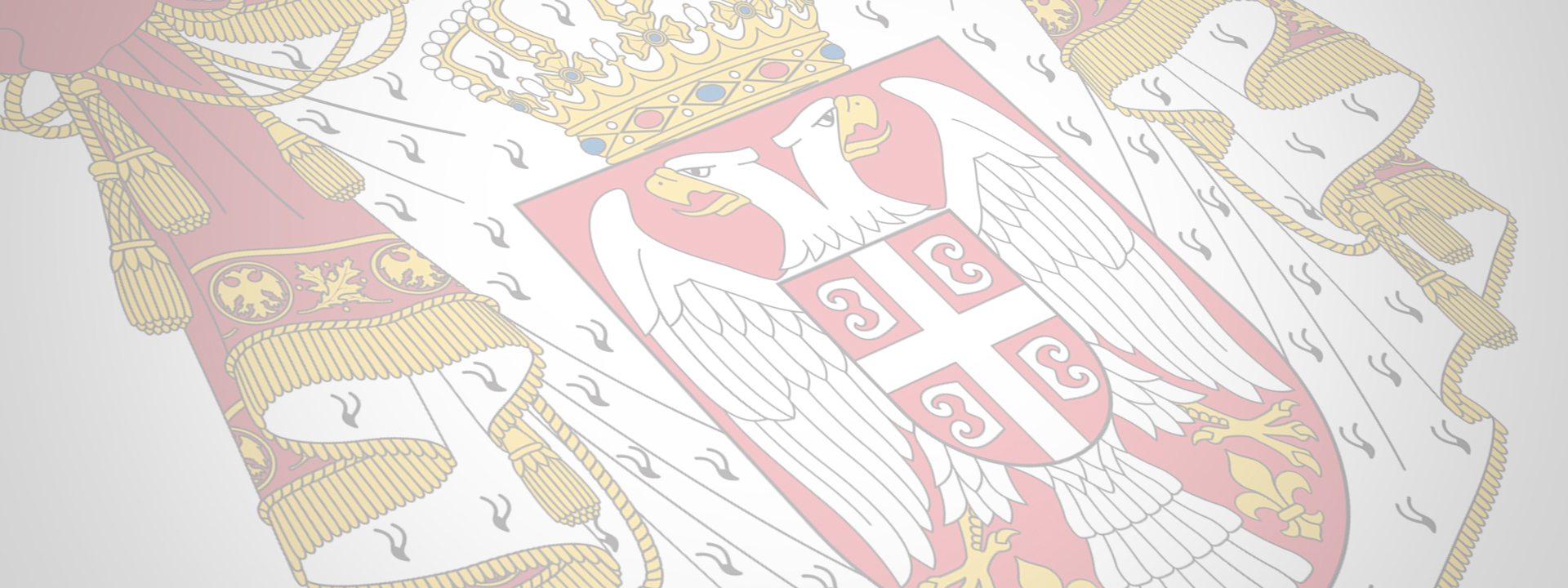
The President of the Republic of Serbia, Aleksandar Vučić, has discussed today by phone with the General Secretary of NATO, Jens Stoltenberg about, as the General Secretary said, worrisome situation in northern Kosovo and Metohija.
President Vučić said that Serbia had not violated either Brussels Agreement or Resolution 1244 by anything, by any single move or in any manner jeopardized peace preservation.
“The complete occupation by armored vehicles of northern Kosovo and Metohija has lasted for seven days and it is conducted by Priština and everyone in the international community “are thunderously silent”, said Serbian President. “However, everyone is worried all of a sudden when they spot Serbian helicopters and airplanes at the territory of central Serbia, because apparently they should not exist, or should not take off until they receive the approval from Kurti or someone from the international community”, says President Vučić.
Serbia observes all international agreements it signed, Serbia will always conduct responsibly and seriously, but Serbia is still asking when the formation of SMC will start and when Kurti’s armored units will be withdrawn from northern Kosovo and Metohija.
Finally, with the gratitude to General Secretary Stoltenberg for the fair relation and wish to listen to the Serbian side, President Vučić asked about the norm and international regulation violated by Serbia? Today, yesterday or any time?
The two interlocutors agreed to stay in constant touch due to necessity of the preservation of peace and stability in the entire region.
|
|
|
| Pristina seriously jeopardised regional stability |
|
25 September 2021
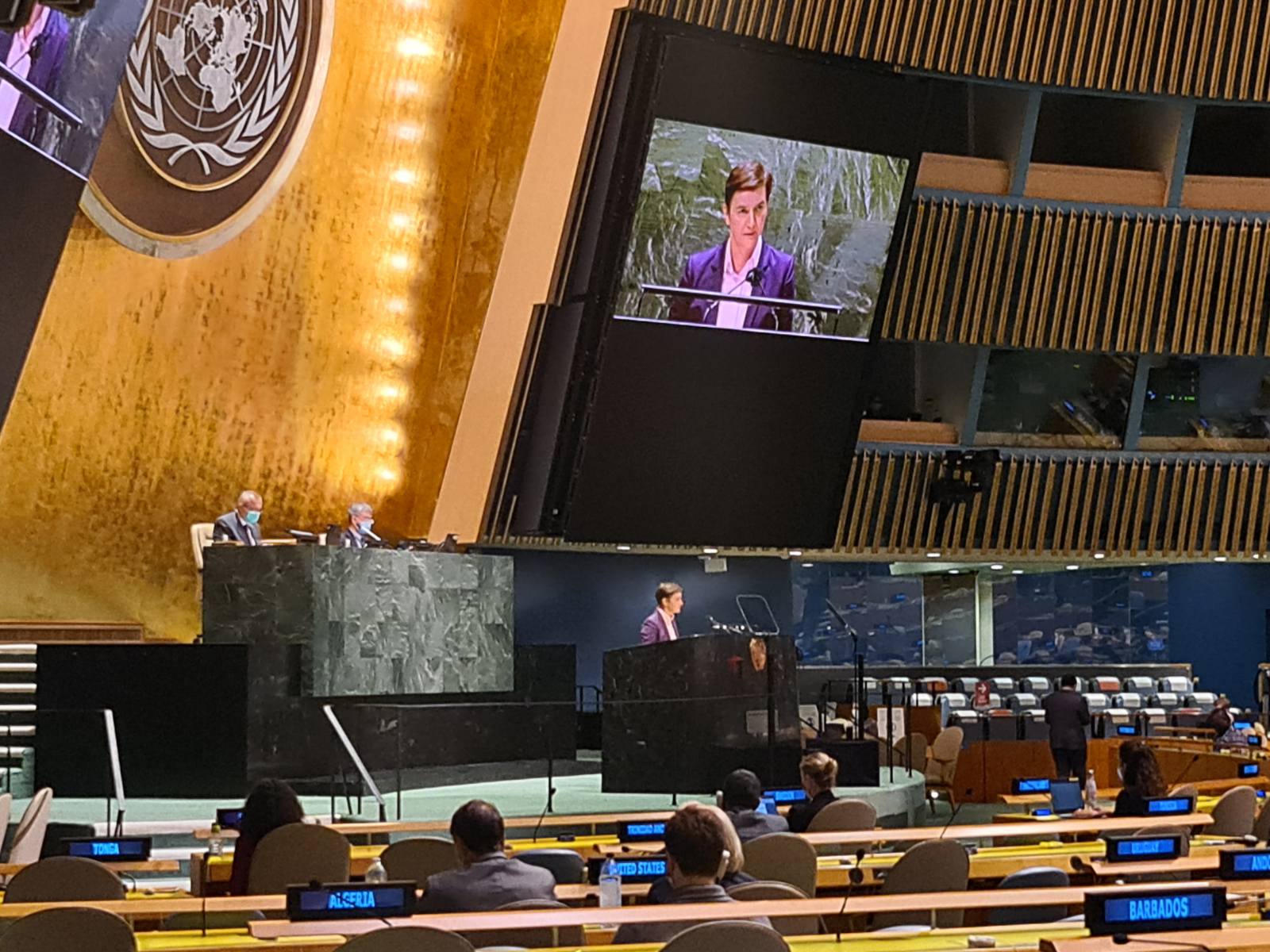
Prime Minister Ana Brnabic warned today that Pristina has seriously jeopardised local and regional stability after sending heavily armed special units to the north of Kosovo who are exerting ` against the peaceful Serbian population.
Brnabic spoke at the general debate of world leaders, as part of the 76th session of the UN General Assembly in New York.
We bring the Prime Minister's speech in its entirety:
Mr. President,
Mr. Secretary General,
Excellencies,
Ladies and gentlemen,
I have the great honor to address you today on behalf of the citizens of the Republic of Serbia.
Esteemed Excellencies Mr. Abdulla Shahid, Mr. Volkan Bozkir and Mr. António Guterres, I would like thank you for the active engagement, dedication, and leadership you have shown during these difficult times for the United Nations and all of humanity.
Serbia shares your conviction and we remain fully committed to supporting your efforts.
This year, we come together at a decisive moment in our history.
Covid-19 has shaken our foundations to the core.
At the same time, we are increasingly witnessing and experiencing effects of climate change.
And, finally, we are seeing significant shifts in global partnerships and alliances, trade wars between traditional partners and allies, protectionism instead of openness and free market, and overall uncertainty at an unprecedented scale.
Some of the pressing and extremely emotional issues that we have locally, in the Balkans, are still unresolved and while we are trying – and Serbia is especially dedicated to this – to change the future by working together and creating alliances, through initiatives such as the Berlin process or Open Balkan, others are trying to disrupt these processes, and instead of focusing on the future, they want to recreate the past – whatever the cost of that may be.
But, let me start with COVID:
COVID-19 pandemic has exposed critical weaknesses in the architecture of global governance. It has threatened to erase the progress many nations have achieved in recent years.
It has placed nations at a junction between isolation and collaboration, between panic and hope, between chaos and order.
The pandemic questioned some of the basic tenets of the open and cooperative international order.
Global exchanges, international communication, cross-border trade have all seen a vast decrease.
Curfews, restrictions on freedom and lockdowns of entire societies have created uncertainty in many segments of the individual lives of our citizens or – for that matter – our own individual perception of what freedom in today’s world even means.
For Serbia, this pandemic threatened to undermine everything we have been doing for the past 7 years, to crush all of the results and accomplishments of difficult reforms we initiated in 2014, and to propel us back to the times of high unemployment, rising public debt, uncontrollable deficit, and overall desperation.
Much as in any other country, COVID-19 has tested our nations’ resiliency and, this time, unlike during the global financial crisis – which was of much more limited scope and incomparable in consequences to COVID-19 pandemic – Serbia stood strong.
The reforms we undertook in the pre-COVID times made us more resilient than ever.
The fiscal consolidation, the budget surplus we had, efficient and predictable investment environment, became a lifeline that saved us from a recession during the pandemic and one that ensured we could support our citizens and our economy during these, most difficult of times.
Despite the effects of the crisis, Serbia has managed to preserve financial and economic stability. In 2020, we recorded a decline in GDP of only 0.9% – one of the best results in Europe. Our public debt remained below 60% of our GDP, average salary continued to grow by almost 10%, while despite the pandemic the number of people employed increased by over 3%.
The recovery in this year has been stronger than expected – our GDP will grow approximately 7%, and perhaps even stronger.
Prior to the pandemic, we have opened our borders to investment, technology, and ideas, and we managed to create peaceful and stable environment that allowed us to pursue rapid domestic transformation, with innovation and knowledge-based economy as the foundation.
The innovative advances we had made allowed us to diversify our capabilities when the virus hit – through e-Government, online education and digital textbooks, or central software system for a successful vaccination rollout.
We invested heavily in health infrastructure and strengthened the health system in order to respond to the current crisis, eternally grateful to the health care workers for their dedicated struggle.
Our decision to put geopolitics aside, and people at the center of our policies, is the reason we were able to acquire vaccines quicker than most other nations.
We did not discriminate between manufacturers, did not care whether vaccines are from the East or from the West, but chose to negotiate with all vaccine manufacturers deemed safe by regulators. This openness gave us the ability to purchase vaccines from around the world, giving our citizens the unique freedom to choose which vaccine they prefer.
Excellencies,
Serbia believes in solidarity between nations, multilateralism and helping others when in need.
Since the beginning of this year, we have made it our mission to support our neighbors, and all those in need, with COVID-19 vaccines and we have also allowed foreign nationals to come to Serbia to receive the vaccine which will protect their lives.
In total, Serbia has donated or allocated over a million doses of vaccines – of which 230.000 doses to the region; 300.000 doses for foreign nationals which came to Serbia to get vaccinated; and additional 570.000 doses to countries of Africa and Asia.
We will keep doing so, to the greatest extent possible, and until COVID-19 is behind all of us.
That is why we have also taken steps to acquire the technology to produce at least two types of COVID-19 vaccines to help improve global access so we can all be safe and victorious.
However, as stated by dignitaries of some of the largest nations during this General Assembly, there are other pressing issues that all of us need to keep addressing without any delay and in a bold manner – and that is climate change.
Serbia has redoubled its efforts to make our country safer and cleaner for its citizens, and by doing so, contribute to the fight against climate change and for environmental protection.
We are strongly committed to the implementation of the sustainable development goals and the Paris Agreement on Climate Change. We are committed to global efforts and will continue to work actively to meet our obligations under the UN Framework Convention on Climate Change.
We are about to submit our revised Nationally Determined Contributions to contribute to this critical global effort. We have already announced our intention to reduce greenhouse gasses for at least 33.3% compared to 1990, and 13.2% compared to 2010, which we are currently incorporating into our energy and climate strategic documents.
We work strategically on planning and investments in this sector. These investments are extremely expensive, requiring years and decades of commitment and a systemic approach - but we are clearly set on the path of this transformation.
Ladies and gentlemen,
Of all the challenges we face, the most worrisome for Serbia is the maintenance of peace and stability in the southern Serbian province of Kosovo and Metohija.
For more than two decades, we have been constantly drawing international attention to the problems that non-Albanian population is facing in Kosovo and Metohija. Physical safety, respect for and protection of human rights, especially of minority communities, are far from satisfactory.
We are now witnessing a constant increase in the number of attacks targeting Serbs, their property and religious heritage in Kosovo and Metohija.
To illustrate, there were 55 such incidents in 2014, 62 in 2016, 71 in 2020, and 100 since the beginning of this year. The total number of attacks in 2020 has already been surpassed by June of this year.
According to the UN, Kosovo and Metohija is still the territory with the least number of returnees (internally displaced Serbs) of all post-conflict areas in the entire world!
I will give you just a few examples to depict how life of Serbs in Kosovo and Metohija looks like.
On the 11th of May the house of Radoje Pumpalović, 81-years old returnee to Kosovo in the village of Dubrava, in Istok municipality, was attacked. This was the 5th attack on him in the same year. Again… he is 81 years old.
Since June 2021, multiple attacks were carried out against Dragica Gašić, 59-years old woman, the first Serb returnee in Đakovica after 22 years since the end of the conflict. Attacks include stoning of her apartment, banning her from shopping for food in the local store and petitions by civil society organization demanding her eviction from the city.
On 2nd of July, in the village of Gobulji near Vučitrn, a group of Albanians attacked 13-year old Nikola Perić. The attack occurred when he was returning home from the school playground with three friends.
Attacks on Serbian medieval churches, monasteries and monuments in Kosovo and Metohija, make them some of the most endangered cultural heritage sites in Europe.
Monastery Visoki Dečani was recently listed, by Europa Nostra, as one of the 7 Most Endangered Heritage Sites in Europe in 2021. The Advisory Panel of Europa Nostra noted that Dečani is the only monument in Europe under robust military protection for a continuous period of 20 years, although it constitutes a monument of ultimate historical and cultural importance for Europe and the world.
This spiral of violence occurring in Kosovo and Metohija culminated at the beginning of this week. On the pretext of enforcing new license plate rules, Priština dispatched heavily armed special units to the north of the province. This is yet another brutal violation of the Brussels Agreement, and this irrational show of force has ignited a major crisis. It disrupted the supply of food and medication to Serb communities in the north of the province. Local Serbs who peacefully gathered to protest this measure were met with tear gas and police brutality, thus seriously threatening local and regional stability.
Despite of all the challenges and daily provocations, Serbia remains strongly committed to finding a compromise-based solution that will ensure lasting peace and stability.
Dialogue and the implementation of the agreements reached – are the only proper way to resolve all open issues.
However, almost 9 years after reaching the Brussels Agreement, as the 1st agreement on normalization between Belgrade and Priština, the establishment of the Community of Serb Municipalities – the backbone of this agreement – has not yet even begun.
I would like to appeal, once again, to the international community, and especially the European Union, as the guarantor of the Brussels Agreement, to firmly insist that the Provisional Institutions of Self-Government in Priština start implementing all of the agreements reached.
The Republic of Serbia, by defending its sovereignty and territorial integrity, at the same time defends international law, the UN Charter, legally binding UN Security Council Resolution 1244, and the supreme authority of the Security Council when it comes to the preservation of international peace and security.
We attach special importance to the activity of the UN mission in Kosovo and Metohija and expect it to continue to implement its mandate in the Province in accordance with this resolution.
Dear friends,
Our generation shares the common destiny of the modern world, which is becoming increasingly complex in terms of geopolitics, technology, health, climate. In the face of these challenges, Serbia will continue nurturing international partnerships, on a predictable and transparent basis.
We will continue pursuing the rule of law reforms on our EU path, which is our strategic foreign policy goal. We see this as inseparable from achieving sustainable peace, stability and prosperity.
We will host, together with the Republic of Azerbaijan as the current chair of the Non-Aligned Movement, a commemorative high-level event marking the 60th anniversary of the First Non-Aligned Movement Conference, which was held in Belgrade in 1961. We are very much looking forward to hosting our friends from all parts of the world in Belgrade in October this year.
We will further enhance cooperation across the Balkans, through the Open Balkan initiative and Berlin process, by opening borders, harmonizing differences, and further integrating our region.
In conclusion,
Over the past 7 years, Serbia has been transformed: we sparked an economic revival, created opportunities for young people, cultivated a tech boom, and improved Serbia’s position abroad. The progress we have made has allowed Serbia to better face and survive the pandemic.
The world now faces a turning point. The recovery from COVID-19 and sustainable reconstruction will not proceed if issues, new and old, are not handled by joint forces and collaborative international actions.
This pandemic taught us one important lesson: unless all of us are safe, no one is safe – so we can either win together, all of us – regardless of how rich or poor, large or small, from Europe, Asia, Africa, America or Australia, or fail together.
But, if anything, the COVID-19 pandemic, as well as the issue of climate change, should have taught us to stand together.
Thank you.
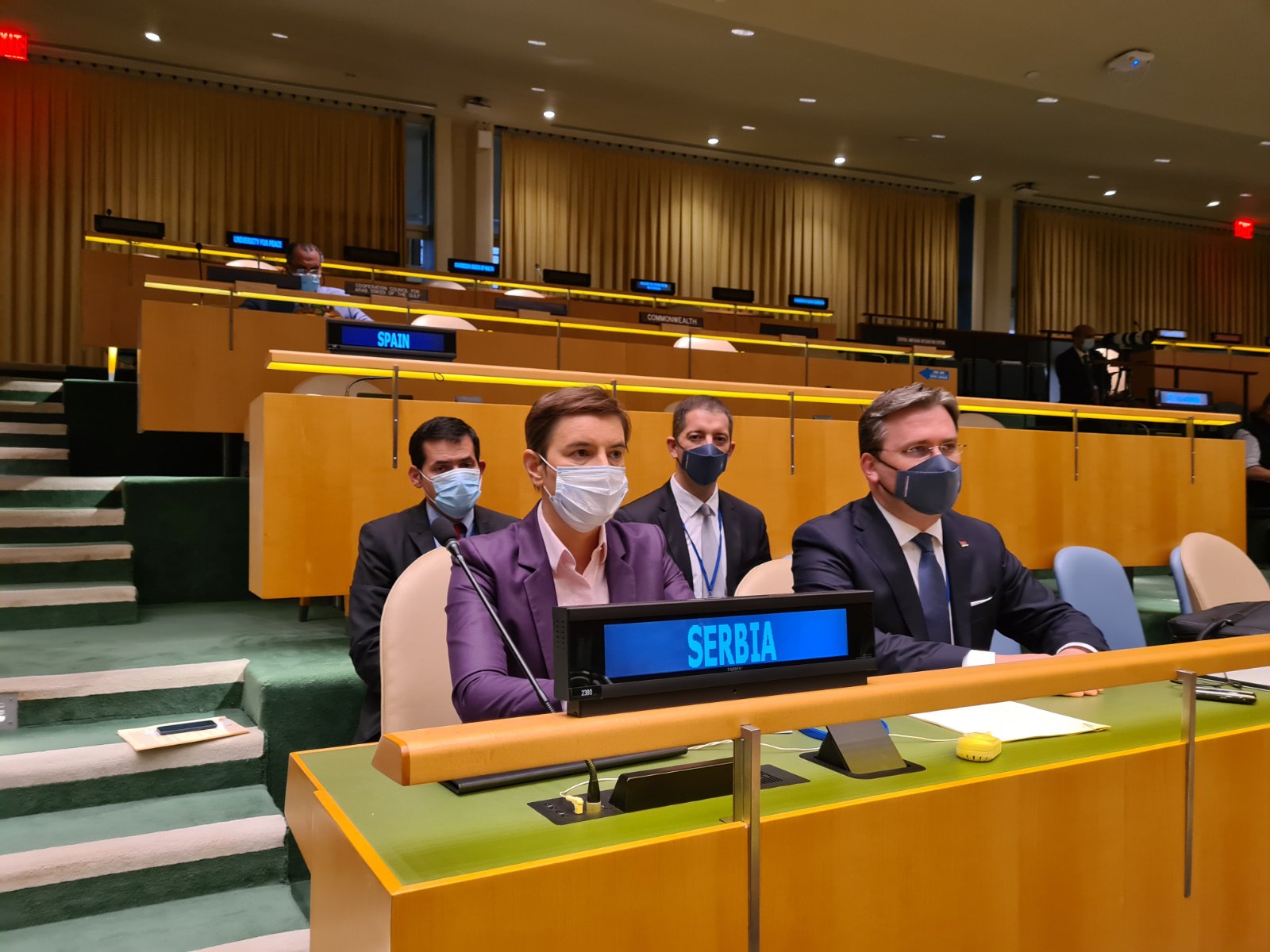
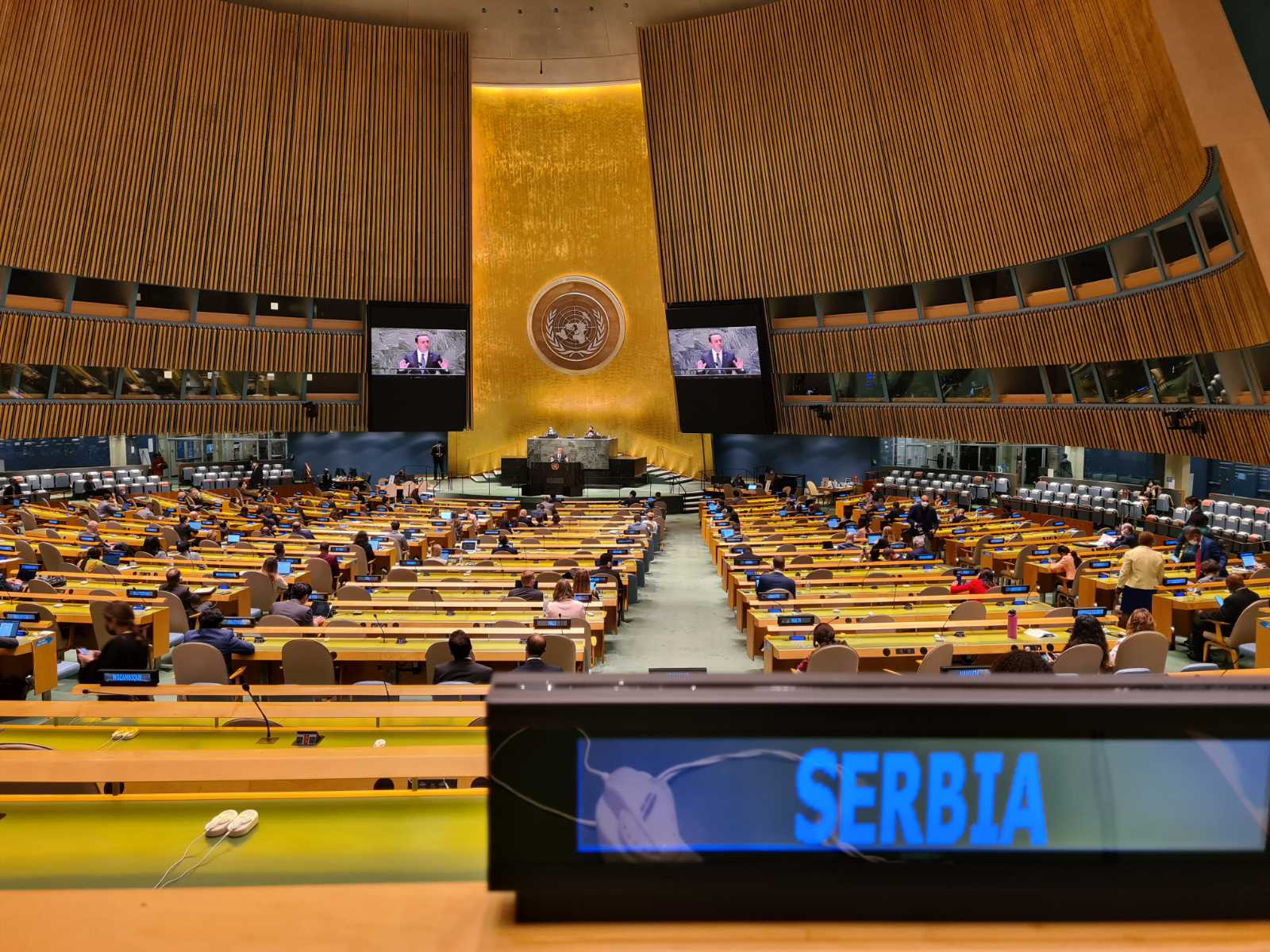 |
|
|
| Gratitude to Bolivia for the support to sovereignty and territorial integrity of Serbia |
|
21 September 2021
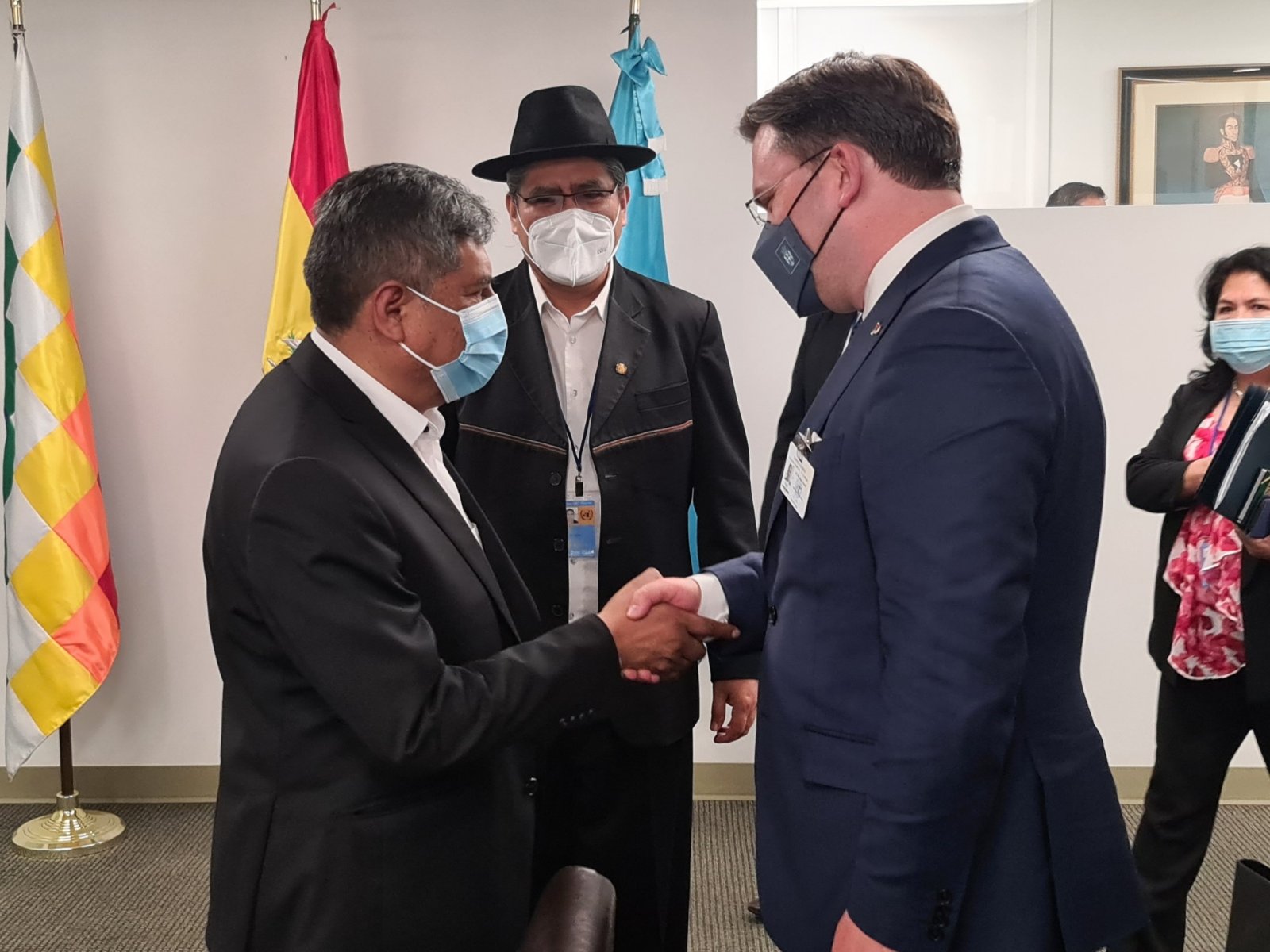
The Minister of Foreign Affairs of Serbia, Nikola Selaković, has discussed today in New York to the Minister of Foreign Affairs of Bolivia, Rogelio Mayta.
Minister Selaković stated that relations of the two countries were traditionally good and friendly estimating that the cooperation was not in compliance with the friendship and potentials of the two countries and emphasized that there was an interest of Serbia for its improvement especially in the field of economy.
Selaković indicated to the importance of exchange of visits at the top and high level and invited Minister Mayta to pay an official visit to Serbia.
The Serbian Foreign Trade Minister especially thanked Bolivia for their support to sovereignty and territorial integrity of Serbia, as well as the support provided in international organizations.
He introduced his interlocutor to the situation in Kosovo and Metohija, highlighting the dedication of Serbia to peace and stability in the region and the dialog as the only manner of compromised solution to this issue.
Selaković expressed hope that Bolivian delegation and Minister Mayta would be our guests during the gathering in Serbia to celebrate 60th anniversary of the First conference of the Non-Allied Movement.
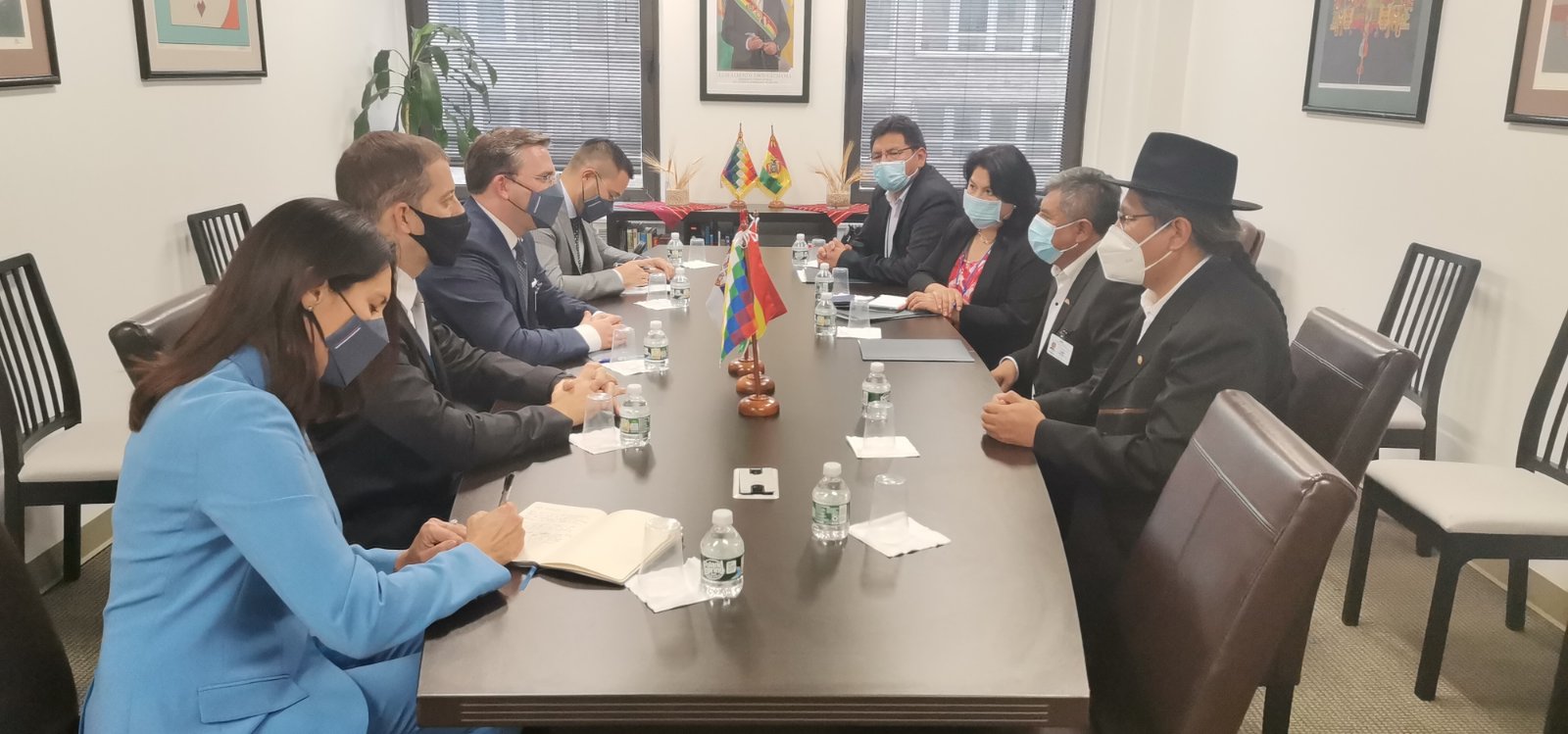
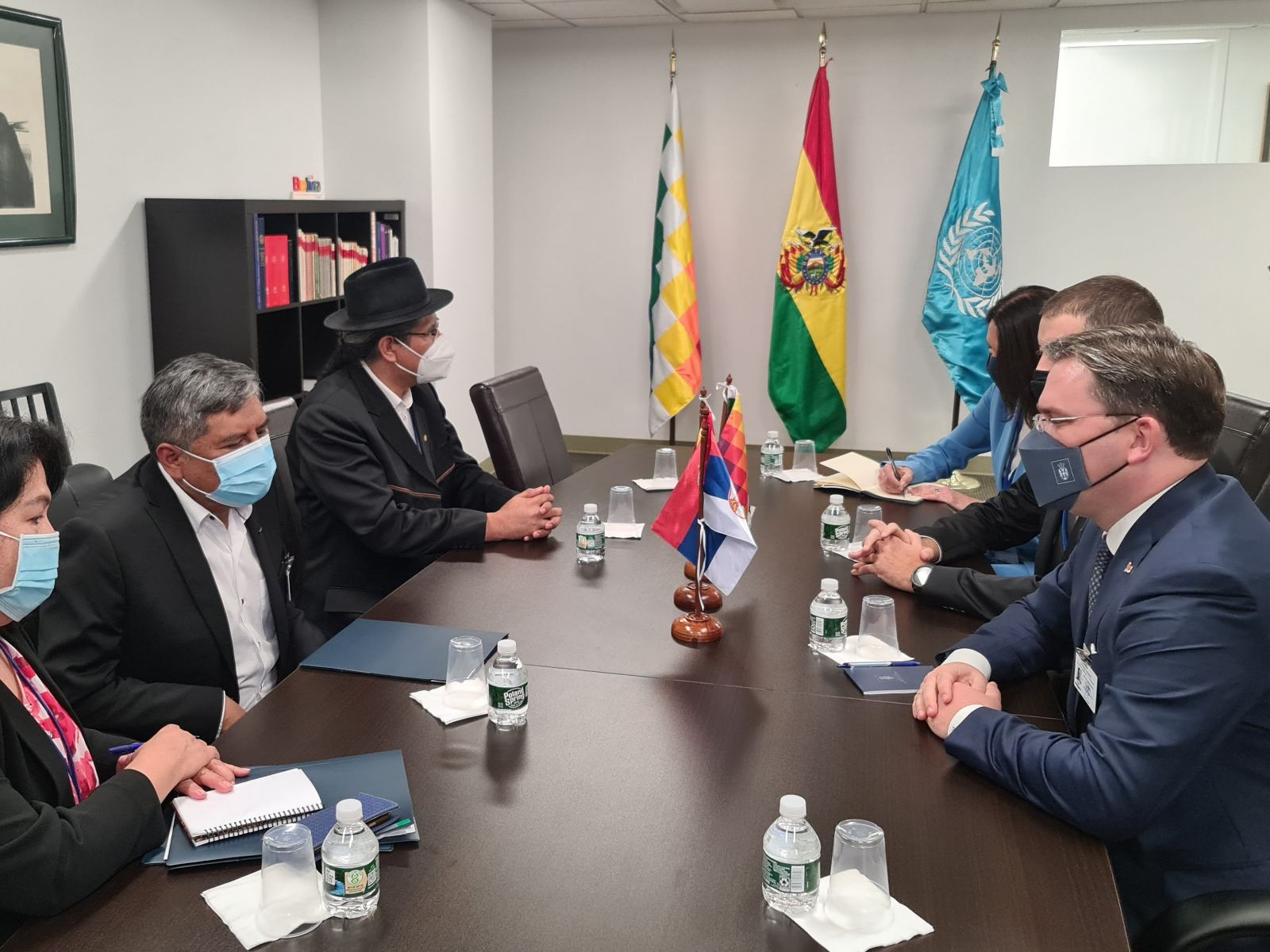
|
|
|
| Prime Minister Brnabic at Global COVID-19 summit organised by White House |
|
22 September 2021
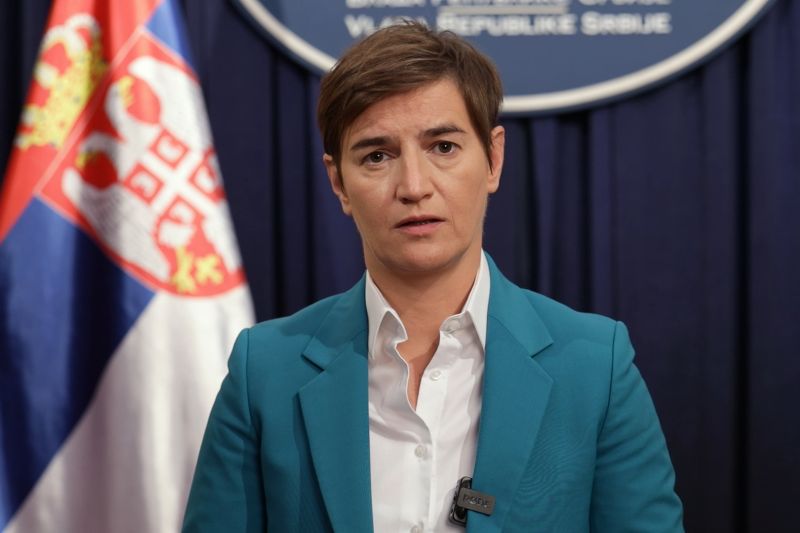
Prime Minister Ana Brnabic participated today at the Global COVID-19 summit, organised by the White House, which was opened by US President Joseph Biden.
The video messages are attended by a large number of world leaders and officials of international organizations, including UN Secretary General Antonio Guterres, European Commission President Ursula von der Leyen, British and Canadian Prime Ministers, Boris Johnson and Justin Trudeau, German Chancellor Angela Merkel and many others.
In the message, the Prime Minister pointed out that Serbia was among the first European countries to procure a covid vaccine, and that she was the first European Prime Minister to receive the vaccine.
Thanks to years of investment in digitalisation and development of eGovernment, we have managed to organise a complicated and complex vaccination process very efficiently and in a way that it is focused on citizens, she explained.
However, as she added, from the very beginning we were aware that this is not just a matter of our citizens and only our struggle. In the fight against the COVID-19 pandemic, we are all safe or no one is safe.
That is why, in addition to procuring vaccines for our citizens, we donated vaccines to the citizens of the Western Balkans, but also to other countries, she reminded and specified that Serbia donated 230,000 doses of vaccines to the region, we vaccinated foreign citizens in Serbia with approximately 300,000 doses and set aside we have 570,000 doses of vaccines for countries in Africa and Asia.
Brnabic mentioned that Serbia has already started the production of covid vaccine from one manufacturer, and that it will start production from another by the end of the year, because in that way we want to help and support all people and countries that need vaccines.
This is a pandemic in which we will either win together or lose together, but we must fight together, the Prime Minister repeated.
That is why Serbia supports the goals of this global summit, she emphasised, and expressed her gratitude to the United States of America and President Biden for organising the summit and supporting joint efforts in the fight against the COVID-19 pandemic.
Vaccines are the only way out in the fight against the pandemic, concluded Brnabic.
|
|
|
| Marking the Remembrance Day of all Serbs who died and were expelled in the armed operation "Storm" |
|
5 August 2021
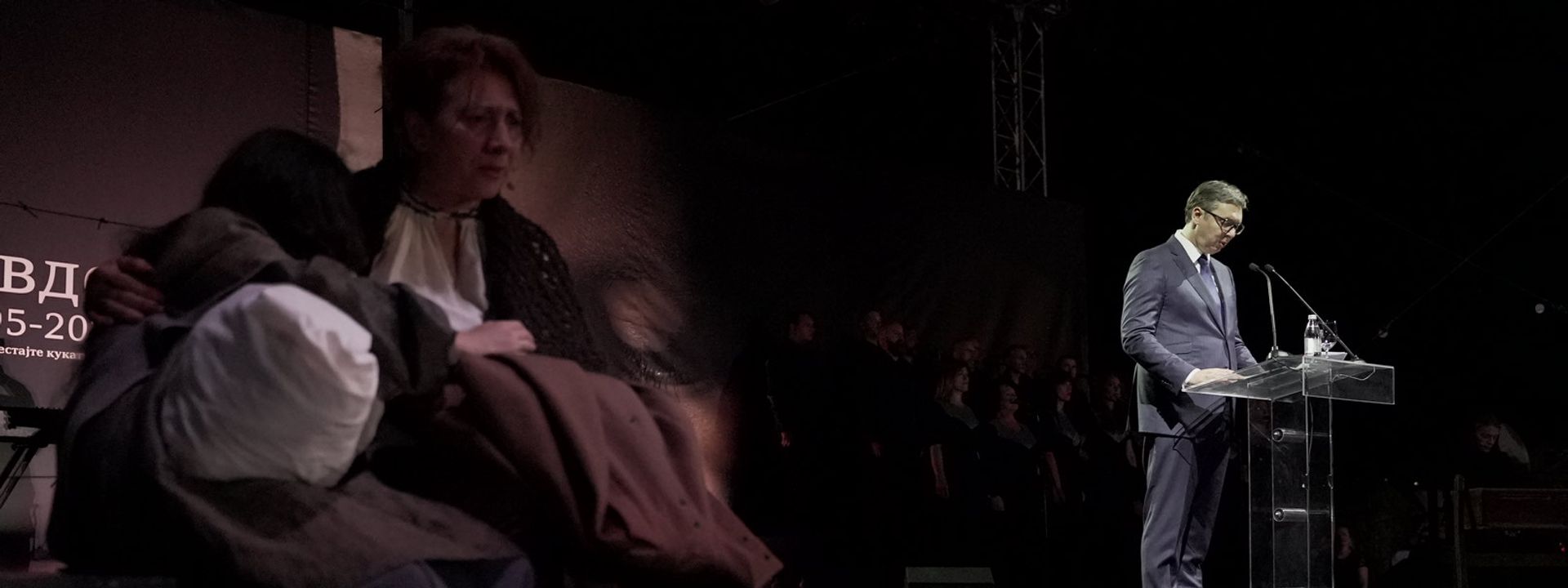
The President of the Republic of Serbia, Aleksandar Vučić, attended the marking of the Remembrance Day of all the victims and expelled Serbs in the armed operation "Storm" and said that Serbia remembers!
"Today, when we remind ourselves again of what happened in August 1995, the terrible pogrom, the expulsion of more than 250,000 Serbs, the exodus and ethnic cleansing, we, at the same time, and finally, remind ourselves of who we are, what we are, where we come from and where we are going. Thank you all for being here together tonight and for showing how much we love our people", said President Vučić, adding that we will not forget any of the things that the Krajina people had to go through.
"For us, these are not just terrible numbers of victims", said President Vučić and emphasized that Serbia will not forget.
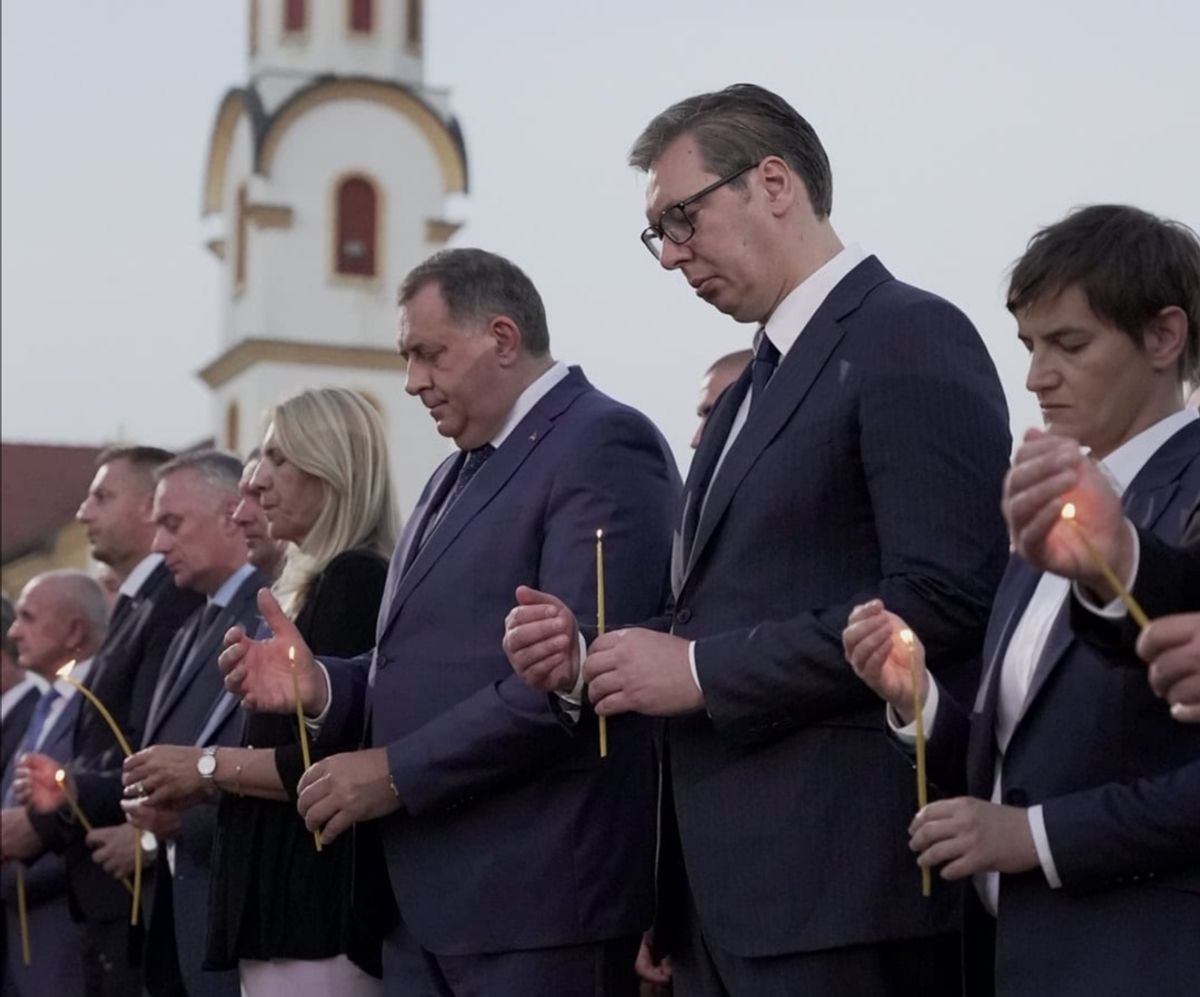
"History has never been rewritten like today. That is why I want to remind us all not only of what others have done to us, not wanting us to exist, but also of what we have done to ourselves, just as if we ourselves did not want to exist", said the President, noting that we must never again allow Serbia to forget its silent heroes.
President Vučić emphasized that we must never again cover our eyes, ears, and mouths in front of something that truly was a pogrom and the downfall of all humanity.
"Pretending that this is not true, avoiding saying it, is a crime not only against the victims, but also against ourselves, every living Serb, people from Krajina, as well as Serbia and its future", said President Vučić and underlined that people can stand up straight and live with themselves and the others without hesitation, fear and doubt, only if they remember.
President Vučić pointed out that Serbia must fight for peace and cradles with children, as well as that not remembering annuls and erases us from the history and the future, depriving us of the right to tomorrow.
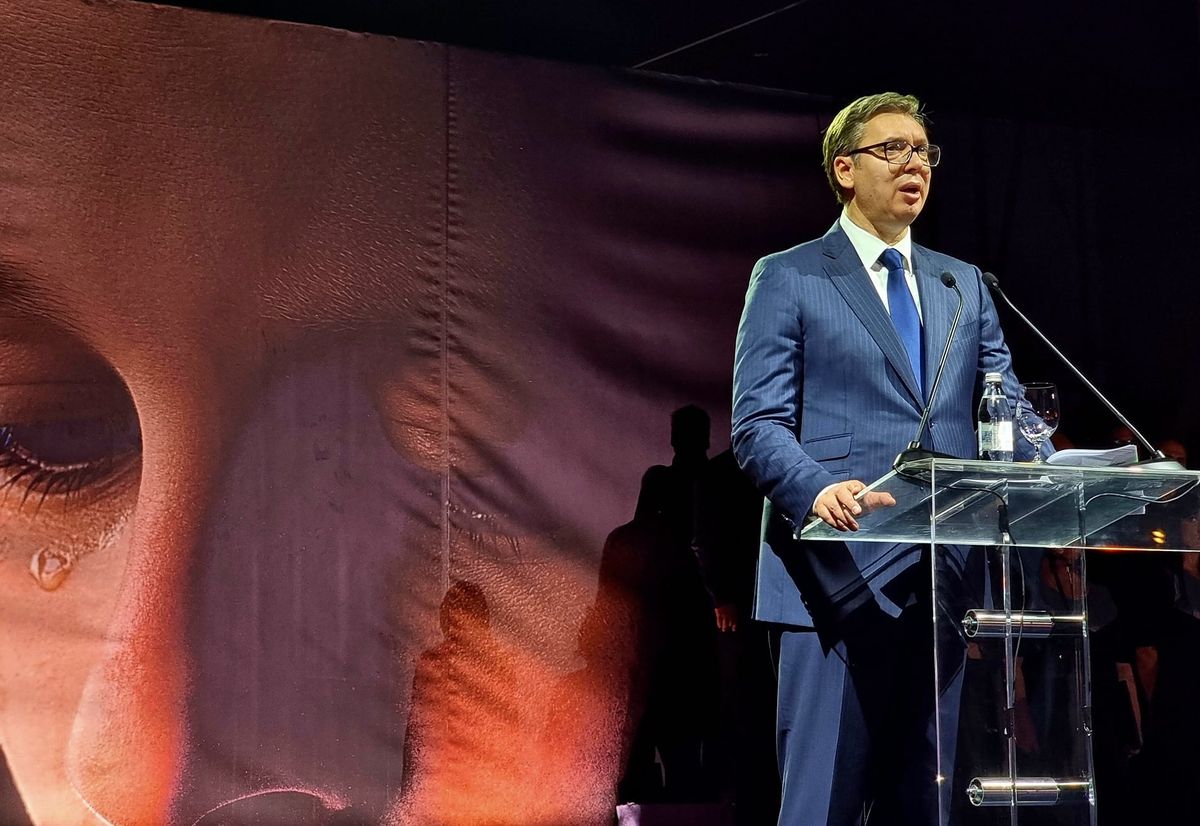
"Our mission is a happy future for us and for the new generations! Today's Serbia is based on a clear identity and a culture of remembrance", said President Vučić and reminded that everything that had been neglected for decades had been done, and that a strong Serbia has become the master of its own destiny.
"Eternal glory to you, Serbian martyrs who perished in the "Storm" and all other pogroms. Your children are in their Serbia, taken care of, loved and successful. Sleep peacefully, Serbian falcons, the future of your children is our vow", concluded President Vučić and thanked everyone who showed that night how much they love their country and that Serbia remembers.
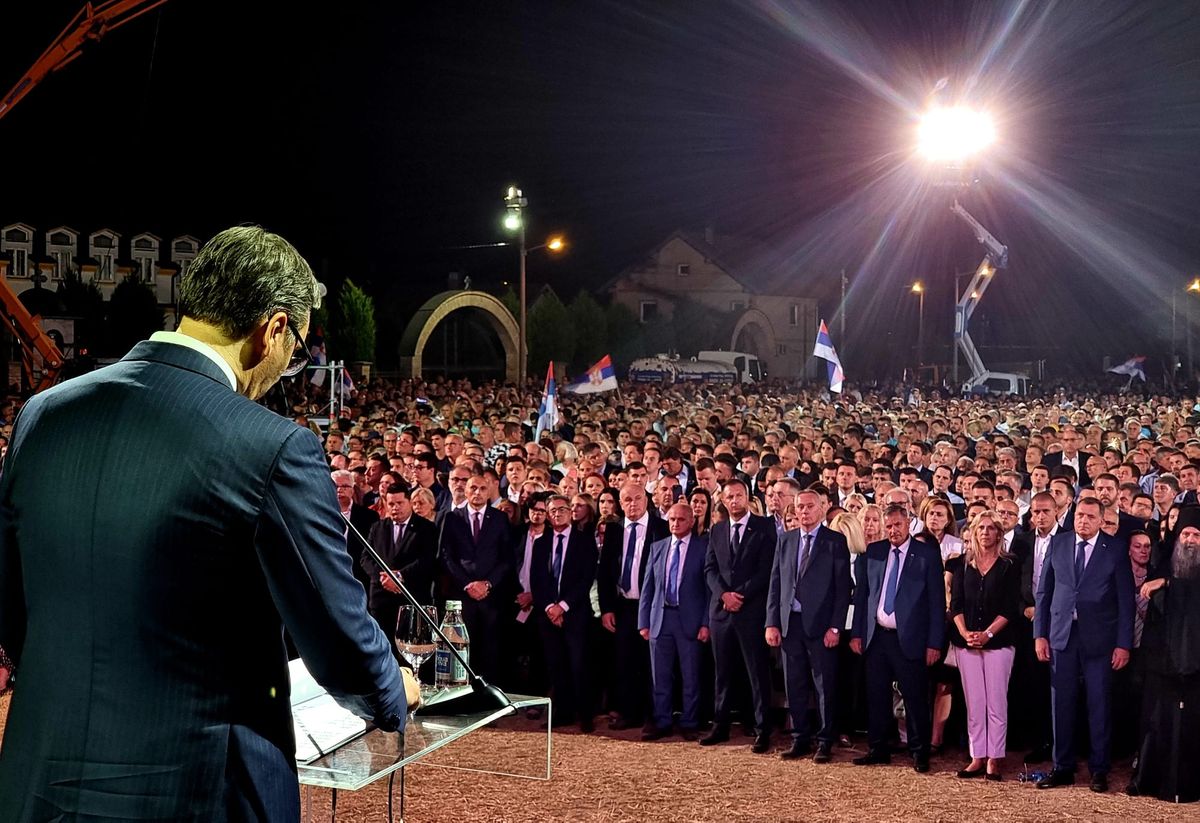
|
|
|
| President Vučić: We have decided – our goal is the EU, but China is an important partner |
|
22 July 2021
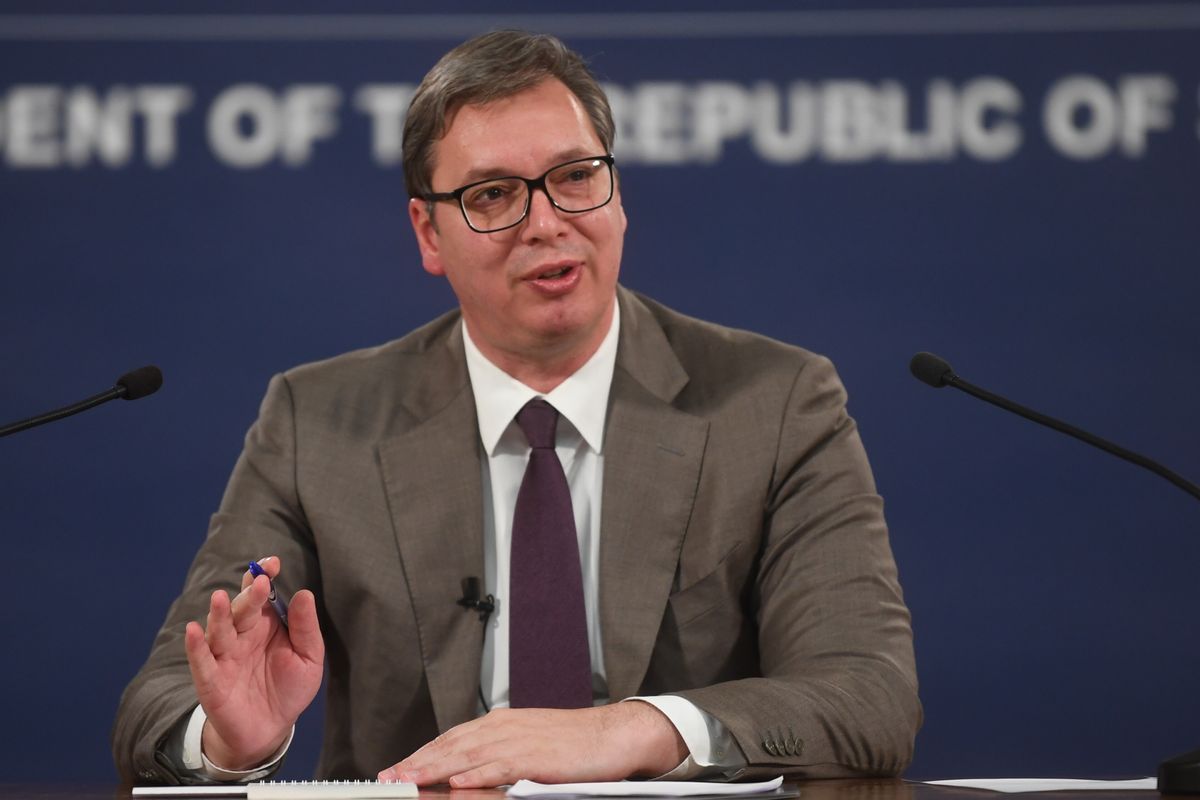
We have decided – our goal was and remains the EU, Serbian President Aleksandar Vučić said in an interview with the German daily "Handelsblatt", adding that there is no alternative for Serbia, but also stressing that China is an important partner for Serbia, and that the task of the state is to take care about the interests of its citizens.
He thus answered the question of what Serbia will choose once it has to choose between close relations with Beijing or the EU. Vučić emphasized that Serbia wants to become a full member of the EU.
"We are connected by history, common culture, EU members are already undoubtedly our most important partners", he explained and added that the trade exchange between Germany and China is 3,000 times higher than between Serbia and China, and, as he noted, even despite that, Serbia's business operations with China are portrayed as a problem.
To the statement that the German Chancellor Angela Merkel did not congratulate the 100th anniversary of the Communist Party of China, and that he did so, he replied that Serbia is not Germany, but a small country. On additional insistence on what Serbia will do if it has to choose between the EU and China, he underlined that Serbia has already decided, that its goal was and remains the EU membership.
"Our biggest investors are from the EU. The EU accounts for 67% of our trade while 17 percent of the trade is with countries of the region that are all on the way to the EU. We cannot survive without the EU", he added.
"But can we do a lot of good things with China – of course. And we do that, just like Germany does", Vučić pointed out, and to the remark that the quality of the Silk Road projects was being criticized, primarily because of Chinese workers, he answered that the quality of roads or bridges, which Serbia is building with China, is excellent.
"We give jobs to those who submit the best offer to us. That is why I tell Europeans who criticize Chinese projects in our country – offer us a project for one euro more and you will get it", he emphasized.
In that regard, he pointed out that Serbia is building a railway to Northern Macedonia with 600 million euros of EU aid, stating that that offer was better than China's.
"There is often talk of a 180-kilometer railway to Budapest through the territory of Serbia, which is financed by China. But the railway that is being built with the help of the EU from Belgrade to the northern Macedonian border is twice as long and no one is talking about it. It is all too political", he stated.
Asked whether he welcomes the plans of the EU and the USA regarding an alternative initiative to the Silk Road, Vučić said that he supports everything that brings advantages to our region.
"The Chinese want to expand their presence everywhere, but many processes in the West are, frankly, more efficient and without problems. We still have a lot to learn from the West, but we are getting there", Vučić said.
He pointed out that China was an important partner for Serbia and added that when the consolidation of state finances began in 2014, our country received good conditions from China for development projects.
He also stated that a competition for a copper mine was announced in eastern Serbia, at the request of the EU, that no European company had made an offer for six months, and that it had then been taken over by the Chinese.
"Our job is to take care of our people", he said.
He reminded that the Serbian economy grew by 52% in eight and a half years, which for the EU means that Serbia could be a strong member and engine for the entire region.
Explaining how Serbia is developing so well economically, he pointed out that Serbia has an excellent workforce, which speaks English, that society and administration are digitalized, and that it has the most flexible labor law in Europe, as well as consolidated public finances.
He reminded that previously the public debt was at 78% of GDP, and that today it has been reduced, thanks to the strong growth of the economy, to 52%.
"We can afford to give investors an incentive to come", he added, emphasizing that Serbia offers investment assistance, but that, for example, subsidies were not the motive for the arrival of the development center of the company Continental.
He pointed out that, five or six years ago, only Serbia started using the dual education system in this region, which Germany, Switzerland and Austria also use, that tens of thousands of people are in dual education, and that this is appreciated by foreign investors, who, in addition, can work closely with universities as well.
Germany, he stated, is the most important trade partner and the largest investor.
We started with the arrival of small textile companies from Turkey, and now primarily large German companies are coming. Today, 71,000 people work in German companies in Serbia", he explained.
Vučić said that the European perspective is very important for investors, stating that Nidek, Toyo Tires or Mitsubishi are coming from Japan to Serbia because our country is on a stable European path.
Asked if he believes that Serbia will become an EU member in the foreseeable future, he said that he does not complain.
"It is certain that if we had received 45 billion euros of EU aid, we would have been much further economically. Instead, we received 1.6 billion euros from the EU. We are used to achieving our successes on our own", said Vučić.
The President of Serbia reminded that in Croatia, salaries used to be 2.2 times higher than in Serbia, and today they are only 1.7 times higher.
"We are closing the gap with our own efforts. If we were to become a member of the EU, then we would certainly not ask for the biggest subsidies", he assures.
He said that the Serbian path follows the German path to Europe, and that Serbia wants a fair chance.
"I believe Merkel's words. She is at the end of her term and I would not have to praise her anymore. But she gave us stability, freedom of travel to the EU, helped us with the migrant crisis in 2015, and asked the Minister of Economy Altmeier and others to work closely with us", he reminded.
Asked if there were any indications that the new German government would support Serbia in the same way, Vučić expressed confidence that it would be the same.
"I know Armin Laschet, I talked to him while he was the Minister-President of North Rhine-Westphalia. He is very smart and understands the situation in the Balkans, and he will certainly continue Merkel's policy towards our region as the new chancellor", he added.
Vučić also expressed his belief that Russia, if Serbia's accession to the EU were concretized, would not react similarly as in the case of Ukraine, as this is a sovereign decision of Serbia.
To an additional question in this regard, Vučić pointed out that whenever he met with Vladimir Putin, and there were 18 or 19 meetings, he told him that he was grateful for the traditionally close friendship with Russia, but also that Serbia is on a clear course towards the EU.
"He asked if it was our choice and I answered that EU membership is indeed our goal", he added.
When it comes to "Kosovo", Vučić emphasized that a compromise is needed regarding this issue.
"Only in this way can there be sustainable peace. Serbia wants peace, me as well. Let's stop with the madness of the past. Only then can the whole region become the engine of new growth for Europe", said Vučić. |
|
|
| Serbia has achieved great success in the field of digitalization |
|
20 July 2021
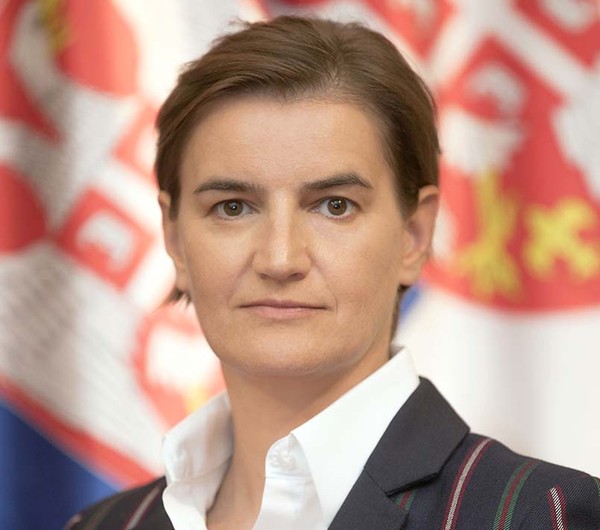
The Prime Minister of the Republic of Serbia, Ana Brnabić, stated at a gathering dedicated to digitalization and the IT sector, which was held in New York, that since she became Prime Minister, she is most proud of Serbia's success in the field of digitalization.
Brnabić, who is on a two-day visit to the United States, said that when she was elected Minister of Public Administration and Local Self-Government in August 2016, she wanted to do everything to change the public administration and what bothered her as a citizen.
She stated that, when she took office as Prime Minister, she knew what her priorities were and that first of all, digitalization needed to be raised to a higher level, that the education reform was supposed to begin, as well as work on strengthening the economy.
I believed in a country that believes in its people, because the Serbian people are creative. From 1 June 2017, we started working as an e-Government, i.e. we started exchanging data electronically, said the Prime Minister.
According to her, our citizens no longer had to go to, say, the Tax Administration, and since then, the public administration has exchanged 50 million documents, which means that citizens did not have to go from office to office for 50 million papers.
Brnabić pointed out that she is proud of what has been done in the field of education since she became the head of the Government, specifying that in September 2017, programming was introduced as a compulsory subject in primary schools.
Nobody believed that we could do that, but we cooperated with the private sector and some social organizations and we succeeded. At the moment, we are far ahead of numerous countries in Europe and the world, said the Prime Minister.
The Prime Minister pointed out that she was most proud when the cornerstone was laid for the science and technology park in southern Serbia, noting that so far, our country has four science and technology parks.
She pointed out that Serbia has since become one of the most successful countries in the world in the field of technology, and that according to some parameters, it is among the ten countries in the world, or among the five, assessing that this is proof that the country can change quickly.
Answering the question about vaccination, the Prime Minister emphasized that our country has never seen it as a geopolitical issue, but as a health issue.
According to her, Serbia talked with producers from both the East and the West and was among the first European countries to sign agreements with the company Pfizer-BioNTech and Sinopharm.
Unfortunately, many countries have viewed this issue as geopolitical. It did not matter to us, as long as the vaccines were safe, the Prime Minister emphasized and added that this was not the end of Serbia's success, because good organization was also needed.
Brnabić explained that the organization is another important thing in vaccination, because it is a logistically very difficult process, adding that, with the help of digitalization, success has been achieved and that everything we did in the previous years has paid off.
She stated that Serbia quickly established a system through which citizens could express interest in vaccination against the coronavirus and choose which vaccine they wanted to receive, as well as to be informed by a message when to go and get vaccinated.
Now I can log in on my phone, to see how many people have received the vaccine, how many more have registered, so that the effects of digitalization are obvious. We have made everything very efficient and easy for our citizens, the Prime Minister explained.
Answering the question of what she can tell other countries of the world about how to progress faster, Brnabić said that it is important to invest as much as possible in digitalization and education.
You need to teach children how to think, not what to think. Not all children will become IT experts, but what they can learn is an algorithmic way of thinking and how to make decisions, she said.
The Prime Minister mentioned investing in high-speed internet and providing infrastructure for start-ups as an important thing for progress, because more and more economies will be based on start-ups and innovations, emphasizing that people should be helped to start companies and implement their ideas.
Speaking about social networks, she pointed out that fake news has become the biggest problem on these networks and that it will remain so for some time.
This is the biggest challenge I face as Prime Minister, especially during the corona virus pandemic, she said, adding that social networks are also a great opportunity for politicians to communicate with citizens.
|
|
|
| Selaković invited representatives of members of the NAM to gather in Belgrade in October |
|
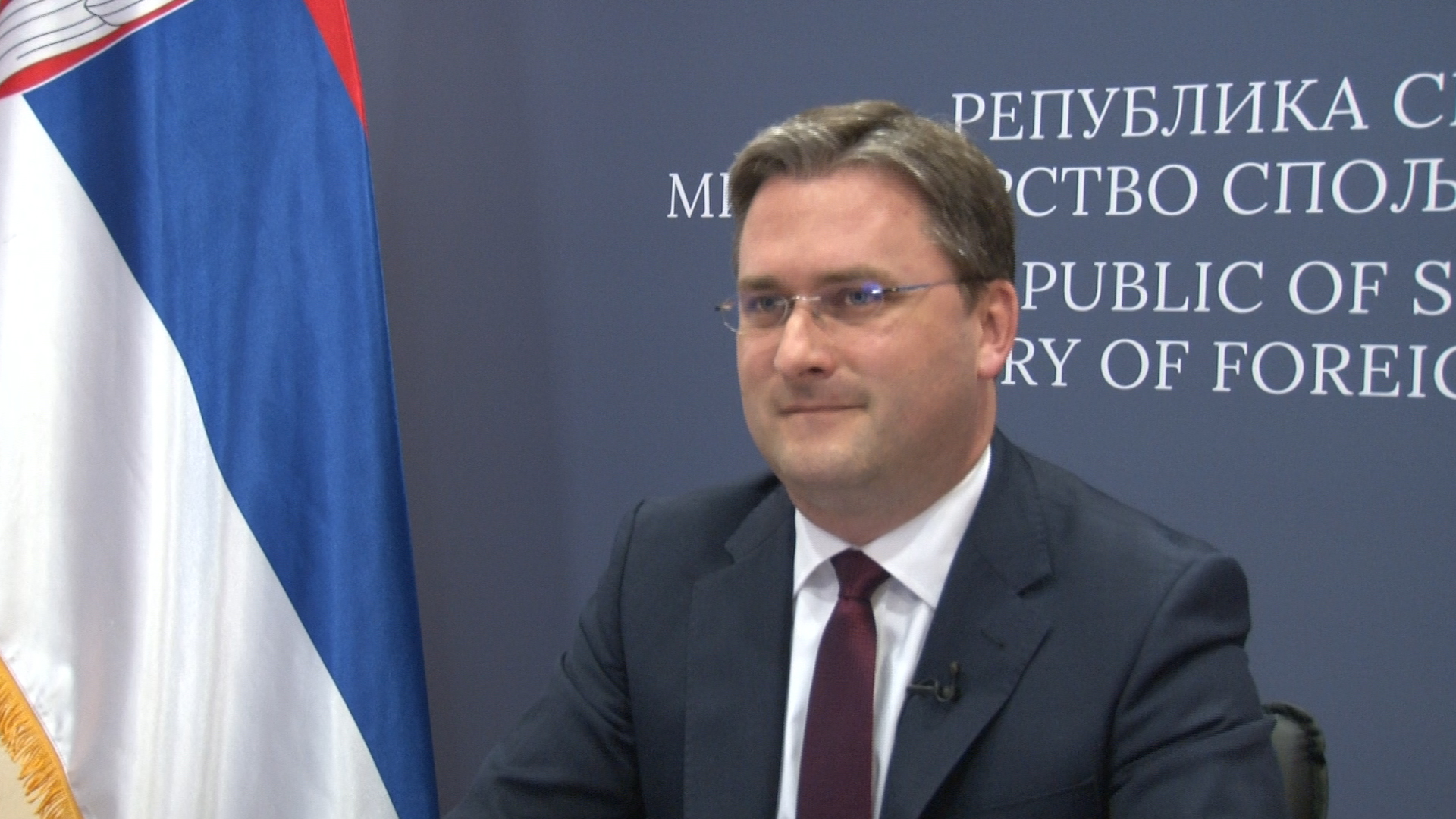
13. July 2021.
The Minister of Foreign Affairs of the Republic of Serbia, Nikola Selaković, spoke at the Ministerial Conference of the Non-Aligned Movement (NAM) today and on that occasion sent an invitation to the representatives of the members to gather in Belgrade on 11 and 12 October, when the 60th anniversary of the first Conference of the Non-Aligned Movement held in Belgrade in 1961 will be marked.
Selaković informed the participants of the conference that Serbia would organize this important jubilee of non-aligned countries together with Azerbaijan – which is currently chairing the NAM.
In his address, Selaković reminded that the former Yugoslavia and President Tito, as co-founders of the Movement, gave their contribution to creating a vision of a different world, and that Serbia, as one of the successors of Yugoslavia, is proud of that part of its history.
"The spirit of non-alignment is based on equality, freedom, lasting peace, sovereign equality of states and peaceful cooperation of all peoples, and these values are also woven into the state-building foundations of Serbia", the minister said.
Selaković said that the Non-Aligned Movement throughout its history has been a beacon of freedom to all those who sought the right to existence and prosperity in a world that was often ruled, not by the force of law, but by the law of force. He assessed that even today we find ourselves in times of serious global challenges in which the Movement has the opportunity to reaffirm its libertarian traditions and commitment to a world of equals.
"Serbia, as a militarily neutral and politically independent state, will give its most sincere contribution to such goals of the Movement. We hope that by strengthening mutual ties and cooperation, as a group of states and peoples that share the same values and interests, we will strengthen our common capacity to face the challenges of tomorrow. And the challenges are already before us", Selaković pointed out.
The Minister emphasized that international law should be a pillar of political and security architecture of the world, and added that Serbia respects the commitment of the members of the Movement towards the goals and principles of the UN Charter.
"Many members of this movement are aware that by insisting on international law, they are working in their own favor and in favor of preserving regional and global stability," the minister pointed out.
Selaković also said that the COVID-19 pandemic clearly showed that inequality, lack of solidarity and empathy in the world have become very obvious in the roughest way.
"Serbia is eternally grateful to all the countries which, such as Azerbaijan, helped us in difficult times. We later extended that chain of solidarity by making vaccines available, not only to our citizens, but also to others in the region. We supported our neighbors with the belief that solidarity is the best investment in a common future", the minister concluded.
|
|
|
| REGIME DE ENTRADA PARA CIDADÃOS ESTRANGEIROS – 30.06.2021 |
|
A fim de se proteger contra a introdução de doenças infecciosas no território da República da Sérvia, as pessoas que chegam à República da Sérvia provenientes de países com situação epidemiológica desfavorável (de todos os países do mundo) estão autorizadas a entrar na República da Sérvia desde que possuam um dos seguintes documentos:
1. Teste RT-PCR negativo para a presença do vírus SARS-CoV-2 ou teste rápido Antígeno FIA negativo se a pessoa vier dos Estados Unidos, com não mais de 48 horas da data de emissão (se houver atraso na entrada a República da Sérvia, que não pode ser atribuída à culpa do passageiro, mas é uma consequência de um evento externo que não poderia ser previsto, evitado ou eliminado - atraso / atraso de voo, partida de ônibus, trens, etc., então o o teste não pode ter mais de 72 horas ao entrar na República da Sérvia);
2. Certificado de vacinação completa emitido pela República da Sérvia.
3. Certificado de cura da doença COVID-19 - ertificado ou outro documento público atestando que o titular do documento contraiu a doença causada pelo vírus SARS-CoV-2, ou seja, que a pessoa foi diagnosticada com o vírus SARS-CoV-2, com não menos de 14 dias ou mais de seis meses decorridos desde o primeiro teste e emitido por um instituto de saúde pública estabelecido no território da República da Sérvia, ou seja, a autoridade competente do país com o qual a República da Sérvia tenha celebrado um acordo ou reciprocidade de fato sobre o reconhecimento de tais documentos.
As restrições mencionadas não se aplicam a:
1. Cidadãos da República da Albânia, Bósnia e Herzegovina, República da Bulgária, Hungria, República da Macedônia do Norte e Montenegro, ao entrarem na República da Sérvia provenientes dos países de que são cidadãos;
2. Pessoas que não são cidadãs desses países, mas que possuam residência temporária ou permanente nesses países e que entram na República da Sérvia diretamente desses países, têm a entrada permitida sob a condição de que no prazo de 48 horas a partir do momento de cruzar a fronteira do país, entreguem a um órgão estatal confiável para saúde pública um teste negativo de RT-PCR ou teste de antígeno para a presença do vírus SARS-CoV-2, emitido por um laboratório de referência da República da Sérvia.
3. Cidadãos estrangeiros que estão em trânsito pela República da Sérvia – período não superior a 12 horas a partir do momento da entrada no território da República da Sérvia;
4. Tripulação e pessoal de cabina da aeronave cujo destino final seja a República da Sérvia;
5. Menores de até 12 anos de idade;
6. membros de forças militares, polícias e outros serviços de segurança estrangeiros que estejam em trânsito pelo território da República da Sérvia ou que venham à República da Sérvia para desempenhar tarefas oficiais com aviso prévio;
7. Demais informações podem ser acessadas no site:
https://mfa.rs/en/citizens/travel-serbia/covid-19-entry-requirements
IMPORTANTE
Menores (nacionais ou estrangeiros) com idade entre 12 e 18 anos podem entrar na República da Sérvia sem um teste RT-PCR negativo para a presença do vírus SARS-CoV-2 ou um teste FIA Rapid Antigen negativo, ou sem um certificado de vacinação ou um certificado de cura da doença, se dentro de 48 horas a partir do momento de cruzar a fronteira do país, enviar ao instituto de saúde pública territorialmente competente na República da Sérvia um teste RT-PCR ou teste de antígeno para a presença do vírus SARS-CoV-2, emitido por laboratório de referência da República da Sérvia.
Entrando na Sérvia por motivo de negócios:
Cidadãos sérvios e estrangeiros que entram na República da Sérvia por motivos de negócios, com aviso prévio à Câmara de Comércio e Indústria da Sérvia, podem entrar na República da Sérvia sob a condição de que, dentro de 24 horas após cruzarem a fronteira do país, submetam à Câmara de Comércio e Indústria um resultado negativo do teste RT-PCR ou teste de antígeno para a presença do vírus SARS-CoV-2, emitido por um laboratório de referência na República da Sérvia.
A Câmara de Comércio e Indústria da Sérvia encaminhará o aviso de travessia da fronteira do país sem demora ao Ministério do Interior - Administração da Polícia de Fronteira, mas não mais que 24 horas antes da prevista travessia da fronteira do país.
Se uma pessoa não apresentar um resultado negativo do teste RT-PCR ou teste de antígeno para a presença do vírus SARS-CoV-2 dentro de 24 horas após cruzar a fronteira do país, ou se o resultado do teste for positivo para a presença do vírus SARS-CoV-2, a Câmara de Comércio e Indústria da Sérvia, informará o instituto territorialmente competente de saúde pública sobre isso sem demora.
__________________________________________________________________________
ENTRY REGIME FOR FOREIGN NATIONALS– 30.06.2021
To protect against the transmission of contagious diseases to the territory of the Republic of Serbia, travellers arriving to the Republic of Serbia from any country in the world with an unfavourable epidemiological situation will be allowed entry into the Republic of Serbia as long as they have one of the following documents:
1. a negative result of the RT-PCR test for the presence of the SARS-CoV-2 virus or negative Antigen FIA Rapid test for persons arriving from the United States of America within 48 hours of crossing the state border (If a traveller’s journey has been delayed up to the moment of entry into the Republic of Serbia which cannot be ascribed to the traveller, i.e., the delay was caused by an external event which could not be foreseen, avoided or eliminated (flight or bus/train departure delay/postponement, etc.), the date of issuance of the negative test result may be no older than 72 hours at the time of entry into the Republic of Serbia.
2. Persons who have been vaccinated in the Republic of Serbia and hold a valid certificate of vaccination
3. Certificate of recovery from COVID-19 - Proof of recovery is implied by a certificate or other public document in which it is stated that the holder of the document suffered from a disease caused by a virus SARS-CoV-2, i.e. the presence of the virus SARS-CoV-2 was detected in that person, with regard that not less than 14 days and not more than six months have passed since the first test has been performed. Such a certificate or other public document needs to be issued by a public health institute established for the territory of the Republic of Serbia,
the competent authority of the country in which the Republic of Serbia has concluded an agreement on the mutual recognition of such documents.
The above entry conditions do not apply to:
1. Citizens of the Republic of Albania, Bosnia and Herzegovina, the Republic of Bulgaria, the Republic of North Macedonia, Montenegro, and Hungary, when entering the Republic of Serbia directly from the country which citizenship they possess.
2. Persons, who are not citizens of the above-mentioned countries, but have an approved temporary or permanent residence in those countries, and are arriving to the Republic of Serbia directly from those countries, will be allowed to enter provided that, within 48 hours of crossing the state border, they submit to the territorially competent institute for public health a negative result of the RT-PCR test for the presence of the SARS-CoV-2 virus or antigen test for the presence of the SARS-CoV-2 virus, issued by a reference laboratory in the Republic of Serbia.
3. Foreign nationals transiting through the Republic of Serbia. Transit time for foreign nationals is limited to 12 hours from the moment of entry into the territory of the Republic of Serbia;
4. Flight and air cabin crew flying to the Republic of Serbia as their final destination;
5. Minors up to 12 years of age;
6. Members of foreign military, police or other security services transiting through the territory of the Republic of Serbia or arriving to the Republic of Serbia to perform official duties with prior notice;
7. Other information can be accessed on the website:
https://mfa.rs/en/citizens/travel-serbia/covid-19-entry-requirements
IMPORTANT
Minors (domestic or foreign) aged between 12 and 18 can enter the Republic of Serbia without a negative RT-PCR test for the presence of the SARS-CoV-2 virus or a negative FIA Rapid Antigen test, or without a vaccination certificate or a certificate of cure of the disease, if within 48 hours from the moment of crossing the country border, send to the territorially competent public health institute in the Republic of Serbia an RT-PCR test or antigen test for the presence of the virus SARS-CoV-2, issued by a reference laboratory in the Republic of Serbia.
ENTERING SERBIA FOR BUSINESS PURPOSES
Serbian and foreign nationals entering the Republic of Serbia for business purposes, with prior notice to the Serbian Chamber of Commerce and Industry, may enter the Republic of Serbia under the condition that, within 24 hours of crossing the state border, they submit to the Serbian Chamber of Commerce and Industry a negative result of the RT-PCR test or antigen test for the presence of the SARS-CoV-2 virus, issued by a reference laboratory in the Republic of Serbia.
The Serbian Chamber of Commerce and Industry will forward the notice of crossing the state border without delay to the Ministry of the Interior ― Border Police Administration, but no later than 24 hours prior to the expected crossing of the state border.
If a person fails to submit a negative result of the RT-PCR test or antigen test for the presence of the SARS-CoV-2 virus within 24 hours of crossing the state border, or if the test result is positive for the presence of the SARS-CoV-2 virus, the Serbian Chamber of Commerce and Industry will inform the territorially competent institute for public health about this without delay.
|
|
|
| INVITATION FOR A FREE GROUP COURSE OF THE SERBIAN LANGUAGE VIA SKYPE |
|
Within the project “Learning Serbian as a heritage language through an online group course”, the Academic Serbian Association invites all the people from the Serbian diaspora, age 14 to 20, to apply for a free group course of the Serbian language via Skype.
Under the sponsorship of the Ministry of Culture and Information of the Republic of Serbia, we continue to promote and realize online classes. The goal of the project is to promote the Serbian language in the diaspora through peer education intended for the youth in the diaspora.
Serbian-speaking people from the diaspora, ages 14 to 20, can apply for a free group course of the Serbian language via Skype until the 13th of June 2021. During this course, their mentors will be teachers from the Academic Serbian Association, accredited by the Ministry of Education, Science and Technological Development. Application requirements are that the students haven’t attended any Serbian as a heritage language course via Skype in Academic Serbian Association and that they have to share the post about the course from the Facebook ASA profile on their Facebook profiles.
The main goal of the project is learning/ preserving the Serbian language and Cyrillic alphabet, as well as connecting Serbian young people from all over the world. Accredited teachers of the Academic Serbian Association will hold the group classes via Skype to the youth in the diaspora.
The course will start on the 20th of June 2021 and will end on the 31st of July 2021. By the end of the course, the students will receive a certificate for a completed course, issued by the Academic Serbian Association.
The classes will be carried out twice a week (the duration of a class will be 90 minutes), on dates which the students and the teacher agree on. The Academic Serbian Association will make sure the classes will be carried out properly.
Anyone interested in the course can fill out the application directly on the website http://skr.rs/zabf or download it on the end of the text, fill out and send to an e-mail at asasocijacija@gmail.com, titled “Skype group course”.
According to the applications, the Academic Serbian Association will determine the student-teacher pairings.
It is necessary that the potential student has a computer with speakers and a camera, and that the student has a good internet connection, solid English language skills and a good motivation to learn. For more information, you can contact the Academic Serbian Association at asasocijacija@gmail.com
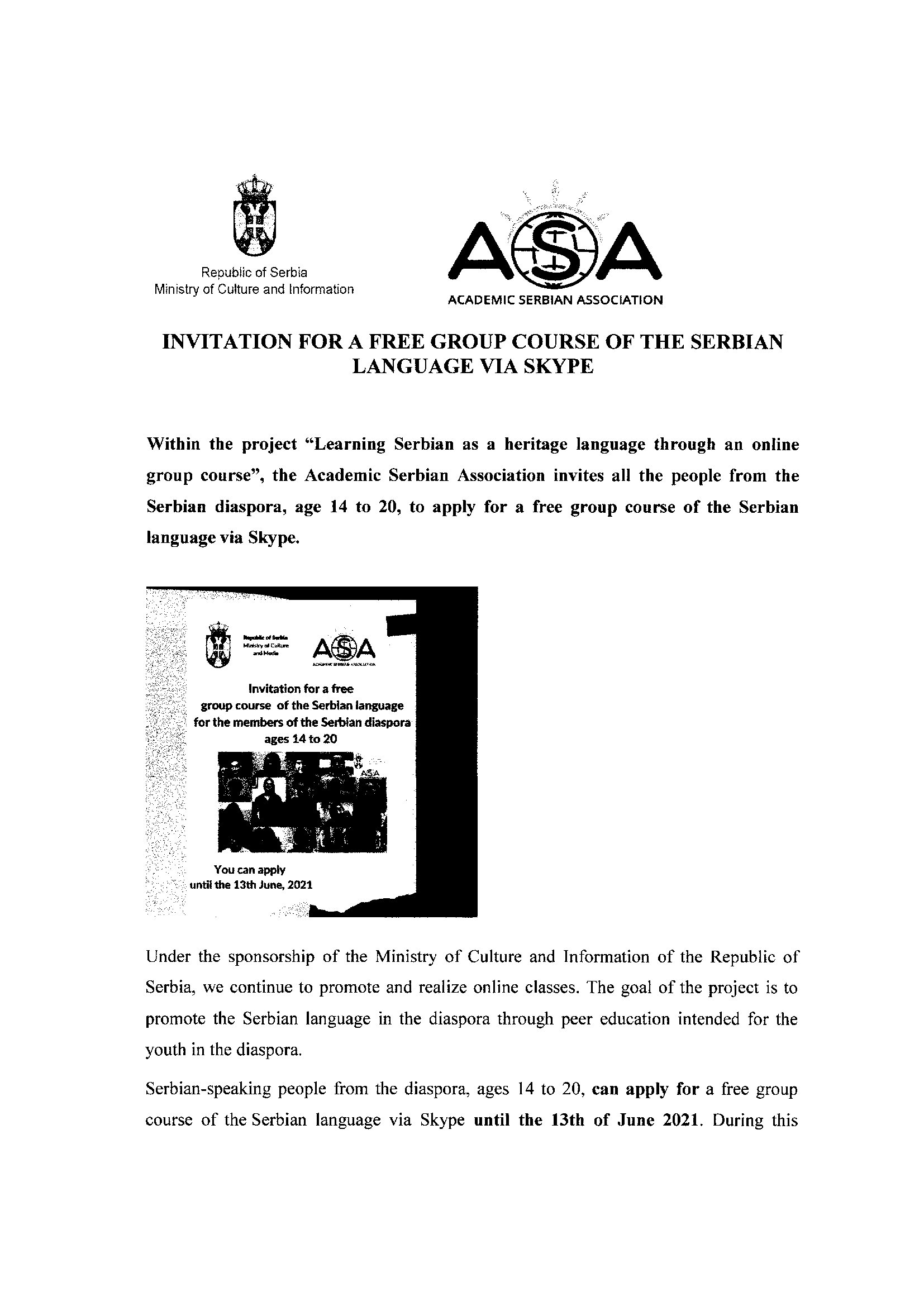 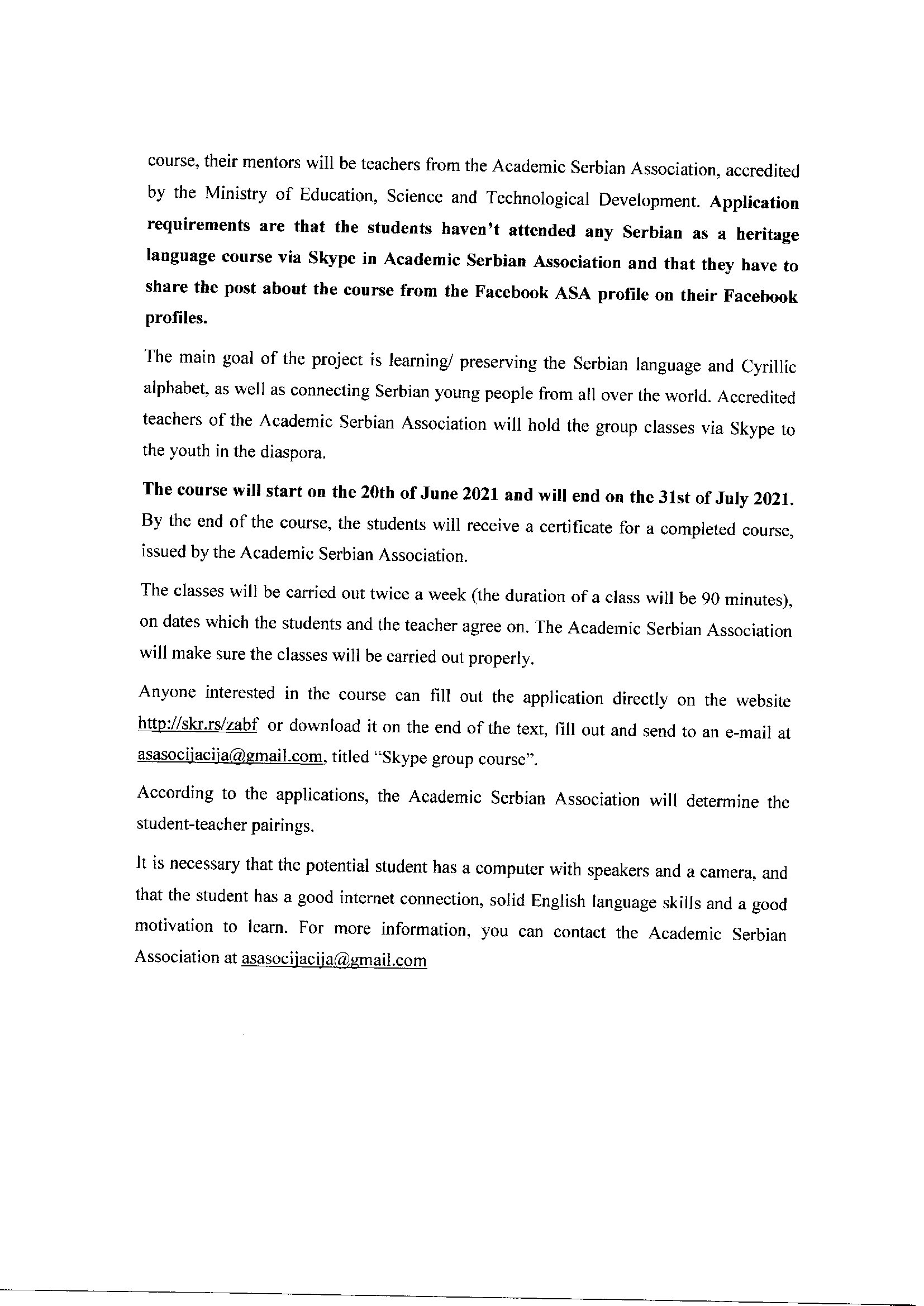
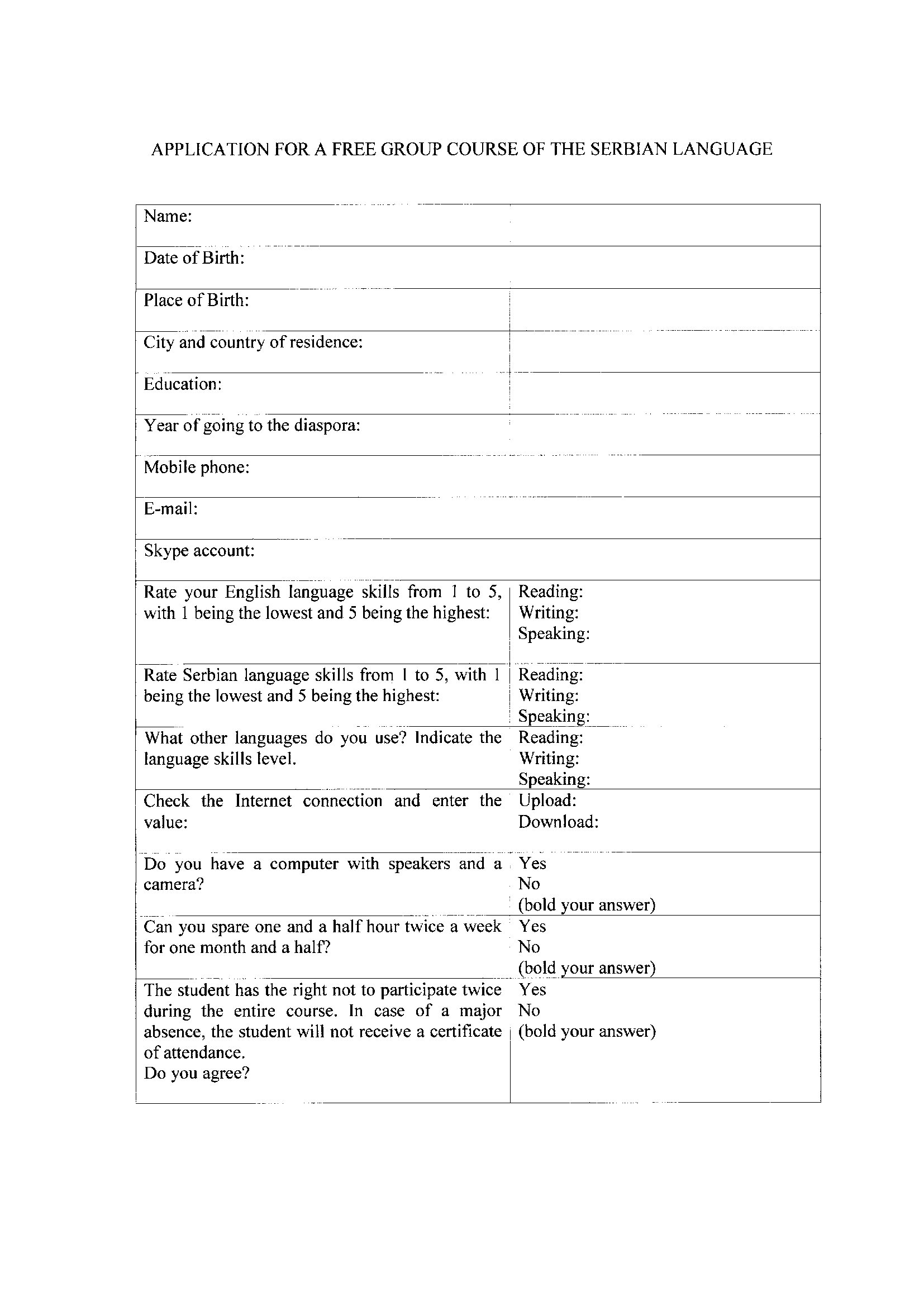 |
|
|
| Transmissão de programa sobre a Sérvia na TV Brasília, 24.04.2021. |
|
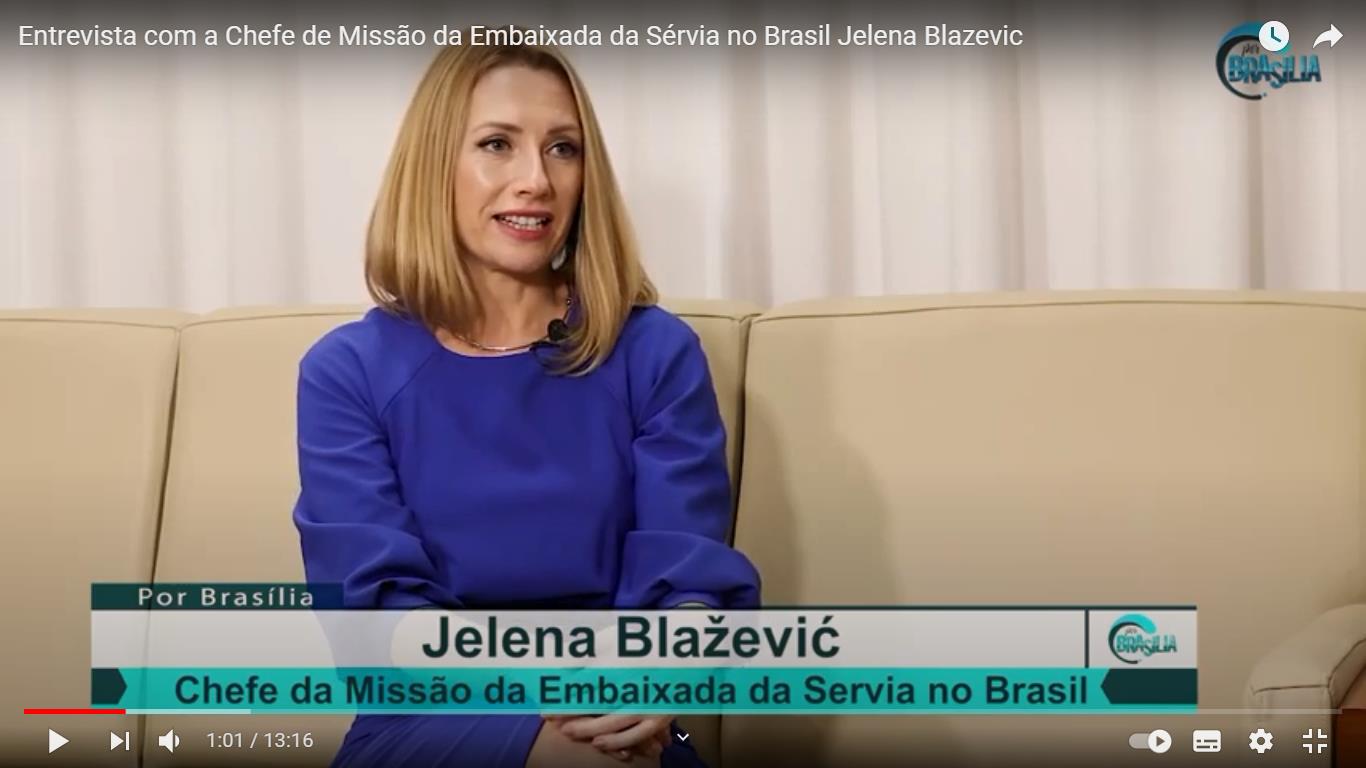
No sábado dia 24 deste mês, em horário nobre às 10h00 pela rede nacional TV Brasília, do grupo Rede TV, dentro do programa "Mundo em Foco", foi transmitido a estreia de um programa especial sobre a Sérvia. Durante a transmissão, a Encarregada de Negócios a.i. Jelena Blažević apresentou ao público brasileiro as características gerais do nosso país, patrimônio histórico e cultural e gastronomia, bem como sobre as nossas personalidades mais destacadas. Também foram apresentados os sucessos do nosso governo nas áreas da vacinação e economia, sendo apresentado um breve panorama das relações bilaterais entre a Sérvia e o Brasil.
O programa pode ser visto através do link:
https://www.youtube.com/watch?v=1nl3RDLZi4U&ab_channel=PorBras%C3%ADlia |
|
|
| AVISO |
|
Informamos que no período do dia 26 de abril 2021 até o dia 07 de maio o Departamento Consular da Embaixada não irá tratar dos assuntos de sua competência
|
|
|
| President Vučić met via video link with representatives of the IMF delegation |
|
21st April 2021
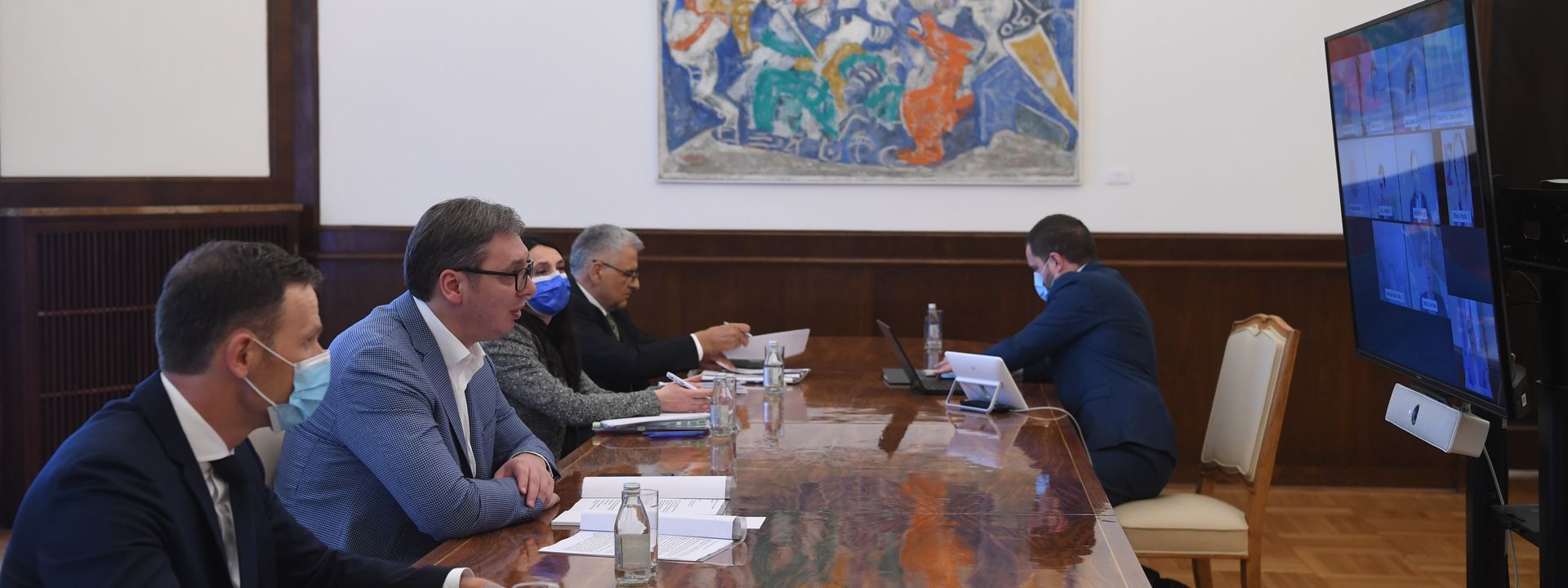
President of the Republic of Serbia Aleksandar Vučić talked today via a video link with the representatives of the delegation of the International Monetary Fund led by the Head of the Mission, Jan Kees Martijn. The interlocutors concluded that Serbia's main goal remains to preserve the hard-earned reputation of a fiscally secure country, as well as to continue with a responsible fiscal policy so that public debt does not exceed 60 per cent of GDP, whereby Serbia continues to work on further economic growth.
During the conversation, President Vučić and Jan Kees Martijn especially referred to the incentive measures and adopted three packages of measures to help the economy and citizens, which preserved macroeconomic stability and even achieved a higher employment rate. Martijn commended the responsible economic policy of Serbia and the successful crisis management during the pandemic.
"Serbia achieved one of the best results last year despite the challenges of the pandemic", Martijn said, noting that Serbia was one of the few countries to which the IMF did not adjust the initial projection of the 5% growth rate it gave last year.
President Vučić added that following the first quarter of 2021, Serbia is well on its way to achieving the planned growth of 6% as planned, since one of the main focuses of the Government is investing in large infrastructure projects and intensifying work on attracting foreign direct investments.
"In 2020, Serbia was at the very top in terms of economic growth in Europe, and I am convinced that this year we can enter the first three or four countries in terms of growth", said President Vučić, adding that he was satisfied that Serbia still, despite the pandemic situation, has an extremely strong inflow of investment.
President Vučić and Jan Kees Martijn also discussed a new advisory arrangement, which is of special importance in light of the improvement of the general investment climate in Serbia, as well as in the context of even greater investor assurance.
"Given Serbia's tremendous progress over the past eight years, the priority goal of this arrangement will be to preserve the results achieved, but also to provide support for further implementation of structural reforms aimed at even faster, stronger and more sustainable growth", said President Vučić and thanked the IMF and the personal engagement of Jan Kees Martijn in the professional and expert support that Serbia is counting on.
President Vučić pointed out that Serbia will pay special attention to reforms in public companies, and that priorities will continue to be investments in infrastructure, creating an even better climate for investments, greater investments in the environment, science and capital projects, which will further contribute to the long term stable financial growth in the coming years.
Source: www.predsednik.rs
Photo: www.predsednik.rs |
|
|
| Meeting with the World Health Organization Regional Director for Europe |
|
20th April 2021
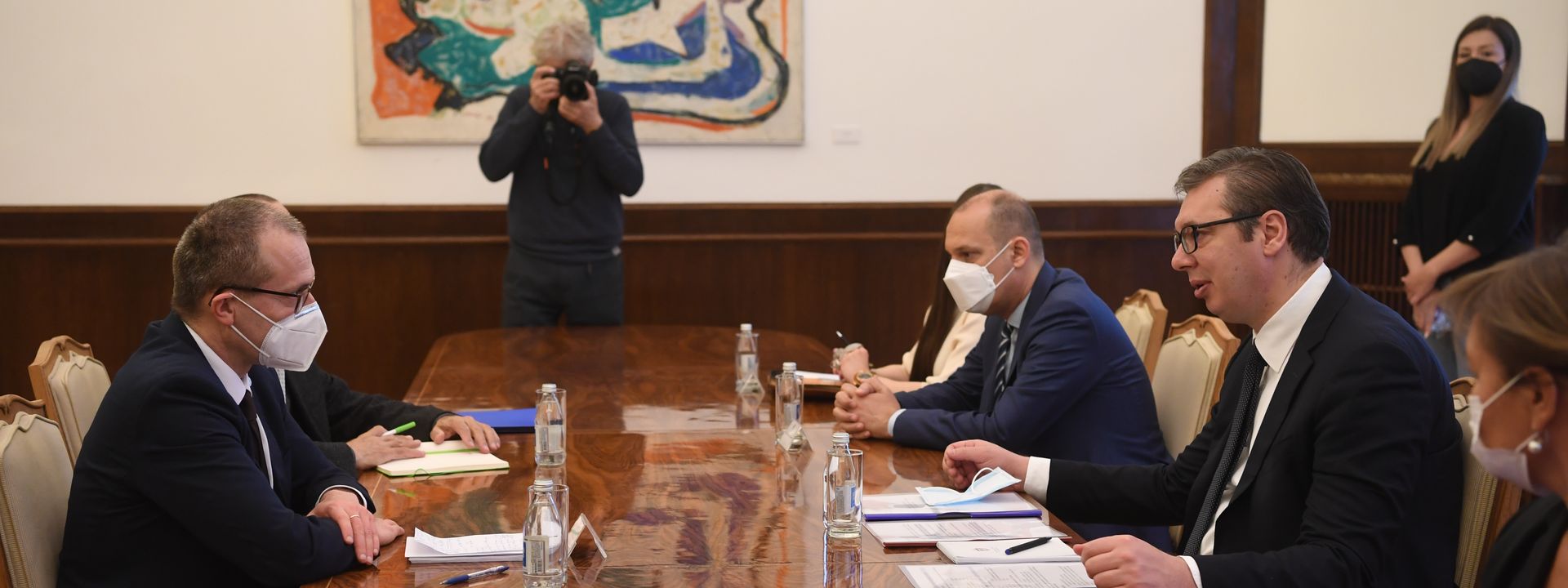
President of the Republic of Serbia Aleksandar Vučić met today with the Regional Director of the World Health Organisation for Europe Hans Kluge, to discuss cooperation in the fight against the COVID-19 pandemic, as well as cooperation in improving health care in our country and other joint activities.
President Vučić thanked Dr Kluge for his personal engagement and support during the current pandemic, especially for technical assistance and expertise. On this occasion, he informed the WHO official about the results of immunisation in Serbia and plans on how to provide the vaccine to all citizens who want to get it.
Dr Kluge congratulated President Vučić on his leadership and personal commitment to provide vaccines. He emphasised that Serbia, with its good immunisation strategy, ranked among the global leaders, thus becoming an example of humanity and solidarity by enabling vaccination of elderly people in rural areas, foreign citizens and donating vaccines to other countries.
"Serbia has accepted the vaccine as a life-saving product and has not looked at it geopolitically", said Dr Kluge.
The two interlocutors agreed that the world should increase production capacities for vaccines, as well as develop new adequate therapies for the fight against COVID-19, and, in this regard, work on increasing the level of citizens' trust in science.
President Vučić informed Dr Kluge about the plans for improving the work of the Institute for Virology, Vaccines and Sera "Torlak".
"We want to make 'Torlak' one of the best vaccine factories in Europe", said President Vučić.
Source: www.predsednik.rs
Photo: www.predsednik.rs |
|
|
| WHO describes immunisation process in Serbia as impressive |
|
19 April 2021
.jpg)
Prime Minister Ana Brnabic talked today with World Health Organisation (WHO) Regional Director for Europe Hans Kluge about the epidemiological situation and the course of immunisation of citizens in Serbia.
Brnabic expressed gratitude for the cooperation in the fight against the pandemic, technical assistance and expertise, emphasising that the support of this organisation is very important for our country.
She informed the WHO Regional Director for Europe about the course of immunisation of citizens in Serbia, expressing her belief that, thanks to the large number of vaccinated people, we will be able to create collective immunity and return to normal life.
Kluge assessed the immunisation process in Serbia as impressive, and added that Serbia has made a good decision to offer citizens all available vaccines used in the fight against coronavirus.
Expressing concern over the emergence of new strains of the virus, he stressed the need to speed up the immunisation process and show mutual solidarity.
The WHO Regional Director for Europe praised Serbia for the humanity it has shown by donating vaccines to the countries of the region and enabling vaccination for those who do not have a sufficient number of vaccines for their citizens.
The Prime Minister said that Serbia will continue to cooperate with the countries of the region and help in accordance with its capabilities.
When it comes to the project "Roadmap for Health in the Western Balkans 2021-2025", it was stated that, if epidemiological conditions allow, a regional meeting will be held in Belgrade at the end of the year, important for future improvement of cooperation between countries in the field of health challenges.
Source: www.srbija.gov.rs
Photo: www.srbija.gov.rs |
|
|
| TV AgroMais sobre os potenciais agrícolas da Sérvia |
|
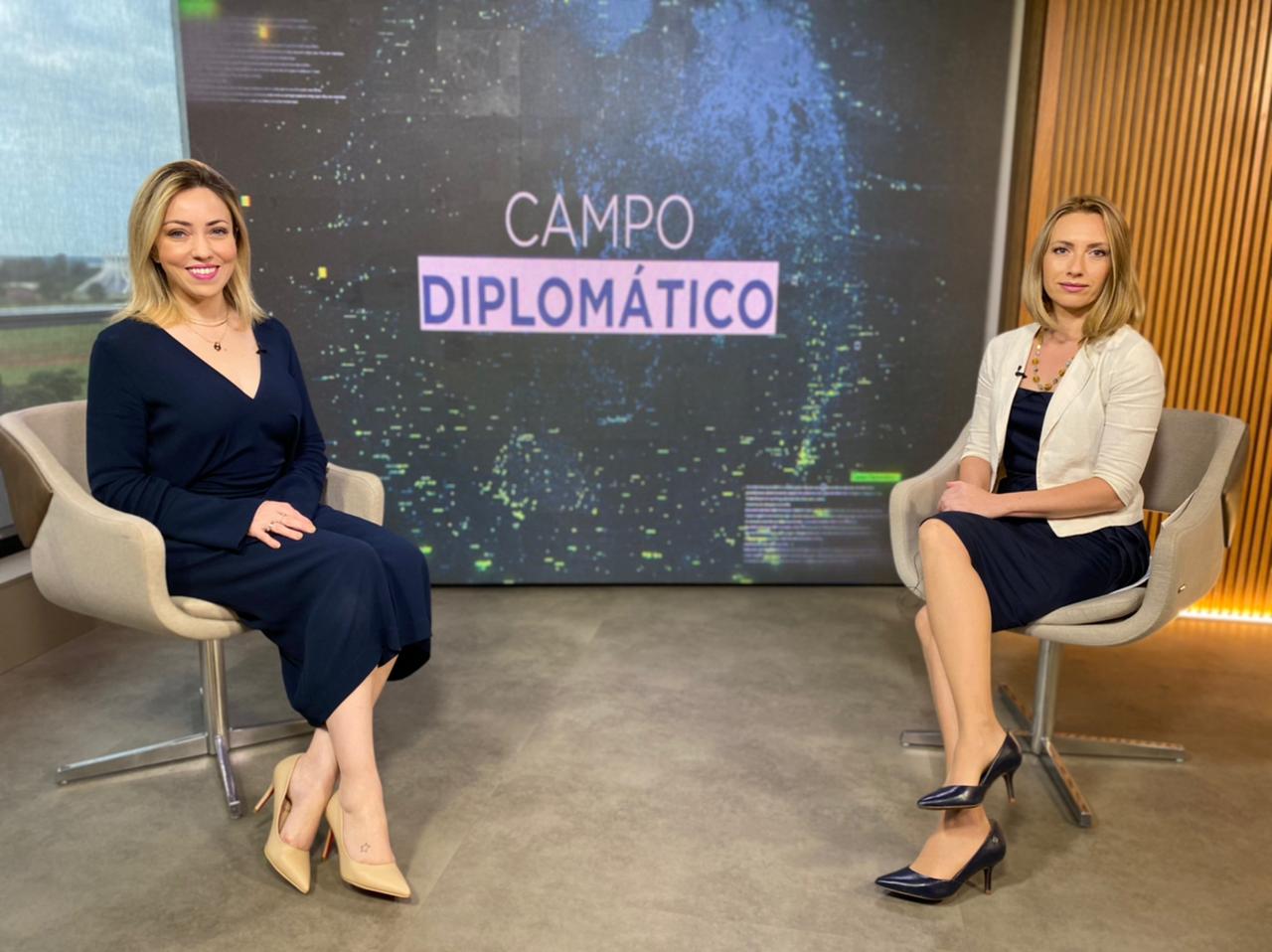
Na TV brasileira AgroMais foi transmitido um especial no programa Campo Diplomatico sobre os potenciais de investimento na Sérvia no campo da agricultura, bem como sobre as condições gerais dos negócios na Sérvia, com o objetivo de atrair investimentos brasileiros e melhorar as relações comerciais em geral entre a Sérvia e o Brasil.
Em uma conversa de meia hora, a Encarregada de Negócios a.i. Jelena Blažević destacou que na Sérvia, apesar da pandemia, existe no governo um clima muito favorável para investimentos e aprofundamento da cooperação comercial. Ela informou sobre temas como o papel da agricultura na economia sérvia, as condições de importação e exportação, as relações comerciais bilaterais entre a Sérvia e o Brasil e as possibilidades de seu aprimoramento. Ela também destacou as atividades do governo sérvio em termos de atração de investimentos estrangeiros, bem como o auxílio para os produtores nacionais, o crescimento econômico da Sérvia no ano da pandemia, atividades no campo da inovação, ciência e tecnologia, proteção ambiental e desenvolvimento sustentável. Foi destacado um interesse especial em relação à produção orgânica na Sérvia, e as possibilidades de cooperação quanto às exportações de produtos sérvios para o Brasil, como as obtidas pelo processamento de frutas como geleias, doces, além de pepinos, produtos obtidos pelo processamento de pimentas, etc.
https://www.youtube.com/watch?v=apI5wHeU5og |
|
|
| Selakovic: Pristina persists in its campaign of hatred against the Serbian people |
|
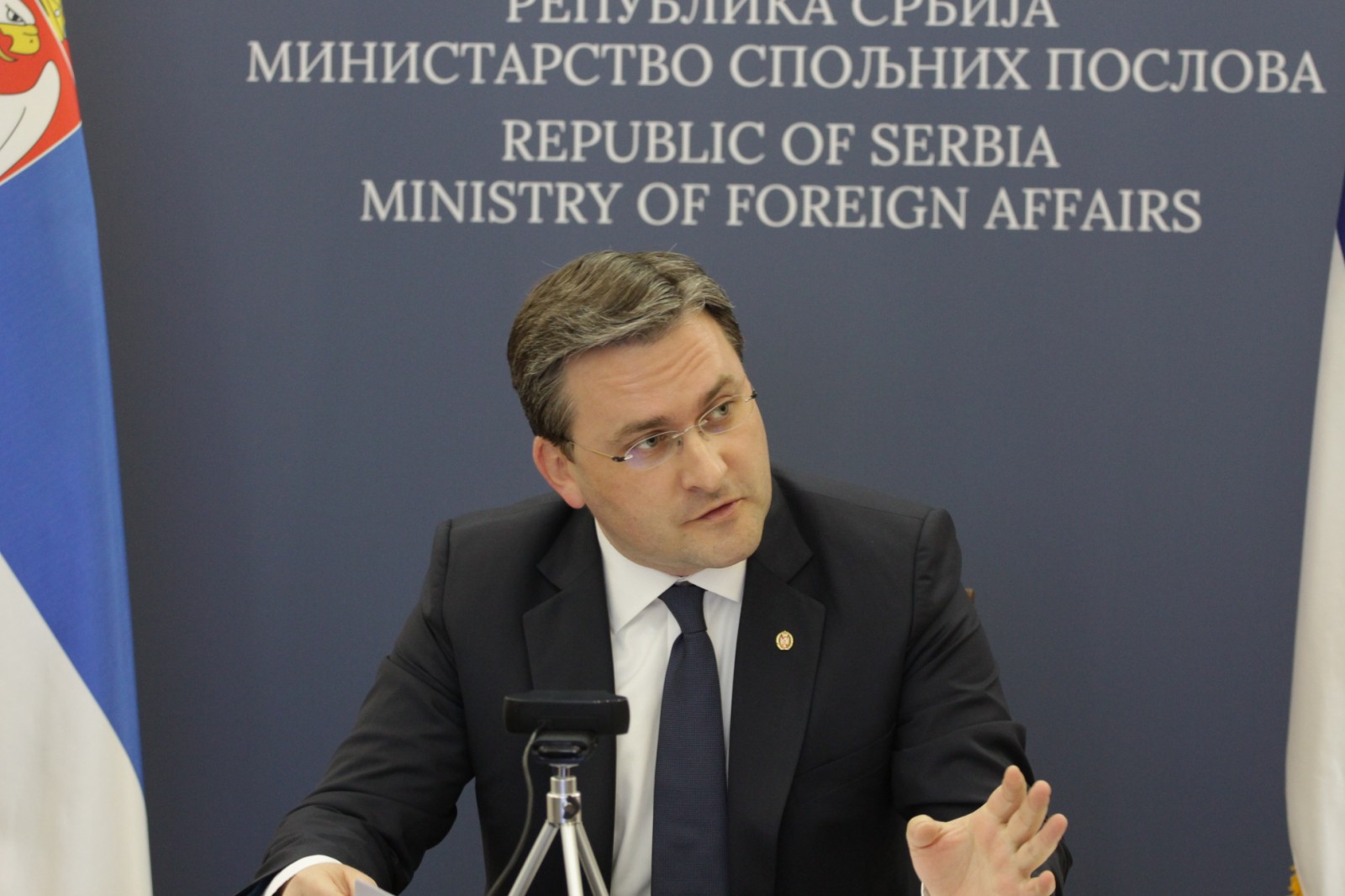
13 April 2021
Minister of Foreign Affairs of Serbia Nikola Selakovic stated today that Pristina further persisted in its campaign of hatred against the Serbian people, which was most drastically seen in the unfounded accusations of mass rapes and genocide.
At the UN Security Council meeting discussing the Report of the UN Secretary-General on the work of UNMIK, Selakovic emphasized that the efforts of the provisional institutions in Kosovo and Metohija to create a narrative about mass rapes of Albanian women were obvious, and that propaganda methods and lies were used for that purpose.
"It is clear that there were victims on all sides in the conflict, as well as that our side has evidence of numerous Serb victims. But the precondition for ensuring the protection of rights that belong to each individual victim is a rational and well-argued approach", Selakovic said responding to the slander of the Pristina representative.
Selakovic underlined that, contrary to the claims of politicians from Pristina about 20,000 raped Albanian women, the information provided by the Commission for the Verification and Recognition of Sexual Violence Victim Status indicates 912 raped persons, however, failing to include in this number the Serb women who were victims of violence.
"Let me emphasize that Serbia condemns every act of sexual violence in conflicts and is committed to achieving justice for all victims. The number of victims certainly does not diminish the horrific effect of this type of violence on each victim individually, but also, speculating on numbers does not contribute to justice being served and leads to politicization and slowing down the reconciliation process", Selakovic said.
Regarding the genocide accusations, Minister Selakovic stated that they only went to prove that Pristina further persisted in its campaign of hatred, propaganda and open hostility towards the Serbian people.
"Through statements given on a daily basis, they attempt to paint a picture that Serbia is to blame for everything and that genocide was committed against Albanians, all in order to hide their own responsibility for the committed crimes", the Serbian Foreign Minister said.
He underlined that anyone who knew what the definition of genocide implied would understand that it was not Serbia that committed something, but that the Serbian people was instead a victim of the "state-building" project of the Kosovo Albanians, based on the dangerous idea of ethnically clean territories, as evidenced by more than 200,000 expelled Serbs from Kosovo and Metohija.
"We are convinced that the civilized world will not agree to be their accomplice in concealing and covering up their crimes, and that a clear message will be sent to them that they must take responsibility for their actions", Selakovic said.
He reminded that until 1999, around 40,000 Serbs lived in Pristina, and that today there were only about twenty of them, that around 17,000 Serbs lived in Pec, and that today there were only the Serbian nuns in the Patriarchate of Pec, that around 12,000 Serbs lived in Prizren before the war, and that today only 17 families remained there, and that in Urosevac, out of 10,000 Serbs who lived there before the war, only the family of a Serbian priest remained. |
|
|
| Selakovic: Political extremism of Albanians in Kosovo and Metohija is becoming stronger |
|
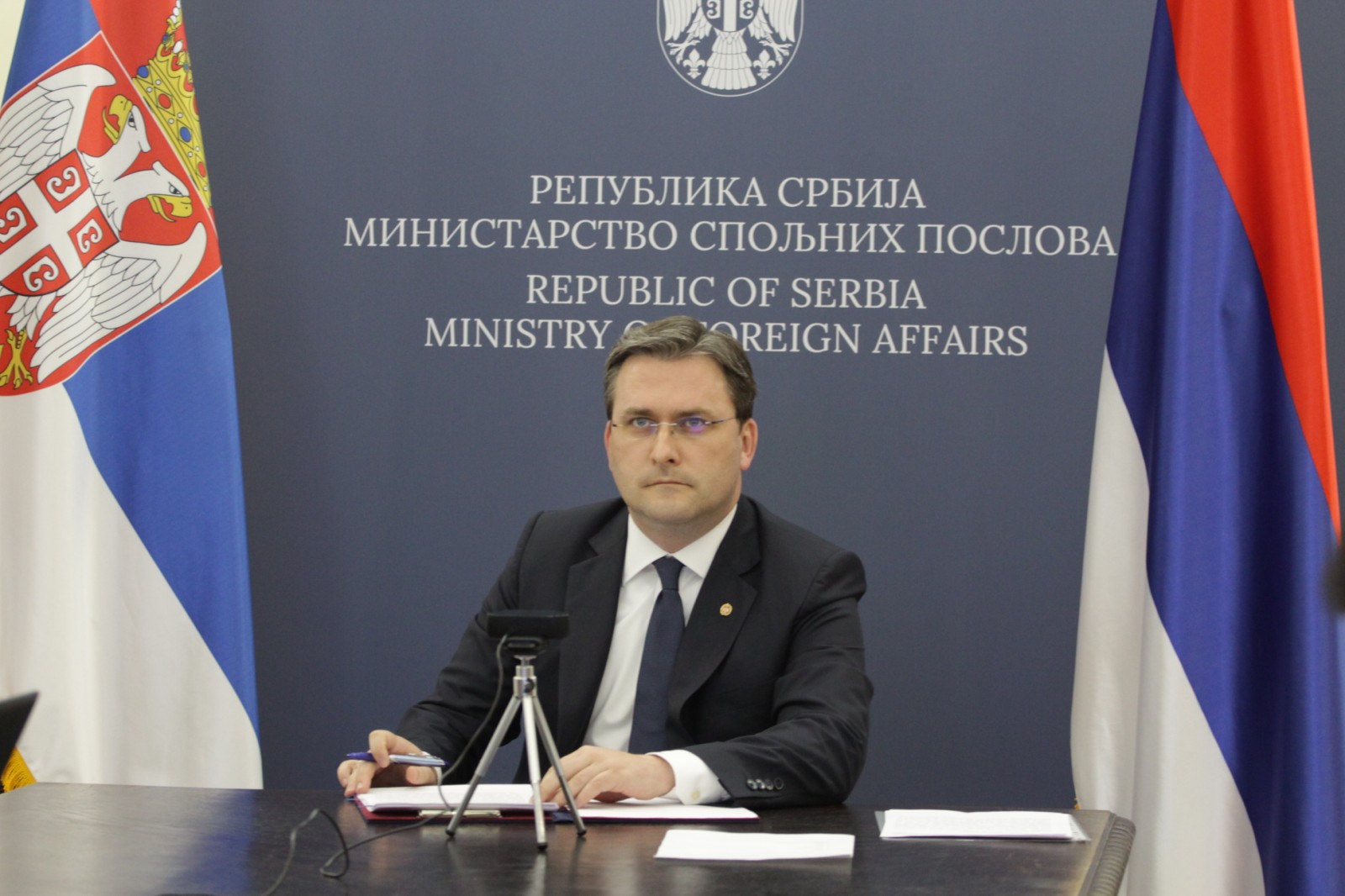
13 April 2021
Minister of Foreign Affairs of Serbia Nikola Selakovic warned, at the United Nations Security Council meeting, that the political extremism among Albanians in Kosovo and Metohija was not decreasing, but on the contrary, was becoming stronger.
At the meeting discussing the Report of the UN Secretary-General on the work of UNMIK, Minister Selakovic recalled that the obligation to form the Community of Serb Municipalities remained unfulfilled for 2,917 days now and that, in fact, 19 April marked eight full years since the agreement was reached in Brussels, while Pristina still refused to follow up on its commitment and enable the formation of the Community of Serb Municipalities.
The Minister reminded that the current Prime Minister of the provisional institutions of self-government in Pristina repeatedly threatened to unite the self-proclaimed Kosovo and Albania, and that he also stated that the dialogue with Belgrade was low on the list of his priorities.
Minister Selakovic pointed out that it was high time for Albanian leaders in Pristina to show responsibility in fulfilling their commitments, but also a sincere commitment to reaching a compromise solution and building mutual trust.
"Serbia is determined and will not give up on identifying a compromise solution, which will be sustainable for future generations as well. The only way to build lasting peace and stability in our region is by working to build trust and insisting on positive political agendas", Selakovic concluded.
According to the Minister, lasting peace and stability can only be achieved if none of the participants in the dialogue pursued maximalist demands and insisted on the complete humiliation of the other.
He pointed out that the Serbian and Albanian peoples, as the two most numerous peoples in the Western Balkans, needed to find a way to reach reconciliation and a basis for cooperation, both in terms of the economy and in achieving shared prospects for membership of the European Union.
"Belgrade has made sincere steps in that direction, by being one of the initiators of the idea of relaxing the flow of people, goods, capital and services, popularly referred to as "mini-Schengen", the Minister underlined.
Pointing out that Serbia had time and time again demonstrated its commitment to dialogue as the only way towards a peaceful, political solution to the problem in Kosovo and Metohija, Selakovic underscored that the recent elections in the Province confirmed that political extremism among Albanians in Kosovo and Metohija was not decreasing, but on the contrary, was becoming stronger, which could be seen during the recent pre-election process.
Minister stressed that political pressures on Serbs continued even after the election process was completed, by denying Serbs fair representation in provisional institutions as the new so-called government in Pristina decided to assign only one ministry to the Serb community.
"Serb returnees represent a particularly vulnerable category, who spend their every day in fear of being attacked. I remind you that the southern Serbian province is still an area with the lowest return rate of displaced persons in the world", the Minister said and emphasized that, in the last year alone, more than 80 attacks and incidents took place in our southern province, targeting Serbs, their property and religious sites.
It is particularly worrying for the Serbian people in Kosovo and Metohija, Selakovic noted, that in the previous period, and especially in March this year, there were frequent physical attacks on the property of the Serbian Orthodox Church.
"A striking example of the disrespectful attitude towards Serbian cultural and religious monuments in the Province, whose exceptional universal value UNESCO confirmed by inscribing them on the World Heritage List, is the case of the Visoki Decani Monastery", the Minister underlined.
Furthermore, the Serbian Foreign Minister assessed as concerning the breaking into the Health Center in Strpce by police inspectors and officers, in January this year, who conducted a search aiming to discover Covid-19 vaccines there, originating from central Serbia.
"Although we consider this to be an intrusion into a health care institution, our reaction was restrained this time as well. We did not want our decisions to cause escalation and politicization of activities that are solely aimed at protecting public health. We organized the vaccination of citizens from Kosovo and Metohija at three locations in central Serbia and thus clearly demonstrated that people's lives are the top priority to us", the Minister stressed.
Minister Selakovic stated that Serbia highly valued the activities of UNMIK mission in Kosovo and Metohija and that it supported it in carrying out its work as efficiently as possible and undiminished in scope, aiming to build and preserve security in the Province.
Selakovic said that the international missions in Kosovo and Metohija - UNMIK, KFOR, EULEX and the OSCE mission, under the administration of the United Nations and in line with UNSC Resolution 1244, played a key role in the preservation of peace and protection of the population.
"We support and respect their engagement and efforts made in the framework of their mandates, with the common goal of creating conditions for a peaceful and safe coexistence of the inhabitants of Kosovo and Metohija. The Serb and other non-Albanian population in Kosovo and Metohija have the utmost confidence in the international presence and consider it a guarantor of security and a barrier against the arbitrariness of the provisional institutions in Pristina", the Minister emphasized.
He said that this demonstrated the need that international missions remain engaged in an undiminished scope, in order to consistently implement UNSC Resolution 1244.
Selakovic further emphasized the importance of KFOR international forces and pointed out that any unilateral attempt to assign to someone else or that someone else assumes a part of KFOR's mandate and responsibilities constitutes a violation of UNSC Resolution 1244.
The Minister also noted as unacceptable the unilateral decisions on the formation of the Pristina "Ministry of Defence" and launching the process of transforming the so-called "Kosovo Security Forces" (KSF) into the so-called "Kosovo Army".
At the beginning of his statement, Minister Selakovic lodged a protest against the abuse of the video format of the session by the representative of Pristina as she had a flag of the self-proclaimed "Kosovo" placed behind her, and the representative of Russia did the same.
Below is an integral version of the speech of the Minister of Foreign Affairs Nikola Selakovic
Distinguished President of the Security Council,
Distinguished Special Representative,
Esteemed members of the Security Council,
At the outset, I have no choice but to lodge a protest against the abuse of the video format of this session on the part of the representatives of Pristina in order to promote the symbols of the so-called statehood of Kosovo. Despite the fact that the representatives of Pristina were warned on several occasions, including by the President of the Security Council at the previous session, that such abuses of Security Council sessions are absolutely unacceptable and constitute a flagrant violation of the Security Council rules on participation of representatives of the provisional institutions of self-government in Pristina, under Rule 39 of the UN Security Council Rules of Procedure, we are again faced with their reckless disregard for the rules of this distinguished body. Let me reiterate our call for the necessary steps to be taken to prevent such abuses.
It is my great pleasure to address this august body at the meeting on the work of the Mission of the United Nations in Kosovo and Metohija. At the outset, I would like to thank Secretary-General of the United Nations Mr. Guterres and Special Representative of the Secretary-General and Head of UNMIK Mr. Tanin for the report submitted and for their efforts made towards the implementation of the UNMIK mandate, and also to the members of the Security Council for the continued attention they have devoted to the issue of Kosovo and Metohija. The Republic of Serbia highly values the activities of the Mission of the United Nations in Kosovo and Metohija and supports it in carrying out its work as efficiently as possible and undiminished in scope, aiming to build and preserve security in the Province.
Mr. President,
In the previous period we have faced political instability in Kosovo and Metohija. We recently had elections in the Province, which unfortunately confirmed that political extremism among Albanians in Kosovo and Metohija is not decreasing, but on the contrary, is becoming stronger. We have witnessed Albanian leaders competing among themselves in efforts to find the best way to provoke an incident in Serb communities, in order to score political points of the Albanian electorate. Under the pretext of amending the voter list, a large number of Serbs in Kosovo and Metohija were deprived of one of their fundamental political rights - the opportunity to elect their political representatives. Out of approximately 140,000 of citizens of Kosovo and Metohija who were removed from the voter list in the latest election process, 85% are Serbs.
Despite numerous challenges and problems, the Serbian people in Kosovo and Metohija have shown, by high turnout and a convincing victory of the Serb List which won all ten seats reserved for Serbian representatives, that nothing can stop them from resolutely defending their position. Political pressures on Serbs continued even after the election process was completed, by denying Serbs fair representation in provisional institutions as the new so-called government in Pristina decided to assign only one ministry to the Serb community.
Distinguished members of the Security Council,
Unfortunately, it was not only during the election activities that we witnessed the unreasonable anti-Serb policy being pursued by the provisional institutions in Pristina. This goes to the length of breaking into the Health Center in Strpce, in the south of Kosovo and Metohija, by police inspectors and officers from Pristina, in January this year, who conducted a search aiming to discover Covid-19 vaccines there, originating from central Serbia, which they did not find. In doing so they demonstrated force and threatened to arrest the director of the Health Center, medical staff and doctors. At a time when the whole world is fighting the pandemic with vaccines being the only way to end this challenge, while Serbia is showing support and solidarity by donating vaccines and medical equipment to all in need in the region, Pristina wants to destroy vaccines only because they originate from central Serbia. As the whole world expresses gratitude to medical doctors, who have made great and heroic sacrifices in combating the virus, the provisional institutions in Pristina are attacking Serbian doctors for doing their job.
Although we believe that intrusions into health care institutions are inadmissible, our reaction was restrained this time as well. We did not want our decisions to cause escalation and politicization of activities that are solely aimed at protecting public health. We organized the vaccination of citizens from Kosovo and Metohija at three locations in central Serbia and thus clearly demonstrated that people's lives are the top priority to us. Serbia continues to be ready to help all in need of assistance, and we call for reason and responsibility, especially in such difficult times.
Mr. President,
Attacks targeting Serbs and their property have been on the rise. In the last year alone, more than 80 attacks and incidents took place in our southern province, targeting Serbs, their property and religious sites. According to the information provided by the OSCE Mission in Kosovo and Metohija, in the second half of last year, the number of incidents increased by more than 30% compared to 2019. Therefore, we cannot agree with the assessment that the "security situation in Kosovo remained stable, with a few incidents reported affecting non-majority communities". Last weekend, for example, an entirely unprovoked physical attack by a group of Albanians on two Serb young men took place in the northern part of Kosovska Mitrovica.
Serb returnees represent a particularly vulnerable category, who spend their every day in fear of being attacked. The fact that one family of returnees was the target of seven attacks clearly indicates the persistence of those who do not want Serbs in Kosovo and Metohija. There is absolutely no trace of political will in Pristina for 212,995 displaced Serbs who have been living outside Kosovo and Metohija for 22 years to return to their homes. Since 1999, the rate of sustainable return of internally displaced persons in Kosovo and Metohija has been only 1.9%, which according to the UN data is officially the lowest percentage of return of expelled population after a conflict anywhere in the world.
At the same time, while arresting internally displaced persons, Pristina authorities are exerting the strongest of pressures on the Specialist Chambers in The Hague. The aim is to completely prevent the further processing of a number of cases against members of the terrorist KLA, on charges of serious crimes committed during the conflict in Kosovo and Metohija against both Serbs and persons belonging to other nationalities. President of the Specialist Chambers Madam Trendafilova recently warned that, should the pressures continue, this would have very dramatic consequences to the trials in progress. President Trendafilova underlined as highly problematic the phenomenon of witness intimidation, who are key for conducting proceedings successfully and rendering a proper verdict.
Although the wait to raise indictments was far too long, we consider it commendable that efforts have finally been made to punish the perpetrators of numerous serious crimes which were committed during the armed conflicts a little over two decades ago, but also upon the arrival of the international forces to Kosovo and Metohija. For example, no one has been held accountable to this day for the killings and abductions of 17 journalists in Kosovo and Metohija, which is currently the largest number of unsolved cases of murdered and kidnapped journalists in Europe. Furthermore, the perpetrators of any of the mass crimes committed against Serb civilians after 1999 have not been brought to justice. I will remind you of only a few of these cases: 14 Serb farmers were killed in the village of Staro Gracko, 12 displaced Serbs were killed and 43 wounded in the attack on the "Niš Express" bus in Livadice near Podujevo, and in Gorazdevac near Pec unknown persons fired automatic weapons on children who were swimming in the Bistrica river. Two Serb children were killed then, and four were seriously injured.
We expect the EULEX Mission to continue to support the Specialist Chambers and the Specialist Prosecutor's Office, as well as its additional engagement in the field of the rule of law. Special attention needs to be devoted to witness protection, and determining the fate of missing persons.
International missions in Kosovo and Metohija - UNMIK, KFOR EULEX and OMIK are an integral part of the international civilian and security presence in our southern province, under the administration of the United Nations and in line with UNSC Resolution 1244 (1999), and play a key role and make an outstanding contribution to the preservation of peace and protection of the population. We support and respect their engagement and efforts made in the framework of their mandates, with the common goal of creating conditions for a peaceful and safe coexistence of the inhabitants of Kosovo and Metohija. The Serb and other non-Albanian population in Kosovo and Metohija have the utmost confidence in the international presence and consider it a guarantor of security and a barrier against the arbitrariness of the provisional institutions in Pristina. This further demonstrates the need that international missions remain engaged in an undiminished scope, in order to consistently implement UNSC Resolution 1244.
I would like to further emphasize the importance of KFOR international forces and point out that any unilateral attempt to assign to someone else or that someone else assumes a part of KFOR's mandate and responsibilities constitutes a violation of the UNSC Resolution 1244, while also being a potential source of instability and tensions. I will remind you that Pristina, contrary to international law and completely ignoring the interests and positions of the Serb community in the Province, would not abandon its plans to install a new security actor in the territory of Kosovo and Metohija. We consider the unilateral decisions on the formation of the "Ministry of Defence" and launching the process of transforming the so-called "Kosovo Security Forces" (KSF) into the so-called "Kosovo Army" to be unacceptable. I would like to reiterate that such unilateral moves on the part of Pristina constitute a gross violation of the UNSC Resolution 1244 and the Military Technical Agreement, according to which only the International Security Forces, that is KFOR, have the mandate for all military aspects of security in the territory of Kosovo and Metohija.
In this context, an additional reason for concern is the announcement of the construction of the largest base of the "Kosovo Security Forces" in the southern part of Kosovska Mitrovica, which Serbs in the north of Kosovo and Metohija perceive as the most open provocation and threat to their physical safety.
Distinguished members of the Security Council,
It is particularly worrying for the Serbian people in Kosovo and Metohija that in the previous period, and especially in March this year, there were frequent physical attacks on the property of the Serbian Orthodox Church. In just two weeks, as many as seven Orthodox landmarks in the province were targeted by vandals, at a time when we all remember the March 2004 pogrom against Serbs and Serbian holy sites in Kosovo and Metohija. The condition of the Serbian cultural and spiritual heritage in Kosovo and Metohija is humiliating, including the four monuments that are inscribed on the UNESCO List of World Heritage in Danger (Visoki Decani, Holy Virgin of Ljevisa, Gracanica and the Patriarchate of Pec). Numerous administrative and technical barriers are imposed on priestly and monastic communities, which makes it more difficult or even impossible for them to survive on church property.
A striking example of the disrespectful attitude towards Serbian cultural and religious monuments in the Province, whose exceptional universal value UNESCO confirmed by inscribing them on the World Heritage List, is the case of the Visoki Decani Monastery.
Distinguished members of the Security Council,
The reason for the nervous behaviour of Pristina is all too obvious, as the project of the so-called independence today fails to be recognized by more than a half of the United Nations Member States, including five members of the European Union. However, it is high time for Albanian leaders in Pristina to show responsibility in fulfilling their commitments, but also a sincere commitment to reaching a compromise solution and building mutual trust.
I will remind you that the current Prime Minister of the provisional institutions of self-government in Pristina has repeatedly threatened to unite the self-proclaimed Kosovo and Albania in the past. A member of his party publicly said last weekend that the self-proclaimed Kosovo and Albania would be united, I quote, "with rifle and gunpowder, or referendum boxes".
I need not explain why such dangerous ideas constitute a direct threat to peace and stability. They violate Resolution 1244, while continuously destabilizing not only our southern province, but the entire region as well, and in no way contribute to the dialogue process, but instead hamper it again.
We have demonstrated time and time again our commitment to dialogue as the only way towards a peaceful, political solution to the problem in Kosovo and Metohija. Even today, after many years of negotiations, but also failure to fulfill what was agreed and constant unilateral moves and provocations on the part of the provisional institutions in Pristina, we are still ready to sit down at the table and talk.
We are ready for dialogue but not to be blackmailed and threatened and especially not for ultimatums recently presented by Prime Minister of the provisional institutions of self-government in Pristina. I will remind you of his statement that the dialogue will be low on the list of priorities of the Pristina authorities. It is bewildering how Pristina refers to ultimatums completely undermining any chance of dialogue, as the European Union also pointed out, as "principles" and how it persistently insists that Belgrade should recognize the unilaterally declared independence of "Kosovo", upon which, they believe, all else would be resolved. What is the purpose of the dialogue then, if Belgrade is only expected to recognize the so-called Kosovo? Does the dialogue imply that one side should give up everything only for the other to win it all? And does the dialogue, in Pristina's opinion, imply that what was agreed should not be fulfilled?
I will remind you that Pristina still refuses to follow up on its obligations arising from the agreements reached so far and does not agree to discuss their implementation within the dialogue. And the situation is quite simple - in April 2013, the first agreement was signed in Brussels, which envisaged four obligations: one for Pristina and three for Belgrade. Belgrade has fulfilled all obligations, while the only obligation that the provisional institutions in Pristina had - to form the Community of Serb Municipalities - has remained unfulfilled for 2,917 days now. In fact, 19 April marks eight full years since the agreement was reached in Brussels, and of Pristina's failure to fulfill the obligation to form the Community of Serb Municipalities.
Distinguished Mr. President,
Regardless of the discouraging messages heard from Pristina and the fact that the dialogue has been in progress for many years, Serbia is determined and will not give up on identifying a compromise solution, which will be sustainable for future generations as well. Lasting peace and stability can only be achieved if none of the participants in the dialogue pursues maximalist demands and insists on the complete humiliation of the other. The Serbian and Albanian peoples, as the two most numerous peoples in the Western Balkans, need to find a way to reach reconciliation and a basis for cooperation, both in terms of the economy and in achieving shared prospects for membership to the European Union.
Belgrade has made sincere steps in that direction, by being one of the initiators of the idea of relaxing the flow of people, goods, capital and services, popularly referred to as "mini-Schengen".
As far as Serbia is concerned, we are convinced that the only way to build lasting peace and stability in our region is by working to build trust and insisting on positive political agendas. The inhabitants of Kosovo and Metohija, of any nationality, whether they are Serbs or Albanians, do not deserve anything less.
Thank you for your attention. |
|
|
| REGIME DE ENTRADA PARA CIDADÃOS ESTRANGEIROS |
|
A fim de se proteger contra a introdução de doenças infecciosas no território da República da Sérvia, as pessoas que chegam à República da Sérvia provenientes de países com situação epidemiológica desfavorável (de todos os países do mundo) estão autorizadas a entrar na República da Sérvia desde que tenham um teste RT-PCR negativo para a presença do vírus SARS.CoV-2, emitido pelo laboratório de referência do país de onde vêm ou entram na República da Sérvia, com não mais de 48 horas a partir da data de emissão do resultado.
Se houver um atraso ao entrar na República da Sérvia, que não possa ser atribuída a culpa ao passageiro, mas sim consequência de um evento externo que não poderia ser previsto, evitado ou eliminado (atraso / adiamento de vôo, partida de ônibus, trens etc.), o teste não pode ter mais de 72 horas ao entrar na República da Sérvia.
Pessoas que chegam vindas dos Estados Unidos da América, ao invés de um teste RT-PCR negativo, são admitidas sob as mesmas condições perante um teste rápido negativo de antígeno FIA .
A restrição não se aplica a cidadãos da República da Albânia, Bósnia e Herzegovina, República da Bulgária, Hungria, República da Macedônia do Norte e Montenegro, quando entram na República da Sérvia a partir dos países de que são cidadãos. Pessoas que não são cidadãs desses países, mas que possuam residência temporária ou permanente nesses países e que entram na República da Sérvia diretamente desses países, têm a entrada permitida sob a condição de que no prazo de 48 horas a partir do momento de cruzar a fronteira do país, entreguem a um órgão estatal confiável para saúde pública um teste negativo de RT-PCR ou teste de antígeno para a presença do vírus SARS-CoV-2, emitido por um laboratório de referência da República da Sérvia.
As condições mencionadas não se aplicam:
1) para cidadãos estrangeiros que estão em trânsito pela República da Sérvia. O trânsito de cidadãos estrangeiros é limitado a um período não superior a 12 horas a partir do momento da entrada no território da República da Sérvia;
2) à tripulação e pessoal de cabina da aeronave cujo destino final seja a República da Sérvia;
3) à tripulação, pessoal e passageiros em trânsito, ou seja, transferência através de aeroportos internacionais da República da Sérvia;
4) a funcionários credenciados de missões diplomáticas e consulares estrangeiras e escritórios de organizações internacionais, bem como membros de suas famílias titulares de carteiras de identidade especiais, ou seja, documentos de identidade emitidos pelo Ministério das Relações Exteriores e pela Secretaria-Geral do Governo;
5) para menores de até 12 anos de idade, se o pai, responsável ou outra pessoa que acompanha a criança apresentar teste RT-PCR negativo, se necessário;
6) aos cidadãos estrangeiros aos quais foi concedida residência temporária ou permanente na República da Sérvia;
7) membros de forças militares, polícias e outros serviços de segurança estrangeiros que estejam em trânsito pelo território da República da Sérvia ou que venham à República da Sérvia para desempenhar tarefas oficiais com aviso prévio;
8) para pessoas que estão totalmente vacinadas (vacinadas com duas doses, ou seja, com uma dose - se foram vacinadas com a vacina AstraZeneca para COVID-19) na República da Sérvia e que possuam um certificado emitido por uma instituição ou órgão de saúde. |
|
|
| Entrevista da Encarregada de Negócios, a.i. Jelena Blažević sobre o patrimônio cultural e histórico da Sérvia, 3 de abril de 2021. |
|
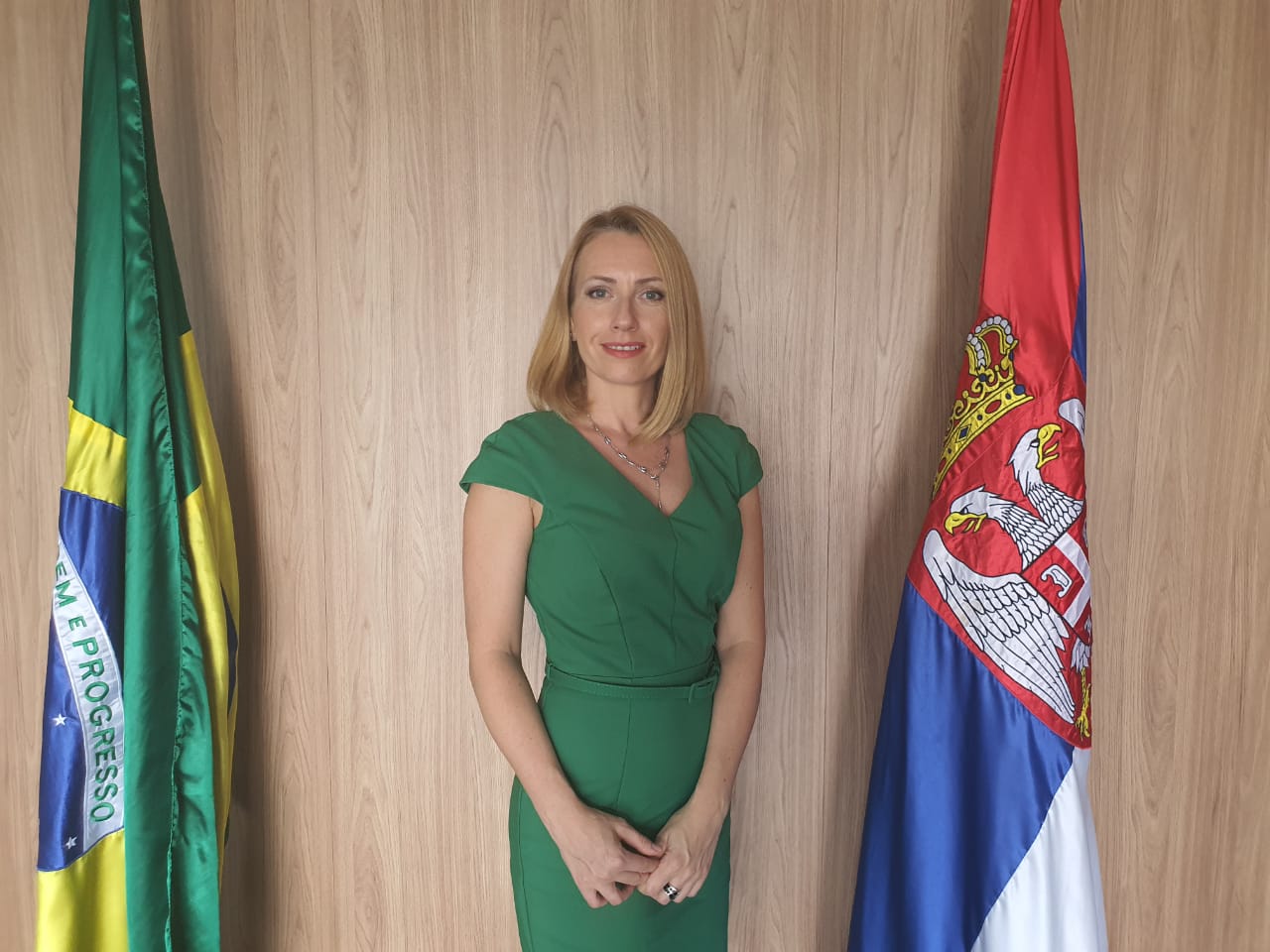
Na entrevista, para o Brasília em Foco, a Sra J. Blažević apresentou a riqueza do patrimônio cultural e histórico, bem como os conteúdos culturais e artísticos da Sérvia. Ela informou também sobre as características da gastronomia nacional, que graças à hospitalidade dos anfitriões podem ser degustadas tanto nas propriedades rurais, como nos modernos e elegantes estabelecimentos urbanos. Ela lembrou ainda das possibilidades de férias ativas em áreas montanhosas e de planície, e destacou a navegação pelo Djerdap, que é o maior desfiladeiro da Europa, onde existe uma harmonia especial entre natureza e patrimônio cultural.
A entrevista pode ser encontrada no seguinte link:
https://brasiliainfoco.com/segunda-parte-da-entrevista-com-a-chefe-da-missao-da-embaixada-da-servia-jelena-blazevic/
|
|
|
| Marking the Day of Remembrance of the victims of the NATO aggression |
|
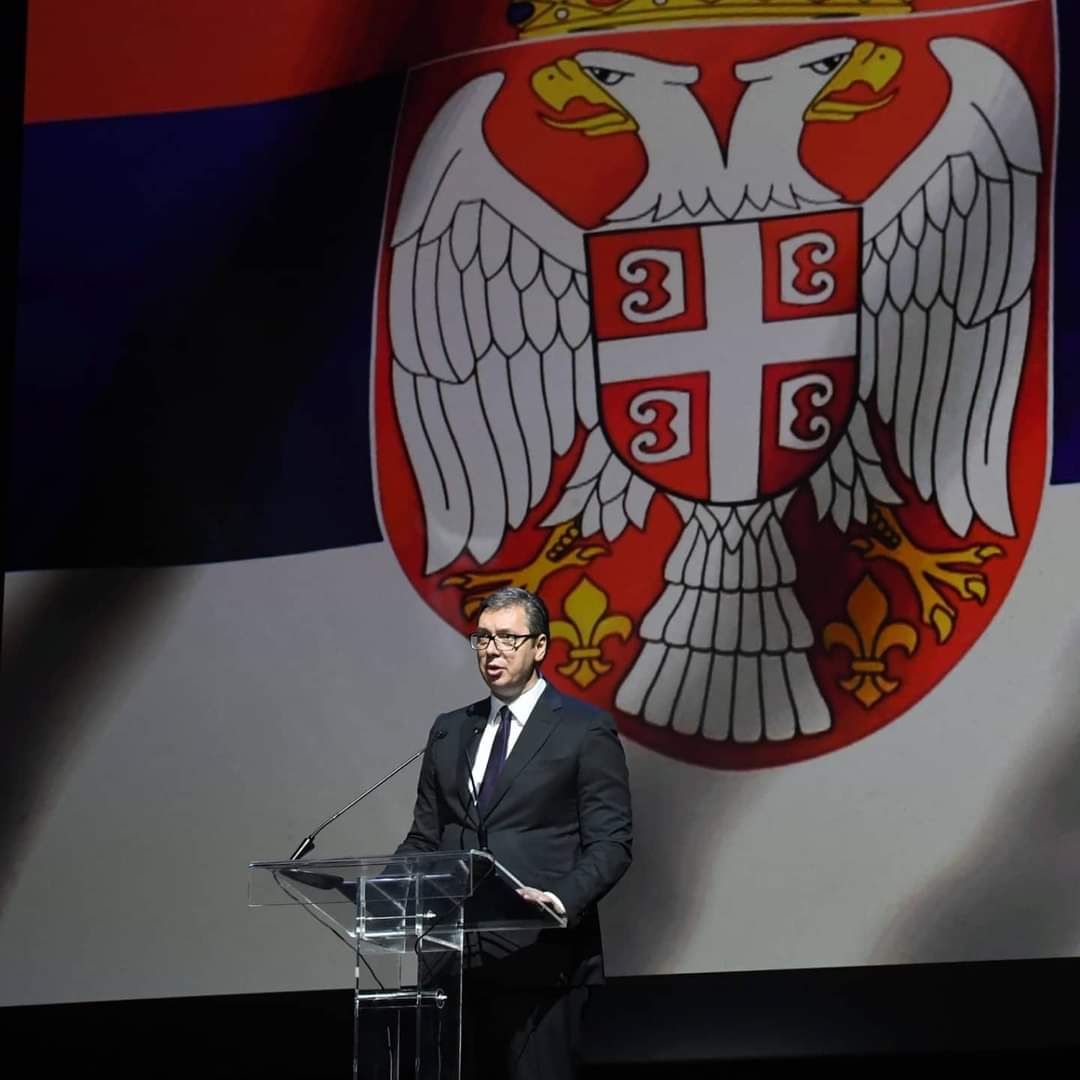
24 March 2021
President of the Republic of Serbia Aleksandar Vucic made a statement on the occasion of marking the Day of Remembrance of the victims of the NATO aggression.
"Your Holiness, distinguished Chairman of the Presidency of Bosnia and Herzegovina, distinguished Speakers of the National Assemblies of the Republic of Serbia and the Republic of Srpska, distinguished Prime Ministers of the Republic of Serbia and the Republic of Srpska, distinguished Ministers of both Governments, dear guests and friends, representatives of the Serbian People from Montenegro, North Macedonia, Croatia, thank you for the fact that we are all together tonight and that the Serbian spirit is unbreakable and invincible.
One child a day and a little more than that. That is the most difficult, sickening and painful number of the NATO aggression from 1999. Killed, stopped, guilty of nothing, having committed no sin, without the right to defence, without the right to justice and without the right to life.
No one has ever been held accountable for this crime, a crime greater than a crime. No one, for the 2,500 killed civilians, but also soldiers and policemen who were only guilty of guarding, protecting themselves and their homes. No one has ever been held accountable for more than 6,000 persons injured.
Even today, 22 years after the aggression, it is not possible to explain that, there is no universal justification, despite all the work done to that end, there is no reason, it makes no sense, and only names remain, as eternal as sin.
Miljana Milic, fifteen years old,
Vladimir Milic, twelve years old,
Miomir Mladenovic, fourteen years old,
Dragan Dimic, three years old,
Julijana Brudar, ten years,
Olivera Maksimovic, twelve years old,
Miroslav Knezevic, thirteen years old,
Dajana Pavlovic, five years old,
Stevan Pavlovic, eight years old,
Marko Simic, two years old,
Milica Rakic, three years old,
Ivan Ivancic, seven years old,
Marko Ivanovic, three years old...
And the list goes on, eighty nine names, not only Serbian ones...
The senselessness of sheer killing did not choose. Sixteen children, aged two to seventeen, from the Ahmetaj and Hasani families, were killed in a convoy returning home to Prizren.
In one headline in the West, this was simply explained as a "tragic mistake". The deaths of Marko Roglic, Milan Ignjatovic, Gordana Nikolic, Irena Mitic, Milica Stojanovic, Bojana Tosovic, Branimir Stanijanovic, our Sanja Milenkovic...could not expect or get even such an explanation.
Those deaths were not tragic, for those who caused them, much less a mistake. It was just an excuse, a miserable excuse.
They were a result of intent and a clear decision, as a severe judgment against one country, its people, its children.
And that is why today we will refrain from speculation in giving a name to everything that happened during the spring of 1999. Because a crime happened, a heinous and terrible one. And it was an aggression, not a bombing, not an intervention, not a campaign, not an operation. An aggression is what happened. An attack on a sovereign country, without a decision of the United Nations, without a sufficient reason that would justify attacking the then Yugoslavia or a neighbouring or NATO country.
No one was attacked by Serbia or the Federal Republic of Yugoslavia at that time. They attacked us, with one goal. To defeat us, to keep killing us, and in the end to take away a part of our territory.
And no matter how much we analyze things today, no matter how harsh and critical we are towards ourselves, our policy and leadership at the time, it is clear that the Federal Republic of Yugoslavia and Serbia were left with almost no choice then. The choice was horrible, either the loss of territory and people on the one hand, or the complete disappearance of the Serbian state, morals, honour, Serbian spirit, names and surnames. And we could not help but lose. Nineteen big ones attacked one small country, the Federal Republic of Yugoslavia. They attacked both Serbia and Montenegro. And even when they don't talk about it today, in one of the two independent countries, those are the facts. And that small country, and that small nation, to all nineteen of them so great and powerful, held a lesson in what matters most - honour, morals and love for freedom that a nation can have.
Yes, justice, lest we forget justice. All those nineteen great ones today still silently talk about their military success, avoid answering questions, while - can you imagine, one small, only numerically small Serbian people, that small but magnificent nation, with sadness, tears in their eyes, proudly remembers their resistance and struggle against the nineteen cruel and arrogant ones.
We lost a lot, we lost our fathers, brothers, spouses, children, but the honour and Serbian heart are still there, to protect Serbia, which is eternal and indestructible.
We lost children, we lost people, we lost control over a large part of the territory, we lost billions because of the destroyed infrastructure and economy.
And all that was left for us was the body of a tortured, destroyed country, a country in disintegration, mutilated, looted, wounded, deserted, and guilty, condemned for everything that happened not only in the 1990s, but throughout history.
A country that, even ten years after the aggression, did not have the strength to stand up, rise to its feet, and do anything but be silent, or bow its head and obediently apologize, for everything, even for its dead, even for its murdered children.
Today, it is no longer that failed, tortured, devastated, mutilated Serbia.
Today, it is Serbia, which has found its strength and its pride again.
Serbia, which calls things by their real names.
Serbia, which turned its back on war and defeats, and started working.
Serbia, which rose to stand on its own feet and has a voice of its own.
Serbia, which, even when they don't believe it, they listen to. Which is capable, which is growing, and is no longer part of the problem. Serbia, which is and will be, at least we will do our best to this end, the very solution that enables the entire region to live in peace and understanding.
And that Serbia, today, when there are still many more bombs in the world than vaccines, sends not bombs, but precisely those vaccines to the region. Today, it is ready to produce them as well, and in just a few months we will do just that, but not only for ourselves, but also for others, for the entire Balkans.
We are ready, and we are willing to help.
We are not ready to be and we will not be silent, nor be humiliated again.
We draw the right to that not only from the victims we had, but also from the fact that we stopped looking at others only a long time ago, and looking for fault and guilt only in them, and not sometimes in ourselves as well.
We looked at each other and admitted. Every loss, every defeat and every crime that someone committed in our name, every failure and every wrong policy.
And we are no longer doing anything that could endanger anyone.
We continue to work and work, and grow more and more, gaining strength with only one goal - to be the best in economy and education, health, in culture, science, sports...
And we want to be safe, on our own. We want our army to be much stronger than it was in 1999. So that we never again face a situation that someone is killing our children, destroying the country, or expelling our people.
We want to remain free, to decide our own destiny, and for no one to take everything away from us ever again, and give us nothing.
And that nothing today, and I will repeat it as much as necessary, is the idea of some great, powerful ones, but also those who serve them, the idea that "Kosovo" should recognize us, so that we could recognize "Kosovo".
We do not need that recognition. And Serbia will not allow you to walk over our victims, our history, our past, but also to walk over our future. You will get the answer of reasonable, kind and responsible people. We need a compromise. We need all the obligations that we and Pristina have assumed to be fulfilled, but only we have fulfilled them so far.
And this is not our whim. It is not a phantasmagoria about a Serbian world that we want to create.
Even today, when they threaten us with the formation of a Greater Albania, when they say that the Community of Serb Municipalities is not going to happen, it is ours to be calm, to take care of our people in Kosovo and Metohija, but to send a clear message to all those great, powerful ones that we are not as weak as we were, that we will be able to preserve what is our own, not touching anything that belongs to anyone else. After all, Serbia is not and will not be but a handful of oats that every crow from the whole wide world can eat. As for those who used the strength and power of the nineteen arrogant and cruel ones, I only ask them not to threaten us. Please, please, don't threaten us. They should not think that Serbia is broken and that it will not have the strength to respond. Please, please, our Albanian neighbours, do not threaten us. And we ask all others, who have demonstrated their cruelty towards Serbia, not to help you in that. That is all we are asking and nothing more.
And we will respond to calls for peace, calls for compromise, and always with good will, because we do not want to have children killed again. And we do not want the children of others to suffer again. But do not underestimate Serbia, and do not look at Serbia with the same eyes as you did in 1999.
Today, Serbia is much stronger, much more powerful. Today, Serbia is a united country of togetherness, not a divided one. Today, Serbia is incomparably stronger and better in every aspect than it was in 1999, from the economy to our army. And we will never threaten anyone, we just ask you and request from you to respect us and nothing more.
Today, we are building roads that will connect us, among ourselves, with the region and with the world. Until the end of the year, we will work on eight motorways, on eight routes in the entire Balkans, not only Serbia, eight roads of peace and cooperation.
Only a crazy person would trade this for war, for dead children, for demolition and new loss. And yes, we want to have the closest relations with everyone who took part in the aggression against our beautiful Serbia, we have forgiven a long time ago, but no, we will never forget. And don't ask us to. That one day, every year, we will remind both ourselves and you. The nineteen of you, the most powerful, strongest, greatest in terms of might and force, but not so much when it comes to honour and morality. We will keep remind you and ourselves, just so it would never happen again. Not to us only, but to none other freedom-loving people in the world.
And if we have an offer, today it reads as follows: we are ready to make the whole Balkans a winner, for everyone to win, as long as no one tries to make Serbs the only losers.
And the path to this goal is not difficult at all.
We just need to respect and understand each other and not try to humiliate each other.
And not to touch into what everyone paid the highest and bloodies price for. Freedom. And we, Serbs, know the price of freedom.
Into our right to have it, to keep it and to remember all the victims who are part of it.
And our defeats, our lives and our children are built into ours. And the lives of our heroic pilots, and our giants from Kosare and Pastrik, and our children, innocent, completely innocent, and only guilty of living in Serbia.
This is too high a price to be quiet about it.
Because that would mean that we are ready for another defeat, for another humiliation.
And we are not.
And when all go quiet, we will keep repeating.
A child a day, and a little more. This was how much you killed us. In an aggression that even you did not understand why you carried it out.
And we will keep repeating this, just so it does not happen to us again.
With special reverence, we are fulfilling our obligation to pay tribute to all innocent Serbian victims who laid their lives on the altar of the homeland, both civilians and our heroic soldiers and policemen, the heroes of Kosare, Prizren, Mitrovica.
Today, for us Serbs, life in Kosovo and Metohija is like Via Dolorosa, using their last strength on the road to Golgotha, but we would not be Serbs if we were not capable to "exist in a terrible place".
And today, tonight, I can conclude with one important sentence. On the soil of Europe, there was, and today is stronger than ever, an indomitable, unwavering, unconquerable and never conquered Serbia.
May eternal glory be to all the victims of the NATO aggression and let us all exclaim together - long live free and proud Serbia", President Vucic said.
Source:www.predsednik.rs
Photo:www.predsednik.rs |
|
|
| Commemorating Remembrance Day of 17 March 2004 - Pogrom in Kosovo and Metohija |
|
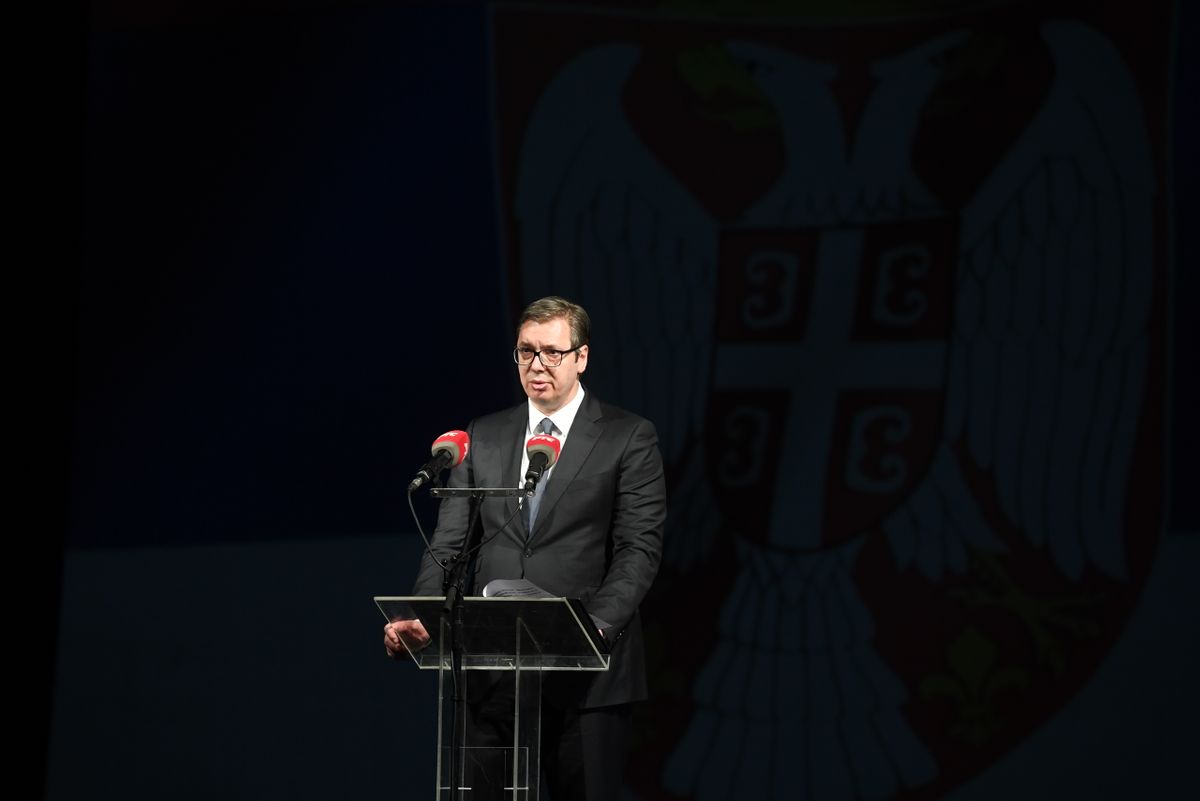
President of the Republic of Serbia Aleksandar Vucic participated today in the commemoration of the Remembrance Day of 17 March 2004 - Pogrom in Kosovo and Metohija. He said that exactly 17 years ago, a pogrom took place in Kosovo and Metohija, and that pogrom surpassed all other crimes.
"There may be times when we are powerless to prevent injustice, but there must never be a time when we fail to protest, these words of Elie Wiesel, a camp survivor and Nobel laureate, make it forever incumbent upon us not to remain silent against crime, regardless of who and for what reason committed it", President Vucic stated and added that we remembered and learned every lesson in which we were losers, each one in which we were silent to our own victims, and each one when we were ready to forget.
"Serbia is no longer weak today, nor is it a country of losers, it does not threaten, but it does not forget either, it is ready for talks, but not for humiliation. Serbia, just like everyone else, has the right to take care of its people, their safety and well-being. The right to life is a fundamental human right and we will always defend it", President Vucic said.
President Vucic said that pogrom surpasses all other crimes, because it is not only an act, but an intention, a policy, a premediated attempt to forcibly cleanse persons belonging to other peoples and faiths from a region or a country.
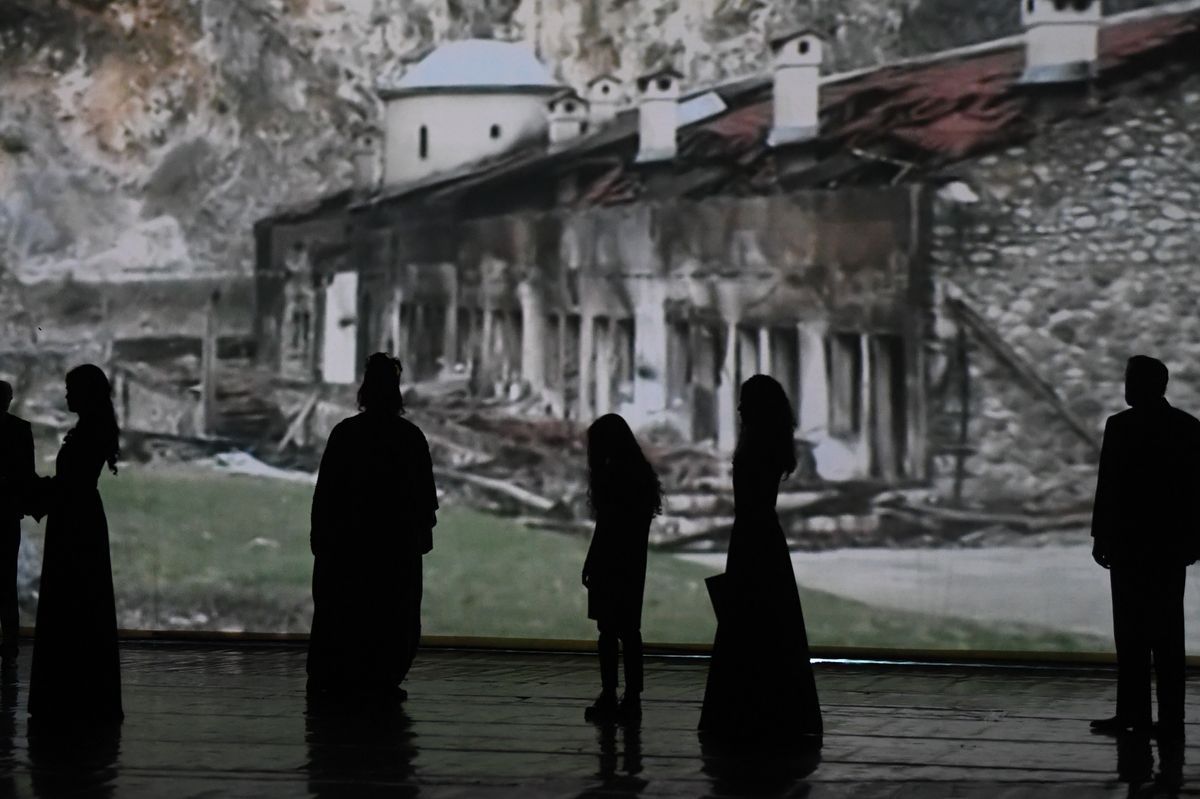
"We have no right to remain silent to that", said the President of Serbia, emphasizing that we have an obligation to be winners without blood spilled and war, to be the best in the economy, healthcare, sports, education and everything else that implies development and progress.
"We also wish others to work on themselves and be successful, because we are aware that crime is a tool for losers that winners do not need, as they remember, but forgive and move on, while the losers keep spinning in the same vicious circle. We Serbs do not want to be that anymore, we want a future in which we will remember, but from which we will not return. We know what happened and we call it by its real name", President Vucic concluded. |
|
|
| Entrevista da Sra Jelena Blažević, Encarregada de Negócios a.i, por ocasão do Dia Internacional da Mulher, para o Brasília in Foco – 08 de março de 2021 |
|
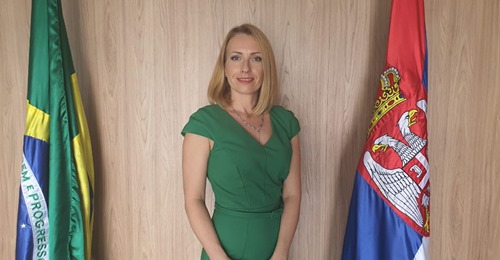
Em uma entrevista abrangente, discutiram-se o impacto e a importância da presença das mulheres no governo da República da Sérvia, bem como os progressos feitos pela Sérvia no campo da igualdade de gênero. Foram apresentados dados estatísticos, onde é constatada a importância da crescente influência e presença feminina, não só nos cargos ministeriais e na Assembleia Nacional da República da Sérvia, mas também nos cargos de chefia a nível local.
Durante a entrevista, foram apresentados os princípios da política externa da República da Sérvia. Enfatizou-se a importância do sucesso do governo da República da Sérvia no combate aos desafios atuais causados pela Covid-19 e foram apresentados resultados concretos no campo da vacinação. O texto da entrevista pode ser encontrado em:
https://brasiliainfoco.com/entrevista-especial-para-o-dia-da-mulher-com-jelena-blazevic-chefe-da-missao-da-embaixada-da-servia-no-brasil/
|
|
|
| Selakovic: Fight against all forms of crime is a priority of the Serbian Government |
|
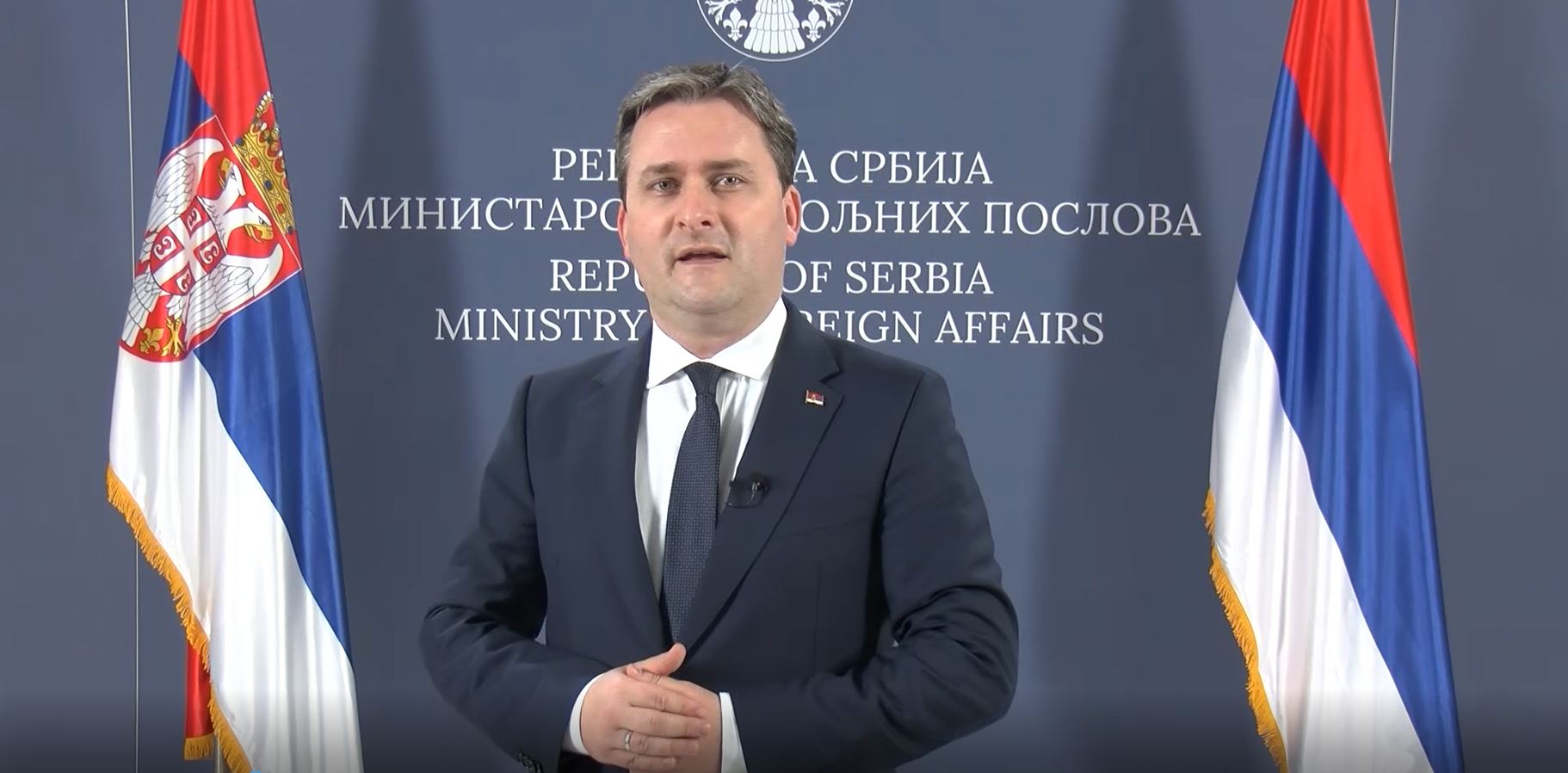
8 March 2021
Minister of Foreign Affairs of Serbia Nikola Selakovic said today that the fight against all forms
of crime was a top priority of the Serbian Government and an integral part of the EU accession
process.
"It is also our moral duty, in order to leave a better world for the generations to come", Selakovic
said participating via video-link at the 14th UN Congress on Crime Prevention and Criminal
Justice, held in Kyoto.
Minister Selakovic emphasized that Serbia, in its Second Serious and Organized Crime Threat
Assessment from 2019, identified as its goal to eliminate cybercrime, human trafficking,
terrorism and irregular migration.
The Serbian Foreign Minister pointed out that our country had established in a timely manner a
normative and institutional framework that regulates prevention of abuse in this area, as well as
that the Office of the Special Prosecutor for Cybercrime, a special court department and a special
police unit were established.
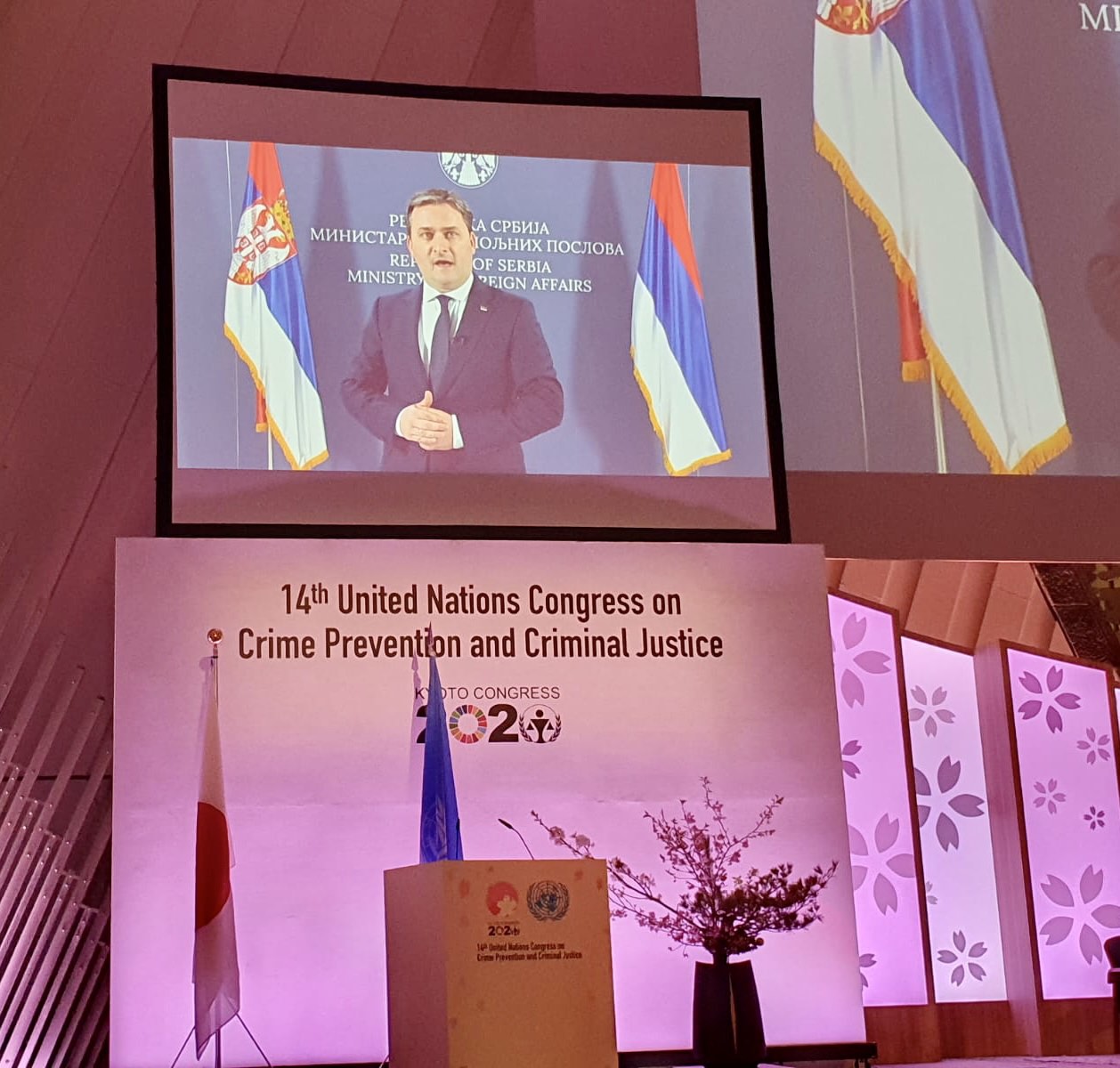
The Minister underlined that, in the field of the fight against corruption, Serbia was guided by
the postulates set out in the UN Convention against Transnational Organized Crime and the UN
Convention against Corruption.
Selakovic pointed out the efforts made by the Anti-Corruption Agency, as an independent state
body, to protect the public interest, build individual and institutional integrity, strengthen
transparency and accountability of the public administration.
"We strongly condemn all forms of terrorism, including extremism and radicalism, and call for
them to be fully eradicated, while implementing the relevant UN resolutions and conventions and
the UN Global Counter-Terrorism Strategy", the Head of Serbian diplomacy underscored.
In order to combat these complex phenomena efficiently and successfully, Selakovic said, it was
of vital importance to build capacities of our societies and states, while exchanging experiences
at the regional and global levels.
Minister Selakovic thanked Japanese Ambassador Hikihara for the skill he showed in conducting
the talks on harmonizing and adopting the Kyoto Declaration, which, as he stressed, was an
important indicator of the commitment to creating and maintaining the institutional framework
for crime prevention as one of the main preconditions for promoting sustainable development
goals.
"Back in 1970 when Japan hosted this event for the first time, we demonstrated strong political
will to draw attention to the problem. Today, it is incumbent upon us to reaffirm this willingness
and resolve and translate it into concrete steps", the Serbian Foreign Minister said |
|
|
| Metropolitan Porfirije of Zagreb and Ljubljana elected as the new Patriarch of Serbia |
|
18 February 2021
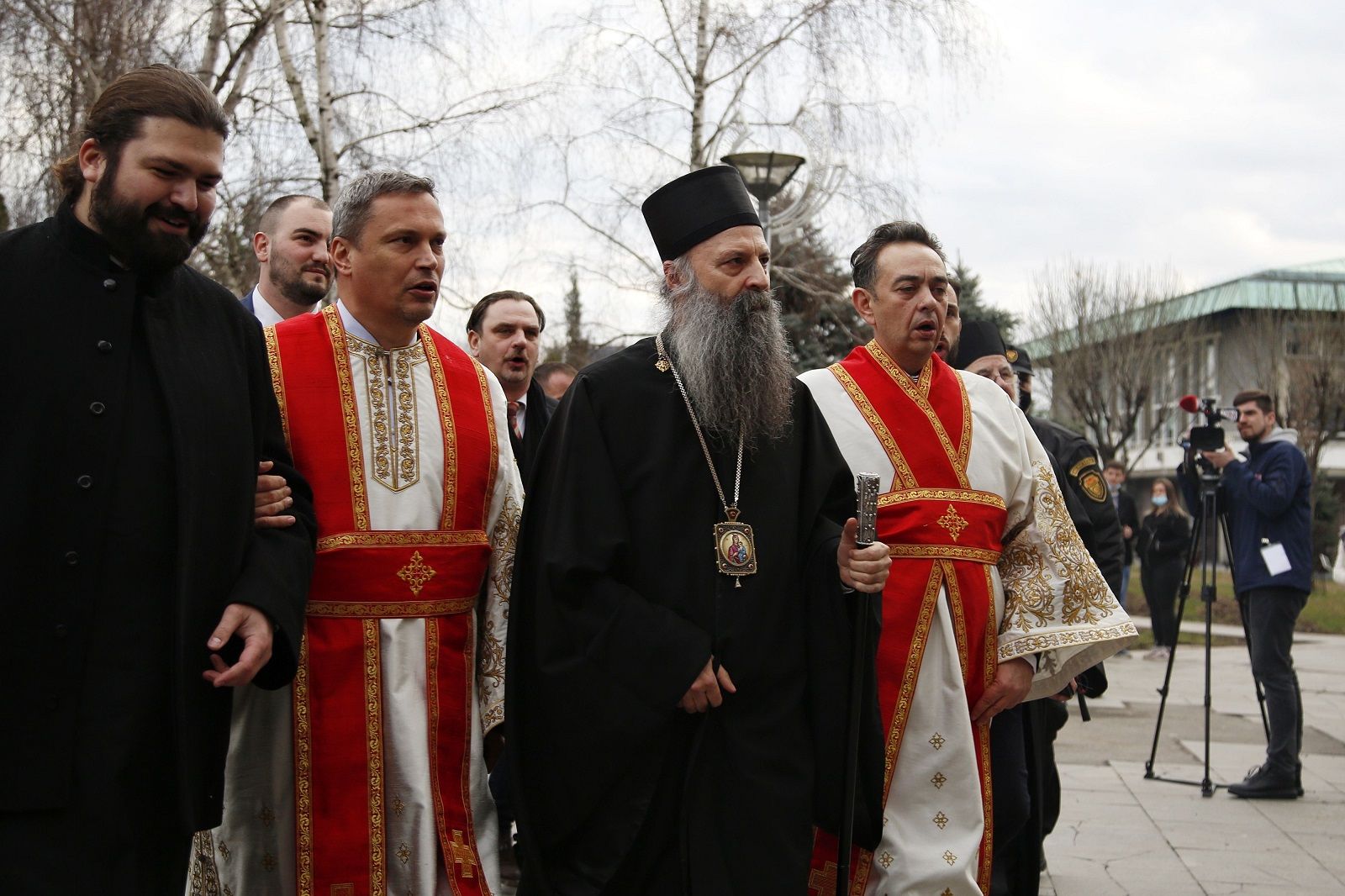
The Holy Assembly of Bishops of the Serbian Orthodox Church elected His Eminence Metropolitan Porfirije of Zagreb-Ljubljana, PhD, as the new Serbian Patriarch, in its convocation in Memorial Cathedral of Saint Sava in Belgrade on 18 February 2021.
Immediately after the election a thanksgiving service was officiated and Many Years was chanted to the Archbishop of Pec, Metropolitan of Belgrade-Karlovci and Serbian Patriarch Porfirije. Bells at Saint Sava Cathedral in the Vracar district of Belgrade rang a few minutes before 4:00 pm indicating that the 46th Patriarch of Serbia was elected.
Newly-elected Archbishop of Pec, Metropolitan of Belgrade-Karlovci and Serbian Patriarch Porfirije (Peric) was born on 22 July 1961 in Becej, to father Radivoje and Mother Radojka. He was baptized as Prvoslav. He finished primary school in Curug, and the “Jovan Jovanovic Zmaj” Grammar School in Novi Sad. He was ordained a monk according to the rite of small schime by his spiritual father, then hieromonk Dr. Irinej (Bulovic), at Decani Monastery on Sunday of St. Thomas in 1985.
He graduated from the Faculty of Orthodox Theology in Belgrade in 1986, when the then Bishop of Raska-Prizren Diocese, future Serbian Patriarch Pavle of blessed memory, ordained him a hierodeacon at the monastery of Holy Trinity in Musutiste.
He attended postgraduate studies in Athens from 1986 until 1990. That year, upon the blessing of Bishop Dr. Irinej of Backa, he joined the monastery of Holy Archangels in Kovilj, where he was ordained as hieromonk and became its abbot.
Many young monks and novices came to the monastery following him. These were the years when the Kovilj Monastery became a spiritual center for many young people: intellectuals, artists, popular actors and rock musicians, especially from Novi Sad and Belgrade. Since then abbot Porfirije has particularly dealt with drug-addicted patients. In 2005, he formed for this purpose a therapeutic community called “The Land of the Living”, which is recognized as the most successful drug-addiction therapy project and, under the leadership of Bishop Porfirije, it has more than a hundred residents in camps throughout Serbia today.
During the ordinary meeting of the Holy Assembly of Bishops of the Serbian Orthodox Church in Belgrade on 14 May 1999 he was elected as Bishop of Jegar, Vicar of the Diocese of Backa.
He defended his PhD thesis Possibility of knowability of God in St. Paul’s understanding according to the interpretation of Saint John Chrysostom at the Faculty of Theology of the University of Athens in 2004.
He became a lecturer at the Faculty of Orthodox Theology - Department of Pastoral Psychology - succeeding famous psychiatrist, academician Dr. Vladeta Jerotic. His lectures have been attended not only by students of the Faculty of Orthodox Theology, but other Belgrade faculties as well.
Together with a group of experts: psychologists, doctors, criminologists, sociologists, Bishop Porfirije founded a civic association that deals with the resocialization of victims of destructive religious sects and cults.
Bishop Porfirije has not been just president of the Steering Board for a decade, but a real spiritus movens of the Humanitarian Fund “Privrednik”, which has provided scholarships for a great number of gifted, but poor pupils and students, regardless of their nationality or religious affiliation.
In 2005, the National Assembly elected him as representative of all Churches and religious communities, to be a member of the Council of the Republic Broadcasting Agency, and in 2008 the RBA elected him its president. As President of the Council of the Republic Broadcasting Agency, Bishop Porfirije supported the long-term interests of society and citizens, unaffected by political influences.
Since then, church radio stations have been heard in the broadcasting spectrum of Serbia. He has made a key contribution to launching of a series of radio and television shows dealing with religious topics.
In 2010, The Holy Assembly of Bishops entrusted him to establish military chaplaincy in the Serbian Armed Forces. The fruits of his labour in that field include not only the suitable legal regulations, but also the selection of military chaplains, the organization and equipping of churches at barracks and performance of the first religious services.
His expert theological works Bishop Porfirije published in magazines both in Serbia and abroad. He participated in a large number of scientific conferences and symposia across the globe.
Bishop Porfirije, as one of the most prominent contemporary Serbian clergymen and intellectuals, has an extremely wide circle of friends, not only in the Homeland, and he fosters personal friendship and close cooperation with priests and representatives of other Churches and religious communities.
He speaks Greek, English, German and uses the Russian language, while his style of communication is always adapted to his interlocutors.
He was enthroned as the Metropolitan of Zagreb and Ljubljana on 13 July 2014 in the Cathedral Church of the Transfiguration of the Lord in Zagreb. The solemn Hierarchal Liturgy was served by Serbian Patriarch Irinej, accompanied by a large number of archbishops of the Serbian Church and other sister Churches, as well as priests and monks, and pious people.
Source: SPC/Serbian Orthodox Church |
|
|
| Regime de entrada na República da Sérvia |
|

Covid-19 – Condições de entrada
Com a finalidade de proteger contra a introdução de doenças infecciosas no território da República da Sérvia, pessoas que chegam à República da Sérvia de todos os países do mundo, exceto da República da Albânia, Bósnia e Herzegovina, Republica da Bulgária, República da Macedônia do Norte, Montenegro e Hungria, estão autorizados a entrar na República da Sérvia apenas se tiverem um teste RT-PCR negativo para a presença do vírus SARS-CoV-2, não superior a 48 horas, emitido por um laboratório de referência do país de onde vêm ou entram na República da Sérvia.
Se houver um atraso ao entrar na República da Sérvia, que não possa ser atribuída a culpa ao passageiro, mas sim consequência de um evento externo que não poderia ser previsto, evitado ou eliminado (atraso / adiamento de vôo, partida de ônibus, trens etc.), o teste não pode ter mais de 72 horas ao entrar na República da Sérvia.
Aos cidadãos da República da Sérvia e cidadãos estrangeiros aos quais foi concedida residência temporária ou permanente na República da Sérvia, vindos de todos os países do mundo, exceto da República da Albânia, Bósnia e Herzegovina, Republica da Bulgária, República da Macedônia do Norte, Montenegro e Hungria, e não possuem um teste RT-PCR negativo para a presença do vírus SARS-CoV-2, emitido por um laboratório de referência do país de onde veio ou entrou na República da Sérvia, ou pessoas vindas dos EUA, que possuam o teste rápido negativo de antígeno FIA , não superior a 48 horas a partir da data de emissão dos resultados, durante o controle de passaportes entrega-se uma notificação por escrito - advertência de saúde sobre a obrigação de cumprir as medidas de quarentena em casa por 10 dias a partir da data de passagem pela fronteira e serão avisados sobre a obrigação de informar à clínica competente de COVID ou instituto público de saúde territorialmente competente no prazo de 24 horas a partir do momento que cruzar a fronteira por meio de solicitação eletrônica ao endereço eletrônico: www.e-zdravlje.gov.rs
As medidas de quarentena em casa deixam de ser válidas se a pessoa a quem foi imposta realizar um teste RT-PCR para a presença do vírus SARS-CoV-2 em um laboratório de referência na República da Sérvia receber um resultado negativo. As condições mencionadas para a entrada na República da Sérvia não se aplicam:
• para cidadãos estrangeiros que estão em trânsito pela República da Sérvia. O trânsito de cidadãos estrangeiros é limitado a um período não superior a 12 horas a partir do momento da entrada no território da República da Sérvia;
• à tripulação e pessoal de cabina da aeronave cujo destino final seja a República da Sérvia;
• à tripulação, pessoal e passageiros em trânsito, ou seja, transferência através de aeroportos internacionais da República da Sérvia;
• a funcionários credenciados de missões diplomáticas e consulares estrangeiras e escritórios de organizações internacionais, bem como membros de suas famílias titulares de carteiras de identidade especiais, ou seja, documentos de identidade emitidos pelo Ministério das Relações Exteriores e pela Secretaria-Geral do Governo;
• para menores de até 12 anos de idade, se o pai, responsável ou outra pessoa que acompanha a criança apresentar teste RT-PCR negativo, se necessário;
• membros de forças militares, polícias e outros serviços de segurança estrangeiros que estejam em trânsito pelo território da República da Sérvia ou que venham à República da Sérvia para desempenhar tarefas oficiais com aviso prévio;
• aos membros de tripulação durante transporte internacional, com o objetivo de retomar ou descarregar mercadorias ou com o objetivo de transportar pessoas para ou através da República da Sérvia.
• para menores de até 12 anos de idade;
• para pessoas que tenham estado fora do território da República da Sérvia por menos de 48 horas e tenham um teste RT-PCR negativo para a presença do vírus SARS-CoV-2 emitido por um laboratório de referência na República da Sérvia com não mais de 48 horas a partir do momento da emissão. Se houver um atraso ao entrar na República da Sérvia, que não possa ser atribuída à culpa ao passageiro, mas sim uma consequência de um evento externo que não poderia ter sido previsto, evitado ou eliminado (atraso de voo / adiamento, partida de ônibus, trens, etc.), o teste não pode ter mais de 72 horas ao entrar na República da Sérvia.
Para demais informções acesse o site:
https://mfa.rs/lat/gradjani/ulazak-u-srbiju/covid-19-uslovi-za-ulazak
|
|
|
| Entrevista por ocasião do Dia Nacional da Sérvia - .15.02.2021 |
|
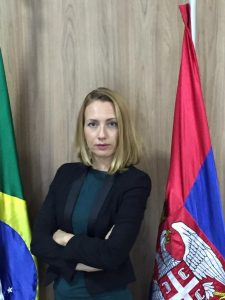
Jelena Blažević, encarregada de negócios, a.i. da Embaixada da República da Sérvia no Brasil em entrevista ao EmbassyNews fala sobre a importância do Dia Nacional da República da Sérvia, bem como os sucessos do governo sérvio no combate à pandemia e os resultados alcançados no campo econômico
https://embassynews.info/dia-nacional-da-servia-e-comemorado-hoje-15/ |
|
|
| President Vucic: Serbia is ready for dialogue on Kosovo and Metohija, but will refuse being humiliated |
|
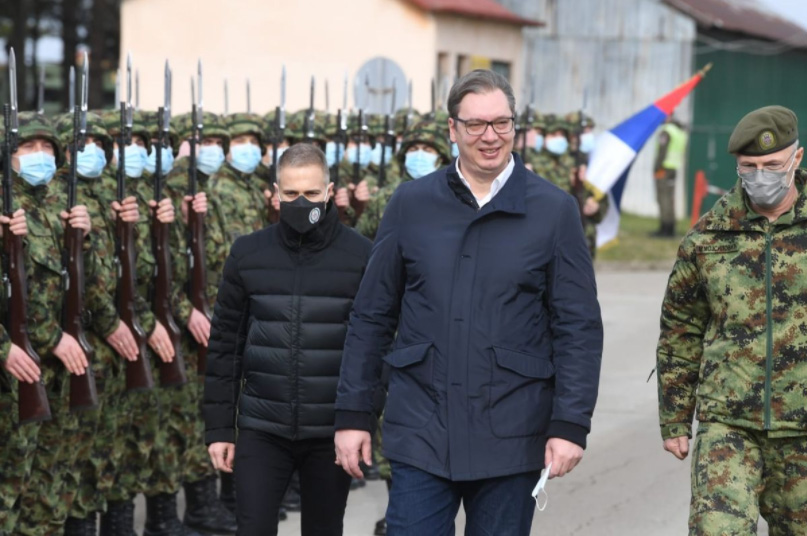
President of the Republic and Supreme Commander of the Serbian Army Aleksandar Vucic attended a demonstration of capabilities of one part of Serbian Army units in the "Rastko Nemanjić" barracks in Pancevo. On this occasion, President Vucic stated that Serbia was ready to continue the EU-facilitated dialogue with Pristina at any point, while respecting also the position of the United States as well as the positions of Russia and China.
The President said that he would rather put his "head on the chopping block" than sign any document with a recognition and reminded that he had already once refused to do so in Washington, where there were two versions of the agreement.
He stated that he immediately had his delegation leave the meeting, that he told the U.S. delegation that Serbia would not sign such an agreement, while conveying that Serbia would always endeavour to hold peaceful talks in order to preserve peace, but that it would not take any humiliation.
The Serbian President thanked the U.S. President Joe Biden for the letter of congratulations on the occasion of the upcoming Statehood Day, in which, in addition to the usual emphasis on commitment to promoting economic cooperation, regional stability and democratic values, he unequivocally called for mutual recognition of Serbia and "Kosovo" as a result.
Mutual recognition between Serbia and "Kosovo" is not part of any act of any world organization, the President pointed out and reiterated that Serbia was ready to continue the EU-facilitated dialogue with Pristina at any point, while respecting also the position of the United States as well as the positions of Russia and China.
According to the president, the situation is difficult and will only be increasingly difficult.
"As I told you three days ago, I can see it and I expect it, I can see the situation slowly tightening, because the conflicts between them at the global level have been increasing and intensifying, and then we have to pay the price", the President said.
President Vucic said that said that it was up to our state to continue strengthening the country in the economic sense.
The President added that the role of the army was very important in the highly complex security and political conditions of the modern world, and that was why Serbia needed to do everything it could to deter any potential aggressor and attacks on citizens and the country.
"The policy of strengthening the armed forces will continue at a faster pace", the President emphasized, adding that the goal was for the Serbian Army to play a stabilizing role with regard to the political developments in the region.
According to him, it should be clear to everyone that Serbia was not a punching bag and that not everyone could attack and threaten it like it was the case in the past.
Vucic said that he was pleased with what he saw and that a lot had been done in the previous period, pointing out that the salaries of military personnel would be significantly increased as of April.
President Vucic also stated that investments in the Serbian Army would continue, whom he told that he expected the Army to continue to be the guardian of our country, its integrity and freedom.
"We expect you to be the guardians of our country, its integrity and freedom, the defenders of our people, the guardians of the homeland, the protectors of the interests of the state of Serbia and to be a deterrent factor for every aggressor and anyone who might consider attacking Serbia", Vucic said.
The military exercise called "Spearhead" demostrated the capabilities of the 72nd Special Operations Brigade, and the event, which the President of Serbia and the Supreme Commander of the Serbian Army assessed as very good, was also attended by Deputy Prime Minister and Minister of Defence Nebojsa Stefanovic and Chief of General Staff of the Serbian Armed Forces, General Milan Mojsilovic.
Photo: Presidency of Serbia / Dimitrije Goll
Belgrade,
7 February 2021
|
|
|
| Entrevista da engarregada de negócios da Embaixada da República da Sérvia no Brasil para o portal Bacuri Notícias sobre os resultados do Governo da República da Sérvia no combate à pandemia |
|
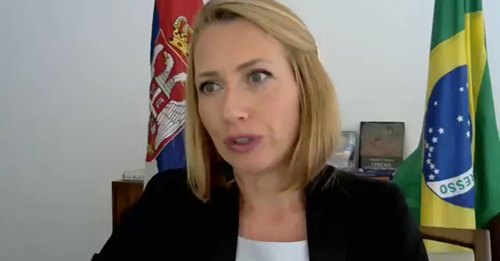
Em entrevista para o portal Bacuri Notícias, Jelena Blažević engarregada de negósios da Embaixada da República da Sérvia no Brasil аpresentou os resultados do Governo da República da Sérvia no campo econômico, e na area do combate à pandemia. Durante a entrevista, foram apontados os indicadores de crescimento econômico da República da Sérvia no ano da pandemia e, principalmente, as atividades do governo relacionadas à prevenção das doenças causadas pelo vírus COVID-19 e ao plano de vacinação da população.
A primeira parte da entrevista pode ser encontrada no link abaixo
https://youtu.be/P1g4SrqddBs |
|
|
| Minister Selakovic speaks for Politika: The year of rejuvenation of Serbian diplomacy |
|
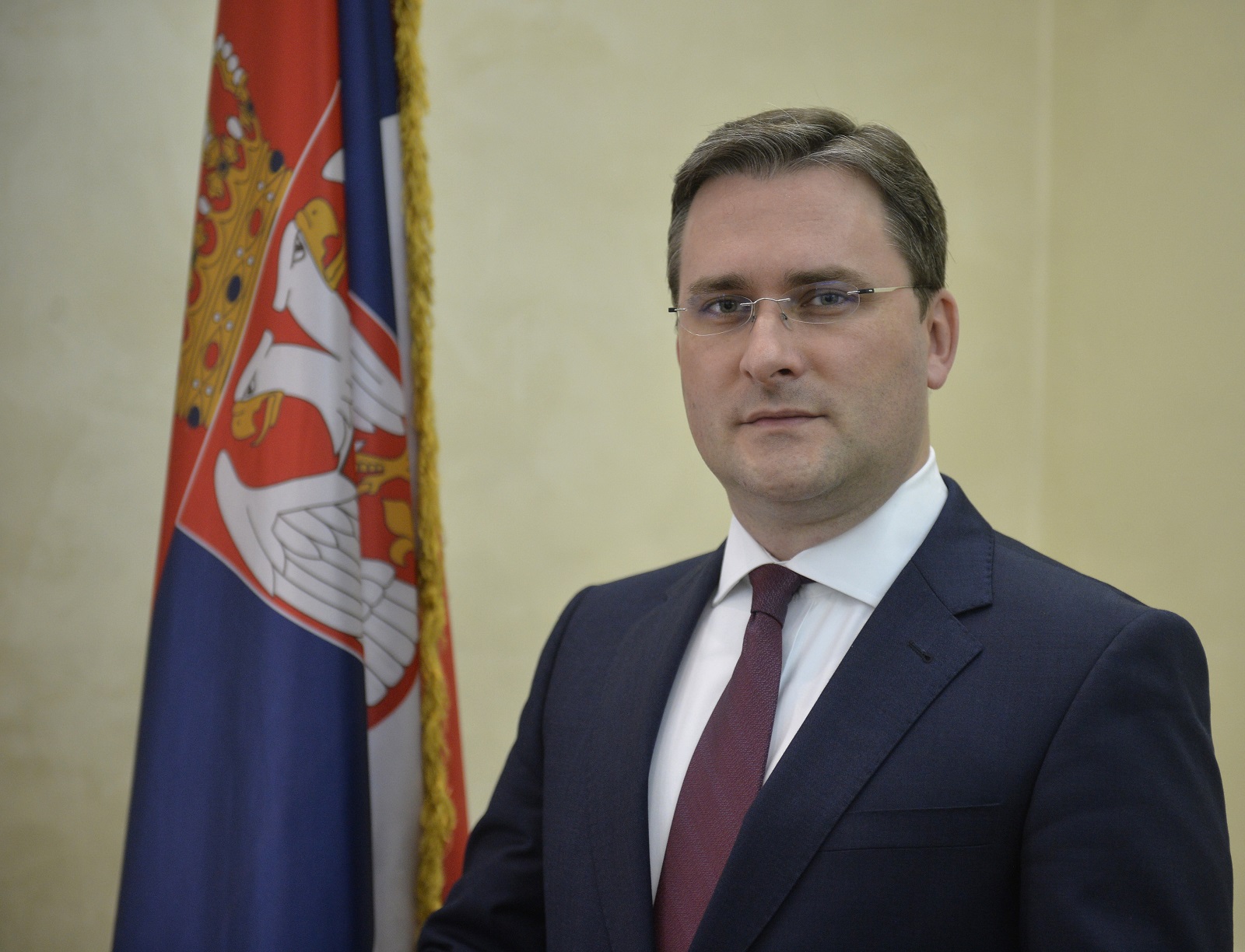
Serbia's foreign policy positions are naturally being adjusted to the new developments at the international level, but our foreign policy priorities have not changed in a long time. Our top and most important interest is to preserve good-neighbourly relations and stability and peace in the region and, in the same context, to find a peaceful and just solution to the problems in Kosovo and Metohija, Serbian Foreign Minister Nikola Selakovic said in an interview with Politika daily.
Another lasting interest of ours is full membership of the European Union, because this is the type of society we strive for. At the bilateral level, our goal is to strengthen ties with traditional friends, the Russian Federation and the People's Republic of China, but also to build new partner relations with the United States. One of the most important tasks of our foreign policy is to improve the position and protect the rights and identity of our people in the region, as well as to provide various types of support to Serbs in the diaspora. All these are very important and more often than not complementary goals, Nikola Selakovic pointed out.
What kind of relations do you expect Serbia to have with the new U.S. administration?
It is too early to speculate about this in public. The new presidential administration in Washington is currently preoccupied with internal issues and this will be the case for some time. There are people in the team of President Joseph Biden who have dealt with our region, and it is likely that the Balkans and Serbia will be the focus of the U.S. foreign policy at some point. I will remind you that President Vucic and President Biden not so long ago had very substantive talks in Belgrade, after which our President stated that he had the opportunity to talk to someone extremely well acquainted with the situation in this part of the world and an extraordinarily prepared interlocutor. Taking their personal relationship into account, but also the importance of enhancing the ties between Serbia and the United States, we have reason to expect that a meeting between the two presidents will be organized in the foreseeable future. I am sure that the nature and dynamics of the relations between Serbia and the United States will be influenced by the fact that Ambassador Marko Djuric now represents us in Washington, whose presence at President Biden's inauguration ceremony is an important signal and, I believe, a harbinger of positive developments in bilateral relations between our two countries.
How would you describe our country's relations with Moscow, Brussels and Beijing?
Russia is our traditional friend and that friendship goes beyond merely political ties. These are deep spiritual, cultural and civilizational bonds, and it is only natural that we have a mutual interest in improving those ties, even though they are at a very high level. We have a relationship with the People's Republic of China which is, in addition to the sincere iron-clad friendship between our peoples and high political representatives, based on deep trust and mutual support. Full membership of the European Union is Serbia's strategic orientation that all our friends are aware of, but our country does not forget its friendships, but strengthens and promotes them instead, and approaches all with honesty and no ulterior motives. In this context, we do not seek any preferential treatment, but only the right to freely and independently make decisions about our future and relations with all who respect us.
Could Serbia pursue a different foreign policy than the one it is pursuing at the moment?
It is always possible to have a different policy, just look at the foreign policy of Serbia ten, twenty or thirty years ago, examine the results at that time and you will realize how irretrievably expensive that policy turned out to be. Whether a policy is right, at either foreign or domestic level, is measured through its results and effect on the lives of citizens and the fate of the entire state.
Our foreign policy priorities are not being defined on a whim, but are instead the result of a serious and deep examination of our complex position and strategic thinking about ways to improve it. Today, Serbia has a better international reputation and credibility than two decades ago, and the main reason for that is that our results have shown how serious and responsible we are as a country. That kind of credibility is not achieved by trickery, but only by hard and well-thought-out work on oneself. And I need to emphasize on this occasion as well that the main inspiration for such an attitude towards politics, the state and its future comes from none other than President Aleksandar Vucic. As Minister of Foreign Affairs, I have the opportunity on a daily basis to see the level of appreciation and respect President Vucic enjoys beyond the borders of our country.
When can we expect the vacant posts of Serbian ambassadors and consuls across the globe to be filled?
That is one of the main tasks for 2021. This will be a year of reinvigoration and I believe also rejuvenation of Serbian diplomacy. Our country, given its size, has a fairly extensive diplomatic network, which provides it with great opportunities for deepening political and economic relations with countries in all parts of the world. But we need more fresh and energetic staff, people who will be the most honourable representatives of a modern and dynamic Serbia. There are such people in Serbia, and we do need a serious rejuvenation, in order to avoid wide generation gaps in our personnel, and to lay the foundations of a modern career diplomacy.
How would you describe your relationship with Serbian President Aleksandar Vucic?
President Vucic and I are, in addition to having close and friendly relations, by virtue of the work we do and our constitutional competencies, the closest collaborators in the realization of Serbia's foreign policy goals. This allows me to talk to him often, and on many occasions learn a lot of new and important things. President Vucic is a man who inspires people around him with his strategic and visionary approach to politics, and I am proud to have had the opportunity to be part of his closest team of associates over the years, and to have had him as a kind of political mentor. In any case, his vision of Serbia as a modern, progressive and prosperous state, which independently and on its own will decides on its destiny, is my wish as well and key motivation for political engagement. For only such Serbia is a country that its own citizens, as well as Serbs beyond our borders, can confidently rely on, while also being an inspiration to the entire region. |
|
|
| Presidente Vucic: a Sérvia é o primeiro país da Europa em crescimento |
|
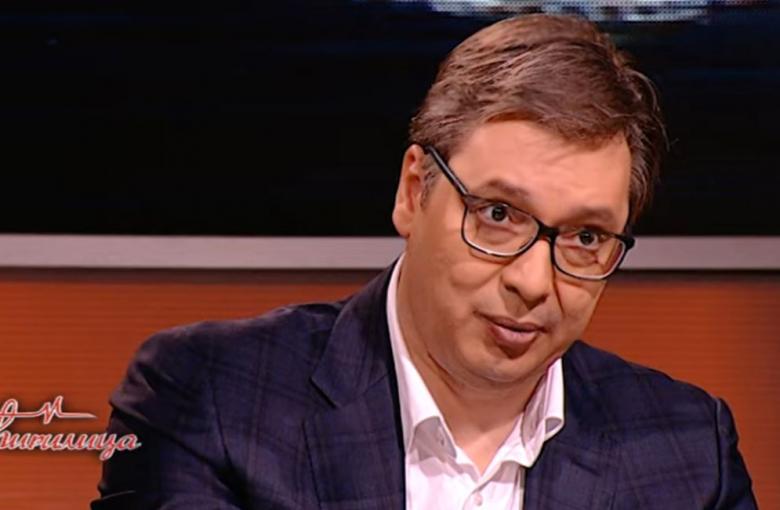
.O presidente sérvio Aleksandar Vucic ressaltou que a Sérvia é o primeiro país da Europa em termos de crescimento econômico, o que oficialmente será confirmado no fim de março, sendo que isso foi possível graças às medidas de reforma adotadas desde 2014 e a rápida abertura do país após a primeira onda do cororavírus.
O presidente destacou que a Sérvia teve um crescimento de 5.2% no primeiro trimestre, enquanto que na zona do Euro houve -3.2%, no segundo trimestre a Sérvia teve um crescimento de menos 6.3%, enquanto que na zona do Euro houve -14.7%, e no terceiro trimestre, quando a zona do Euro obteve -4,3%, a Sérvia figurou com – 1,4%. Vucic ressaltou que Montenegro, por exemplo, obteve -26% no terceiro trimestre.
Além disso, o presidente enfatizou que hospitais foram construídos e renovados no nosso país, e que dois hospitais foram construídos do zero em apenas quatro meses.
Ele disse ainda que foram feitos significantes esforços na busca por respiradores, máscaras, luvas, roupas protetoras e remédios, ressaltando que tudo que mostrou-se necessário, foi realizado em 10 hospitais gerais pela Sérvia, levando-se em conta que estes grandes feitos foram somente possíveis devido ao sucesso das reformas de 2014, com a promulgação da Lei Trabalhista, a qual obteve excelentes resultados, bem como através da consolidação de medidas fiscais.
"Estes são resultados inesperados para a Sérvia. Alguma vez antes a Sérvia foi a primeira na Europa em termos de taxa de crescimento? Obteremos os resultados em 31 de março que confirmarão que a Sérvia é a número um da Europa. Tudo isso foi possível graças ao povo que acreditou em mudanças difíceis”, Vucic disse.
De acordo com o presidente, este ano, o máximo de seis rodovias foram construídas na Sérvia ao mesmo tempo, e neste sentido, ele destacou que a Bulgária anunciou que a rodovia desde a nossa fronteira até Sófia será completada até o fim do ano, após a qual será possível o uso da rodovia para viajar atpé Istambul, o que é muito importante para assegurar nosso país em uma rota de transporte.
O presidente Vucic enfatizou que em 2020, o chamado ano da corona, nosso país teve um influxo de investimento direto no valor de 2.9 bilhões de euros, e três bilhões de crescimento, o que significa que várias empresas estrangeiras tais como a Toyota Tires, Boysen, ZTF e Brose tem investido na Sérvia mesmo neste ano de crise.
O presidente disse que a Sérvia tem os mais altos salários médios na região, chegando a 511 ou 512 euros, e que em fevereiro, devido ao crescimento de janeiro, o salário médio será de 535 ou 536 euros, e que somente em Belgrado nos últimos sete anos o salário médio aumentou em 180 euros ou 40%.
O presidente disse ainda que a Sérvia foi a quarto país na região em termos de salário anteriormente, e que hoje é oficialmente o primeiro, sendo que a diferença em relação aos outros países será somente um aumento mais rápido. Ele também destacou que a taxa de emprego está crescendo na Sérvia, bem como nossa dívida pública aumentou menos que a maioria dos países europeus. Isso é demonstrado pelos dados de que na Itália a dívida pública cresceu 156%, na Alemanha 87%, na França 114% e na Croácia 88%, enquanto que na Sérvia ficou em 57%.
O presidente sérvio anunciou que até 15 de fevereiro, um pacote adicional de assistência à economia será adicionado, e explicou que haverá una nova injeção de capital para empresas, ao comércio, empreendedores e pequenas e médias empresas que, de acordo com ele, engloba 1,052,00 milhão de pessoas no sistema.
Vucic especificou que o mais provável será uma ajuda na forma de dois ou três pagamentos no valor de meio salário mínimo cada, e que também haverá ajuda setorial ao turismo, donos de hotel, agências de turismo, guias e transportadoras de ônibus, através de outro pagamento de meio salário mínimo.
O presidente acrescentou que esforços serão feitos para extender os esquemas de garantias, os quais provaram-se ser excelentes, no valor de 1.5 bilhão de euros, e que ao mesmo tempo através do mesmo sistema, duas mais porções no valor de 500 milhões de euros serão providenciadas.
Vucic disse que os primeiros acordos com a DFC no valor de 300 a 400 miçhões de dólares são esperados em sete dias.
Ele também destacou que tal esforço irá auxiliar pensionistas adiante, em relação ao aumento das pensões em 5.9% em janeiro, no qual será refletido em seus contracheques de fevereiro, ressaltando que que em março os pensionistas receberão uma ajuda simbólica na forma de pacotes com vitaminas C, D e zinco, no qual, o presidente disse, são pequenas coisas, mas que refletem o cuidado estatal e esforços para proteger a saúde.
O presidente anunciou que negociações na aquisição da vacina chinesa serão completadas nos próximos sete a oito dias, após as primeiras doses das vacinas Pfizer e Sputnik V terem chegado na Sérvia, sendo que a vacina chinesa foi de excelente qualidade, mas provavelmente a mais cara, razão pela qual o presidente escreveu ao seu homólogo chinês buscando um desconto para nosso país.
Vucic agradeceu aos americanos por decidirem vender a vacina ao nosso país e ressaltou ninguém mais na nossa região além da Sérvia a recebeu, exceto uma pequena quantidade adquirida pela Albânia.
Ele destacou ainda que nosso país confia em suas próprias capacidades, e que nossa liderança estatal antecipou que vacinas dentro do plano europeu do COVAX chegará posteriormente.
O presidente rejeitou as alegações dos maus resultados da Sérvia na luta contra o coronavírus e que nosso país registrou a menor taxa de mortalidade por coronavírus na região.
Ele apresentou informações estastísticas indicando que a Eslovêna teve 144 mortes por 100,00 habitantes, a Macedônia do Norte 126, Bósnia e Herzegovina 123, Bulgária 115, Montenegro 115, Hungria 110, Croácia 107, Romênia 85, e Sérvia 51.
"A taxa de mortalidade na região é a seguinte: Bulgária 3.9, Bósnia e Herzegovina 3.7, Hungria 3.11, Macedônia do Norte 3.03, Romênia 2.48. Eslovênia 2.15, Croácia 1.99, Montenegro 1.4, e Sérvia 1.0. Isso pode ser visto por gráficos e não é fabricação”, o presidente mencionou.
Ele disse que o Estado brigará por vacinas, e que somente a Sérvia, nos Balcãs Ocidental, recebeu quantidades significativas de vacinas, além da Albânia em menor quantidade, e acrescentou que desde o primeiro dia de registro para abertura das vacinas, cerca de 63,000 pessoas inscreveram-se.
O presidente Vucic expressou sua crença de que o próximo ano será melhor que o anterior bem como que o coronavírus serpa derrotado através da vacinação dos cidadãos.
Belgrado,
12 de janeiro de 2021
|
|
|
| Every Serb in the diaspora is potentially a lobbyist |
|
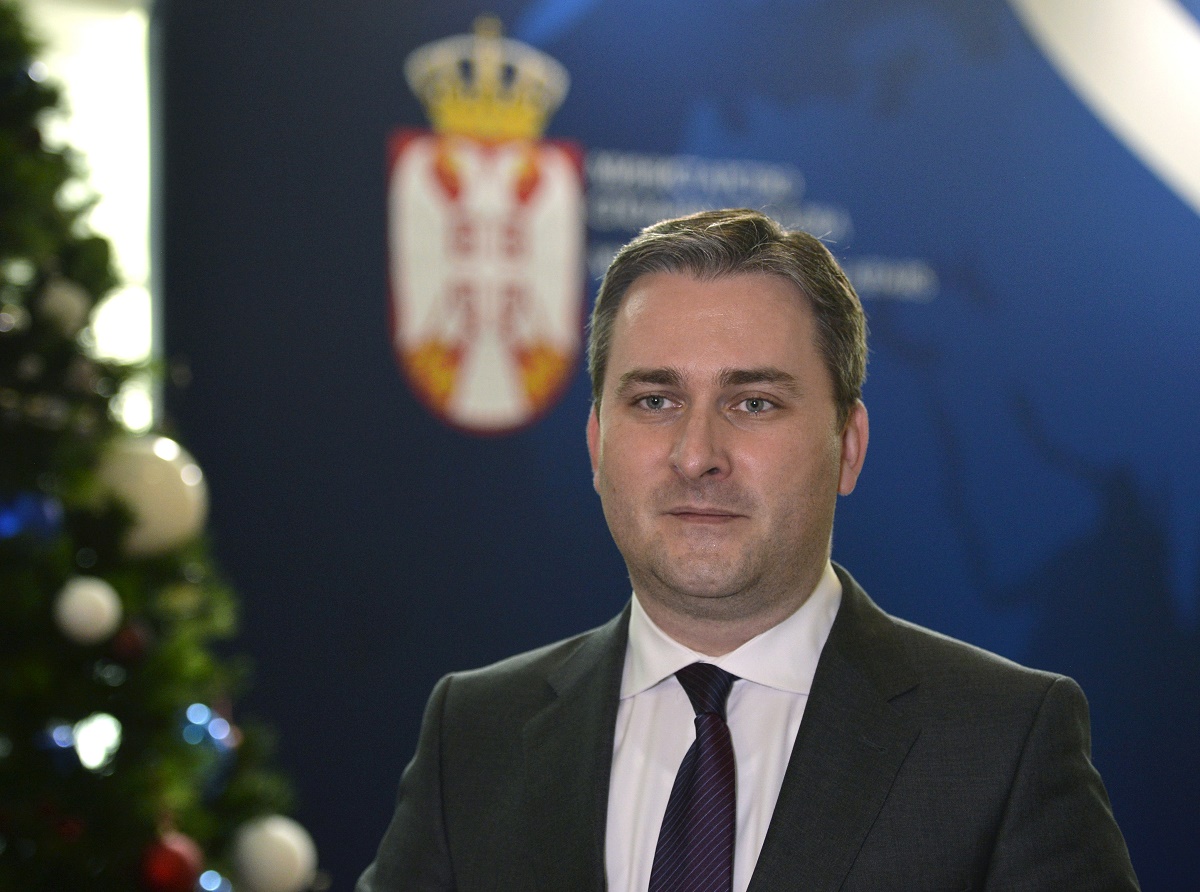
Our compatriots living abroad are one of the great potentials that the state has not recognized in the right way so far, which is why a different approach is needed to the issue of how to strengthen our diaspora and use the good will of people who are potential lobbyists for the interests of Serbia and the Serbian people, Foreign Minister Nikola Selakovic said.
"When it comes to Serbs in the diaspora, and especially in the region, this issue has been a kind of an unattended crop which requires a lot of work, and even when a lot is done at once this is not apparent immediately ", Minister Selakovic stated in an interview with Tanjug.
He emphasized that the appointment of the Director of the Office for Cooperation with the Diaspora and Serbs in the Region for the first time after almost seven years since this body was formed within the Ministry of Foreign Affairs, shows that it is one of the priorities of the Ministry he is at the helm of.
Selaković notes that intensive efforts have been long underway on forming a plan to make the diaspora more visible both outside the borders of Serbia and in the mother country itself.
"Every person in the diaspora is a potential lobbyist for the interests of our country and people, and we need to find the right way to use that", he said.
That much can be done in that regar Selakovic illustrates with the fact that only in Switzerland, in 24 cities, there are Serbian cultural and artistic associations which amounts to more than 3,000 young people who get together in order to preserve our tradition, culture, the Serbian language and history.
"If they were able to set up such associations in 24 cities, it speaks volumes about the enthusiasm of these people. There is so much enthusiasm, energy and love in these people. We need to explore ways to help them and use their good will and potential", the Minister points out.
He also cites the example of an emigrant family in Canada, the Varaklic family from southwestern Serbia, who sends Christmas packages for children in the Raska region every year. He adds that they have so far donated hundreds of thousands of dollars to non-governmental organizations for those needs alone, but he says that we do not see that here.
"The state does not recognize this, and these are people who gained success as entrepreneurs working in a distant country, who can be serious lobbyists for Serbia, for Serbian interests, someone who represents us in the best possible way", Minister Selakovic said.
Minister Selakovic also pointed out that Arnaud Gouillon has been appointed as head of the Office for Cooperation with the Diaspora and Serbs in the Region and described him as a man of extraordinary energy, great love for the Serbian people, which he showed in his engagement towards Serbs in Kosovo and Metohija, where they were seriously endangered.
"By doing so, he showed and set an example to many of our compatriots of what an individual can do. And when one such individual focuses energy, enthusiasm and love for people, on work done within the state administration system, I think that the preconditions have been created for such activities to yield good results", Minister Selakovic said.
|
|
|
| Minister Selakovic: New ambassadors will be appointed this year, but the goals remain the same |
|
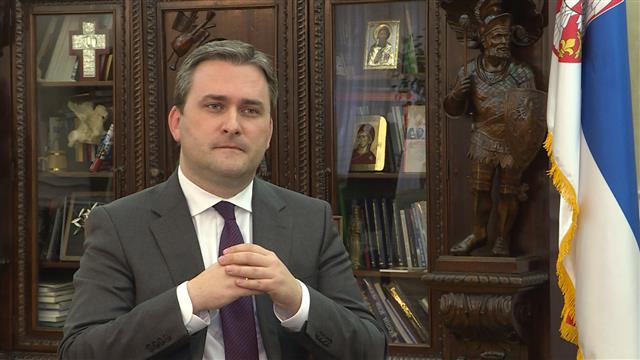
This year, Serbia could finally have Ambassadors and Consuls General appointed to about a third of the currently vacant positions in the country's diplomatic and consular missions in the world, and Minister of Foreign Affairs Nikola Selakovic is convinced that most of these positions will be filled, as he points out, by the best possible people.
"In the next year, I am convinced that the majority of these vacancies will be filled", Selakovic told Tanjug, emphasizing that the work is being done gradually, because the state wants to show that is has a quality staff who will represent Serbia's interests in the best possible way.
The Head of Serbian diplomacy reminded that in a number of diplomatic missions, the four-year mandate of Ambassadors and Consuls General has already expired, so that the procedure for appointing new ones will follow, after their recall.
One of the "vacant" spots is the post of the Serbian Ambassador to China.
"We are working hard to find the best possible solution for our new Ambassador to China and as we appointed one of the best people in the state system as Ambassador to the United States, who, I am sure, will perform his duties in the best possible way, I am convinced that it will be the same for the Ambassador in Beijing", Selakovic said.
The Minister, who took over the foreign policy sector in the Government a little over two months ago, points out that circumstances in the world, as well as Serbia's position in it, have changed, but that Serbia's foreign policy goals do not change: the country remains strategically committed to European integration and, while pursuing the EU path, it will also strengthen traditional friendships with Russia and China, as well as promote and strengthen new partner relations with the United States.
"Relations in the region, good-neighborly relations, regional cooperation are also important for Serbia, because this fits into the set of requirements on the European path. But, even regardless of the European path, it is always important who you live next to, who you live with, what your neighbors are like and what the relations are like in the neighborhood", Minister Selakovic said.
He also points out that the issue of Kosovo and Metohija is of inestimable importance, it being the main national and state issue for Serbia and the Serbian people.
"When I say that circumstances are changing, but not the goals - the EU and European integration was our goal seven years ago as well, but look at what our room for maneuver was then, in terms of economic aspects, and look at it today. Circumstances changed, and then you adjust your actions to these changed circumstances, to the best extent possible", Minister Selakovic said.
He reminds that foreign policy priorities for 2021 were also outlined by the President of the Republic, and that maintaining peace and stability in the region is the absolute priority.
"Only in a peaceful and stable region of the Western Balkans and Southeast Europe can Serbia thrive economically, culturally and scientifically - in every respect. Peace and stability in the region are “sine qua non” without which there is no development and progress. Serbia has acted, is acting and will act as a factor that stabilizes the entire region and maintains peace in the region, showing that it is the region that benefits everyone the most", Minister Selakovic said.
Relations in the region have always been complex, and the region, Minister Selakovic noted, is to our great regret, burdened with issues that we cannot have a bearing on, and which concern
the past.
Serbia's approach is to seek room to influence what is happening today and what will happen
happen in the future.
In this context, he states that the so-called "mini-Schengen" initiative for market unification of the region, which originated from Aleksandar Vucic and was met with a positive response from the Prime Ministers of Albania and North Macedonia, is one of the opportunities to do much more for the region.
"To show how much more we can do if we act together and if we seek our common denominators, and not what separates and divides us ", Selakovic points out.
When it comes to relations with the United States, Selakovic said that one should not expect the great powers to change their positions the way we would like, want or imagine, but that it is important that the Ambassador in Washington, Marko Djuric, also emphasized that his task, among other things, will be to make efforts to change the climate in bilateral relations with the United States - the most important country in the world, as our lacking communication with them in the past seriously affected the position of the Serbian people and Serbia.
"I am convinced that Djuric will work seriously on that, together with President Vucic, Prime Minister Brnabic and the Ministry of Foreign Affairs, and contribute to a large extent to changing that climate", Minister Selakovic said.
He points out that it is extremely important for Serbia to promote its partner relations with the United States to a higher level.
"This is a country with which we cooperate closely in many areas and a country with which we must strive, and not give up in doing so, to find what we have in common, our common ground and good examples of our cooperation in the past, and to create space for such cooperation in the future as well", Minister Selakovic concluded.
|
|
|
| President Vucic: Serbia to remain on the course of a winning policy of stability |
|
29 December 2020
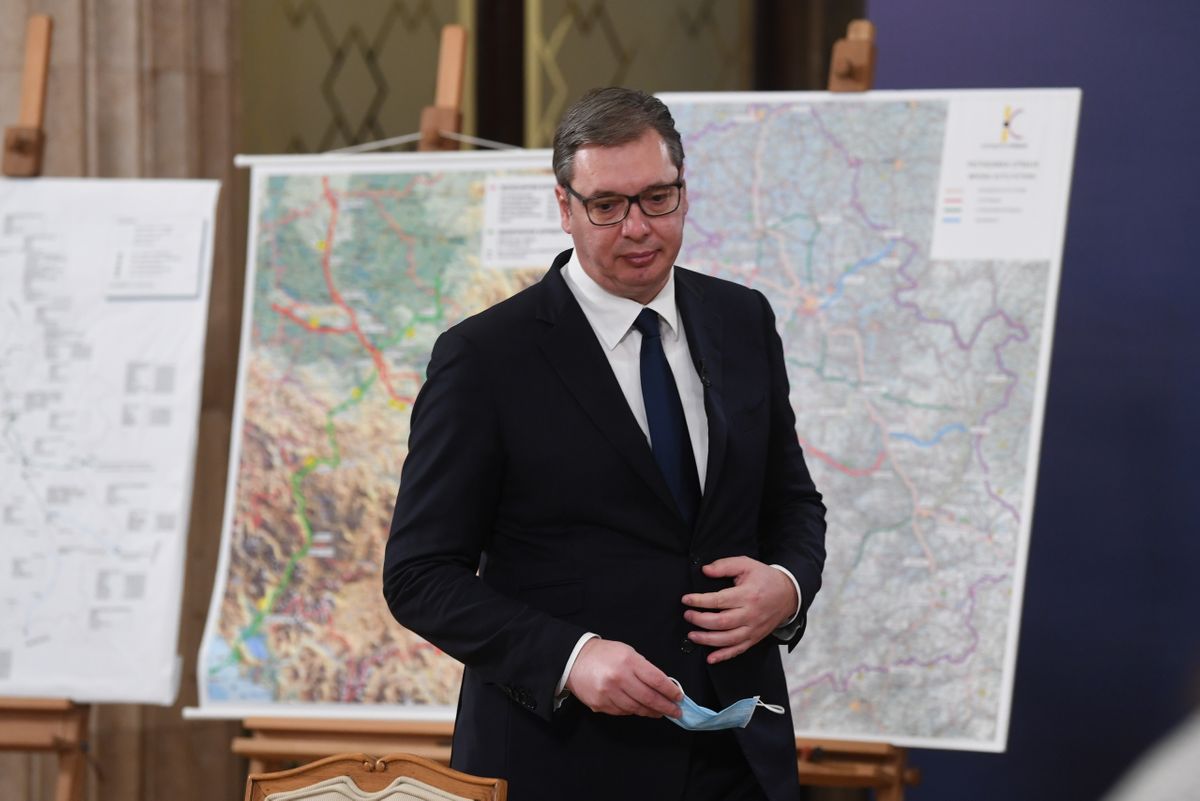
Preservation of peace, taking care of the health and better living standard are key for Serbia in 2021, underlined President of the Republic Aleksandar Vucic, convinced that even though the completion of this ambitious and by no means easy task will be anything but straightforward, best results can be achieved by working in concert with the Government, while ensuring security and a future of certainty for the citizens.
The President said that Serbia has set for itself great and ambitious goals for the next year, notwithstanding the complex international and regional circumstances, and that it will endeavour to fully preserve peace and stability in the region and the country, while safeguarding the vital national and state interests.
"Serbia will remain on the course of a winning policy - the policy of stability", President Vucic said and stressed that our country remains on the European integration path and that it will carefully foster its friendship with Russia and China, while building a friendship with the United States as well.
According to the President, Serbia will continue to pursue a winning policy, with the country itself as a top priority, i.e., a policy that will enable Serbia to continue being one of the top three countries in Europe in terms of growth rate in the next two years.
A precondition for that, the President noted, is to crack down on criminal groups, but also to ensure even bigger investments in the police and army forces.
"Serbia is the country that recorded the highest growth in Europe in 2020", the President pointed out at the annual press conference and added that he expects to conclude a new arrangement with the IMF, as well as that Serbia, by the end of next year or early 2022, will raise its credit rating to an "investment" one, which will put our country's rating on par with the most developed EU countries.
As the greatest success in 2020, Vucic noted that Serbia will end the year with the highest growth rate in Europe, which, as he said, is expected to be from minus 0.75 percent to minus one.
"I am proud to be the President of a country that is the European champion in terms of GDP", Vucic pointed out and added that German Chancellor Angela Merkel was also pleased with Serbia's success.
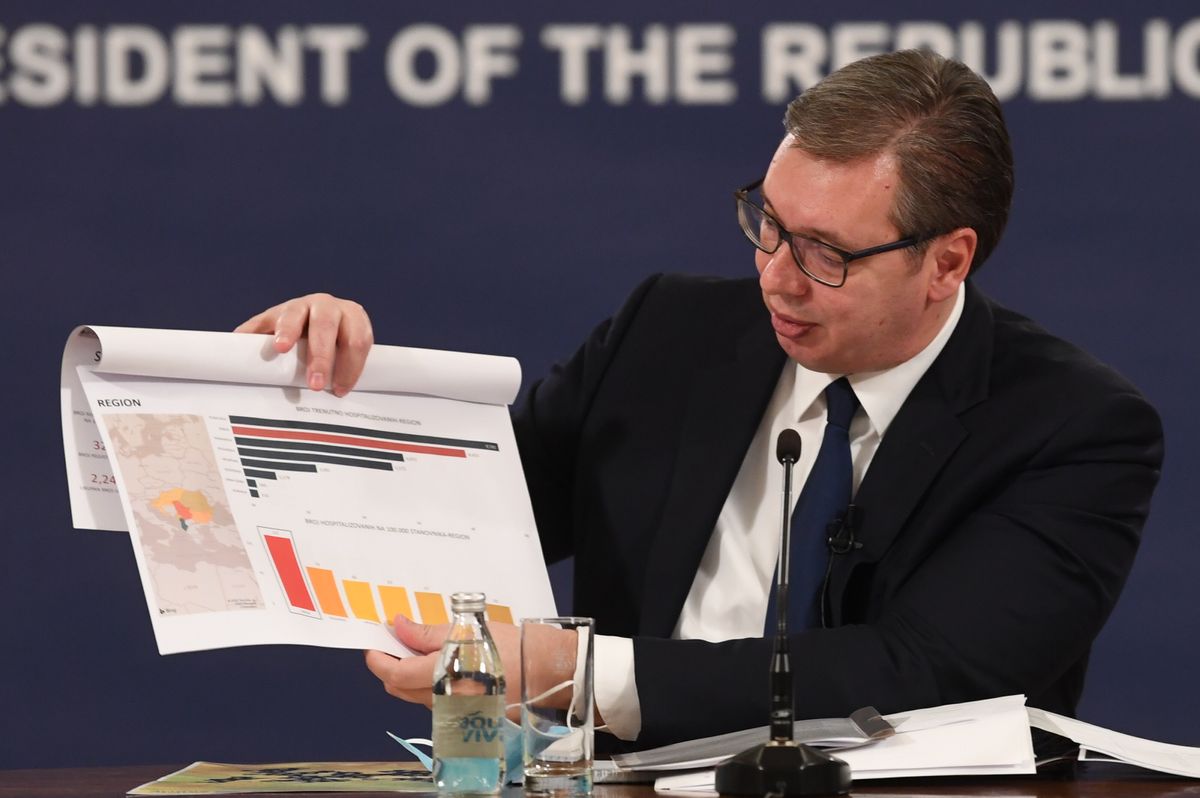
According to President Vucic, this result will encourage Serbia to accelerate its European path, while continuing friendships with those who did not turn their backs on Serbia when it was at its darkest hour, namely Russia and China.
The President pointed out that the activities to attract foreign investors will continue, then that work will be done on investments in agriculture, primarily the food industry, new machinery, and digitalization of agriculture.
President Vucic also emphasized that the goal is for salaries in the public sector to average between 560 and 570 euros by the end of the year. Only in Belgrade, the average salary would be around 700 euros.
President Vucic reminded that the salaries of health care workers will increase by five percent from January 1, while the salaries of others in the public sector will increase by 3.5 percent and an additional 1.5 percent as of April 1, while corporal, private first class and non-commissioned officer army ranks will get an increase of an additional 10 percent. He noted that the minimum wage will be increased by 6.6 percent and so will pensions from January 1, by 5.9 percent, with the plan that the average pension amounts to 270 euros by the end of 2021. The President especially pointed out investments in health care, reminding that two new covid hospitals have been opened and that the renovation and construction of health facilities continues throughout Serbia, while stressing that Serbia is by far the first in the region in terms of hospitalized persons per 100,000 citizens, which is why it has recorded a low mortality rate , and also that Serbia this year has been among the top three countries in the region according to the number of PCR tests performed.
Speaking about tourism, the President said that, next year, efforts will be made on the development of the Danube basin region, from Apatin to Kladovo, that the Ovcar-Kablar Gorge will be developed, as well as our mountain centers.
Discussing the field of culture and information, President Vucic said that the implementation of the media strategy and the completion of the reconstruction of the National Theater in Subotica are important for next year, and he announced investments in museums, especially emphasizing the relocation of the History Museum to the train station building. He also stated that the floor heating in the Church of Saint Sava will be completed next year.
He pointed out that the state will continue to take care of our citizens in Kosovo and Metohija, that no one can forbid Serbia to help its people, and that Serbia will not give up on helping our people.
As he emphasized, Serbia is ready to send medicines and vaccines to the Albanian population as well, and pointed out that in the upcoming period our country will pursue a policy of peace in the region and will endeavour to cooperate with Zagreb, Sarajevo, Podgorica and others.
|
|
|
| Serbian Prime Minister the first PM in Europe to receive a Covid-19 vaccine |
|
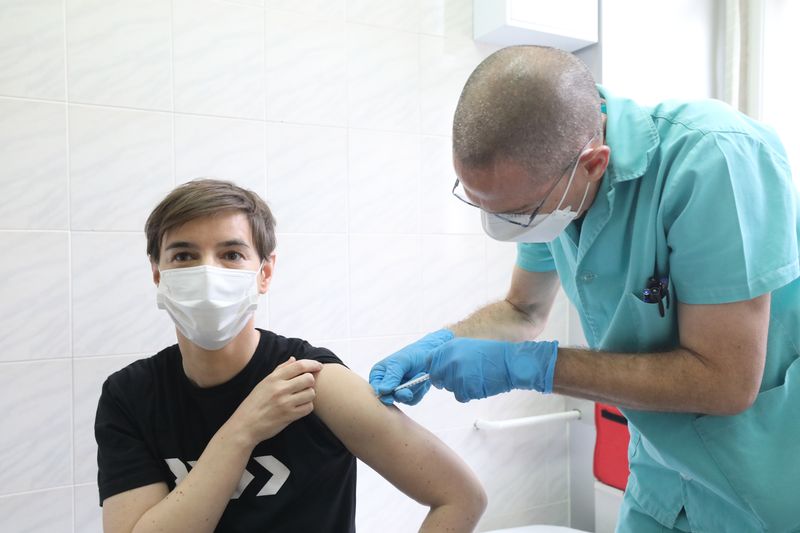
Prime Minister of the Republic of Serbia Ana Brnabic received today the first vaccine against the coronavirus made by Pfizer company, at the Torlak Institute of Virology, Vaccines and Sera.
Brnabic, who is the first European Prime Minister to receive the vaccine, pointed out that this day may be the first since 6 March that we have a reason for a smile on our faces as it marks the beginning of the end of the coronavirus pandemic in Serbia, but also in Europe and the world.
As Prime Minister and as someone who leads the COVID-19 Crisis Response Team, I felt obliged to be the first to receive the vaccine, to show that we believe in it, as well as in our institutions - the Medicines and Medical Devices Agency of Serbia and experts who worked round the clock to test the vaccine, she said.
Underlining that it was an honour to do this for her country and be the first to pave the way for all citizens, the Prime Minister said that she agreed with President of the Republic Aleksandar Vucic that the two of them receive different vaccines, so he will most likely receive the next one that arrives, most probably the one produced by China.
At the moment we have the Pfizer-BioNTech consortium vaccine, and the vaccines from the Chinese Sinopharm are expected in the near future, as well as certain quantities of the Russian vaccine Sputnik V.
She expressed her belief that at the end of the first quarter or the beginning of the second quarter of next year we will have the vaccine of the company AstraZeneca, and after that the vaccine manufactured by Moderna.
As we promised, all vaccines licensed in their countries and approved by relevant international agencies will be available to our citizens, and of course they will be tested by all of our agencies and institutes as well, the Prime Minister pointed out.
She said that prior to the vaccination of health care workers, Minister of Health Zlatibor Loncar will also receive a vaccine shot as we endeavour to serve as an example and show how confident we are in the vaccines and institutions.
Brnabic pointed out that Serbia, not counting Great Britain, is the first country in Europe to receive the Pfizer-BioNTech vaccine, and the third to start a mass immunization and campaign for giving the vaccine - after Great Britain and Switzerland.
We achieved something very important and we will not stop even for a moment until the immunization of the population is completed, the Prime Minister said.
She specified that our country will receive another 16,000 doses of Pfizer-BioNTech vaccine in January, as well as that together with other vaccines we will have a total of one million doses in January, and a total of approximately two million doses during the first quarter of next year.
There is a dynamic on which Pfizer delivers vaccines and it varies depending on the production, and this is the case with deliveries to both Serbia and all other countries worldwide. We expected to receive 10,000 doses from Pfizer-BioNTech in December, however 4,807 doses arrived, the Prime Minister explained.
Serbia demonstrated that it is able to fight and succeed if we all work as a team, Brnabic said and called on all not to see the beginning of vaccination as the end of the fight already, but to continue to apply all measures instead.
This is to be certain and to be able to help our health care workers, and once the immunity is acquired we will be able to slowly start taking off the masks in 2021, but until then we should not see this as a victory but as the beginning of the end, the Prime Minister concluded.
After the Prime Minister, vaccine shots were also administered to the Minister of Labour, Employment, Veteran and Social Affairs and a member of the COVID-19 Crisis Response Team Darija Kisic Tepavcevic and to Predrag Kon who is also on the COVID-19 Crisis Response Team.
Furthermore, vaccine shots were also given to Head of the MMA Department for the Prevention and Control of Nosocomial Infections prof. Dr. Vesna Suljagic and academician Predrag Pesko, professor of Belgrade and Heidelberg universities and full member of the Serbian Academy of Sciences and Arts.
The first quantities of the vaccine arrived in Serbia on 22 December, and today they will be administered to patrons of nursing homes in Belgrade and Novi Sad.
Serbia is the first country in the region to receive a shipment of Pfizer-BioNTech vaccine.
In addition to procuring the vaccine among the first countries in the world, even before EU countries, Serbia is one of the rare countries that managed to build and open two covid hospitals in record time. The hospitals with 930 beds in Batajnica and 500 beds in Krusevac are a major contribution to the expansion of capacities and strengthening the health care system in the fight against coronavirus and, as President Vucic said, represent a monument of the future, that will talk about the accomplishments the state made in a short time.
Also, we recall that investments in health infrastructure have been large in Serbia, and since 2016, 80 health centers and clinics have been renovated, and works are underway on six large health centers. This way more than EUR 200 million was invested in the reconstruction, construction and equipping of hospitals and more than 300 million in the renovation of clinics and specialized hospitals, and many have already been completed, such as the University Children's Hospital Tiršova, and KBC Zemun nad KBC "Dragiša Mišović" hospitals.
The absolute priority of the Serbian Government is the successful completion of health infrastructure projects that are underway, but great attention is also paid to health workers,
whose salaries have, by 2020, been increased by 56.8% for specialist doctors, and 66.9% for
nurses, while significant funding is invested in the education of health professionals, as well as in equipment and working conditions.
Like other countries, Serbia has faced great challenges this year, most notably health challenges, and all factors in the state were focused on preventing the spread of the virus and safeguarding the lives and health of citizens. Serbia has faced these challenges better than many wealthier and more developed countries in Europe and the world.
Belgrade,
24 December 2020 |
|
|
| REQUISITOS PARA ENTRAR NA REPÚBLICA DA SÉRVIA |
|
Para evitar a importação de doenças infecciosas para o território da República da Sérvia, a partir de 20 de dezembro de 2020, indivíduos que vierem para a República da Sérvia serão autorizados a entrar na República da Sérvia somente comprovando que tenham um teste RT-PCR negativo para o vírus SARS-CoV-2, não superior a 48 horas, emitido por um laboratório de referência do país que eles estão vindo, ou seja, do país de entrada na República da Sérvia. Se houver um atraso na entrada na República da Sérvia que não possa ser atribuído ao passageiro, mas à existência de uma ocorrência extraordinária que não poderia ter sido prevista, evitada ou descartada (atraso / adiamento de voo, saída de ônibus ou trem, ou evento similar), o teste não pode ter mais de 72 horas ao entrar na República da Sérvia.
Para mais informações visite:
http://msp.rs/en/themes/covid173202019 |
|
|
| The international Human Rights Day |
|
STATEMENT BY THE MINISTRY OF FOREIGN AFFAIRS
On the occasion of 10 December, the international Human Rights Day, the Ministry of Foreign Affairs of the Republic of Serbia reaffirms its commitment to the principles and values of the Universal Declaration of Human Rights, adopted on this day in 1948.
The principles enshrined in the Universal Declaration of Human Rights have been the foundation for the development of international law in this field, and of the international system for the promotion and protection of human rights, as a unique achievement of modern civilization. It is incumbent upon us today to safeguard and strengthen the international system ensuring respect for human rights, to develop human rights standards, control the implementation of commitments, and also to continue cooperating with international and regional institutions on the protection of human rights.
Serbia is fully committed to the universal values of human rights and implementing in practice the international legal instruments relating to human rights. Our continued cooperation with the Human Rights Council mechanisms in the framework of the United Nations, with the Council of Europe and the mechanisms of the OSCE human dimension, represents an important segment of activities carried out by all state authorities, thus demonstrating our consistent commitment to the implementation of international human rights standards.
The international Human Rights Day is an opportunity to point out once again that Serb and other non-Albanian population is being deprived of its rights in Kosovo and Metohija and to call again on the international community to ensure the respect for the guaranteed international human rights norms and contribute to creating conditions for the return of internally displaced persons and giving them back their usurped property. |
|
|
| República da Sérvia - destino favorável para negócios, 06.10.2020. |
|
O Gabinete da Primeira-Ministra da República da Sérvia preparou brochuras com o objetivo de promover a República da Sérvia como um destino favorável para negócios e investimento em pesquisa e desenvolvimento, e novas tecnologias. Abaixo estão os endereços de internet para acesso às brochuras.
Brochura "SÉRVIA - Centro de desenvolvimento de tecnologia emergente"
https://innovations.serbiacreates.rs/
Brochura "Guia de medidas de apoio ao desenvolvimento da economia inovadora"
https://inovacije.srbijastvara.rs/ |
|
|
| Entrada de cidadãos estrangeiros na República da Sérvia 15.08.2020 |
|
A entrada de cidadãos estrangeiros na República da Sérvia está regulamentada pela Decisão do Governo da República da Sérvia adotada com o objetivo de proteção contra a disseminação de doenças infecciosas no território da República da Sérvia. De acordo com esta decisão, o procedimento para a entrada de cidadãos estrangeiros na República da Sérvia é o seguinte:
. Cidadãos estrangeiros que chegam na República da Sérvia vindos da República da Macedônia do Norte, República da Bulgária, Romênia e República da Croácia estão autorizados a entrar na República da Sérvia se tiverem um teste de PCR negativo com não mais de 48 horas, emitido por um laboratório nacional referência do país que estão chegando, o qual está relacionado com sua entrada na República da Sérvia.
As condições mencionadas para a entrada na República da Sérvia não se aplicam aos cidadãos da República da Sérvia provenientes dos países acima citados.
Estão isentos das condições acima as seguintes categorias de cidadãos estrangeiros que entram na República da Sérvia vindos destes quatro países:
1) Cidadãos estrangeiros que estão em trânsito através da República da Sérvia, quando diz respeito a:
. tripulação de veículos motorizados de carga quando realizam transporte rodoviário internacional. No caso de transporte rodoviário de mercadorias em trânsito internacional, está limitado a um período não superior a 12 horas a partir do momento da entrada no território da República da Sérvia,
. tripulação e pessoal de cabine de aeronaves cujo destino final seja a República da Sérvia e tripulantes, pessoal e passageiros em trânsito pelos aeroportos internacionais da República da Sérvia;
2) Funcionários acreditados de missões diplomáticas e consulares estrangeiras e escritórios de organismos internacionais, bem como membros das suas famílias titulares de carteiras de identidade especiais, ou seja, documentos de identificação emitidos pelo Ministério das Relações Exteriores e pela Secretaria-Geral de Governo;
3) crianças até aos 12 anos, se o pai, tutor ou pessoa do agregado familiar que acompanha a criança apresentar o teste negativo referido no ítem n.º 1;
4) cidadãos estrangeiros aos quais foi concedida residência temporária ou permanente na República da Sérvia.
Cidadãos estrangeiros que entram no território da República da Sérvia vindos de algum outro destino (exceto dos países acima - Macedônia do Norte, Bulgária, Romênia e Croácia) estão autorizados a entrar na República da Sérvia sem a obrigação de fazer um teste PCR, nem de fazer auto-isolamento obrigatório ao entrar no país.
A mencionada decisão do Governo da República da Sérvia aboliu as medidas anteriormente adotadas em relação aos cidadãos do Montenegro, vindos de Montenegro.
|
|
|
| Regime de entrada no Brasil |
|
Cidadãos da República da Sérvia podem entrar no Brasil por via aérea, por um período mais curto (até 90 dias), com o certificado de seguro de saúde para toda a duração de sua estadia no Brasil. Estão proibidos vôos internacionais cujo destino final seja nos seguintes estados: Mato Grosso do Sul, Paraíba, Rondônia, Rio Grande do Sul e Tocantins.
Estrangeiros não podem entrar no Brasil por via terrestre e marítima até 29 de agosto de 2020, mas podem entrar por via aérea, por uma curta estadia de até 90 dias (com um visto válido, se necessário), bem como com o certificado de seguro de saúde para toda a duração de sua estadia no Brasil. Estão proibidos vôos internacionais cujo destino final seja nos seguintes estados: Mato Grosso do Sul, Paraíba, Rondônia, Rio Grande do Sul e Tocantins. |
|
|
| A travessia pelas fronteiras da Republica da Servia voltou ao regime usual |
|
Prezados,
Gostaríamos de informar que a travessia da fronteira da República da Sérvia voltou ao regime usual, o que significa que, para entrar na República da Sérvia não precisa mais de consentimento / permissão - nem para a entrada de nacionais nem para a entrada de cidadãos estrangeiros.
Além disso, a todas as pessoas que entram na Sérvia - em vez de medidas de isolamento anteriores e a obrigação de realizar um teste de PCR negativo - durante o controle de passaporte, apenas um aviso por escrito será emitido - um aviso de saúde (bilíngue, em sérvio e inglês) sobre as medidas a serem seguidas para evitar a ocorrência, disseminação e controle de doenças infecciosas COVID 19.
Até o momento, não houve alterações nesta decisão. Todas as eventuais novas informações estarão disponíveis no site da Embaixada.
Sobre as condições de trânsito os passageiros precisam consultar diretamente as embaixadas ou consulados dos países pelos quais planejam viajar, cujos contatos estão disponíveis publicamente na internet. |
|
|
| Entrevista do Embaixaodr Veljko Lazic à „Embassy News“ |
|
No âmbito do portal “Embassy News”, o Embaixador Veljko Lazic concedeu uma entrevista ( via eletrônica) sobre a situação atual na Sérvia em relação à pandemia do coronavírus.
Na entrevista, além de dados, o Embaixador explicou o atual panorama, salientando que o contágio está sendo mantido sob controle e devidamente monitorado quanto às medidas tomadas pelo governo da República da Sérvia e seus efeitos. No interesse de jornalistas, ele informou em detalhes sobre o apoio que nosso país recebeu da China na luta para conter ainda mais a disseminação do COVID-19. O Embaixador informou também sobre o atual status das nossas intituições de saúde, bem como as medidas governamentais para proteger a economia doméstica. Também foram implementadas pela Embaixada da República da Sérvia em Brasília medidas quanto aos cidadãos da Sérvia que encontram-se no no Brasil, Equador e Bolívia, na momento da pandemia. Por fim, o Embaixador informou sobre a assistência humanitária da Sérvia à Itália, e do envio de 4 aviões com equipamentos médicos e ainda mais 4 aviões com assistência médica à Itália.
A referida entrevista encontra-se no seguinte link: http://embassynews.info/servia-mantem-cautela-na-flexibilizacao-das-medidas-impostas-durante-a-covid-19/ |
|
|
| Jubileu de Brasília |
|
Jubileu de Brasília, PARABENIZAMOS!
A Embaixada da República da Sérvia felicita o Governo do Distrito Federal e todos os cidadãos de Brasília pelo grande jubileu do seu 60º aniversário. Esta cidade, cheia de características próprias e projetos arquitetônicos originais, orgulha-se de carregar o título de Patrimônio Mundial da UNESCO.
Na impossibilidade de comemorar o jubileu com todas as embaixadas, o Governo do Distrito Federal enviou mensagens para 60 embaixadores acreditados no Brasil, que encaminharam suas congratulações em seus idiomas maternos.
http://internacional.df.gov.br/parabens-brasilia/
|
|
|
| Decisão do governo da República da Sérvia - COVID 19 |
|
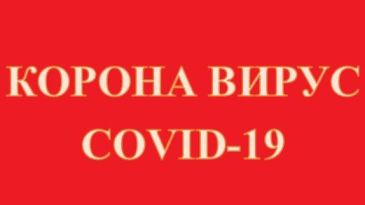
AVISO IMPORTANTE
Informamos que o governo da República da Sérvia, em sessão realizada em 15 de março deste ano, adotou a Decisão que altera a disposição sobre a doença COVID-19 causada pelo vírus infeccioso SARS-CoV-2, na qual o ponto 4 da Decisão é alterado para o seguinte:
„4. A fim de proteger contra a introdução de doenças infecciosas no território da República da Sérvia, os cidadãos estrangeiros serão temporariamente proibidos pelas autoridades competentes de entrar na República da Sérvia.
A medida do parágrafo 1. deste ponto, dentre outras, não se aplica à:
- pessoas às quais foram concedidas permissão para entrar na República da Sérvia e permanecer ou transitar pela República da Sérvia a partir de um órgão de trabalho do Governo composto por representantes do Ministério da Saúde, Ministério das Relações Exteriores, Ministério do Interior e Ministério da Construção, Transporte e Infraestrutura. O órgão de trabalho do governo determinará as condições e restrições de trânsito, isto é, relativas à estadia das pessoas que receberam permissão para entrar na República da Sérvia;
- comboios humanitários sob escolta diplomática obrigatória
- funcionários credenciados em postos diplomáticos e consulares estrangeiros, representações e escritórios de organizações internacionais, bem como membros de suas famílias que possuem carteiras de identidade especiais, ou seja, documentos de identificação emitidos pelo Ministério das Relações Exteriores e pela Secretaria-Geral do Governo;
8) cidadãos estrangeiros que tenham permissão de estadia ou residência permanente na República da Sérvia.
2. O ponto 4a altera-se para o seguinte:
„4a. Cidadãos da República da Sérvia e pessoas mencionadas no ponto 4. parágrafo subitem. 8) desta decisão, provenientes de países ou regiões com transmissão intensiva da doença ou foco epidêmico de COVID-19, da: Confederação Suíça, República da Itália, República Islâmica do Irã, Romênia, Reino da Espanha, República Federal da Alemanha, República Francesa, República da Áustria, República da Eslovénia e República da Grécia devem ser mantidas isoladas por um período de 28 dias, e aos cidadãos e pessoas referidas no ponto
4 parágrafo, subitem 7) desta decisão, procedente de outros países, prevê-se a medida de 14 dias de vigilância médica para doenças respiratórias agudas causadas pelo novo vírus Corona SARS-CoV-2 (isolamento em condições domésticas). "
A decisão entrou em vigor em 15 de março de 2020 e permanece em vigor até novo aviso.
|
|
|
| Coronavírus – entrada na República da Sérvia |
|
Por ocasião da pandemia causada pelo coronavírus, informamos que especialmente no site do Ministério da Saúde (https://covid19.rs/) é possível obter informações sobre o procedimento para o cruzamento de fronteiras na entrada de passageiros na República da Sérvia.
A recomendação aos cidadãos sérvios que estão no exterior é para adiar todas as viagens para a República da Sérvia, as que não são essenciais, até novo aviso, especialmente para aqueles que pretendam vir de países, ou seja, áreas com transmissão intensa da doença COVID-19. A decisão do Governo da República da Sérvia determina que os nacionais da República da Sérvia provenientes de países ou regiões com transmissão intensa da doença (Suíça, Itália, Irã, Romênia, Espanha, Alemanha, França, Áustria, Eslovênia e Grécia) sejam enviados para isolamento por 28 dias.
Cidadãos da República da Sérvia que venham de outros países, receberão ordens de ficar sob supervisão médica por 14 dias (isolamento em casa).
A implementação dessas medidas será estritamente controlada e qualquer descumprimento das mesmas será punida pela penalidade prescrita.
|
|
|
| Coquetel pela Data Nacional da República da Sérvia para os membros da diáspora (20/02/2020) |
|
Em 20 de fevereiro de 2020, foi realizado um coquetel no complexo da Embaixada para marcar a Data Nacional da República da República da Sérvia para representantes da diáspora sérvia que vivem no Brasil. Participaram do evento cerca de 30 de nossos cidadãos que vivem predominantemente em Brasília.
Nesta ocasião, os contatos firmados até o momento foram fortalecidos bem como novos foram estabelecidos, tanto entre nossos cidadãos quanto com os representantes da Embaixada. O evento foi uma oportunidade de relembrar e nutrir os valores e tradições de nossa terra natal, além de conhecermos os desafios uns dos outros da vida no Brasil.
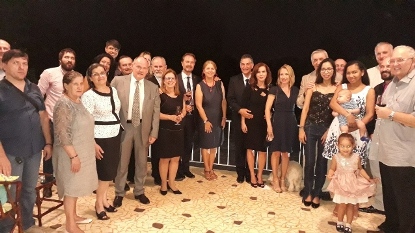 |
|
|
| Fórum de Investimentos em São Paulo, 10-11 de outubro de 2019 |
|
O Embaixador Veljko Lazic participou do Fórum de Investimentos em São Paulo nos dias 10-11 de outubro de 2019, organizado pela Agência Brasileira de Promoção de Exportações e Investimentos (APEX). O evento foi aberto pelo Presidente da República Jair Bolsonaro e o Presidente do Banco Interamericano de Desenvolvimento (BID) A. Moreno.
No fórum discutiram-se oportunidades de investimento em setores estratégicos da economia brasileira, incluindo agroindústria, defesa, energia, infraestrutura, inovação e tecnologia, por meio de painéis e mesas redondas. Esta foi uma oportunidade de se reunir com autoridades brasileiras, representantes de setores governamentais, bem como inúmeros investidores e representantes de empresas, com os quais discutiram-se oportunidades de cooperação econômica.
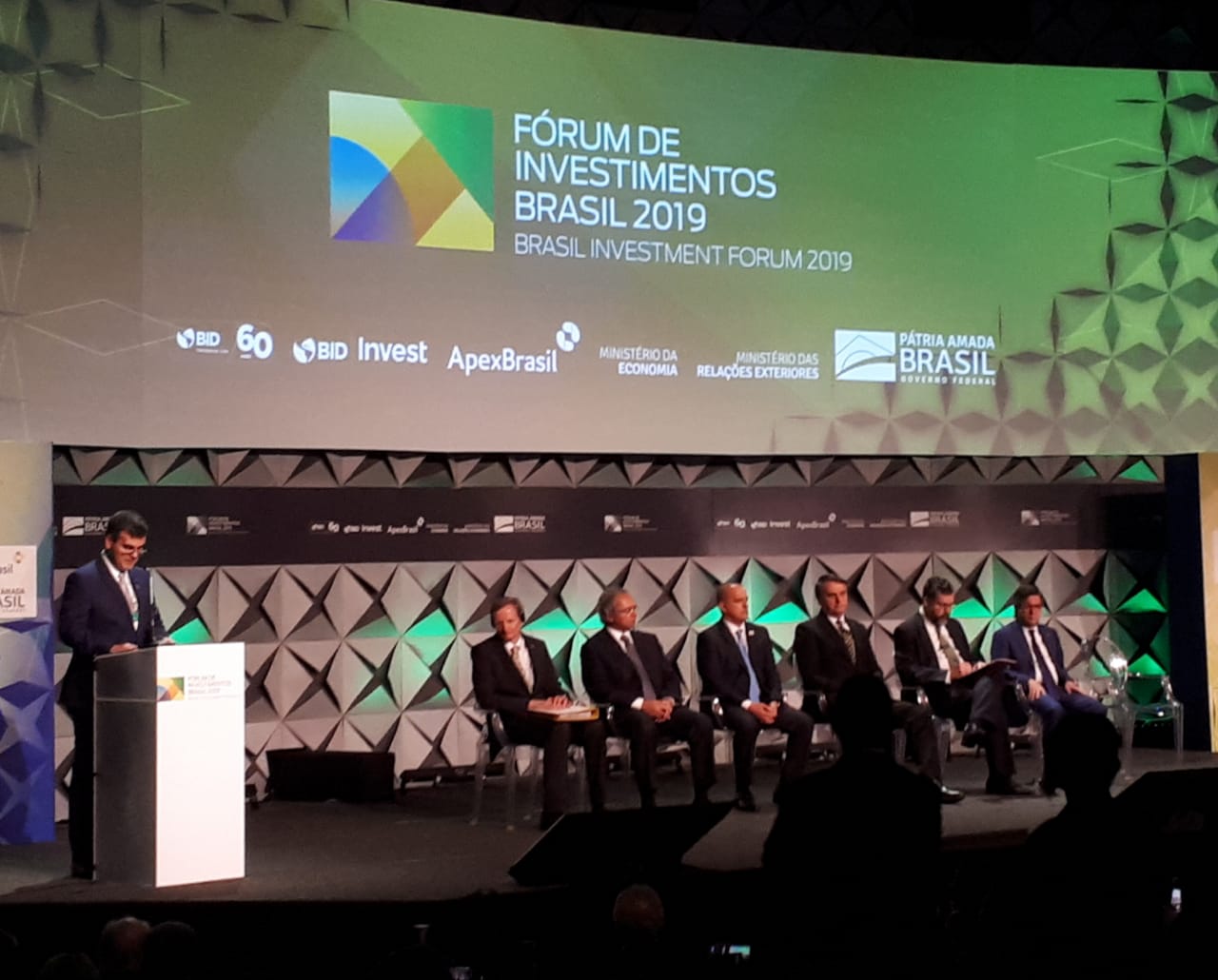 |
|
|
| Visita dos Representantes da Embaixada para a diáspora em Campinas - 22/09/2019. |
|
O Embaixador Veljko Lazic e a Primeira Secretária e Cônsul Jelena Blazevic visitaram a diáspora sérvia que vive em Campinas (São Paulo) e arredores no dia 22 de setembro de 2019. Nesta ocasião, reuniram-se cerca de 30 de nossos cidadãos, que aos aos representantes da Embaixada apresentaram as condições de vida no Brasil e apontaram as especificidades que têm de lidar quanto ao atendimento consular.
Durante a visita, foram colhidos registros e contatos pessoais com nossos cidadãos, o que contribuiu para uma melhor compreensão das condições em que a diáspora vive no Brasil / São Paulo.
Gostaríamos de expressar nossa especial gratidão à família Dragosavac por sua hospitalidade e árduo trabalho realizado com o propósito da realização desta visita.
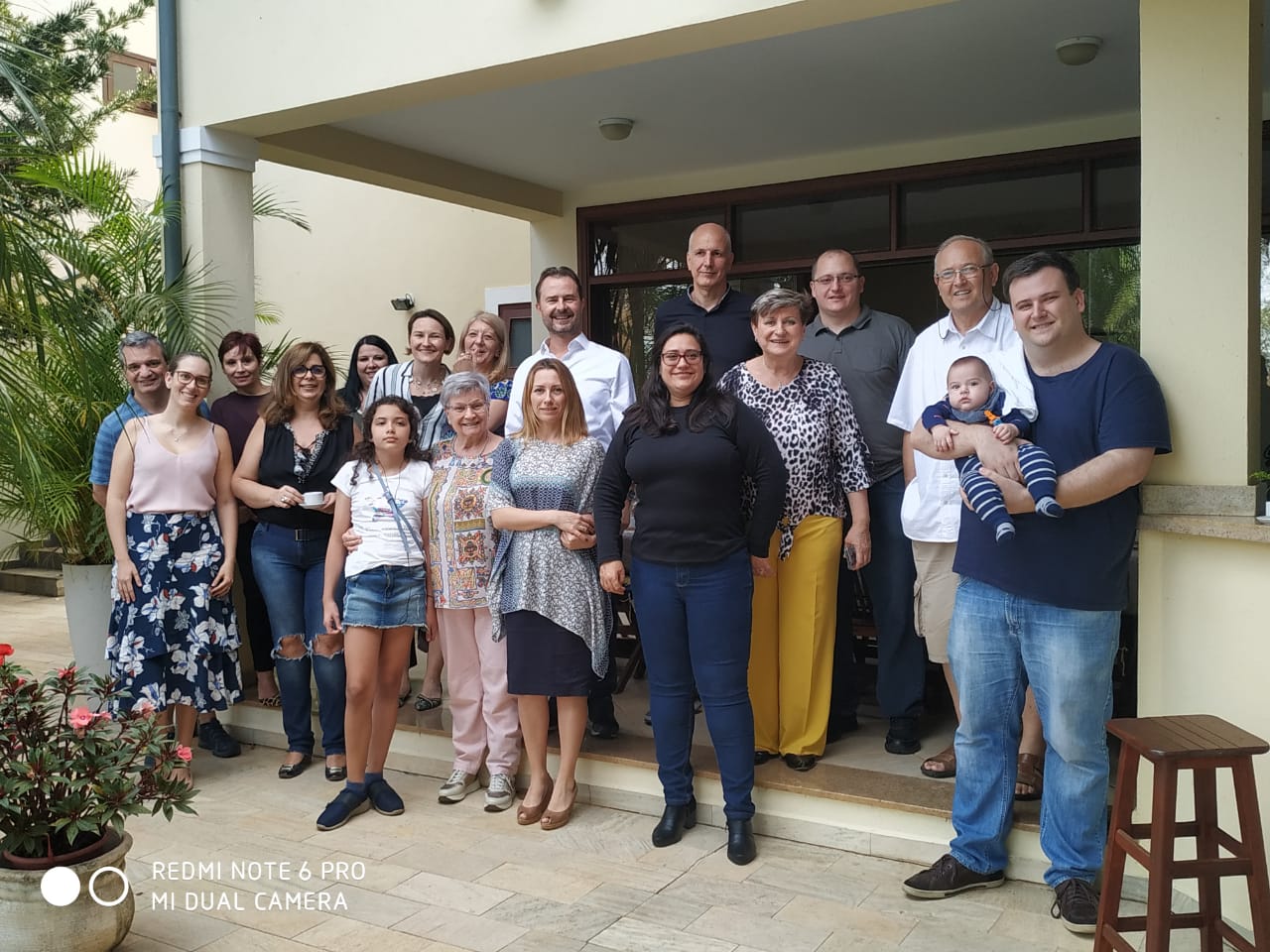 |
|
|
| Inauguração do Consulado Honorário da República da Sérvia no Rio de Janeiro, 11.09.2019. |
|
Em uma cerimônia comemorativa no dia 11 de setembro de 2019, foi inaugurado Consulado Honorário da República da Sérvia no Rio de Janeiro, onde Dejan Petkovic assumiu sua função como Cônsul Honorário.
Em seu discurso de boas-vindas, o embaixador da R. Sérvia no Brasil Veljko Lazic agradeceu a Dejan Petkovic por tudo que fez durante sua rica carreira no futebol e, principalmente, por promover a República da Sérvia no Brasil, sempre apresentando-a da melhor maneira possível, conquistando assim o título de Cônsul Honorário no Rio de Janeiro.
Dejan Petkovic agradeceu a República da Sérvia pelo título enfatizando que, assim como fez até agora, continuará a representar a Sérvia no país onde vive há 22 anos.
A cerimônia contou com a participação de cerca de 60 convidados, incluindo o chefe do Protocolo do MRE do Brasil no Rio de Janeiro, Embaixador Eduardo Ramos, representantes do Governo e da Secretaria de Cultura do Rio de Janeiro, o ex-Embaixador do Brasil em Belgrado Alexandre Addor, notáveis figuras dos meios artístico, cultural e da vida pública, bem como membros da comunidade sérvia no Rio e amigos de Dejan Petkovic.
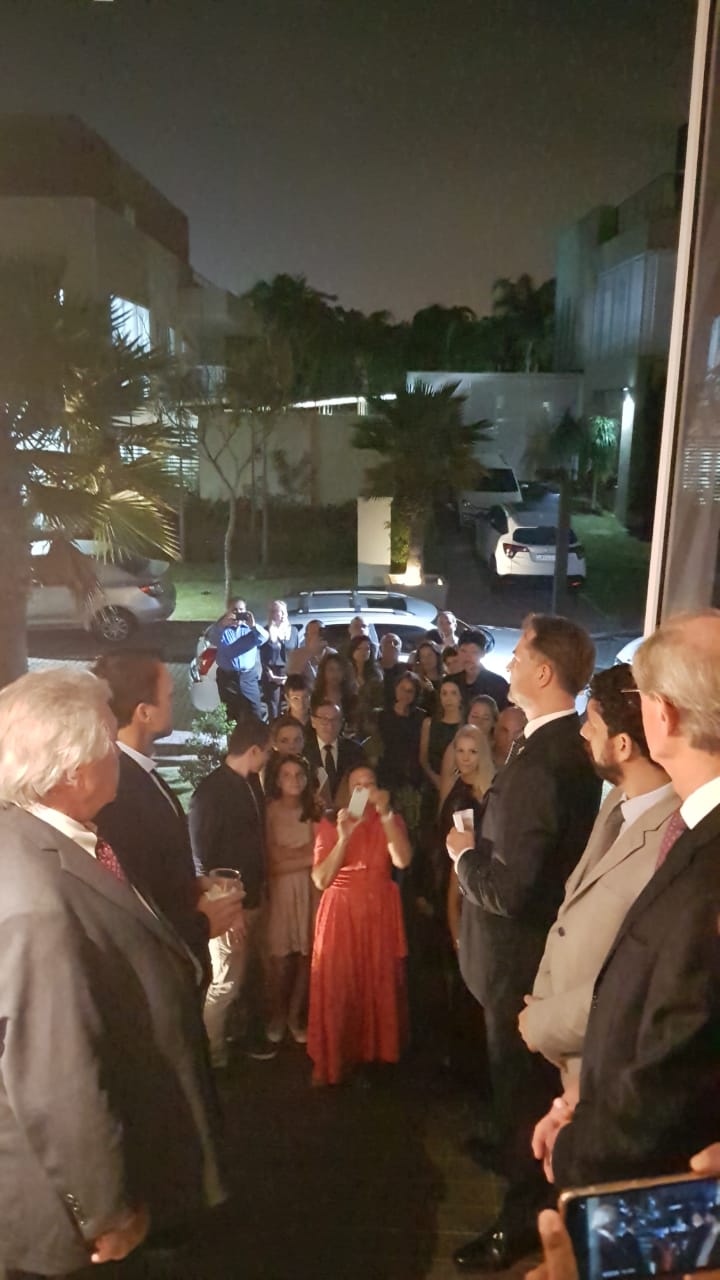
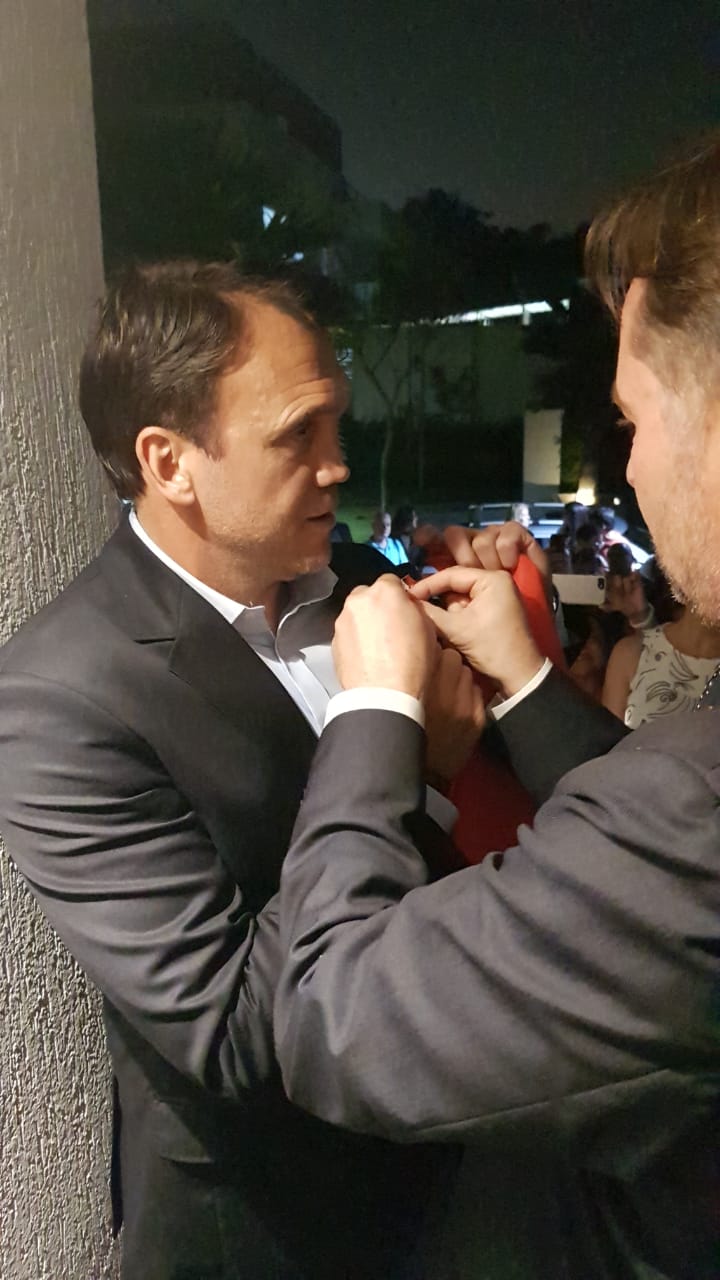 |
|
|
| Entrevista do embaixador Lazic para o „Bacuri Brasil“ sobre o caminho europeu da República da Sérvia, 24/08/2019. |
|
O embaixador Veljko Lazic concedeu uma entrevista ao portal político-econômico "Bacuri Brasil" sobre as atividades da República da Sérvia no caminho da plena adesão à UE. Durante a entrevista, o embaixador ressaltou que a adesão à UE é uma das principais prioridades da política externa da Sérvia, e informou brevemente sobre o processo de negociação. Nesta ocasião, foi destacado ainda a fase atual do diálogo Belgrado-Pristina, bem como foram nossas opiniões sobre o Kosovo e Metohija.
https://www.youtube.com/watch?v=ijjVTqI8x1c&feature=share
|
|
|
| O Embaixador Veljko Lazic se reúne com o Presidente da Comissão de Relações Exteriores e Defesa da Câmara dos Depurados do Congresso Nacional Brasileiro Eduardo Bolsonaro - 08.08.2019. |
|
Durante o encontro com Eduardo Bolsonaro, o embaixador Veljko Lazic informou seu interlocutor sobre a questão do Kosovo e avisou sobre a atual situação em nossa província do sul. Nesta ocasião, o embaixador Lazic agradeceu ao governo do Brasil por a posição de não reconhecer a unilateralmente declarada independência do "Kosovo". As conversações também destacaram as possibilidades de aprofundar a cooperação bilateral entre a Sérvia e o Brasil, especialmente em termos econômicos.
Presidente da Comissão dos Assuntos Externos e Defesa do Congresso Nacional do Brasil informou sobre as atividades na área da política externa do Brasil, principalmente em relação à situação na região da América Latina.
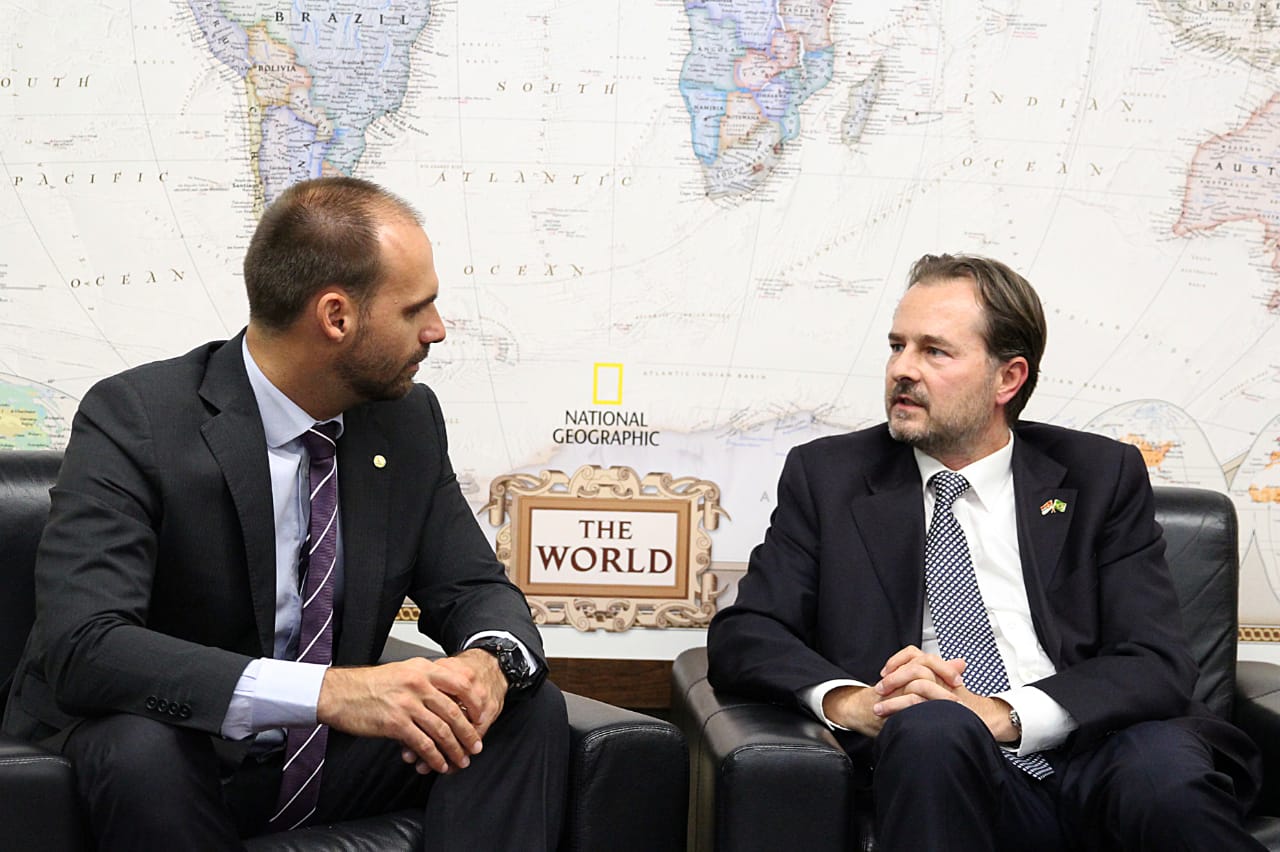 |
|
|
| 141. Assembleia da União Inter-Parlamentar em Belgrado, 13-17 de outubro de 2019 |
|
A 141ª Assembleia da União Inter-Parlamentar (UIP) está programada para ocorrer em Belgrado, de 13 a 17 de outubro de 2019, organizada pela Assembleia Nacional da República da Sérvia. Tendo em mente que esta reunião realiza-se no 130º aniversário da UIP, espera-se a participação de representantes de alto nível de parlamentos de mais de 100 países. O tema principal da reunião será o "Fortalecimento do Direito Internacional: o papel e os mecanismos dos parlamentos e a contribuição da cooperação regional". A cúpula será também uma oportunidade para a realização de numerosas reuniões bilaterais, com o objetivo de fortalecer a cooperação parlamentar. |
|
|
| Consultas políticas bilaterais com Equador, realizadas em Quito em 02.07.2019 |
|
As consultas políticas entre os Ministérios das Relações Exteriores da Sérvia e Equador foram realizadas em 2 de julho de 2019 em Quito. Do nosso lado as consultas foram chefiadas pelo Diretor Político do MRE, Embaixador Zoran Vujic, sendo que na delegação estava o embaixador Veljko Lazic, enquanto que pelo lado equatoriano, a reunião foi conduzida pelo subsecretário para a América do Norte e Europa, Embaixador Autgusto Saa Corriere, na presença da Sub-Secretária de Assuntos Multilaterais, Embaixadora Mireya Munoz Mera.
A reunião foi uma oportunidade para troca de pontos de vista sobre um amplo espectro de relações bilaterais com o objetivo de fortalecer a cooperação entre a Sérvia e Equador em vários campos, reforçar o diálogo político, seguida pela cooperação entre os dois países a nível multilateral, bem como sobre a situação atual nos Balcãs Ocidentais e América do Sul.
|
|
|
| Consultas políticas bilaterais com o Brasil, 17.06.2019 |
|
No Brasil, em 17 de junho de 2019, foram realizadas consultas políticas bilaterais entre os ministérios das Relações Exteriores da República de Sérvia e Brasil, que pelo lado sérvio foram lideradas pelo Diretor Político do Ministério das Relações Exteriores da República da República da Sérvia, Embaixador Zoran Vujic. A delegação brasileira foi liderada pelo Secretário de Negociações Bilaterais com Países do Oriente Médio, Europa e África, Sr. Kenneth Felix Haczynski da Nóbrega.
Durante as consultas confirmaram-se as relações tradicionalmente amigáveis entre os dois países e a troca de pontos de vista sobre questões de relações bilaterais, a cooperação entre os dois países a nível multilateral, bem como a situação atual no oeste dos Bálcãs e América do Sul.
As consultas foram avaliadas como muito bem-sucedidas e úteis para o intercâmbio de opiniões sobre temas de interesse mútuo, com o objetivo de intensificar a cooperação entre a Sérvia e o Brasil em diversos campos, bem como para fortalecer o diálogo político.
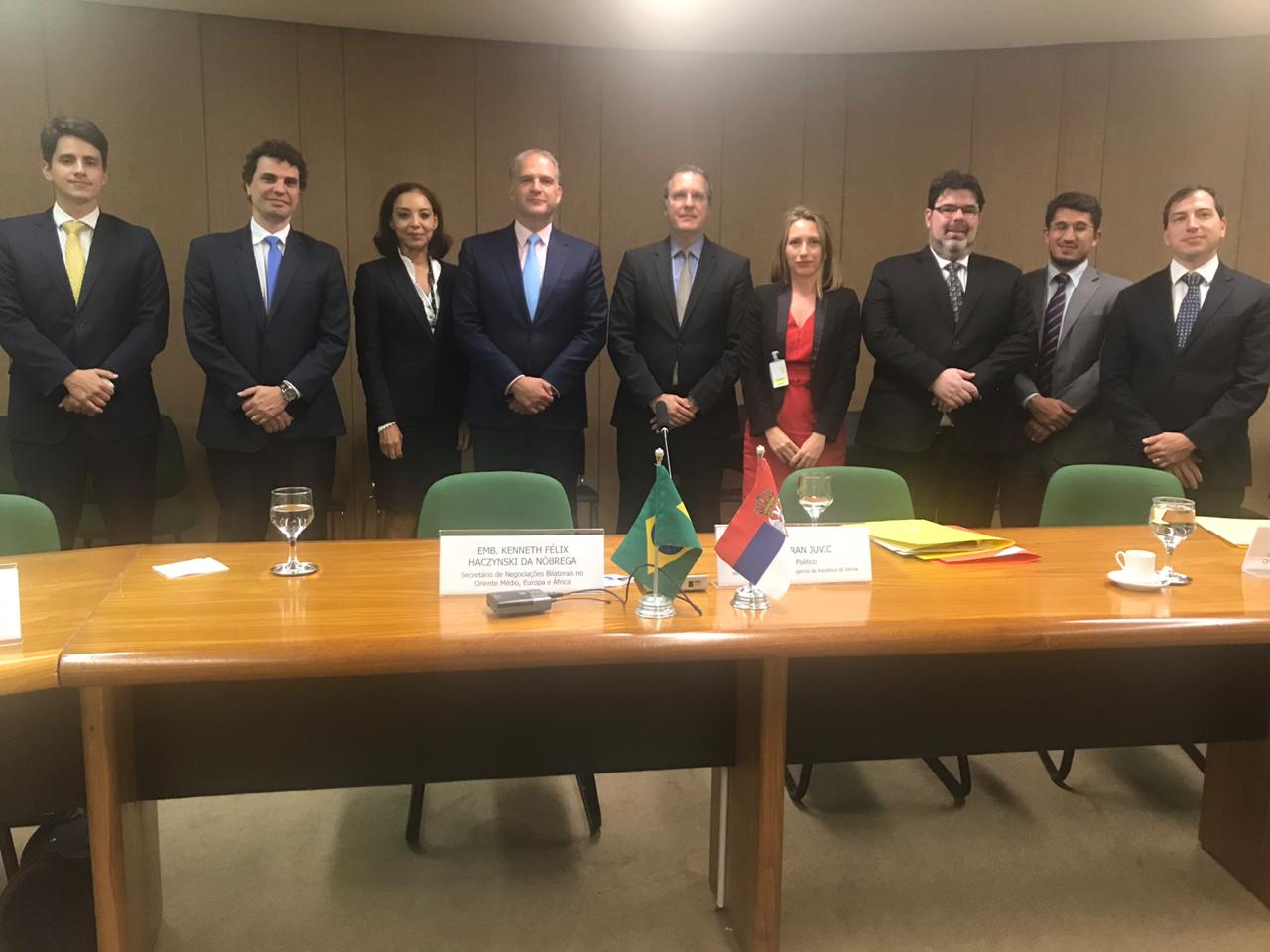
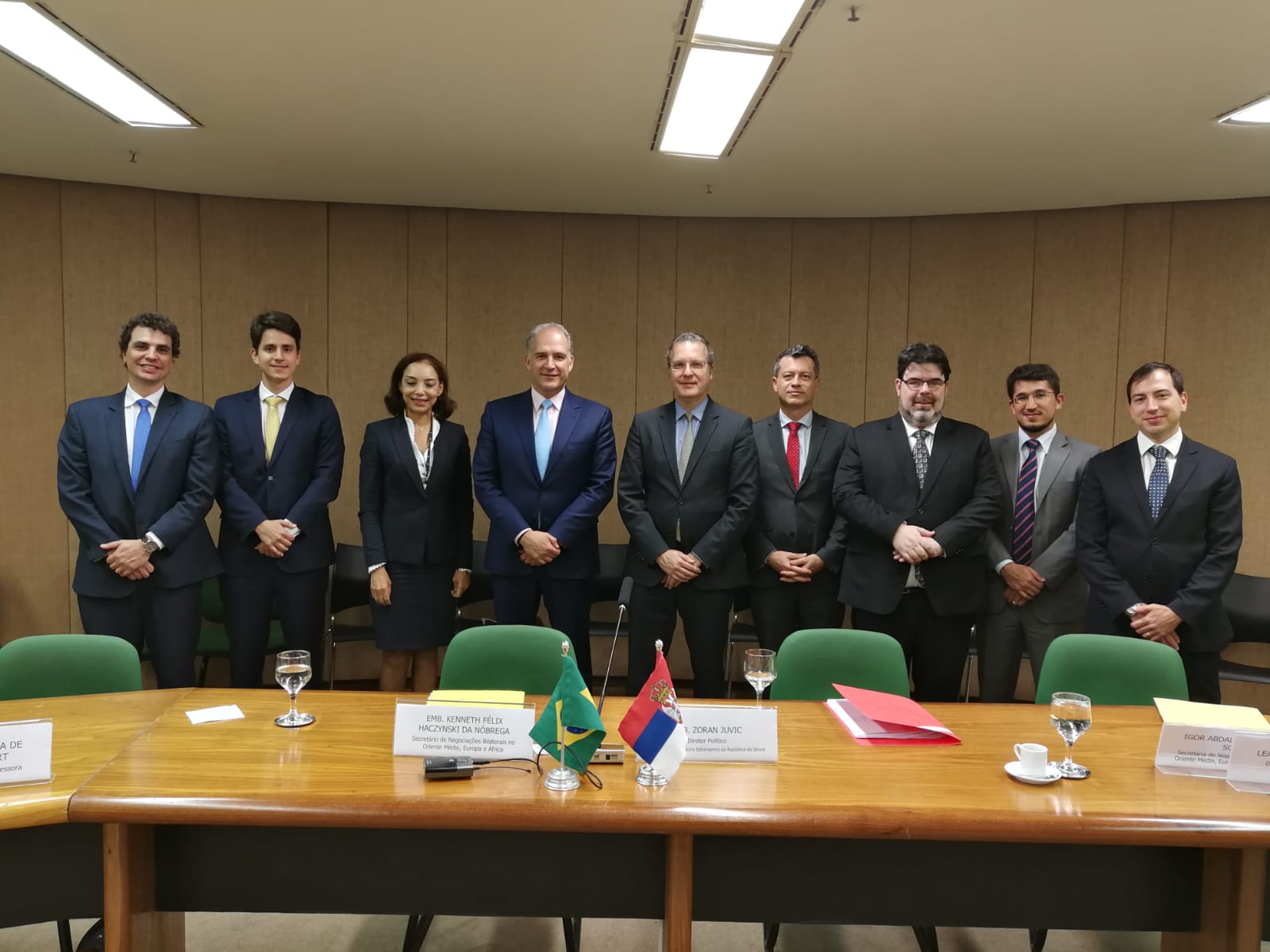 |
|
|
| Entrevista do Embaixador Veljko Lazić para o portal “BacuriBrasil“ |
|
Por ocasião da recente comemoração do Dia Nacional da República da Sérvia, o Embaixador Veljko Lazić deu uma entrevista para o portal político-econômico "BacuriBrasil", no qual, entre outras coisas, falou sobre os potenciais de cooperação econômica bilateral com o Brasil e ressaltou a expectativa de que no próximo período haja um aumento das trocas comerciais entre ambos os países.
Nesse contexto ele destacou, em particular, as vantagens da Sérvia, que assinou acordos de livre comércio com vários países e blocos econômicos, o que possibilita aos possíveis investidores acessar um mercado de mais de um bilhão de consumidores.
Link da entrevista
https://bacuribrasil.com.br/?p=1996
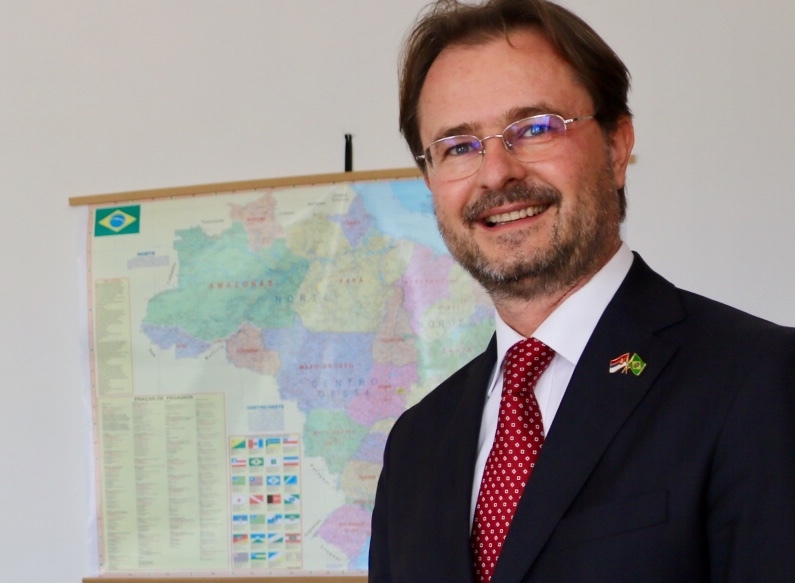 |
|
|
| Apresentação dos potenciais turísticos da Sérvia em Brasília, 12 de março de 2019 |
|
Nas dependências da Residência do Embaixador da República da Sérvia no Brasil, Sr. V.Lazić, no dia 12 de março de 2019 realizou-se uma apresentação dos potenciais turísticos da Sérvia, juntamente com uma degustação de especialidades da gastronomia local para os mais influentes veículos de imprensa brasileiros. A apresentação contou com a participação de numerosos representantes da mídia, bem como da Secretaria de Relações Internacionais e da Secretaria de Cultura do Governo do Distrito Federal, e membros da diáspora sérvia que vivem em Brasília.
O embaixador V.Lazic dirigiu-se aos presentes expondo os potenciais turísticos da Sérvia, sendo que a esposa do embaixador apresentou as nossas especialidades tradicionais culinárias, enquanto que toda a equipe da Embaixada mostrou de mais perto a Sérvia aos participantes numa conversa franca durante o jantar. Através de um link foi apresentado um vídeo do Tiago Ferreira, brasileiro que vive em Belgrado há sete anos e está engajado na promoção turística da Sérvia.
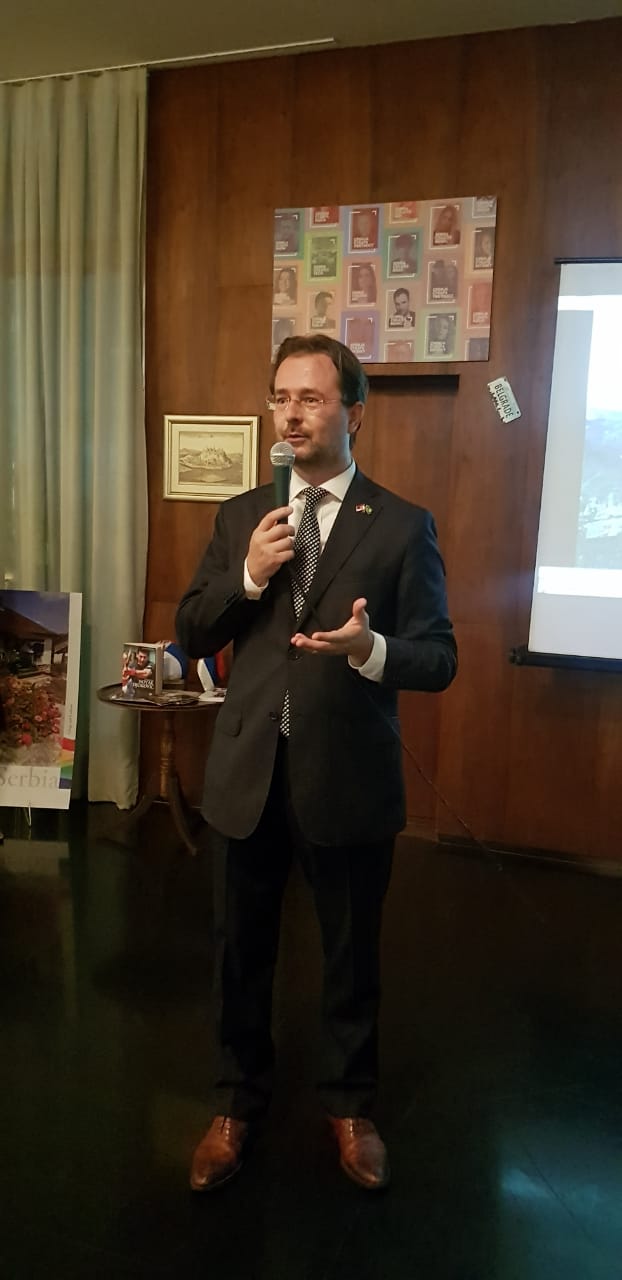
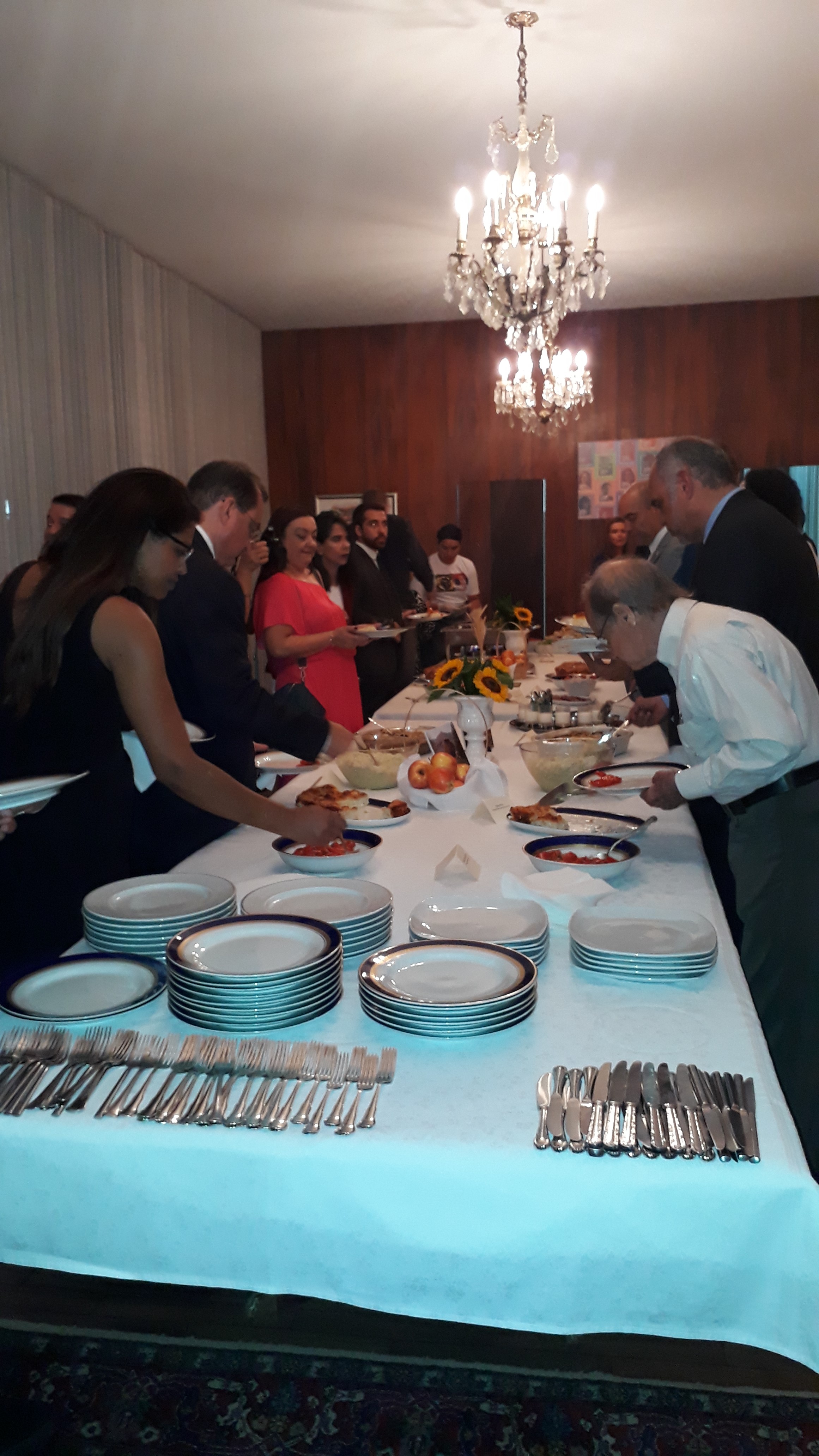 |
|
|
| Encontro do Embaixador Lazić com o Presidente do Senado do Brasil, de Davi Alcolumbre, 21 de fevereiro de 2019 |
|
O Embaixador da República da Sérvia no Brasil Veljko Lazic reuniu-se com o Presidente do Senado do Brasil no dia 21 de fevereiro. Durante a reunião, o Embaixador Lazic parabenizou o Sr. Davi Alcolumbre pela sua eleição para Presidente do Senado. Ressaltou-se na conversa as relações tradicionalmente boas entre Sérvia e Brasil, caracterizadas pelos laços de amizade entre os dois povos. Ambas as partes expressaram disposição para melhorar a cooperação parlamentar e qualquer outra forma de cooperação, especialmente na área comercial e econômica.
O Embaixador Lazić destacou, entre outras coisas, as perspectivas de investimento na Sérvia no sentido de eventual desempenho conjunto da Sérvia e Brasil em terceiros mercados.
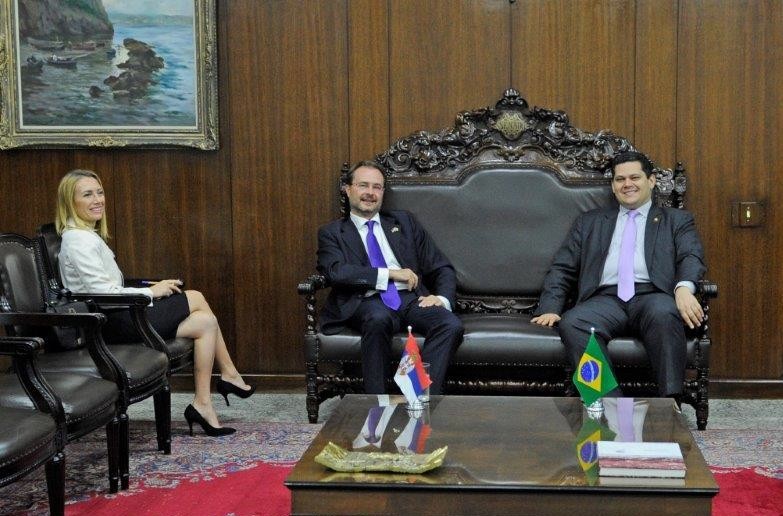
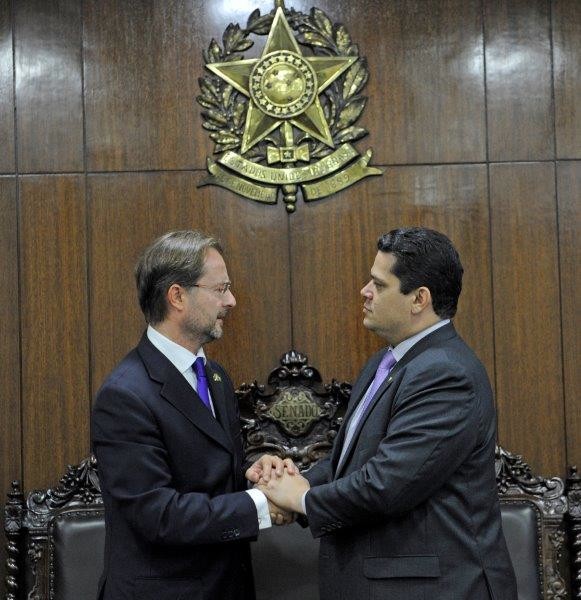 |
|
|
| Encontro do Embaixador Lazic com o Vice-Presidente do Brasil Hamilton Mourão, 20 de fevereiro de 2019 |
|
O Embaixador da República da Sérvia no Brasil reuniu-se no dia 20 de fevereiro com o Vice-Presidente do Brasil Hamilton Mourão. Durante a conversa expressou-se o desejo mútuo de continuar o diálogo político no mais alto nível, bem como de fortalecer a cooperação entre a Sérvia e o Brasil em todas as áreas de interesse mútuo, especialmente no plano econômico.
O Embaixador Lazić informou ao Vice-Presidente do Brasil sobre a atual fase do diálogo entre Belgrado e Pristina, bem como nossas ações em relação a Kosovo e Metohija, agradecendo ao Brasil por seu apoio à integridade territorial e soberania da República da Sérvia.
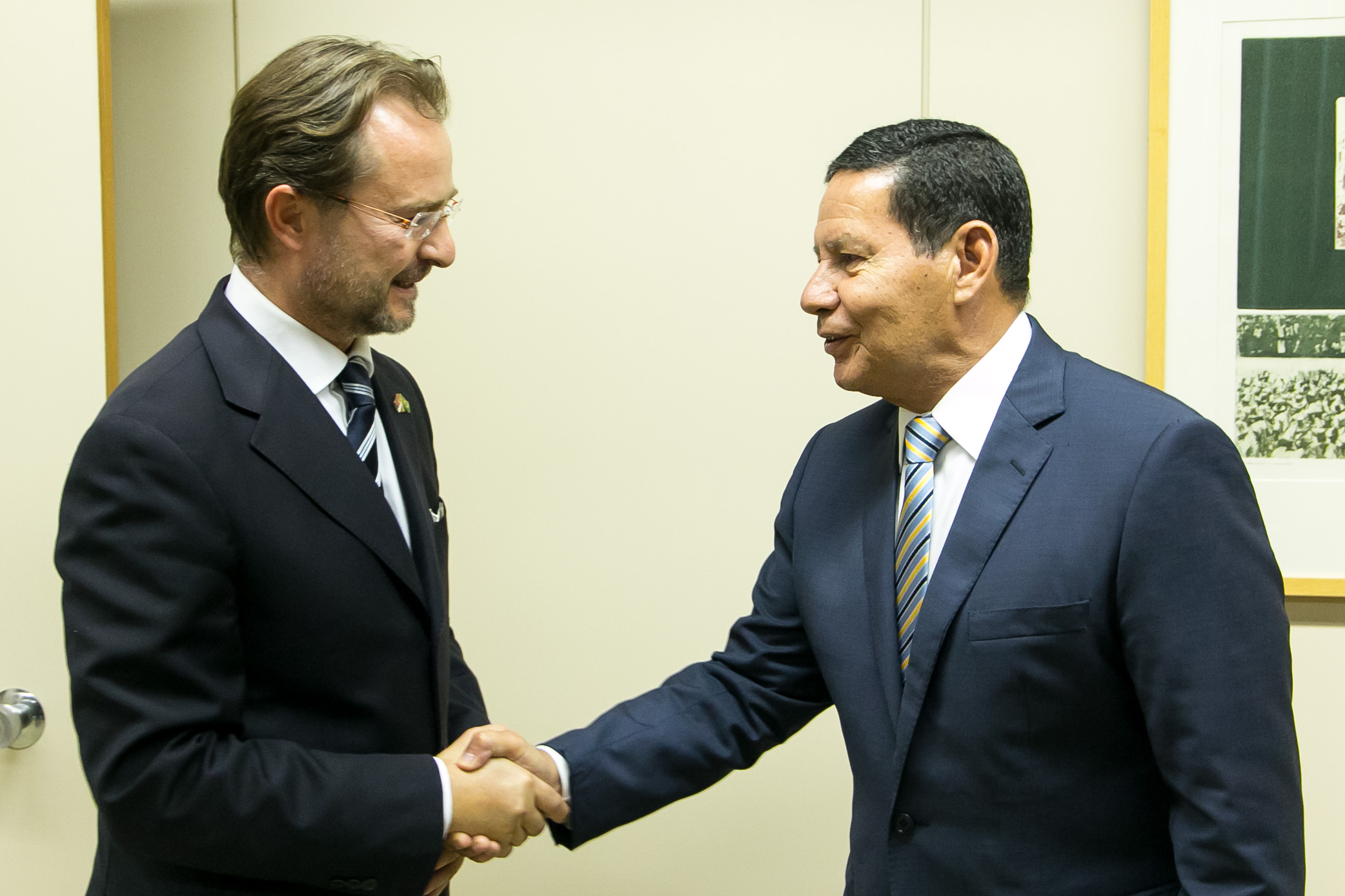
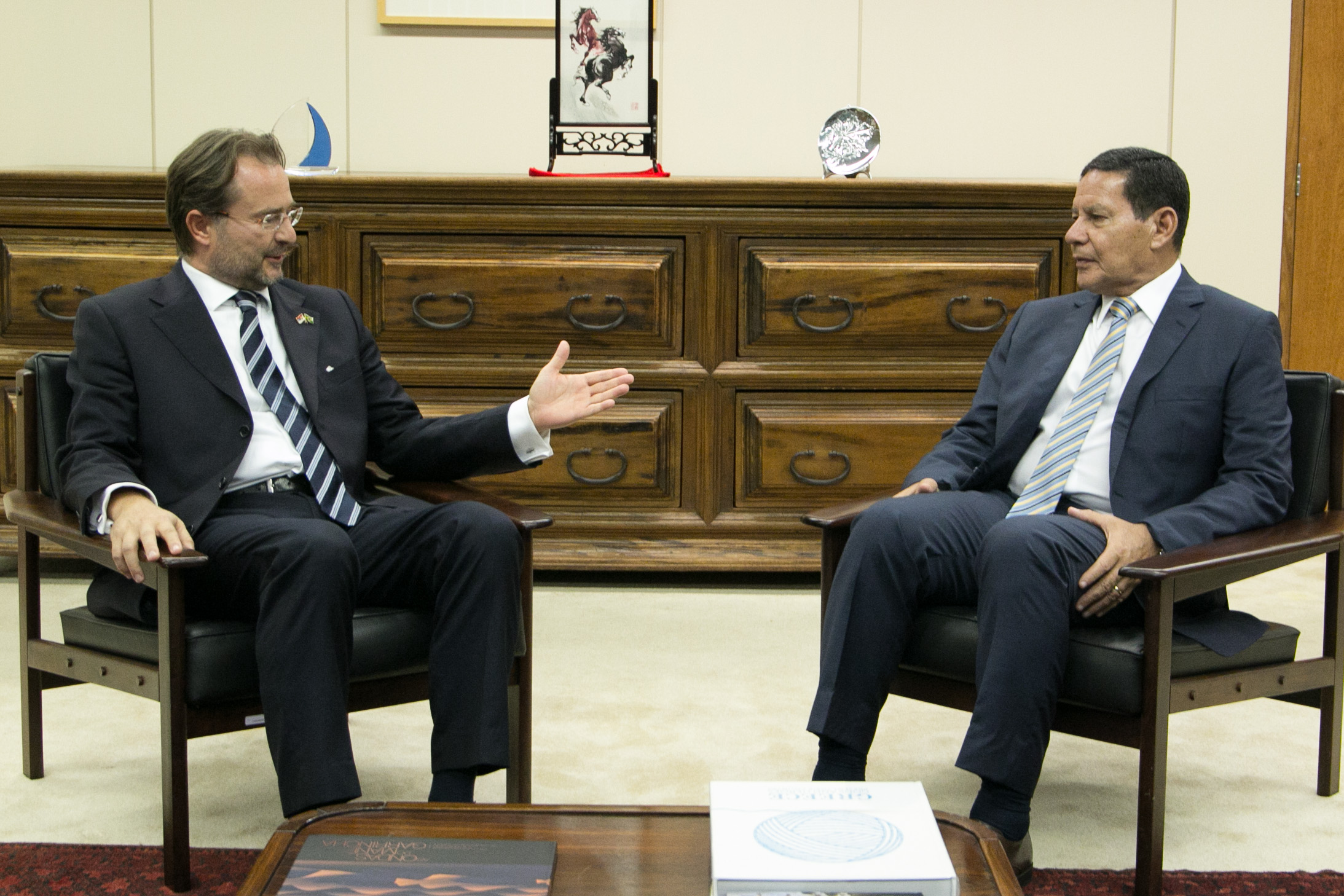 |
|
|
| Condolências sobre o rompimento da barragem em Brumadinho, Minas Gerais |
|
A Embaixada da República da Sérvia em Brasília expressa suas mais profundas condolências ao Governo do Brasil e, em particular, às famílias das vítimas e desaparecidos no trágico acidente do rompimento da barragem em Brumadinho.
Neste momento extremamente difícil, os membros da Embaixada da República da Sérvia compartilham da dor e tristeza com aqueles que ficaram sem seus entes queridos. Além disso, expressa-se grande pesar pelos efeitos devastadores causados ao meio ambiente.
Os telegramas de condolências e solidariedade às mais altas autoridades brasileiras e ao povo brasileiro amigo foram enviados pelas mais altas autoridades da República da Sérvia.
A Embaixada da Sérvia, em homenagem a todas as vítimas deste incidente, colocou sua bandeira a meio mastro.
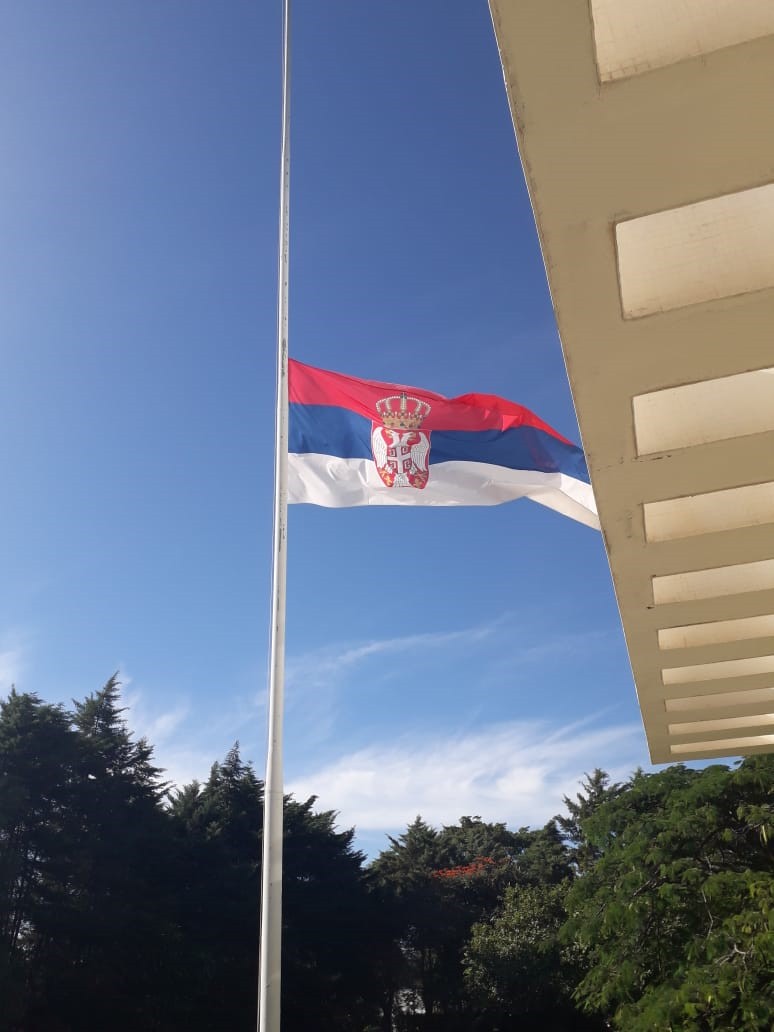 |
|
|
| Decisão sobre isenção de vistos para entrada na República da Sérvia aos cidadãos da Federação de São Cristovão e Nevis e da República de Palau para titulares de todos os passaportes |
|
Informamos que o Governo da República da Sérvia, em sessão realizada no dia 18 de janeiro de 2019, adotou a decisão sobre a abolição de vistos aos cidadãos da Federação de São Cristovão e Nevis e da República de Palau para titulares de todos os passaportes, segundo a qual tais cidadãos podem entrar, transitar e permanecer no território da República da Sérvia por até 90 (noventa) dias, a contar da data de entrada na R. Sérvia por um período de 180 dias, se não houver obstruções ao artigo 15 da Lei sobre estrangeiros.
A decisão entra em vigor em 25 de janeiro de 2019. |
|
|
| Ministro Dačić na posse do Presidente do Brasil Jair Bolsonaro, Brasília, 01.01.2019 |
|
O Primeiro Vice Primeiro Ministro de Governo e Ministro das Relações Exteriores Ivica Dačić, compareceu no dia 1 de janeiro de 2019 em Brasília na cerimônia de posse do Presidente do Brasil, Jair Bolsonaro.
Na ocasião, o Ministro Dačić conversou com o Presidente Bolsonaro sobre as relações bilaterais entre os dois países e o seu fortalecimento.
À margem da posse, o Ministro Dačić teve uma série de reuniões com convidados internacionais de alto nível que compareceram à cerimônia: Presidente da Bolívia Evo Morales, Presidente de Cabo Verde Ulisses Silva, Primeiro-Ministro de Israel Benjamin Netanyahu, Primeiro-Ministro da Hungria Viktor Orban, Primeiro-Ministro de Marrocos Saadeddine Othmani, Presidente da Duma da Rússia Vyacheslav Volodin, Secretário de Estado dos EUA Mike Pompeo, bem como com os Ministros das Relações Exteriores da Argentina Jorge Faurie, Angola Manuel Augusto, Peru Néstor Popolizio Bardales, Suriname Yldiz Pollack-Beighle, Polônia Jacek Czaputowicz, Equador José Valencia Amores, Guiné Mamadi Touré, Chile Roberto Ampuero Espinoza, Paraguai Luis Castiglioni, São Tomé Príncipe e E. Pinto, Guiana Carl Greenidge.
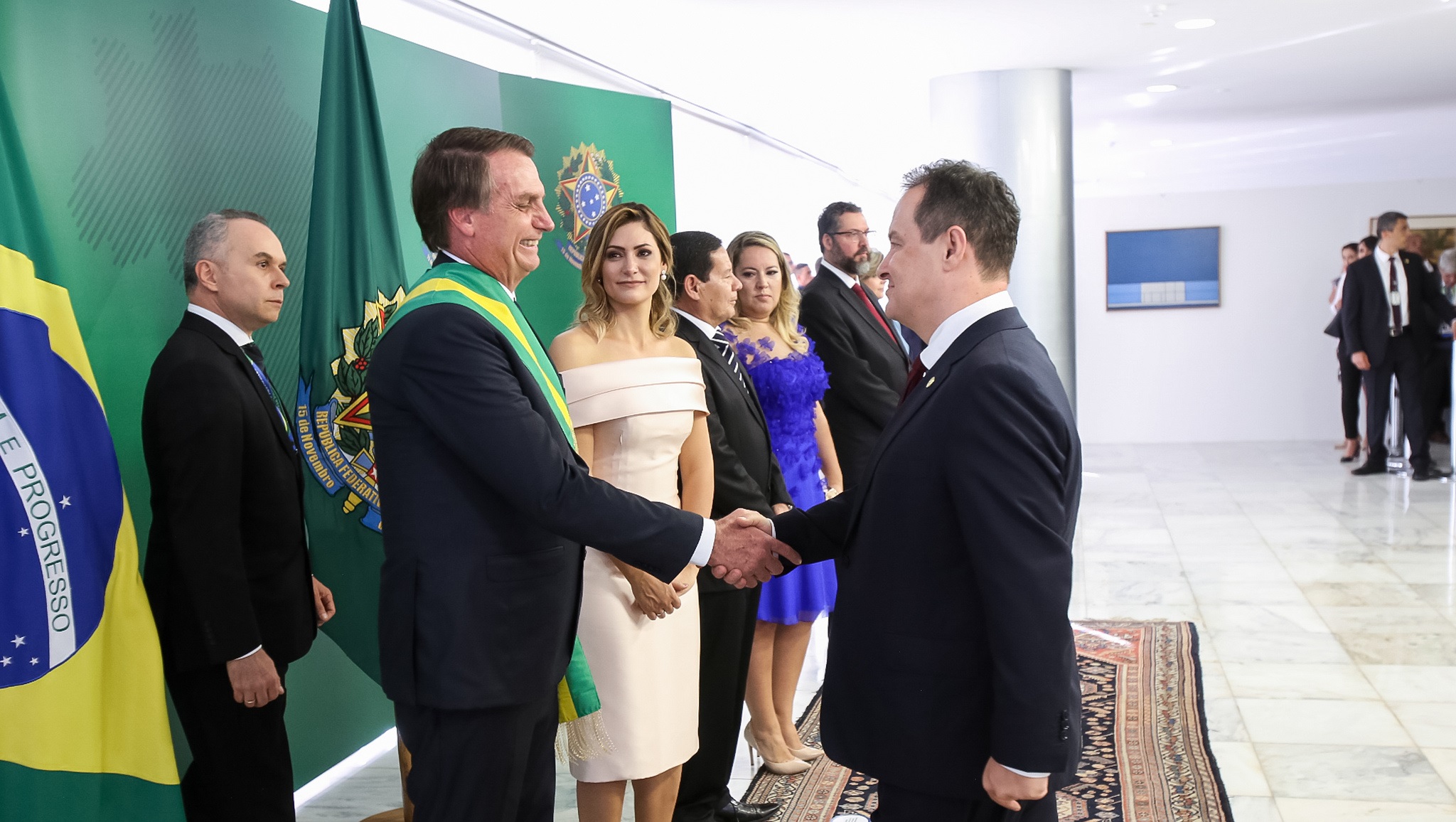 |
|
|
| Encontro do Primeiro Vice Primeiro Ministro e MRE Ivica Dačić com o MRE do Brasil, Ernesto Araújo, Brasília, 01.01.2019 |
|
O Primeiro Vice Primeiro Ministro de Governo e Ministro das Relações Exteriores Ivica Dačić, reuniu-se em 1 de janeiro de 2019 em Brasília com o novo Ministro das Relações Exteriores do Brasil, Ernesto Araújo, que tinha acabado de assumir o cargo.
O Ministro Dačić desejou muito sucesso ao Ministro Araújo no desempenho de suas novas funções.
Durante a reunião, foi destacada a importância das relações tradicionalmente amistosas entre os dois países e foram consideradas as possibilidades de fortalecimento da cooperação bilateral, especialmente no plano econômico.
O Ministro Dačić informou ao seu colega brasileiro Araújo sobre nossas posições com relação ao Kosovo e Metohija e a atual fase do diálogo entre Belgrado e Pristina, agradecendo ao Brasil por seu apoio à integridade territorial e à soberania da República da Sérvia.
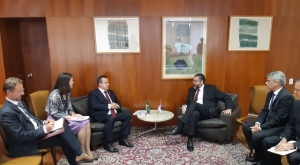 |
|
|
| Almoço de trabalho dos Embaixadores dos Estados Membros da UE e dos países Candidatos com o futuro Ministro das Relações Exteriores do Brasil, Ernesto Araújo, 12 de dezembro de 2018 |
|
Na Residência do Chefe da Delegação da União Europeia no Brasil, realizou-se em 12 de dezembro de 2018 um almoço de trabalho dos embaixadores dos Estados Membros da UE e de países candidatos com o futuro Ministro das Relações Exteriores do Brasil do Brasil, Embaixador Ernesto Araújo.
Durante a reunião, foram apresentadas as diretrizes básicas para as futuras prioridades da política externa do Brasil, e os embaixadores presentes interessaram-se por questões específicas no campo do interesse mútuo.
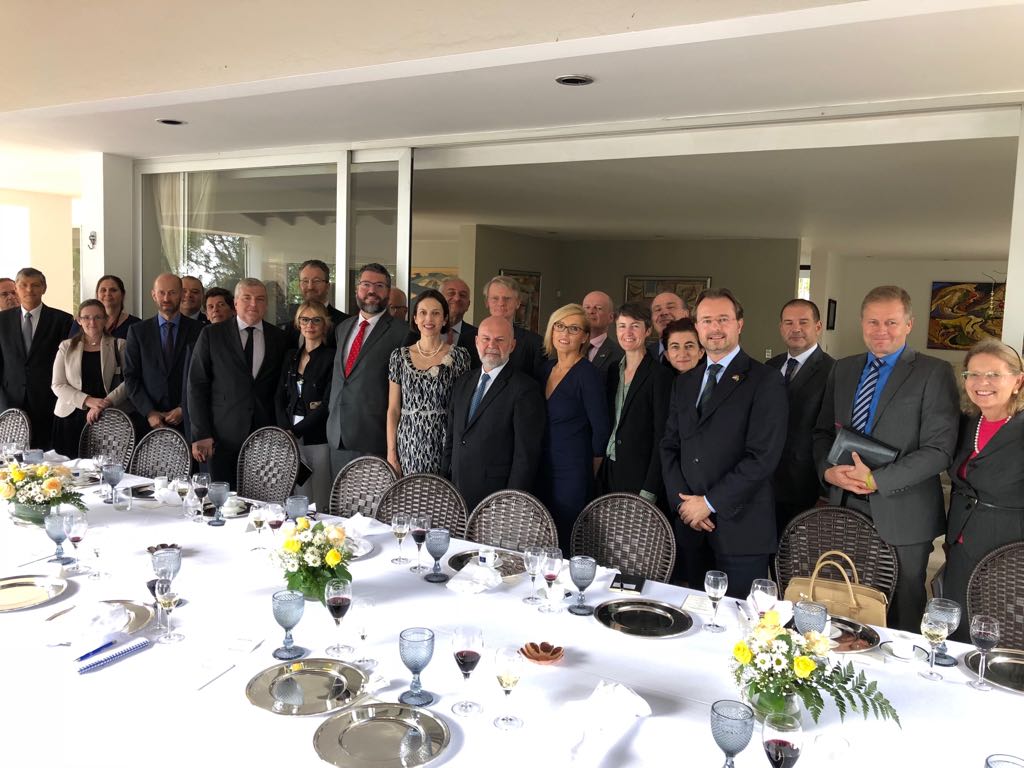 |
|
|
| Assinatura do Acordo sobre o exercício de atividades remuneradas por parte de dependentes do pessoal diplomático, consular, militar, administrativo e técnico de representações diplomáticas e consulares entre a R.Sérvia e Brasil, 13 de dezembro de 2018. |
|
O Ministro das Relações Exteriores do Brasil, Aloysio Nunes Ferreira e o Embaixador da Sérvia no Brasil, Veljko Lazic, assinaram o Acordo sobre o exercício de atividades remuneradas por parte de dependentes do pessoal diplomático, consular, militar, administrativo e técnico de representações diplomáticas e consulares entre a Sérvia e Brasil no dia 13 de dezembro de 2018. A assinatura do acordo, no ano em que se completam 80 anos de relações diplomáticas entre os dois países, confirma mais uma vez as boas e amistosas relações de dois países geograficamente distantes, mas muito próximos.
Em uma conversa antes da cerimônia de assinatura, nas instalações do Gabinete do MRE do Brasil, o Embaixador Veljko Lazic informou resumidamente ao Ministro Aloysio Nunes Ferreira sobre assuntos atuais na República da Sérvia е sobre alguns aspectos das relações bilaterais. O Ministro Aloysio Nunes expressou sua satisfação com a assinatura do referido Acordo e manifestou a expectativa de que a cooperação entre a Sérvia e o Brasil se estreitará no futuro.
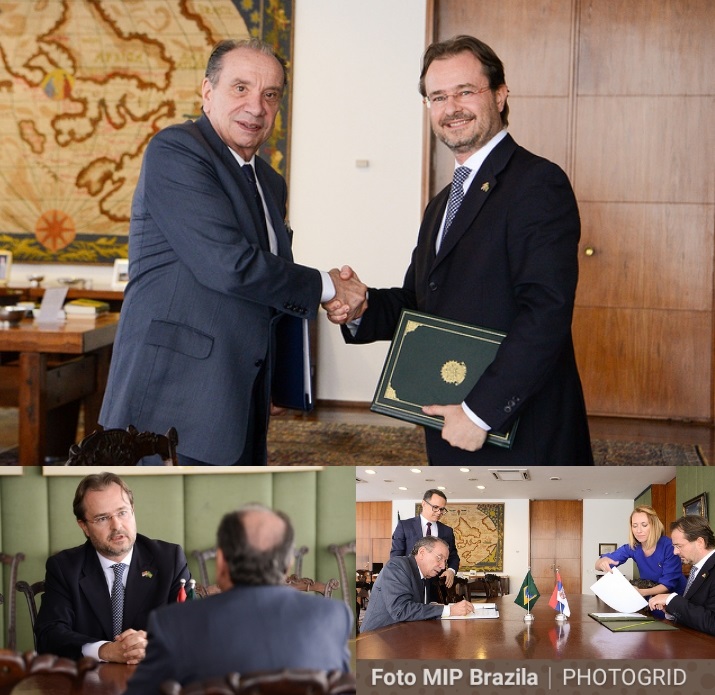 |
|
|
| Premiação do embaixador V. Lazić com a Medalha "Parceiros da Escola" - 26.11.2018, Distrito Federal |
|
O governador do Distrito Federal (DF), Rodrigo Rolemberg, no dia 26 de novembro dester ano no estádio "Mane Garrincha" em Brasília, outorgou medalhas meritórias ao fortalecimento e melhoraria das condições nas escolas públicas do DF. Entre os 208 agraciados estavam 49 representantes de embaixadas credenciadas em Brasília, que participaram do programa "Embaixadas de Portas Abertas". O embaixador Veljko Lazić foi premiado com a medalha "Parceiros da Escola", pela contribuição que toda a Embaixada da R. Sérvia em Brasília deu este ano, a fim de melhorar a educação e o trabalho das escolas públicas do Distrito Federal.
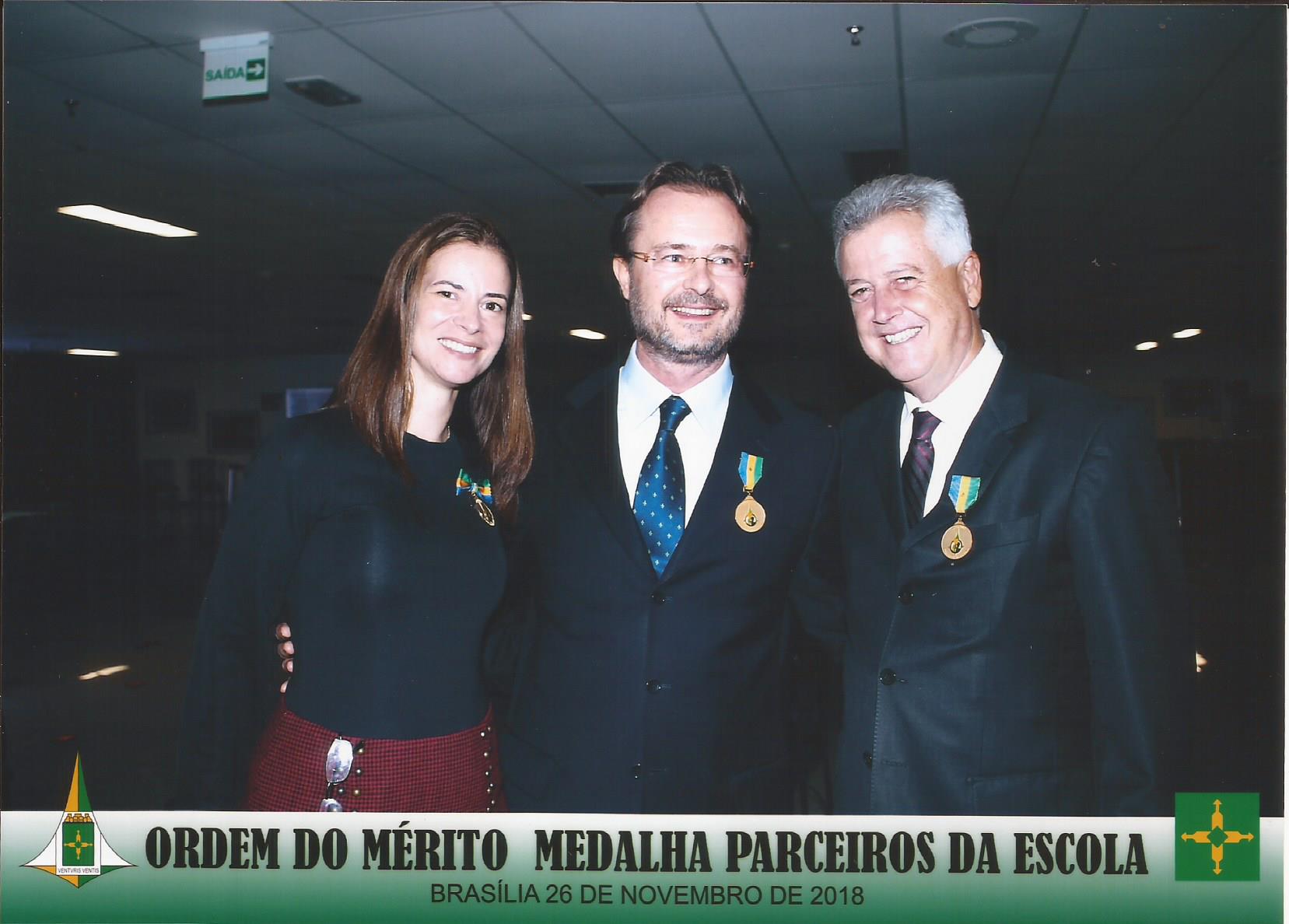 |
|
|
| Entrevista do embaixador Veljko Lazic para a Rádio Senado, por ocasião do centenário pelo fim da Primeira Guerra Mundial |
|
Por ocasião do centenário pelo fim da Primeira Guerra Mundial, o embaixador Veljko Lazic concedeu uma entrevista para a Rádio Senado como parte do programa "A Guerra que Mudou o Mundo". A transmissão foi emitida em três blocos nos dias 12, 13 e 14 de novembro deste ano, e durante o final de semana (17 e 18) na versão integral, por 23 estações nacionais em 13 estados. O embaixador falou sobre o contexto histórico antes da Primeira Guerra Mundial, os fatos relacionados ao início da guerra (atentado, ultimato), causas e motivações reais, nossas enormes perdas durante a Grande Guerra e as circunstâncias em torno da formação do Reino dos Sérvios, Croatas e Eslovenos.
https://www12.senado.leg.br/radio/1/reportagem-especial/a-guerra-que-mudou-o-mundo
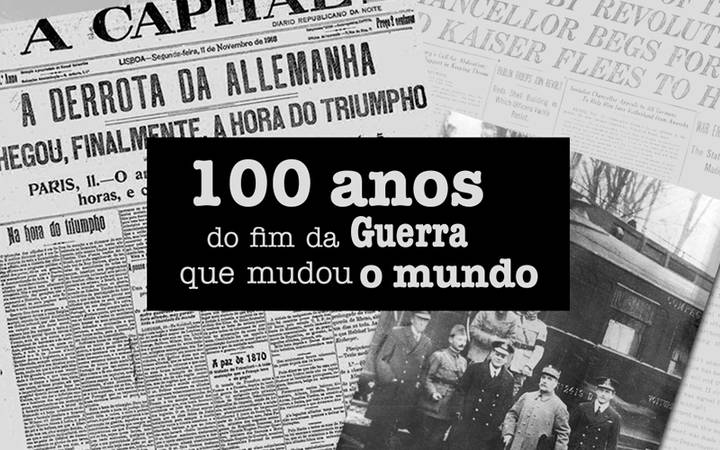 |
|
|
| Feira das Embaixadas em Brasília, 10 de novembro de 2018. |
|
A Embaixada da República da Sérvia em Brasília participou no dia 10 de novembro de 2018 da 13ª Feira das Embaixadas em Brasília, ocorrida no pavilhão de exposições do Parque da Cidade. Mais de 85 embaixadas de países credenciados no Brasil participaram da arrecadação de fundos para fins humanitários.
A feira contou com a participação de mais de 20.000 pessoas, que puderam conhecer, através do nosso stand, a gastronomia local, fotografar em nossos trajes folclóricos, descobrir mais sobre o relaxamento natural e atrações turísticas de nosso país, bem como conhecer nosso alfabeto e levar os "chinelos" com símbolos tradicionais dos tapetes piróticos e muito mais.
Embaixada é particularmente grata aos nossos cidadãos que vivem em Brasília, Vanja Grujić e Stefan Trifunović, pelo grande auxílio durante na preparação e realização do evento. Agradecemos também à família Muškatirovic, que ajudou na realização de nossa participação.
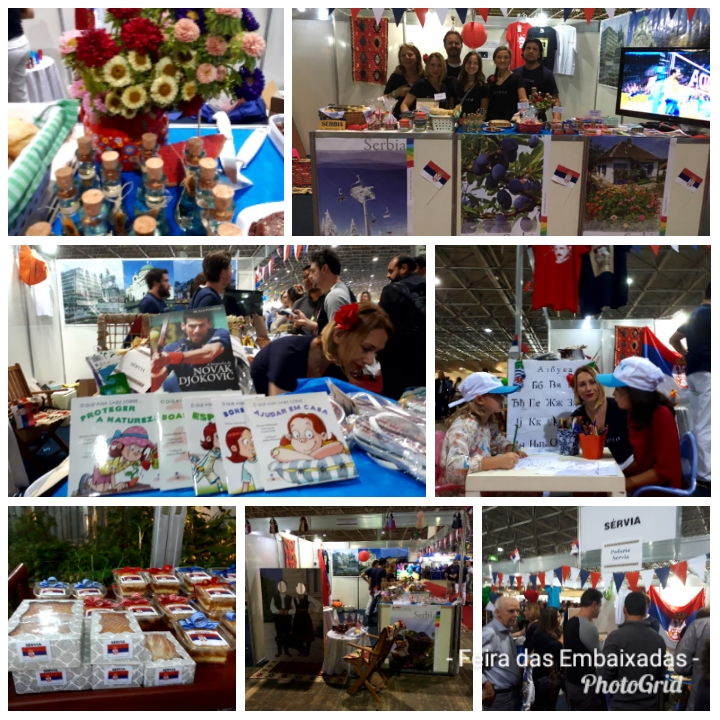 |
|
|
| Decisão sobre isenção de vistos para entrada na República da Sérvia aos cidadãos de Antígua e Barbuda, Granada, Dominica e Trinidad e Tobago, para portadores de todos os passaportes |
|
Informamos que o Governo da República da Sérvia, na sessão realizada no dia 25 de outubro de 2018, adotou a decisão sobre a isenção de vistos aos cidadãos de Antígua e Barbuda, Granada, Dominica e Trinidad e Tobago, para portadores de todos os passaportes, onde os mesmos podem entrar, transitar e permanecer no território da República da Sérvia por até noventa (90) dias a partir da data de entrada na República da Sérvia, em um período de até cento e oitenta (180) dias, não havendo obstáculos ao artigo 15 da Lei sobre os estrangeiros.
Os cidadãos dos países mencionados, portadores de todos os passaportes, que pretendam entrar e permanecer no território da República da Sérvia por um período maior que 90 dias, ou para irem à escola, residirem, empregarem-se, envolverem-se em atividades de mídia ou outras atividades, são obrigados a solicitarem o pedido de visto antes da entrada no território da República da Sérvia.
Para os cidadãos de Antígua e Barbuda, Granada e Dominica, tal decisão entrou em vigor em 26 de outubro de 2018, enquanto que aos cidadãos de Trinidad e Tobago, a decisão entrou em vigor em 03 de novembro de 2018. |
|
|
| Encontro do Embaixador Veljko Lazic com o Prefeito de Gramado, Sr. João Alfredo Bertolucci, 19 de outubro de 2018 |
|
Durante sua estadia no Rio Grande do Sul, o Embaixador Veljko Lazic reuniu-se com o Prefeito de Gramado, Sr. João Alfredo Bertolucci, no dia 19 de outubro de 2018.
Durante a reunião de cortesia, entre outros assuntos, foram consideradas as possibilidades de variadas formas de cooperação entre Gramado e certas cidades da Sérvia. O foco principal foi a cooperação nas áreas da cultura, arte e turismo, tendo em vista que Gramado é um dos destinos turísticos mais famosos do Brasil, onde vários eventos culturais e artísticos internacionais são tradicionalmente organizados.
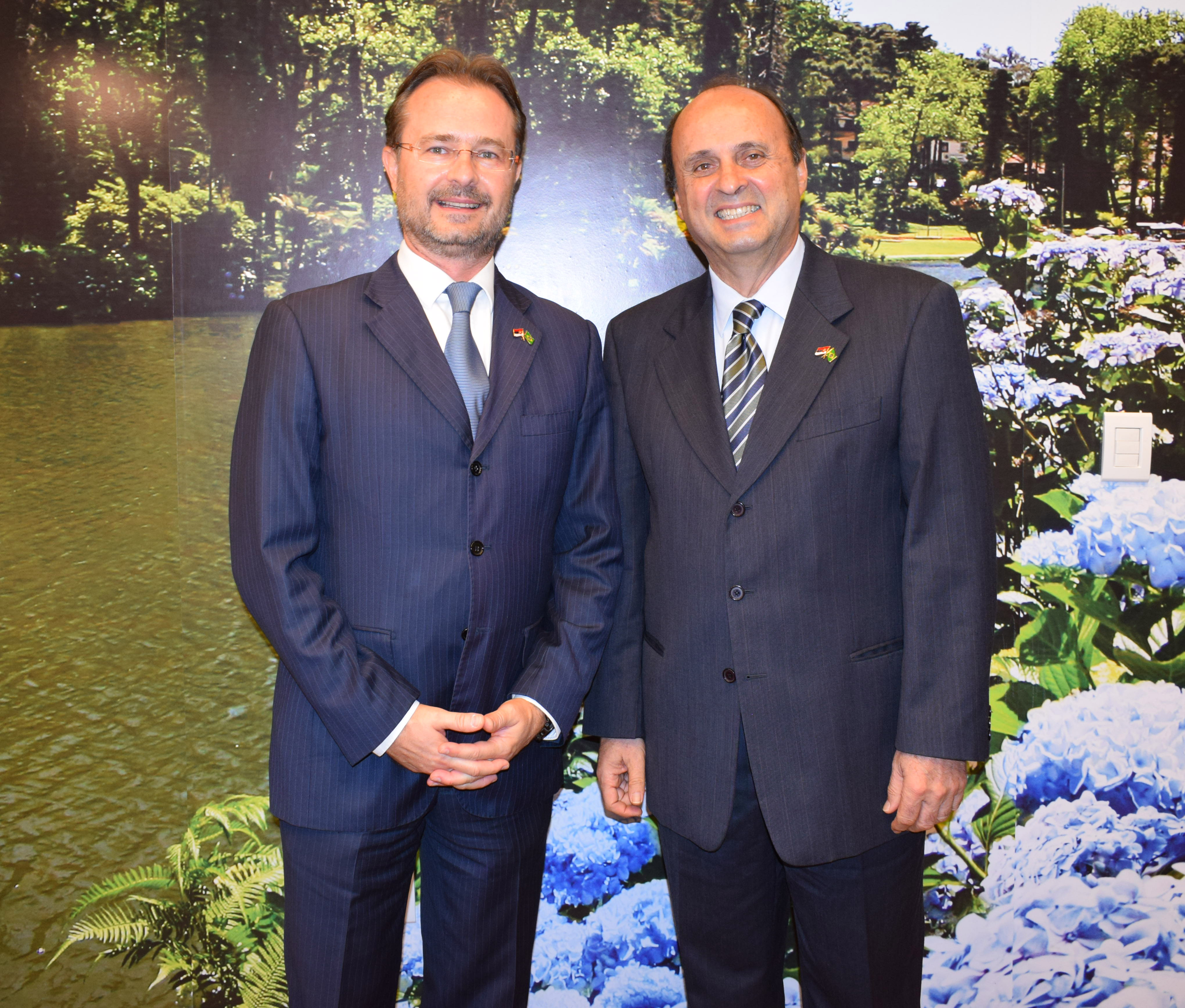
Foto: Embaixador Lazic e Prefeito Bertolucci |
|
|
| Decisão sobre o termo de vigência da Decisão sobre a isenção de vistos para entrada na República da Sérvia para cidadãos da República Islâmica do Irã para titulares de passaportes ordinários |
|
Informamos que o Governo da República da Sérvia, em sessão realizada no dia 8 de outubro de 2018, aprovou a Decisão sobre a Vigência da Decisão sobre a Isenção de Vistos para os Cidadãos da República Islâmica do Irã, portadores de passaportes ordinários. A decisão entra em vigor no dia 17 de outubro de 2018. A partir desta data, os cidadãos da República Islâmica do Irã, titulares de passaportes ordinários, para a entrada, trânsito e residência no território da R. Sérvia, precisarão de visto. |
|
|
| Feira das Embaixadas, 10 de novembro de 2018 no Parque da Cidade de Brasília |
|
A Embaixada da República da Sérvia participará neste ano da "Feira das Embaixadas", que ocorrerá no dia 10 de novembro de 2018. no Parque da Cidade Brasília. Convidamos a todos para visitarem o evento e conhecer a tradição, cultura, costumes e especialidades gastronômicas de mais de 70 países ao redor do mundo. Todos os recursos arrecadados durante o evento são destinados para fins humanitários.
 |
|
|
| Viagem de premiação à Sérvia e Montenegro aos melhores jornalistas de turismo do Brasil |
|
A Organização Turística da Sérvia (TOS) e a Organização Turística de Montenegro (TOCG), juntamente com a organização da Comissão Europeia de Turismo (CET), patrocinaram uma viagem aos melhores jornalistas de turismo do Brasil. A cerimônia de premiação ocorreu no dia 25 de setembro de 2018 em São Paulo, onde a República da Sérvia foi representada pelo Cônsul Honorário da República da Sérvia em São Paulo, Sr. José Guilherme de Godoy Pinheiro. Durante a cerimônia, o Sr. Pinheiro exibiu um filme de curta-metragem sobre a Sérvia e apresentou o potencial turístico de nosso país. A TOS e a TOCG receberão os ganhadores da premiação durante dois dias no local de destino, onde apresentarão os locais turísticos dos países , enquanto que a CET forneceu as passagens aéreas.
Mais informações sobre o evento podem ser encontradas no:
https://www.premioeuropa.com.br/

|
|
|
| Embaixador Lazić sobre a integração da Sérvia na Unia Europea |
|
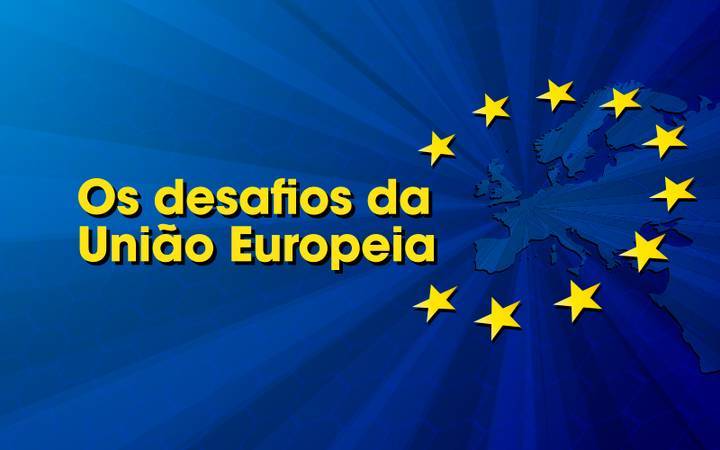
O embaixador da Sérvia no Brasil, Veljko Lazić, deu uma entrevista ao programa "Os desafios da UE", da Rádio Senado. Tal emissora, que é voltada para o público brasileiro, mostrou uma ideia aproximada das prioridades da política externa da Sérvia. O progresso da Sérvia para integrar-se à União Europeia foi o tema central da conversa. Nesse sentido, o embaixador sobre o avanço de nosso país no processo de integração europeia, bem como sobre as conversações atuais entre a Sérvia e UE. A transmissão teve quatro blocos, entre os dias 3 a 6 de setembro, bem como no final de semana de 8 e 9 de setembro, transmitida para 23 emissoras nacionais em 13 estados. A parte da transmissão relativa à Sérvia está no segundo bloco, a partir do 9º minuto |
|
|
| Partida Sérvia-Brasil assistida em Brasília, 27.06.2018 |
|
No contexto da partida entre a Sérvia e o Brasil pela atual Copa do Mundo de futebol, a Embaixada organizou um evento para acompanhar o jogo no restaurante Belgrado Burger, com amigos do Corpo Diplomático, do Itamaraty e da nossa diáspora. Nosso país recebeu um tratamento da mídia sem precedentes até agora. A partida foi acompanhada por equipes da TV Globo, SBT, TV Record, TV Band, TV Brasil e Correio Braziliense.
https://g1.globo.com/df/distrito-federal/noticia/torcedores-servios-e-brasileiros-acompanham-jogo-lado-a-lado-em-brasilia.ghtml
https://globoplay.globo.com/v/6836799/programa/
https://www.correiobraziliense.com.br/app/noticia/cidades/2018/06/27/interna_cidadesdf,691404/resilientes-servios-do-df-torcerao-pelo-brasil-apos-eliminacao-na-cop.shtml
https://www.youtube.com/watch?v=Qv_nnNnwPwU
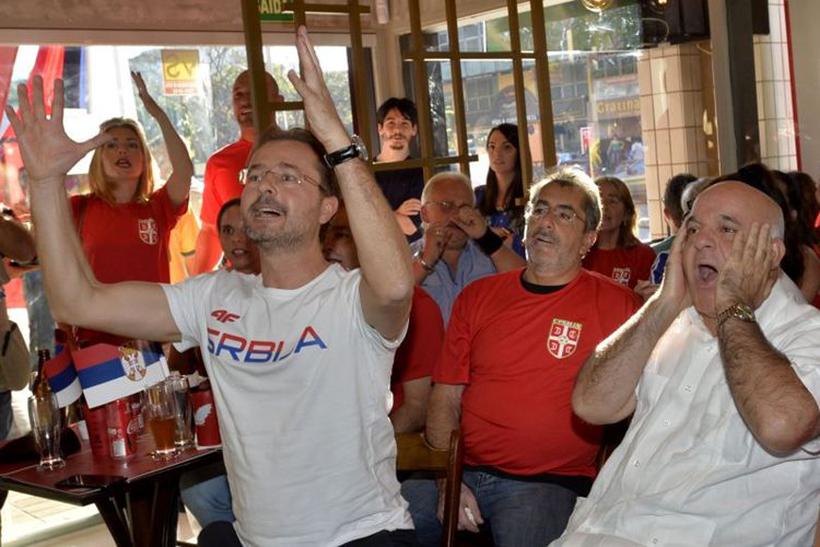
Foto: Marcelo Ferreira/CB/D.A Press |
|
|
| Exibição do filme „Nos Vemos em Montevidéu“ em Brasília em 20 de junho 2018 |
|
No âmbito da comemoração dos 80 anos de estabelecimento de relações diplomáticas entre a Sérvia e o Brasil, bem como no contexto da realização da Copa do Mundo de Futebol e do próximo jogo entre os dois países, foi apresentado ao público brasileiro o filme „Nos Vemos em Montevidéu“.
 |
|
|
| 80 anos do estabelecimento das relações diplomáticas entre a Sérvia e Brasil |
|
Neste dia, em 15 de junho de 2018, completam-se exatamente os 80 anos de estabelecimento de relações diplomáticas entre a Sérvia e o Brasil.
Através da proposta do então Presidente do Conselho Ministerial e do Ministro das Relações Exteriores, adotou-se o Decreto sobre a abertura da Missão do Reino da Iugoslávia no Rio de Janeiro. Logo depois disso, o Brasil aprovou o decreto sobre a abertura de sua missão diplomática em Belgrado.
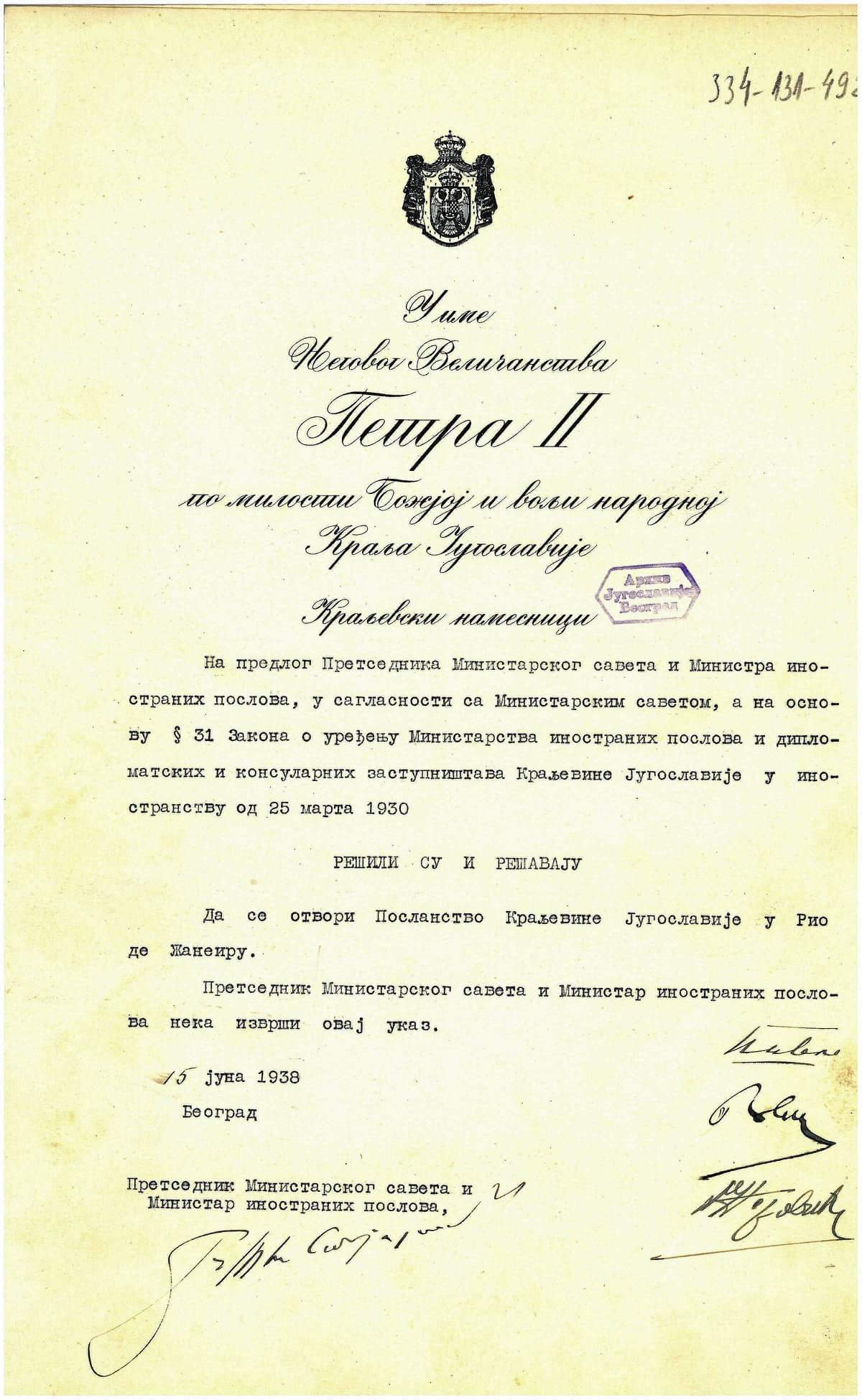
Decreto do Conselho Ministerial do Reino da Iugoslávia |
|
|
| Fórum de Investimentos em São Paulo, 29-30 de maio de 2018 |
|

O Embaixador Veljko Lazic participou do Fórum de Investimentos Brasil 2018 em São Paulo, ocorrido em 29-30 de maio de 2018, organizado pela Agência Brasileira de Promoção de Exportações e Investimentos (APEX).
A reunião foi aberta pelo Presidente da República Michel Temer e pelo presidente do Banco Interamericano de Desenvolvimento, Luis Alberto Morena, com a presença de altos representantes brasileiros e representantes do setor privado, círculos acadêmicos e mídia. No fórum discutiu-se temas nas áreas de infraestrutura, inovação e tecnologia, agroindústria, energia, saúde e biotecnologia, através de painéis e mesas redondas.
Esta foi uma oportunidade para encontros com autoridades brasileiras, representantes de departamentos governamentais e instituições, bem como empresas com possibilidades de cooperação econômica. |
|
|
| Decisão sobre a isenção de vistos para entrada na República da Sérvia aos cidadãos da República do Azerbaijão para titulares de todos os tipos de passaporte |
|
Informamos que o Governo da República da Sérvia, em uma sessão realizada em 24 de maio de 2018, emitiu uma decisão sobre a isenção de vistos para cidadãos da República do Azerbaijão, titulares de todos os tipos de passaportes, onde podem entrar, transitar e permanecer no território da República da Sérvia por até 90 (noventa) dias a partir da data de entrada na República da Sérvia em um período de até cento e oitenta (180) dias, caso não haja objeções no Art. 11 da Lei sobre estrangeiros.
Esta decisão entrou em vigor em 02 de junho de 2018. |
|
|
| Decisão sobre a isenção de vistos para entrada na República da Sérvia aos cidadãos da República do Burundi para titulares de todos os tipos de passaporte |
|
Informamos que o Governo da República da Sérvia, em uma sessão realizada em 24 de maio de 2018, emitiu uma decisão sobre a isenção de vistos para cidadãos da República do Burundi, titulares de todos os tipos de passaportes, onde podem entrar, transitar e permanecer no território da República da Sérvia por até 30 (trinta) dias a partir da data de entrada na República da Sérvia em um período de até um ano, caso não haja objeções no Art. 11 da Lei sobre estrangeiros.
Esta decisão entrou em vigor em 02 de junho de 2018. |
|
|
| Visita do embaixador Veljko Lazic à Feira Internacional de Agricultura no Distrito Federal, Brasília, 18 de maio de 2018 |
|
A convite do Governador do Distrito Federal, Rodrigo Rolemberg, o embaixador Veljko Lazic, com um grupo de embaixadores, visitou a Feira Internacional de Agricultura "Agrobrasilia 2018 - Feira dos Cerrados", que ocorreu no Distrito Federal entre os dias 15 e 19 de maio deste ano.
Esta é uma das maiores feiras no Brasil, e uma boa oportunidade para inúmeras reuniões com funcionários e representantes no campo da agricultura brasileira, bem como expositores nacionais, especialmente sobre o tema da cooperação mútua e troca de experiência neste setor.
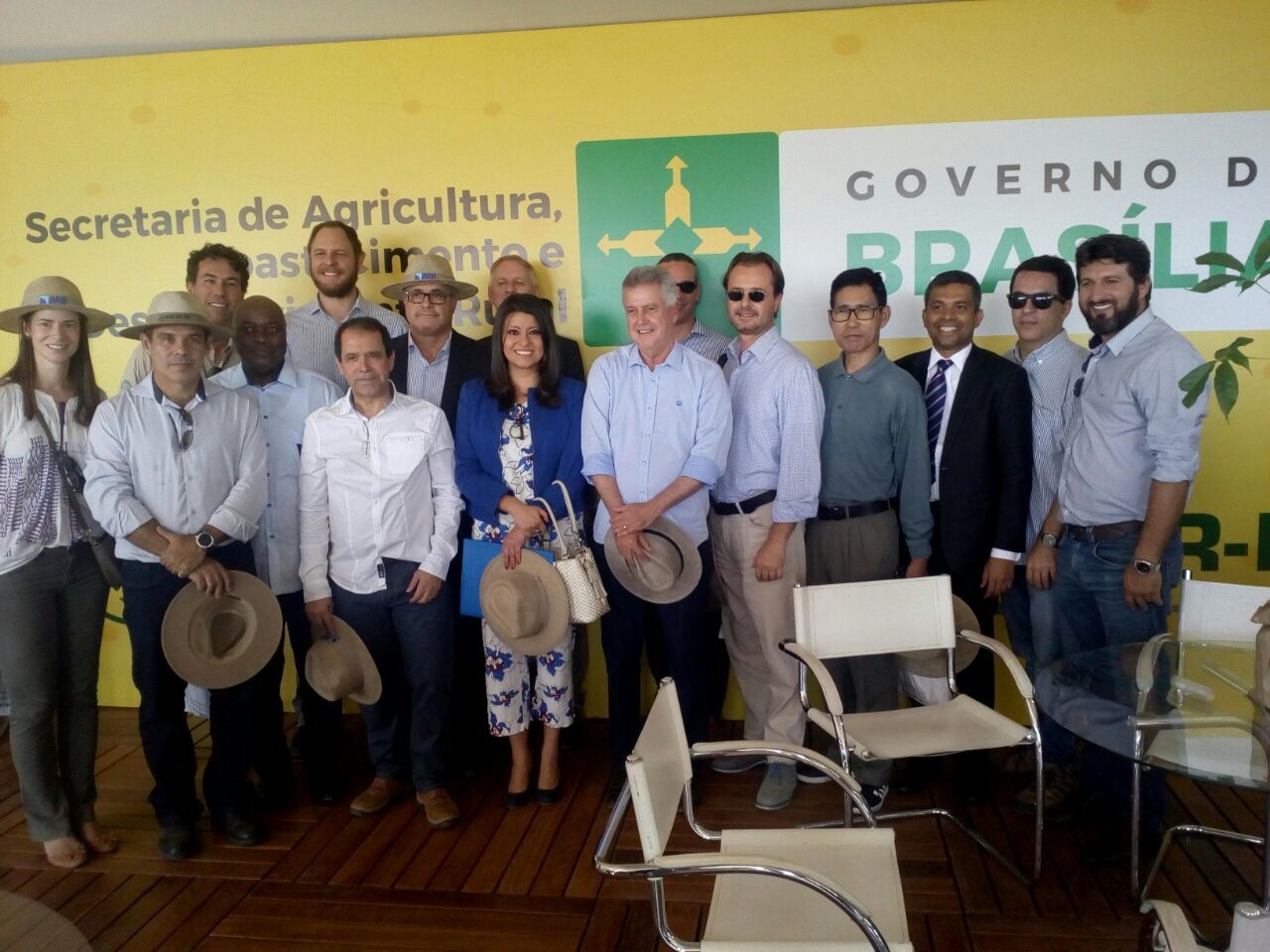
Foto - Governador Rodrigo Rolemberg com o grupo de embaixadores |
|
|
| Apresentação da Sérvia no contexto da Copa do Mundo de Futebol |
|
No contexto da próxima Copa do Mundo de Futebol, o "Centro de Educação de Jovens e Adultos" em Brasília apresentou os países participantes e que jogarão no mesmo grupo do Brasil. Em cooperação com a Embaixada da República da Sérvia em Brasília, nas dependências da escola foram apresentados o patrimônio cultural e histórico de nosso país, bem como os costumes locais, e os organizadores programaram partidas de futebol como modelo para a próxima Copa do Mundo. Os alunos e professores da escola prestaram especial atenção à apresentação da nossa gastronomia, que foi excepcionalmente bem recebida.

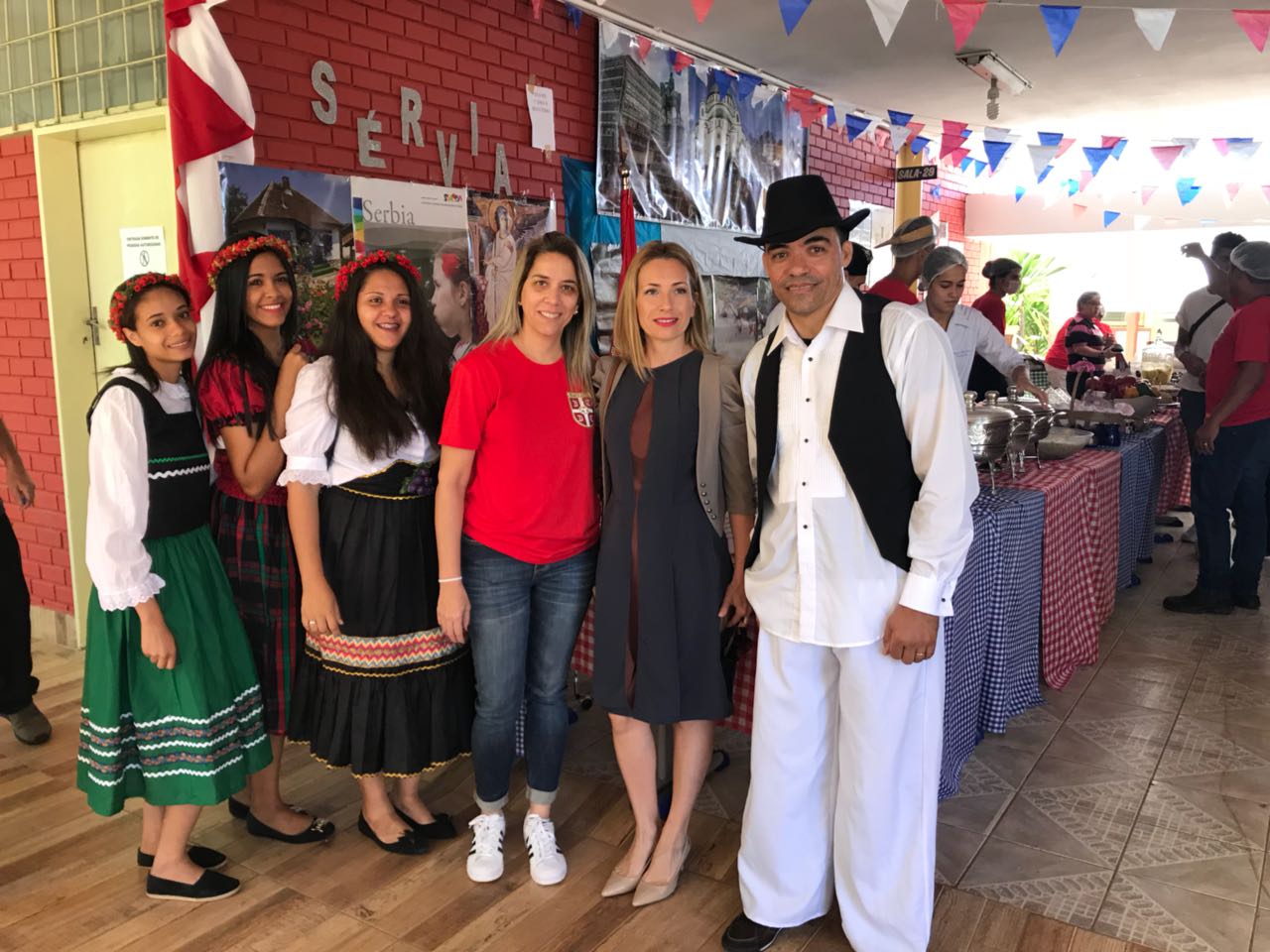 |
|
|
| Lei de Cidadania |
|
Informamos sobre as Emendas à Lei de Cidadania da República da Sérvia e à Lei de Registro Único de Cidadania, publicadas em 26.03.2018 no „Diário Oficial da República da Sérvia“, número 24/18, com entrada em vigor desde 03 de abril de 2018.
As emendas à Lei de Cidadania, no artigo 3, estipula que a cidadania da República da Sérvia pode ser concedida a um cidadão da ex-República Federativa Socialista da Iugoslávia ou a um cidadão de outro país da ex-República Federativa Socialista da Iugoslávia que, até o dia 31 de dezembro de 2016 e no dia de apresentação do pedido, tenha registrado residência na República da Sérvia. O pedido pode ser apresentado em um prazo de um ano a partir da data de entrada em vigor da referida lei, ou seja, até 03 de abril de 2019 |
|
|
| Visita à Escola Primária "Vargem Bonita" |
|
No âmbito do projeto do Distrito Federal „Embaixadas de Portas Abertas“, representantes da Embaixada da República da Sérvia em Brasília fizeram uma visita de retorno à escola primária "Vargem Bonita". Os alunos, na presença de professores, representantes do Governo do Distrito Federal e da Secretaria de Educação, realizaram uma apresentação, na qual mostraram autênticas características culturais desta região, bem como a história e as atividades da escola, além de apresentarem conhecimentos até agora adquiridos sobre a Sérvia. Este evento contou com a presença e apoio da primeira-dama do Distrito Federal, Sra. Márcia Rollemberg.
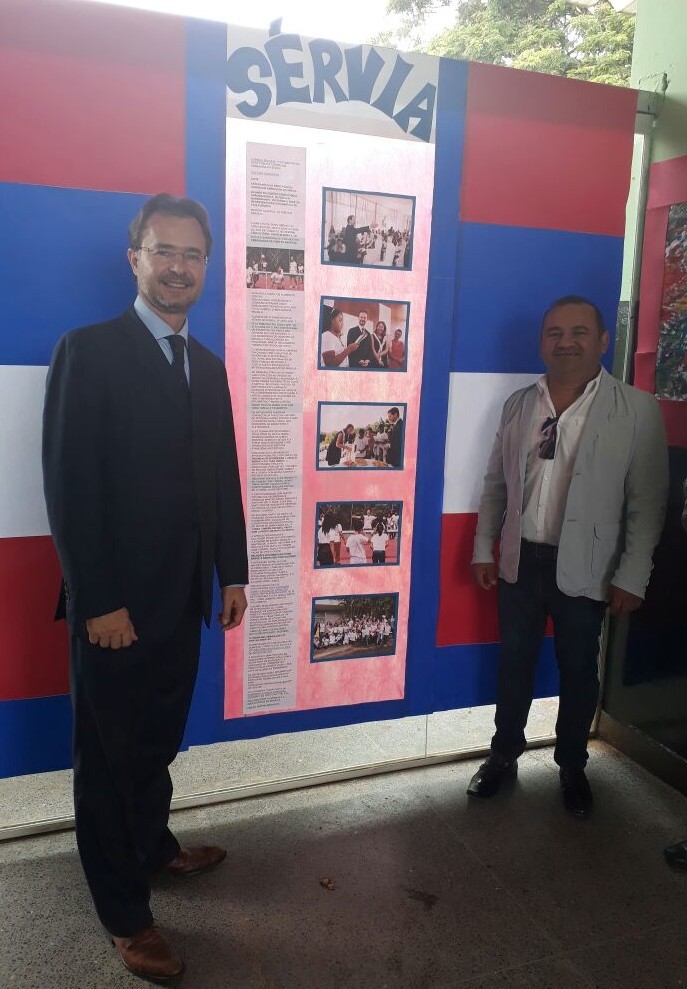
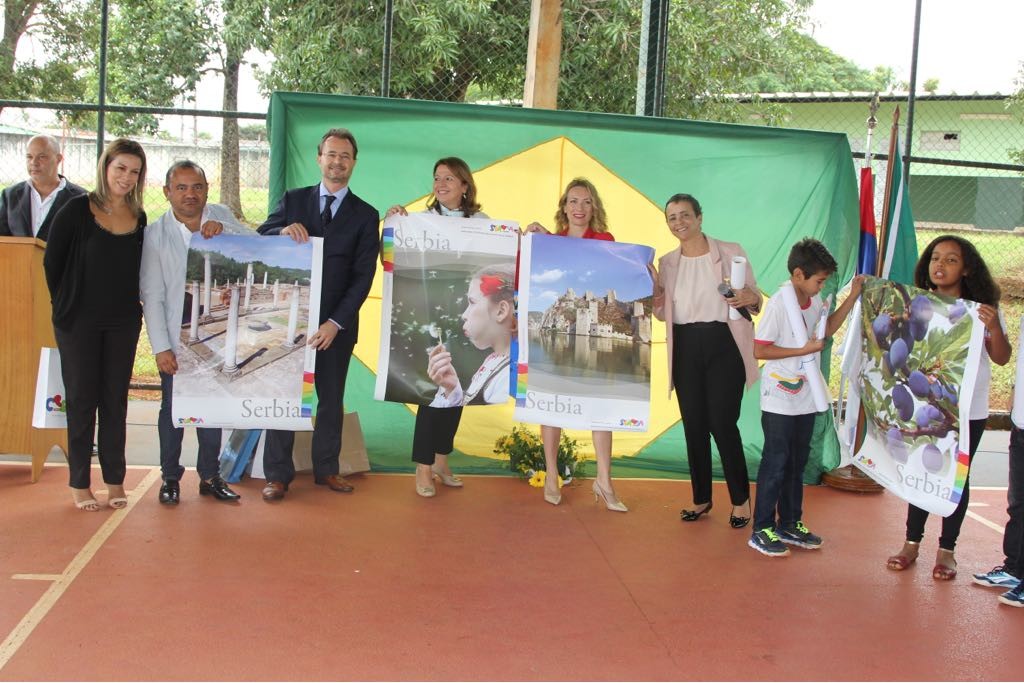
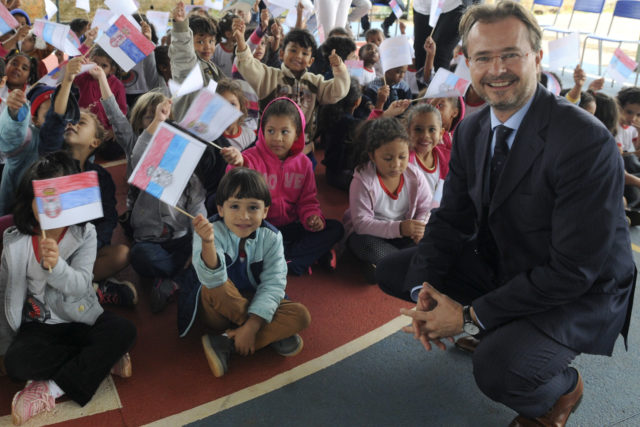
|
|
|
| Participação da Embaixada no projeto do Distrito Federal „Embaixadas de Portas Abertas“ |
|
A Embaixada da República da Sérvia em Brasília participou do projeto do Distrito Federal „Embaixadas de Portas Abertas“, e no dia 05 de abril de 2018 recebeu 35 alunos de uma escola da periferia de Brasília, com idades entre 9 e 11 anos.
O Embaixador, sua esposa e o pessoal diplomático da Embaixada apresentaram aos estudantes da escola elementar „Vargem Bonita“, com as presenças de professores e representantes do governo do Distrito Federal – Assessoria Internacional e Secretaria de Educação – as atrações da Sérvia, mostrando aos mais jovens os aspectos culturais e os principais acontecimentos históricos, bem como personalidades, religião e atualidades na área de esporte. Tal evento contou ainda com a participação da primeira dama do Distrito Federal, Sra. Márcia Rollemberg. Esta atividade fortaleceu mais uma vez a cooperação cultural entre a Sérvia e o Brasil.
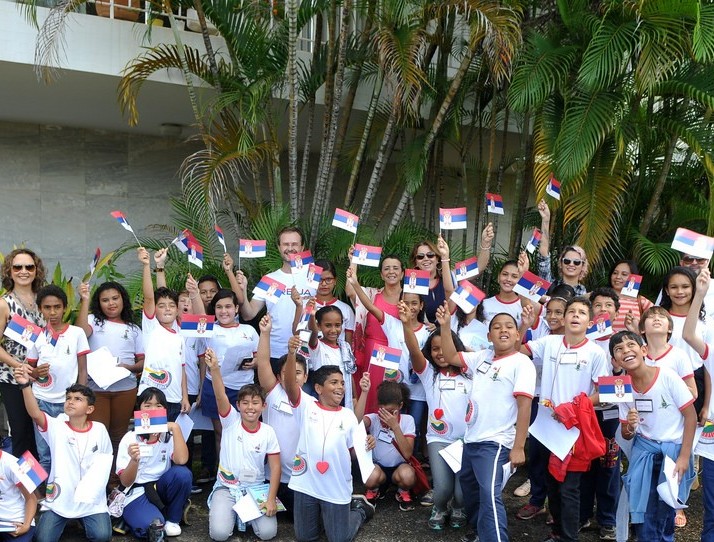
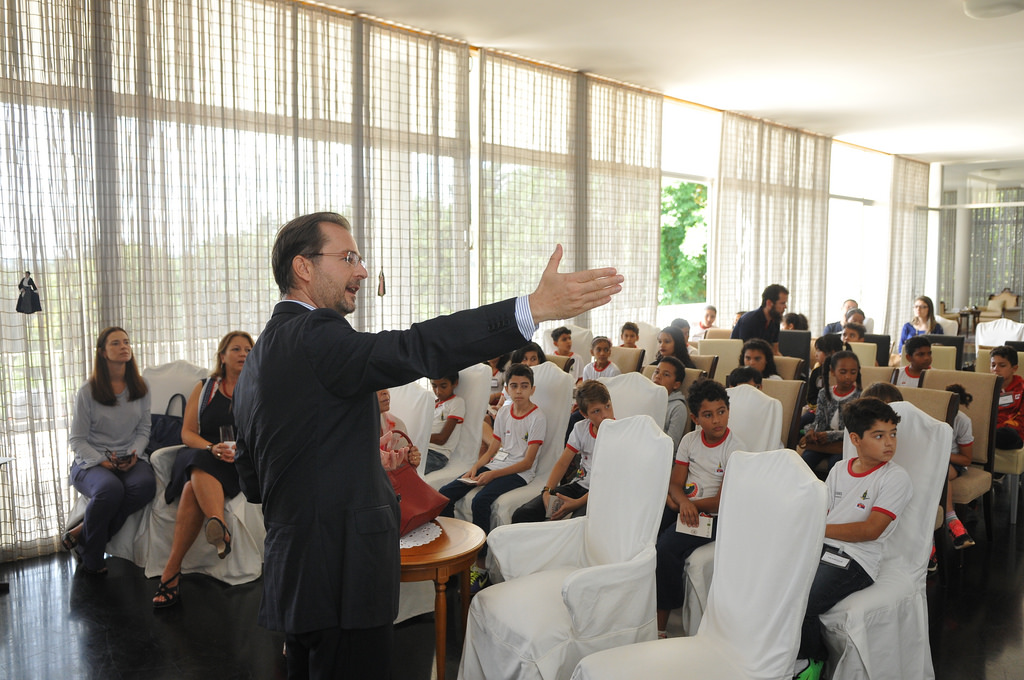
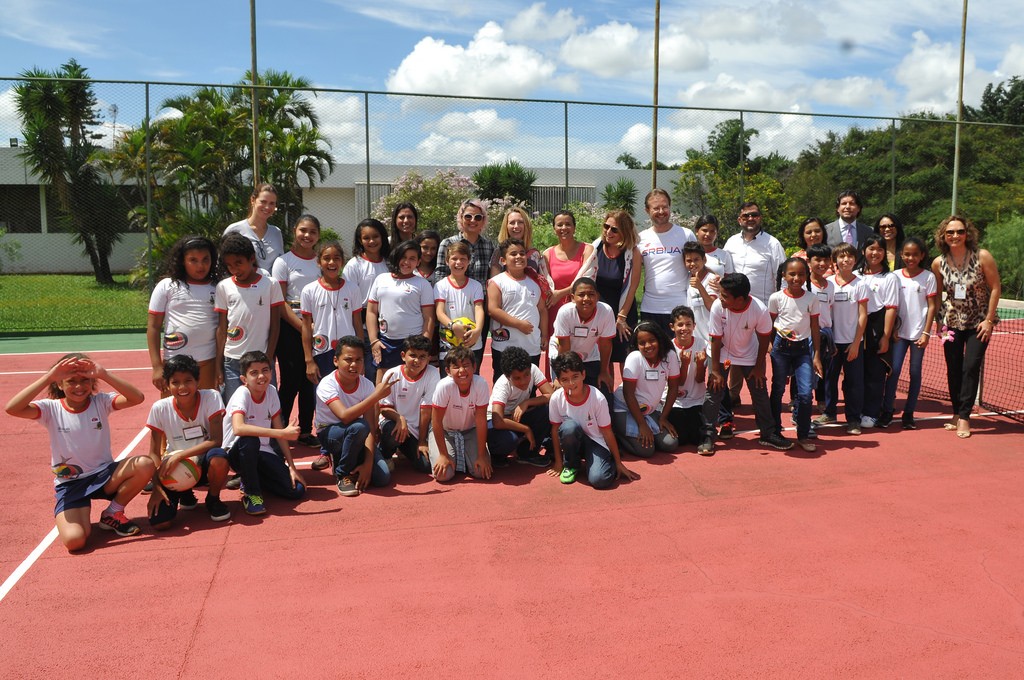 |
|
|
| Decisão sobre a isenção de vistos para entrada em São Vicente e Granadinas aos cidadãos da República da Sérvia |
|
Informamos que o Governo de São Vicente e Granadinas emitiu uma Decisão sobre isenção de vistos para cidadãos da República da Sérvia, titulares de todos os tipos de passaportes, onde podem entrar, transitar e permanecer no seu território por até 30 (trinta) dias, em um período de um ano, caso não haja objeções no Art. 11 da Lei sobre estrangeiros.
Esta decisão entrou em vigor em 21 de fevereiro de 2018. |
|
|
| Decisão sobre a isenção de vistos para entrada na República da Sérvia aos cidadãos da Geórgia para titulares de passaportes comuns |
|
Informamos que o Governo da República da Sérvia, em uma sessão realizada em 8 de março de 2018, emitiu uma decisão sobre a isenção de vistos para cidadãos da Geórgia, titulares de passaportes comuns, onde podem entrar, transitar e permanecer no território da República da Sérvia por até 30 (trinta) dias a partir da data de entrada na República da Sérvia, caso não haja objeções no Art. 11 da Lei sobre estrangeiros.
Esta decisão entrou em vigor em 9 de março de 2018 |
|
|
| Decisão sobre a isenção de vistos para entrada na República da Colômbia aos cidadãos da República da Sérvia |
|
Informamos que o Governo da República da Colômbia emitiu uma Decisão sobre isenção de vistos para cidadãos da República da Sérvia, titulares de todos os tipos de passaportes, onde podem entrar, transitar e permanecer no seu território por até 90 (noventa) dias, com a possibilidade de prolongar 90 dias adicionais, em um período de 180 dias em um ano, caso não haja objeções no Art. 11 da Lei sobre estrangeiros.
Esta decisão entrou em vigor em 15 de fevereiro de 2018. |
|
|
| Exposição sobre Andric – comemoração pelo Dia Nacional da R. Sérvia e 80 anos das relações diplomáticas entre Sérvia e Brasil, Brasília, 22 de fevereiro de 2018. |
|
Por ocasião do Dia Nacional da Sérvia e pelos 80 anos do estabelecimento de relações diplomáticas entre a Sérvia e o Brasil, em Brasília no dia 22 de fevereiro de 2018 foi inaugurada a exposição „Ivo Andric – escritor e/ou diplomata“, do Museu da Cidade de Belgrado, no Palácio do Buriti – sede do Governo do Distrito Federal (DF).
Diante de cerca de 200 presentes, tanto sobre as relações diplomáticas entre a Sérvia e o Brasil quanto sobre a vida e obra do nosso maior escritor e diplomata, falaram a Primeira-Dama do Distrito Federal, Márcia Rollemberg, o Subsecretário-Geral de Assuntos Políticos, Multilaterais, Europa e América do Norte do Itamaraty, Embaixador Simas Magalhães, o secretário de cultura do DF, Gustavo Pacheco, o chefe de gabinete do governador do DF, Alden Mangueira, e o embaixador da República da Sérvia no Brasil, Veljko Lazic.
Entre os presentes, havia representantes diplomáticos de 60 paises acreditados no Brasil, bem como autoridades dos poderes legislativo e executivo do Brasil, representantes de círculos acadêmicos e culturais e membros da nossa diáspora.
A exposição ficará aberta ao público até 16 de março de 2018.
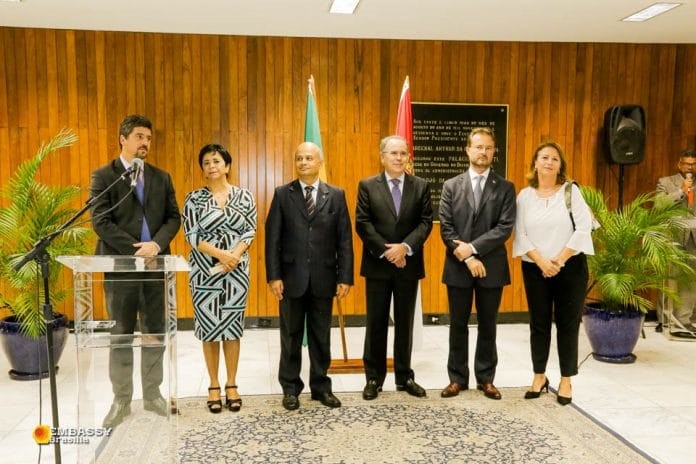
Foto: Embassy Brasília
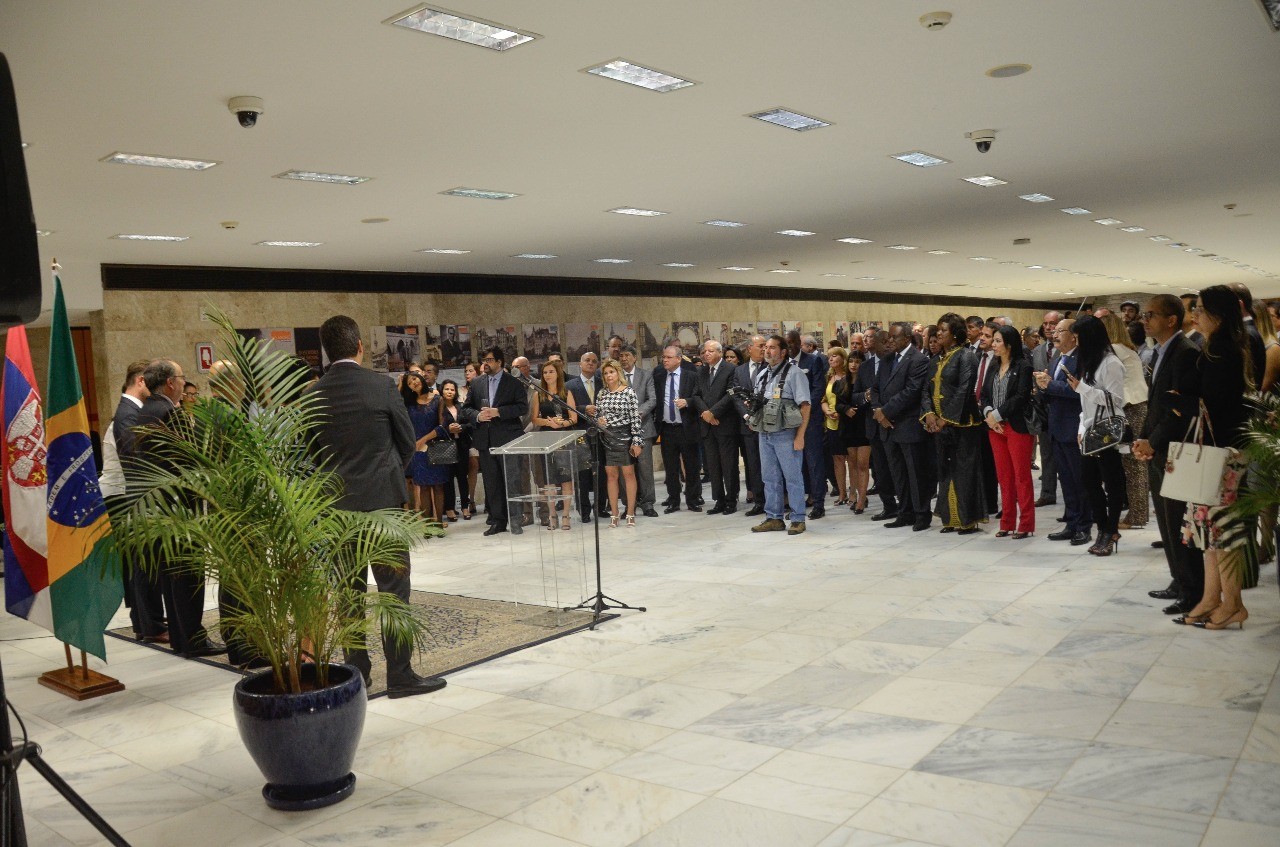
Foto: Diplamacia e Negócios, fotógrafa Kellen Lages
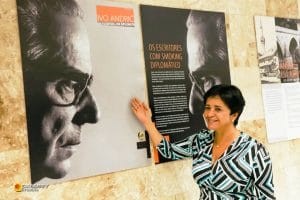
Foto: Embassy Brasilia |
|
|
| Entrevista do embaixador Veljko Lazic ao portal "Embassy Brasilia" |
|
Por ocasião do Dia Nacional da República da Sérvia e pelos 80 anos de relações diplomáticas entre a Sérvia e o Brasil, o embaixador Veljko Lazic concedeu uma entrevista ao portal "Embassy Brasilia".
http://embassybrasilia.com.br/site/mostra-marcara-a-data-nacional-da-servia-e-os-80-anos-de-relacoes-diplomaticas-com-brasil/
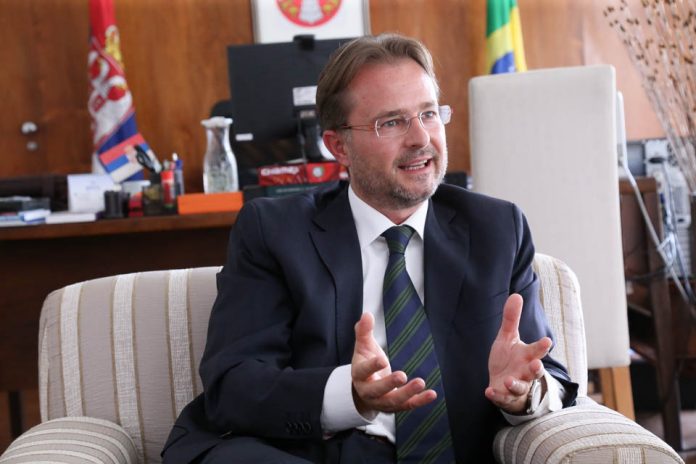
Foto: Embassy Brasilia |
|
|
| Entrevista do embaixador Veljko Lazic para a revista The Guide |
|
O Embaixador da República da Sérvia no Brasil, Veljko Lazic, por ocasião do Dia Nacional da República da Sérvia, concedeu uma entrevista à revista The Guide – o guia das embaixadas, que encontra-se entre as revistas mais lidas pelo corpo diplomático do Brasil.
http://www.theguide.com.br/socialevents/socialevents/interviewwiththeambassadorofserbiamrveljkolazic.1693.br
|
|
|
| Apresentação das prioridades da Presidência búlgara da UE para os países candidatos e da Parceria Oriental, Brasil, 12 de janeiro de 2018 |
|
Por ocasião da tomada da Presidência pela Bulgária na UE de 01.01 a 30.06. deste ano, o embaixador da Bulgária no Brasil, Valeri Yotov, apresentou na Embaixada em 12 de janeiro de 2018 as prioridades e o programa da Presidência do Conselho da UE. A reunião contou com a presença dos embaixadores dos países candidatos acreditados em Brasília - Sérvia, Macedônia e Turquia, bem como países da Parceria oriental - Ucrânia, Geórgia, Armênia, Azerbaijão e Belarus.
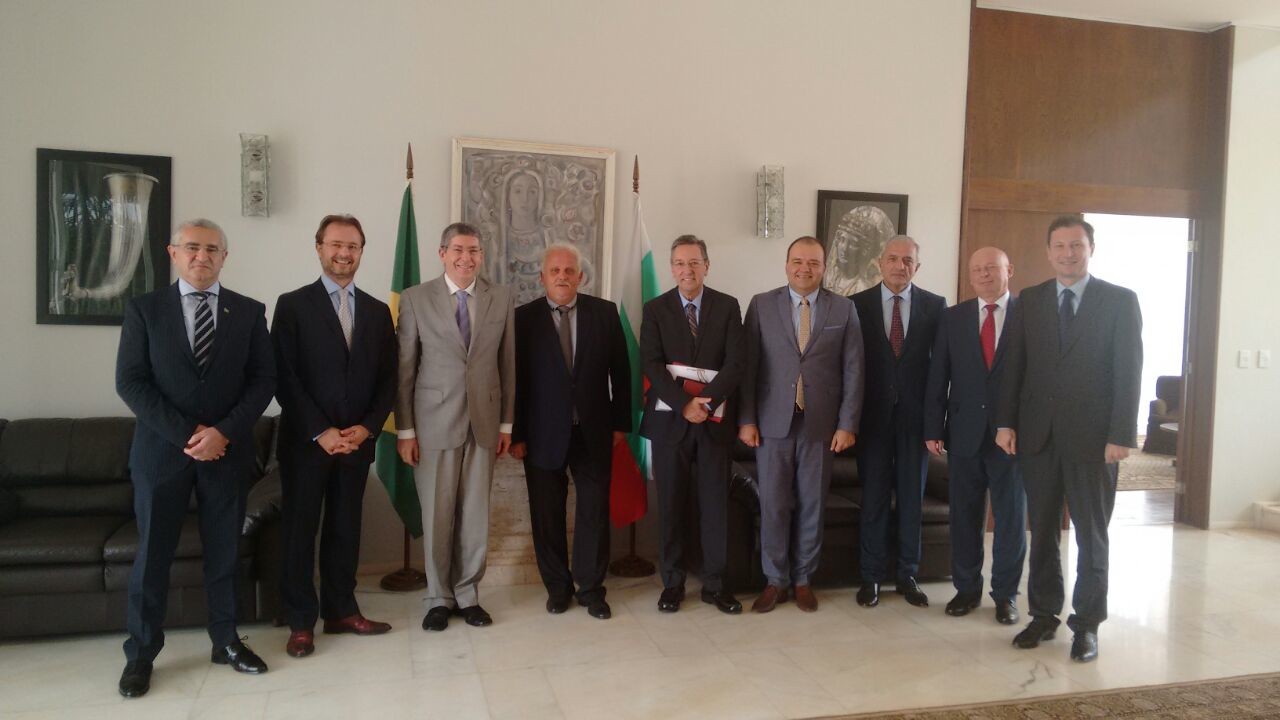
Foto (da esquerda para a direita) - Embaixadores do Azerbaijão, Sérvia, Ucrânia, Bulgária, Turquia, Macedônia, Armênia, Belarus e Geórgia |
|
|
| Participação da Embaixada da R. Sérvia no Bazar de Natal Brasilia Connection |
|
Durante a última semana foi realizado o Bazar de Natal Brasília Connection, ocorrido em Brasília. Por esta ocasião, no Clube das Nações, produtos típicos, tradições, culturas e costumes de vários países puderam ser apresentados, dentre os quais os da Sérvia.
No stand de nosso país os visitantes tiveram a oportunidade de informarem-se sobre as atrações turísticas e artístico-culturais da Sérvia, de provarem especialidades típicas, assim como de verem ítens típicos caseiros feitos à mão.
A arrecadação da participação no referido evento foi revertida para programas sociais da região do Distrito Federal, sendo que deste vez ao jardim de infância da Creche São Francisco, localizada na Estrutural, a maior favela nas proximidades de Brasília.
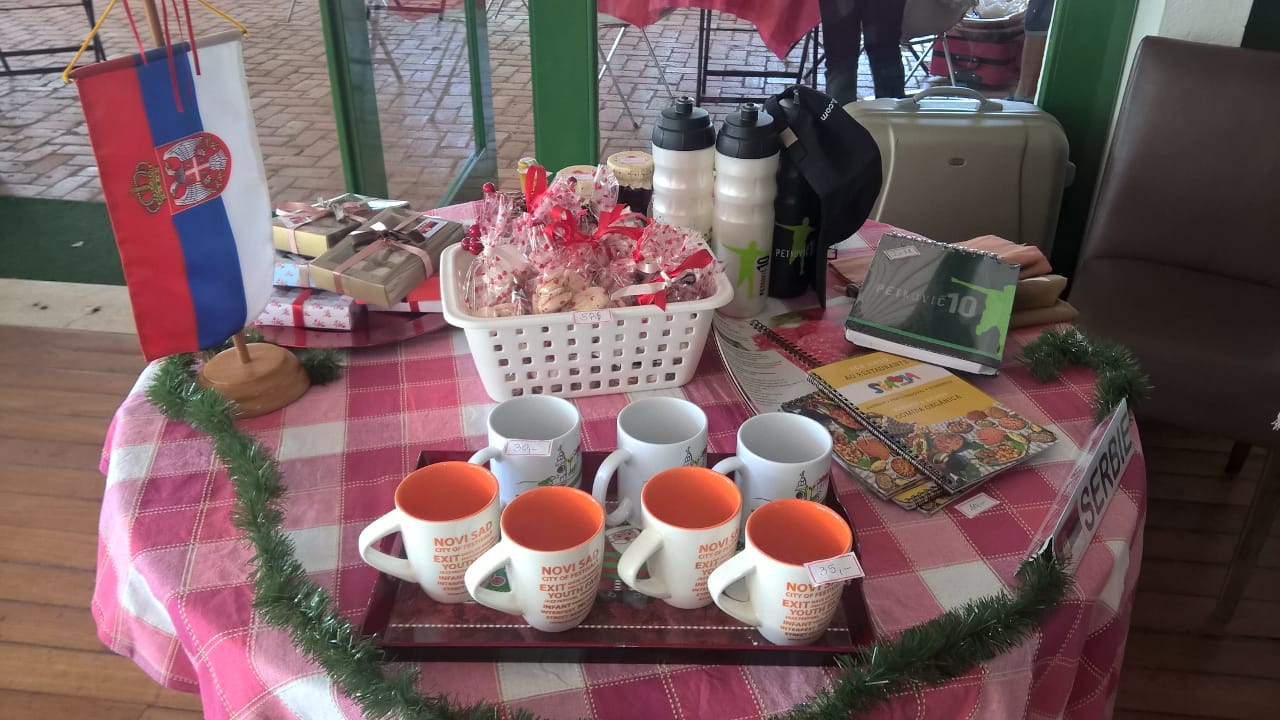 |
|
|
| Apresentação dos potenciais econômicos do estado de Goiás |
|
O Comitê Executivo do Departamento de Comércio Exterior e Desenvolvimento do estado de Goiás organizou este ano um café da manhã de trabalho para representantes do corpo diplomático em Brasília. O encontro teve como objetivo apresentar os potenciais econômicos do estado de Goiás, que contou com a participação de inúmeros embaixadores e representantes do corpo diplomático. Os meios de comunicação locais destacaram o desempenho do Embaixador da República da Sérvia no Brasil, Sr. Veljko Lazic, que à frente do corpo diplomático no Brasil, ressaltou a importância da realização de tais manifestações, com o objetivo de uma maior aproximação entre representantes de outros países para viabilizar oportunidades de estreitamento de relações nas áreas de comércio, cooperação econômica e comercial com o estado de Goiás.
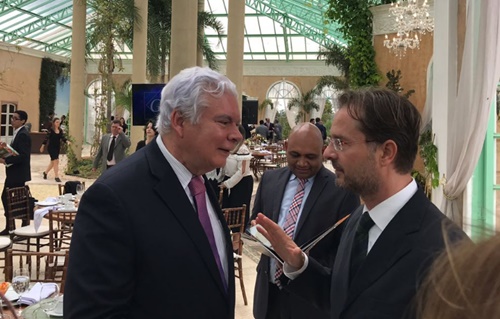
https://youtu.be/najiaJ0_MeA |
|
|
| Visita do Embaixador Veljko Lazic ao estado de Minas Gerais, 09-13 de outubro de 2017 |
|
O Embaixador da República da Sérvia no Brasil, Veljko Lazic, esteve em uma visita oficial ao estado de Minas Gerais entre 09-13 de outubro de 2017. Durante a visita, o Embaixador teve reuniões com representantes do Gabinete do Prefeito de Belo Horizonte, Federação das Indústrias de Minas Gerais (FIEMG), Secretaria da Agricultura, Companhia de Desenvolvimento Econômico de Minas Gerais (CODEMIG) e Secretaria de Cooperação Internacional do Gabinete do Governador de Minas Gerais.
Durante todas as reuniões, destacou-se a importância das excelentes relações bilaterais entre a Sérvia e o Brasil, que encontram-se em uma boa base para o desenvolvimento e fortalecimento da cooperação econômica. A este respeito, foram considerados diversos aspectos da cooperação econômica, maior alcance das trocas comerciais e investimentos em áreas de interesse mútuo.
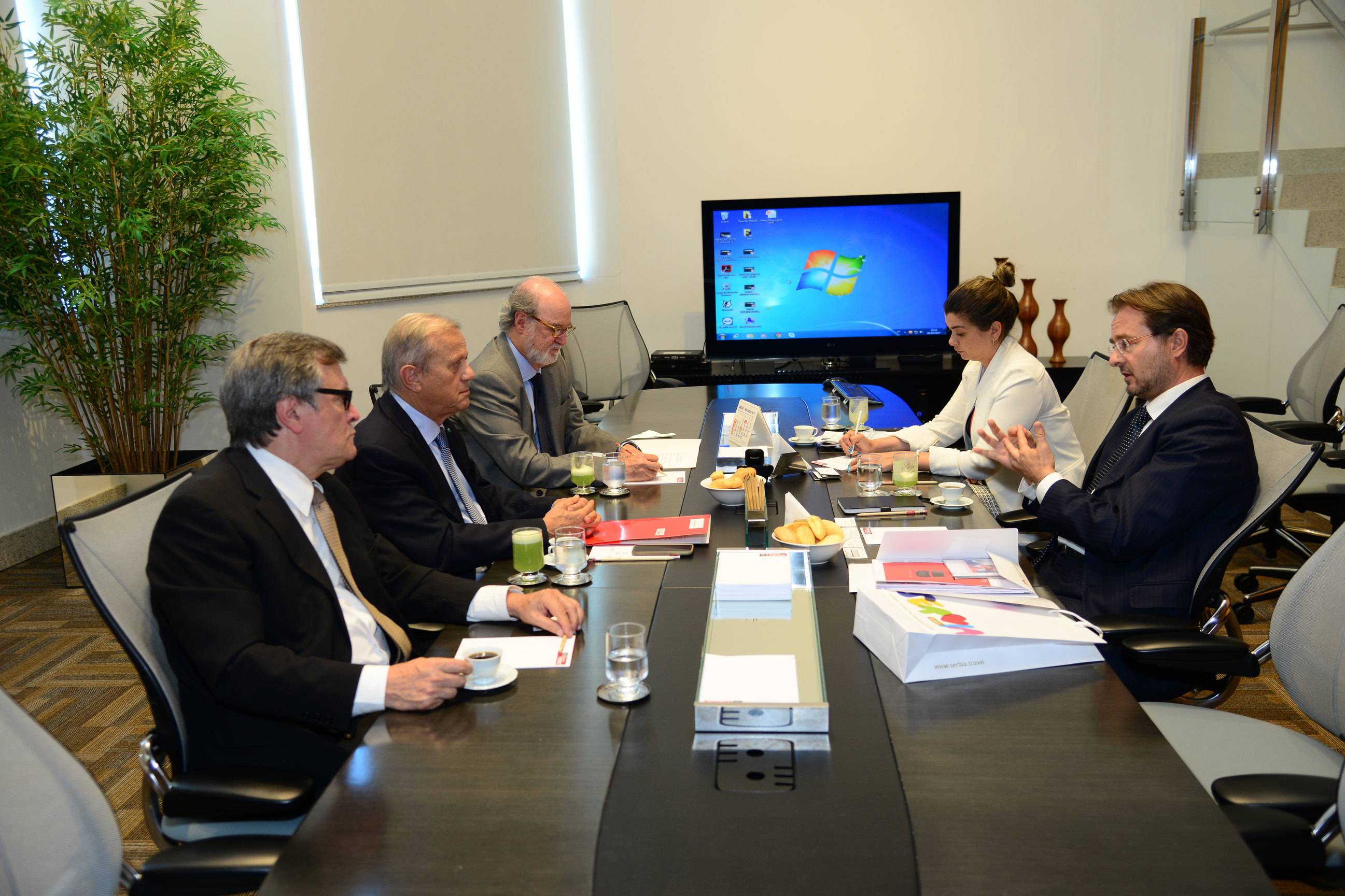
Foto – Reunião na FIEMG (retirada do site da FIEMG)
|
|
|
| Programa: “Entre amigos com Embaixador da Sérvia“, TV SUPREN |
|
https://www.youtube.com/watch?v=cwadWbdpH6Q |
|
|
| Transmissão sobre a República da Sérvia na Rádio Senado |
|
Como parte do programa "Parlamento do mundo", de autoria de Ivan Godoy, foi ao ar uma transmissão sobre a República da Sérvia em 14 de julho de 2017, na qual foi dada uma visão mais ampla dos fatos históricos, localização geográfica, atrações culturais e atividades parlamentares. No âmbito do programa, o Embaixador Veljko Lazic deu uma declaração quanto à nossa posição sobre Kosovo e Metohija e prioridades de política externa.
A transmissão foi ao ar pelas 17 emissoras que transmitem o programa para todo o Brasil.
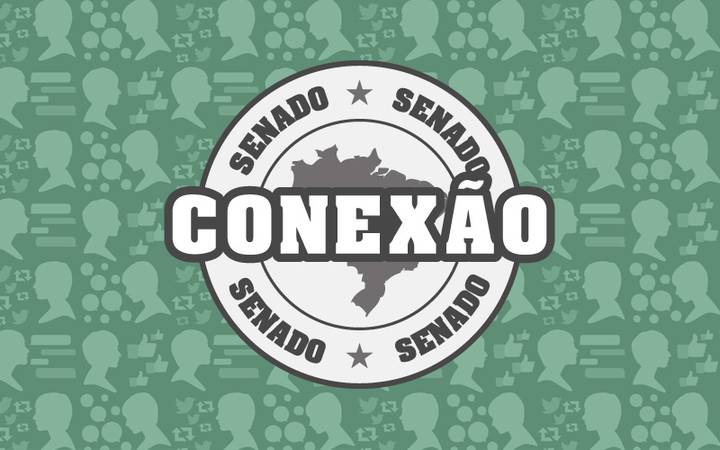
O link da transmissão é:http://www12.senado.leg.br/radio/1/conexao-senado/parlamentos-do-mundo-servia
|
|
|
| Participação da seleção de vôlei da Sérvia na fase final da Liga Mundial, Curitiba, 04-08 de julho de 2017 |
|
A seleção de vôlei da Sérvia participou da fase final da Liga Mundial em Curitiba, de 04 a 08 de julho de 2017, onde defendeu o título de campeã do ano passado. O torneio contou com a participação de seis das melhores seleções do mundo - além da Sérvia - Brasil, EUA, Canadá, Rússia e França.
O Embaixador da República da Sérvia no Brasil Veljko Lazic visitou nossos jogadores e membros da equipe técnica, que demonstraram sua gratidão ao presenteá-lo com a camiseta da seleção nacional, com o número 14.
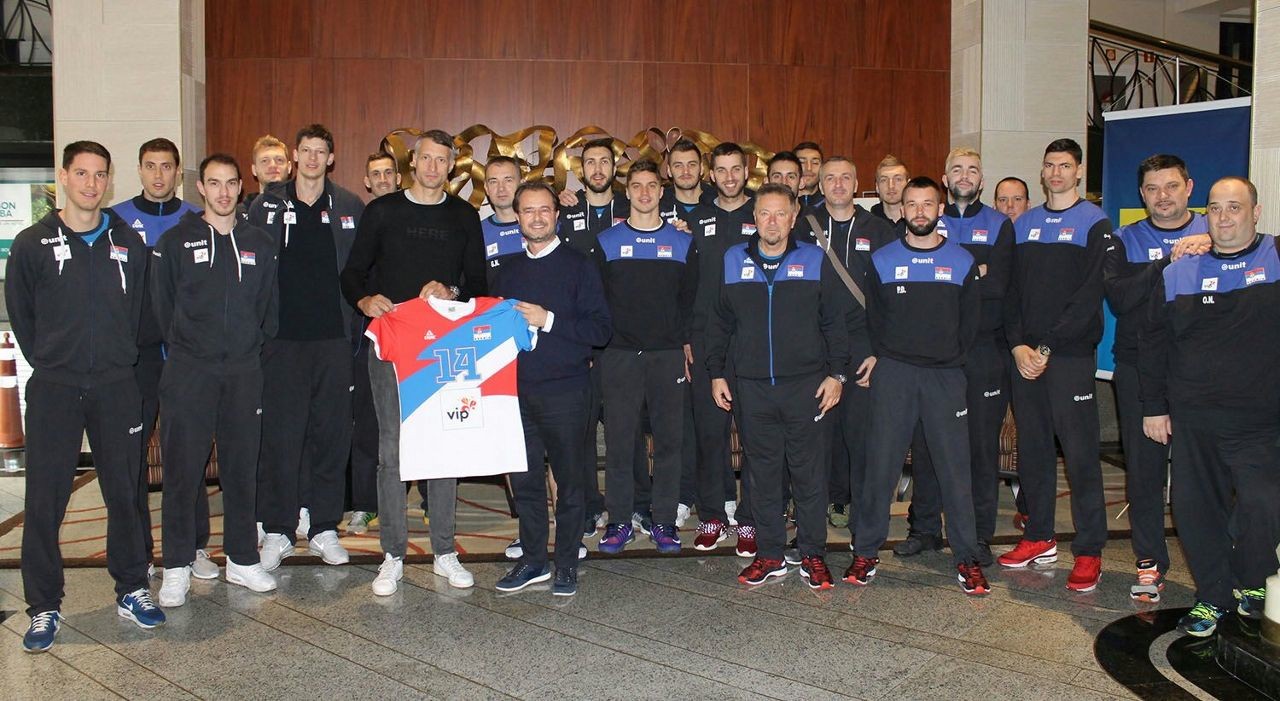 |
|
|
| Entrevista do embaixador para a „TV Supren“ |
|
Visando uma apresentação turística da República da Sérvia, o embaixador Veljko Lazic deu uma entrevista para a "TV Supren" (canal 2, NET), no programa "Entre Amigos".
A entrevista incluiu temas sobre fatos históricos, através da cultura, artes, esportes e atrações turísticas. Nesta ocasião foram também feitas pequenas apresentações culinárias de alguns produtos típicos.
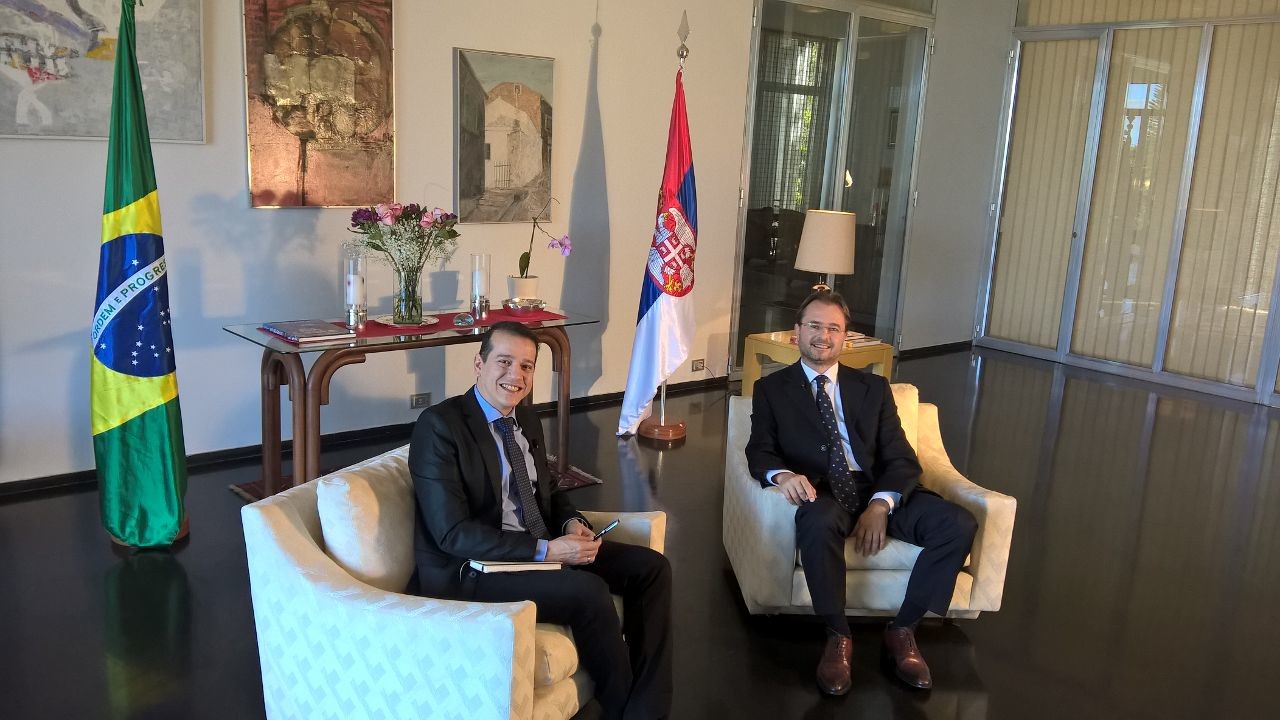
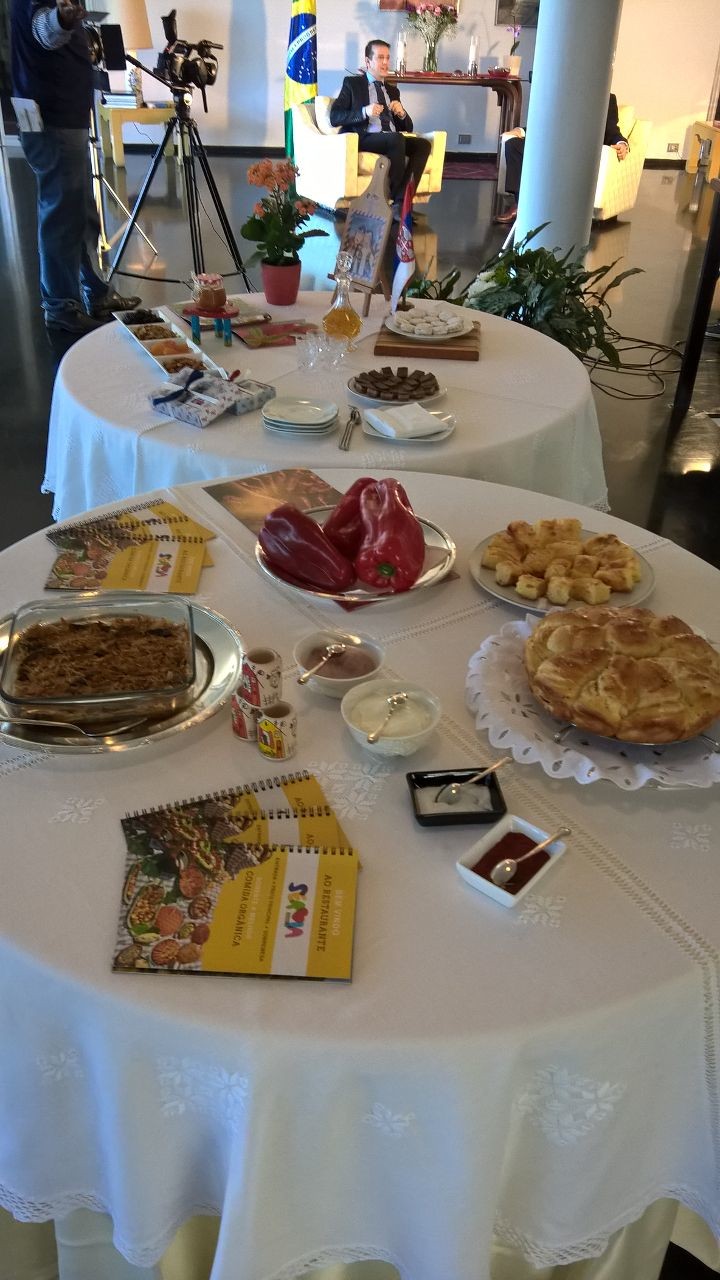 |
|
|
| Fórum de Investimento em São Paulo, 30-31 de maio de 2017 |
|

O Embaixador Veljko Lazic participou do Fórum de Investimento em São Paulo, nos dias 30-31 de maio de 2017, organizado pela Agência Brasileira de Promoção de Exportações e Investimentos (APEX). A reunião foi aberta pelo presidente da República Michel Temer, com a presença de altos representantes do Estado. O fórum discutiu temas nas áreas de infra-estrutura, inovação e tecnologia, agro-indústria, energia, saúde e biotecnologia, através de painéis e mesas redondas. Esta foi uma oportunidade para se reunir com autoridades brasileiras, representantes de departamentos governamentais, bem como com um grande número de investidores e representantes de empresas, onde discutiram-se possibilidades de cooperação econômica. |
|
|
| Participação da República da Sérvia na Feira Internacional de Equipamentos Militares e Defesa - "LAAD 2017", 04-07. Abril de 2017, Rio de Janeiro |
|
A Feira Internacional de Equipamentos MIlitares e Defesa "LAAD 2017", realizada entre os dias 04-07. Abril 2017 no Rio de Janeiro, apresentou os últimos e melhores avanços tecnológicos neste campo. Maior evento deste tipo no território da América Latina, neste ano reuniu um grande número de expositores nacionais e internacionais, bem como delegações governamentais de alto nível.
Nossa delegação foi chefiada pelo Embaixador da R. Sérvia no Brasil Sr. Veljko Lazic. O evento contou com a participação da delegação da "Jugoimport-SDPR", com um grande estande na exposição, e um representante da fábrica "Krušik". Além de empresas brasileiras, muitas delegações estrangeiras puderam conhecer o potencial da nossa indústria de defesa e considerar a possibilidade de viabilizar formas concretas de cooperação.
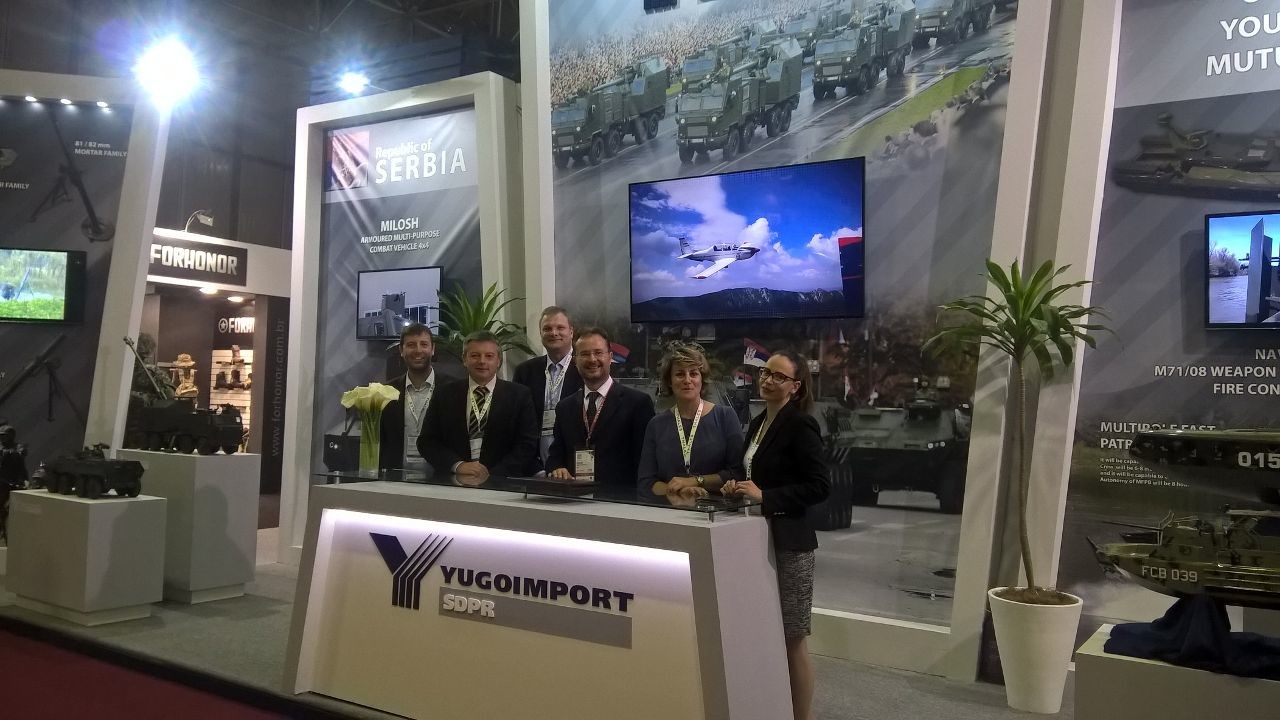
|
|
|
| Visita conjunta de representantes autorizados dos Estados sucessores da ex-Iugoslávia em Brasília, 17-21. março 2017 |
|
Como parte da implementação do Anexo B do Acordo de questões de sucessão, os representantes autorizados dos Estados sucessores – Sérvia, Croácia e Macedônia – estiveram em Brasília entre 17 e 21 de março de 2017 para avaliar a possibilidade da divisão física do lote da Embaixada da então ex-Iugoslávia.
Nesta ocasião, foram realizadas reuniões no Ministério das Relações Exteriores com o Secretário-Geral de MRE Embaixador Marcos Galvão, bem como uma reunião especial com o Embaixador Fernando Simas Magalhães, Subsecretário para Assuntos Políticos, e o Chefe do Protocolo João Mendes. Em homenagem a esta visita, o Palácio "Itamaraty" organizou um almoço de trabalho para os membros das delegações.
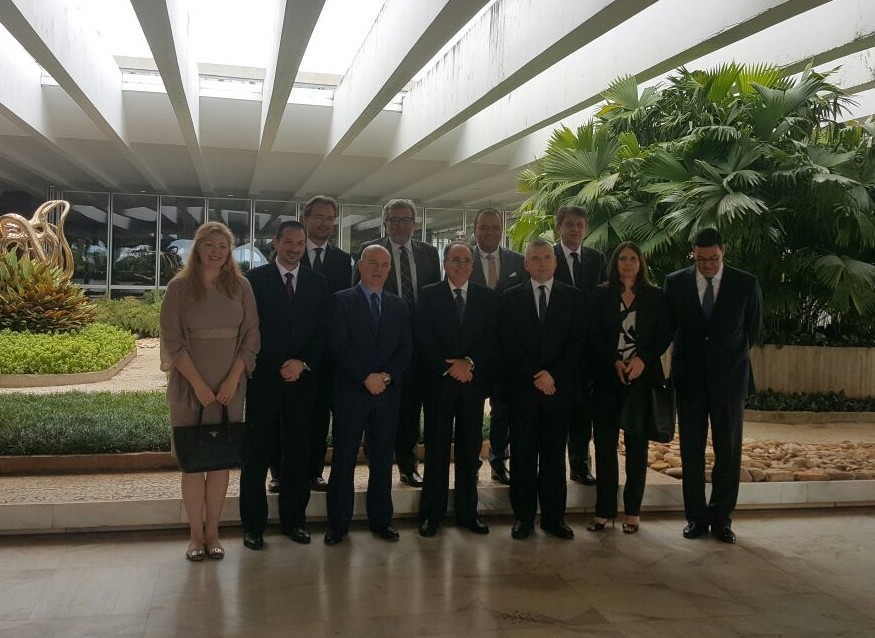
|
|
|
| „Feira Internacional Expodireto Cotrijal 2017”, Rio Grande do Sul, 09-10 de março de 2017 |
|
A convite do Ministro da Agricultura Blair Maggi, o Embaixador Veljko Lazic nos dias 09-10 de março de 2017, com outros chefes de missões estrangeiras, visitaram a Feira Internacional de Agricultura "Feira Internacional Expodireto Cotrijal 2017", na cidade de Não-Me-Toque, Rio Grande do Sul.
A visita a uma das maiores feiras de negócios no Brasil foi uma boa oportunidade para se reunir com o ministro da Agricultura Blair Maggi, o Presidente da EMBRAPA Mauricio Lopes e outras autoridades e representantes brasileiros na área de agricultura, bem como com expositores locais. |
|
|
| Encontro do embaixador Veljko Lazic com o governador de Santa Cruz Ruben Costas, 08 de fevereiro de 2017 |
|
Durante visita oficial à Santa Cruz, o embaixador Veljko Lazic teve um encontro com o governador Ruben Costas. Na conversa foi tratada, dentre outros temas, especialmente da importância das boas relações bilaterais entre a Sérvia e a Bolívia e que elas podem ser uma boa base para o fortalemcimento da cooperação económica. Neste contexto, discutiram-se várias possibilidades de cooperação em muitos setores comerciais.
A reunião contou com as presenças do chefe de gabinete do governador, do diretor de Relações Internacionais e cooperação do gabinete do governador, bem como da cônsul honorária da Sérvia na Bolívia Zana Petkovic Rodriguez.
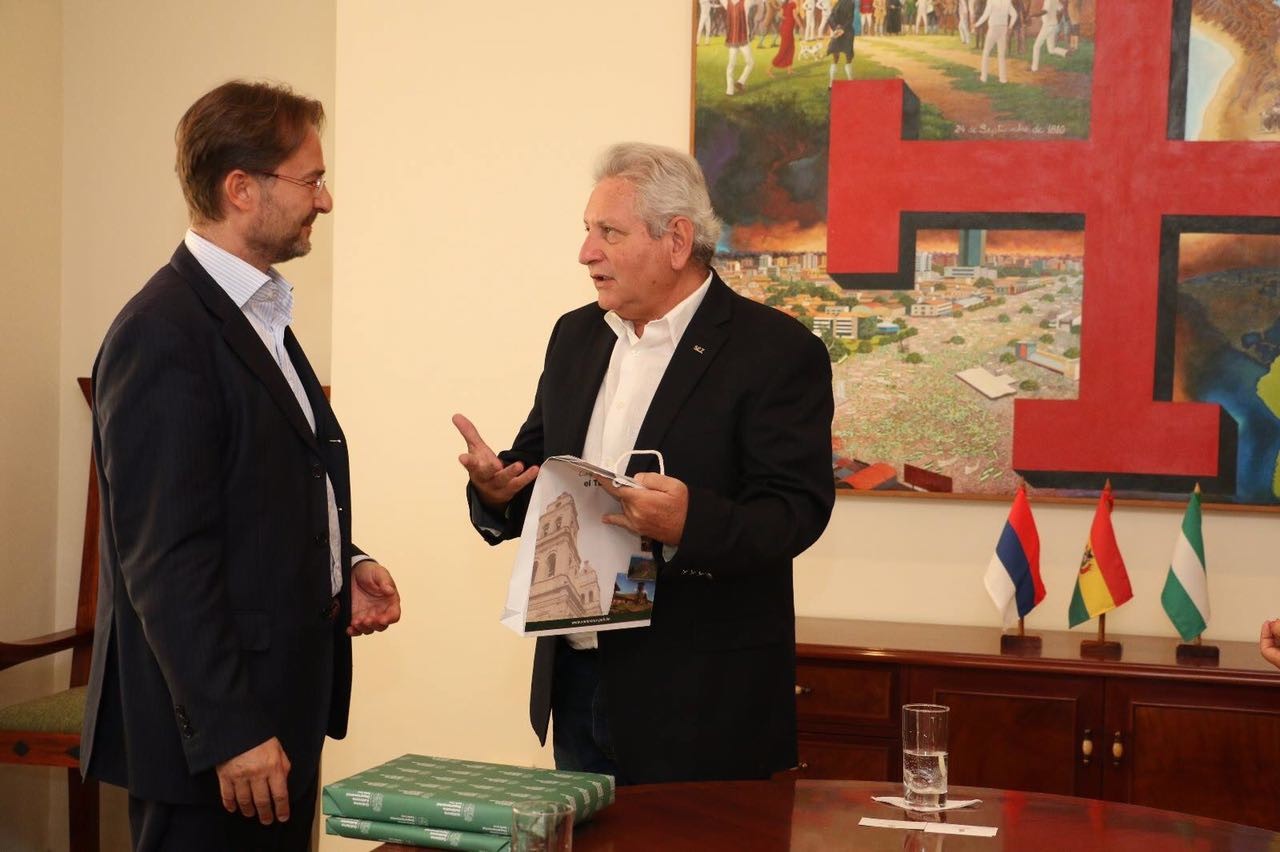 |
|
|
| Abertura da exposição em Santa Cruz “Rota dos Imperadores Romanos na Sérvia”, 07 de fevereiro de 2017 |
|
Em Santa Cruz, centro econômico da Bolívia, foi aberta oficialmente a exposição "Rota dos Imperadores Romanos na Sérvia", no dia 07 de fevereiro de 2017, no Centro Cultural Plurinacional. A cerimônia contou com a presença de representantes de instituições locais, membros do corpo consular, jornalistas, bem como de numerosas personalidades da vida cultural, artística e acadêmica.
Na abertura desta renomada exposição, discursaram aos presentes o diretor do Centro Cultural, Guiomar Zambrana, o embaixador Veljko Lazic e representantes do Parque Arqueológico “Viminacium”.
A exposição atraiu grande interesse da mídia boliviana, e muitos visitantes tiveram a oportunidade de se familiarizar com a importância do sítio arqueológico "Viminacium" na Sérvia e com o fato de que em nosso país nasceram 18 imperadores romanos. A exposição em Santa Cruz ficará aberta ao público durante um mês, até o dia 06 de março de 2017.
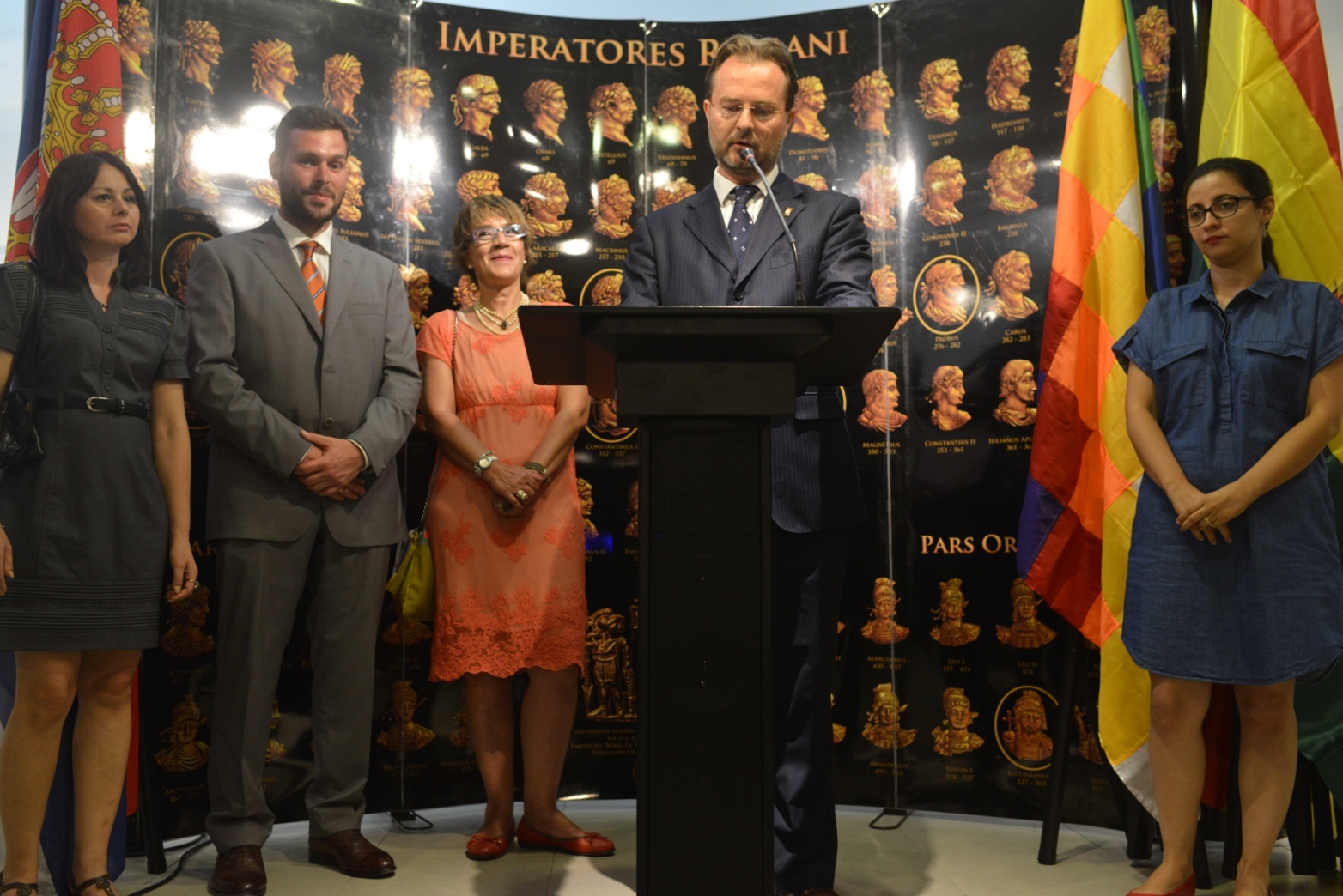
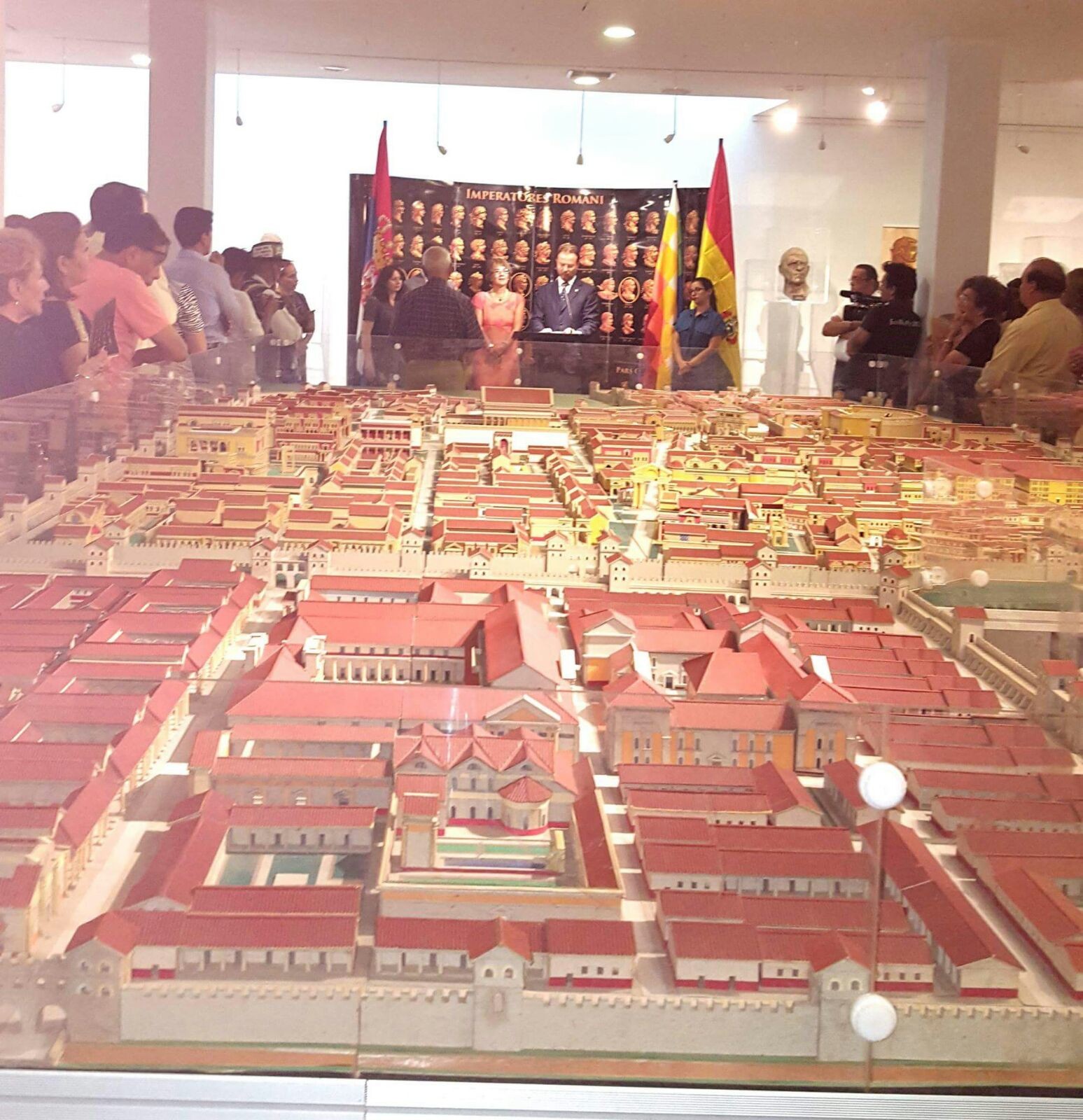 |
|
|
| Condolências |
|
A Embaixada da República da Sérvia em Brasília manifesta as suas mais profundas condolências aos cidadãos do Brasil, especialmente às famílias dos jogadores e comissão técnica do clube Chapecoense, jornalistas e membros da tripulação, que morreram no acidente aéreo ocorrido em 29 de novembro de 2016.
Neste momento extremamente difícil nós compartilhamos da dor e sofrimento daqueles que ficaram sem seus entes queridos.
Telegramas de condolências e de solidariedade aos mais altos representantes brasileiros, bem como ao povo brasileiro, foram enviadas pelos mais altos representantes da República da Sérvia.
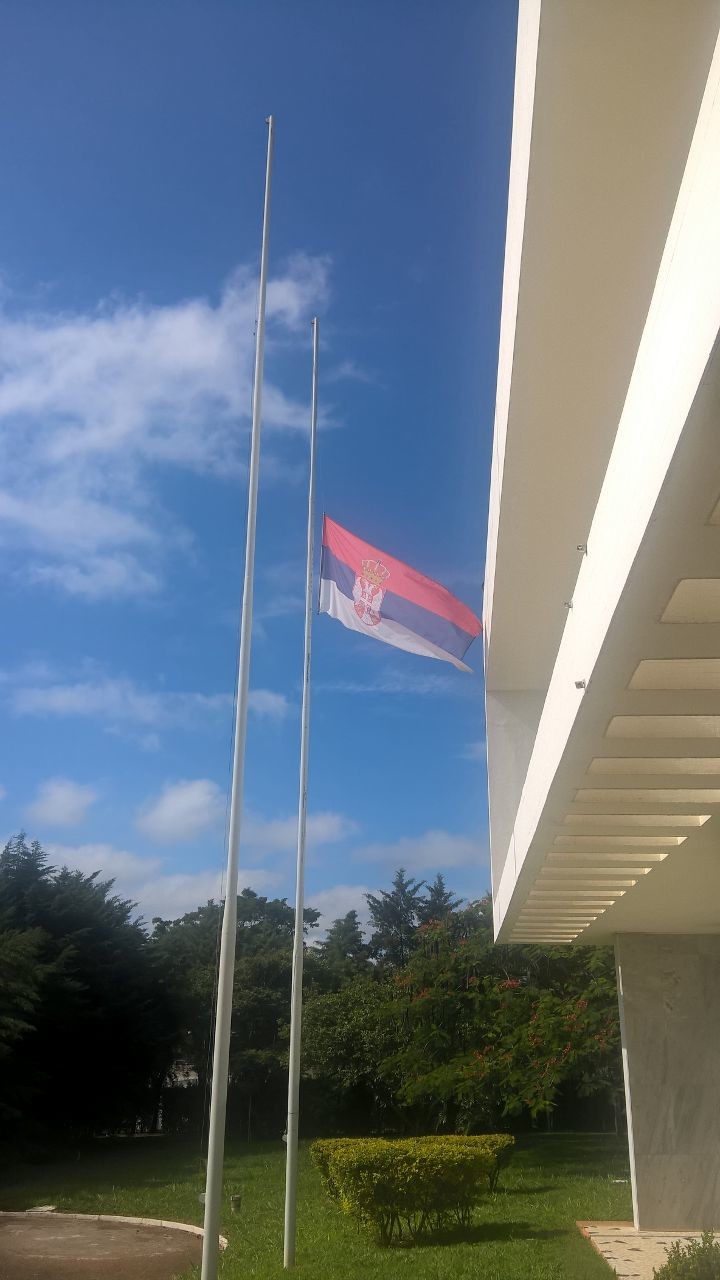 |
|
|
| Feira das Embaixadas em Brasília, 12 de novembro de 2016 |
|
A Embaixada da República da Sérvia em Brasília participou no dia 12 de novembro de 2016, na 12º Feira das Embaixadas em Brasília, que foi realizada no pavilhão de exposições no Parque da Cidade. Mais de 100 embaixadas acreditadas em Brasília participaram do evento, com o objetivo de angariar fundos para caridade.
No estande foram expostos vários produtos típicos, além de um mini livro de receitas com pratos tradicionais sérvios, filmes promocionais sobre a R. Sérvia e a venda de especialidades da nossa culinária.
Além do envolvimento do pessoal da Embaixada, expressamos agradecimentos especiais ao lendário jogador de futebol Dejan Petkovic, que doou itens de sua marca, e sua presença em nosso estande atraiu grande atenção de todos os visitantes.
A Embaixada também expressa seu agradecimento aos estudantes de doutorado da Universidade de Brasília Vanja Grujic e Stefan Trifunovic, por sua ajuda durante a preparação e realização do evento.
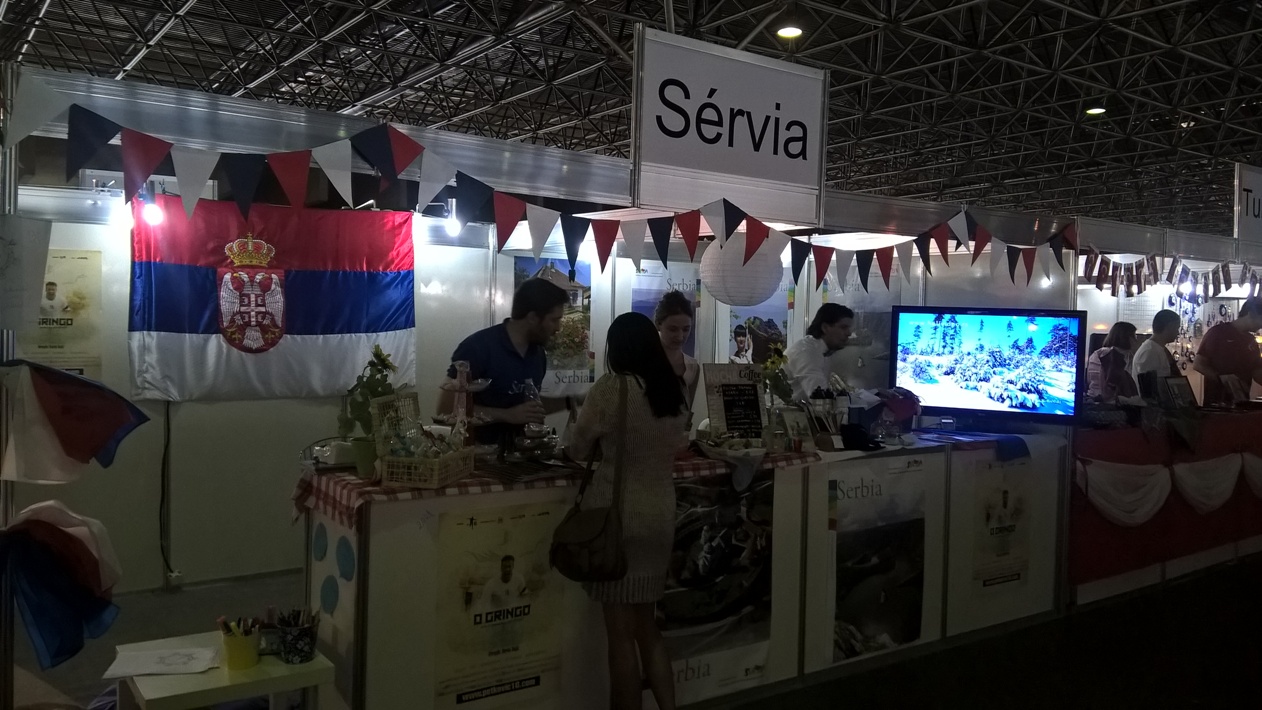
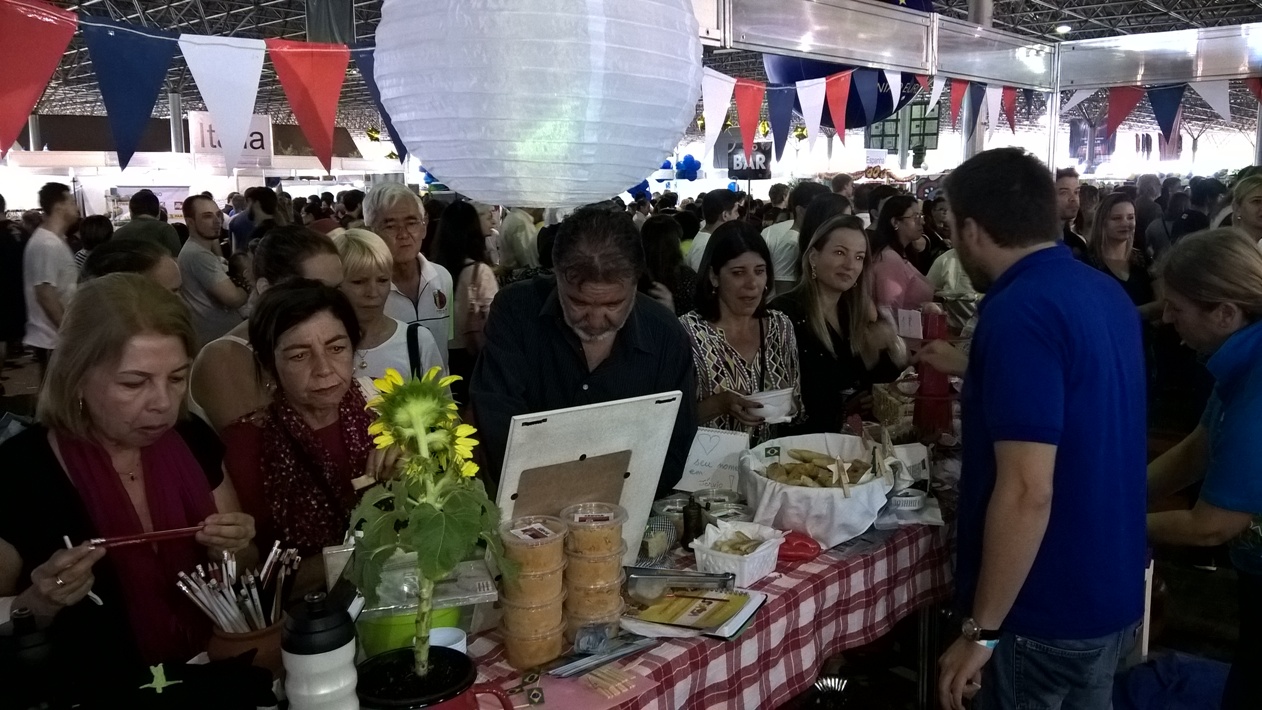
|
|
|
| 39° Congresso Internacional da Organização Internacional do Vinho e da Vinha |
|
Em Bento Gonçalves, Rio Grande do Sul, de 23 a 28 de outubro de 2016, foi realizado o 39° Congresso Internacional da Organização Internacional do Vinho e da Vinha.
Várias delegações dos Estados membros da Organização participaram. Nosso país foi representado pelo Embaixador da República da Sérvia no Brasil, Sr. Veljko Lazic.
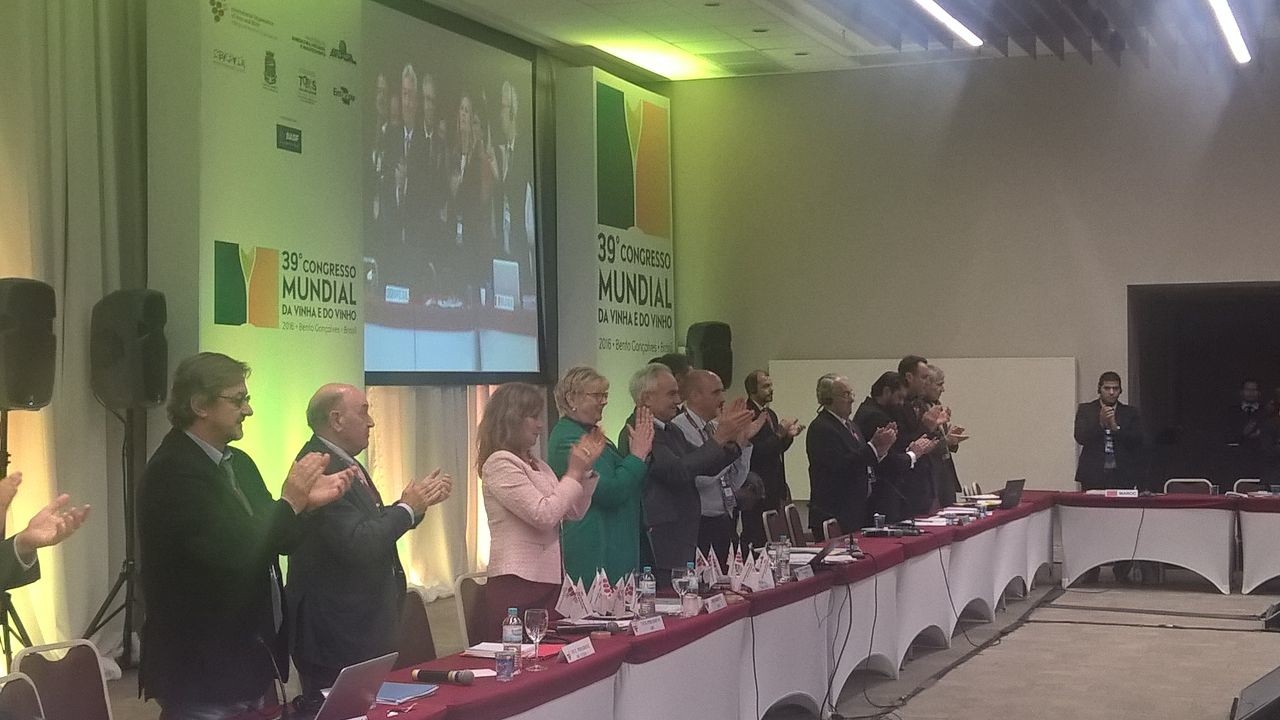 |
|
|
| Abertura da exposição em La Paz “Rota dos Imperadores Romanos na Sérvia”, 03 de outubro de 2016 |
|
A exposição “Rota dos Imperadores Romanos na Sérvia” foi aberta oficialmente em La Paz no dia 03 de outubro de 2016 no Museu do Centro Cultural San Francisco. A cerimônia contou com a participação de representantes de instituições locais, membros do corpo diplomático e jornalistas, assim como pessoas do meio público, cultural e artístico.
Por ocasião da abertura desta renomada exposição, dirigiram-se aos presentes o diretor do Museu, Jose Luis Riosm o embaixador Veljko Lazic e o Dr. M. Кorac, diretor do Instituto de Arqueologia de Belgrado.
A exposição obteve um grande interesse dos presentes, especialmente devido ao fato de que no atual território da Sérvia nasceram 18 imperadores romanos. A exposição estará aberta ao público por dois meses, até o dia 03 de dezembro de 2016.
Uma grande contribuição para o sucesso da realização da exposição e na sua promoção na mídia foi dada pela cônsul honorária da República da Sérvia em La Paz, Sra. Zana Petkovic Rodriguez.
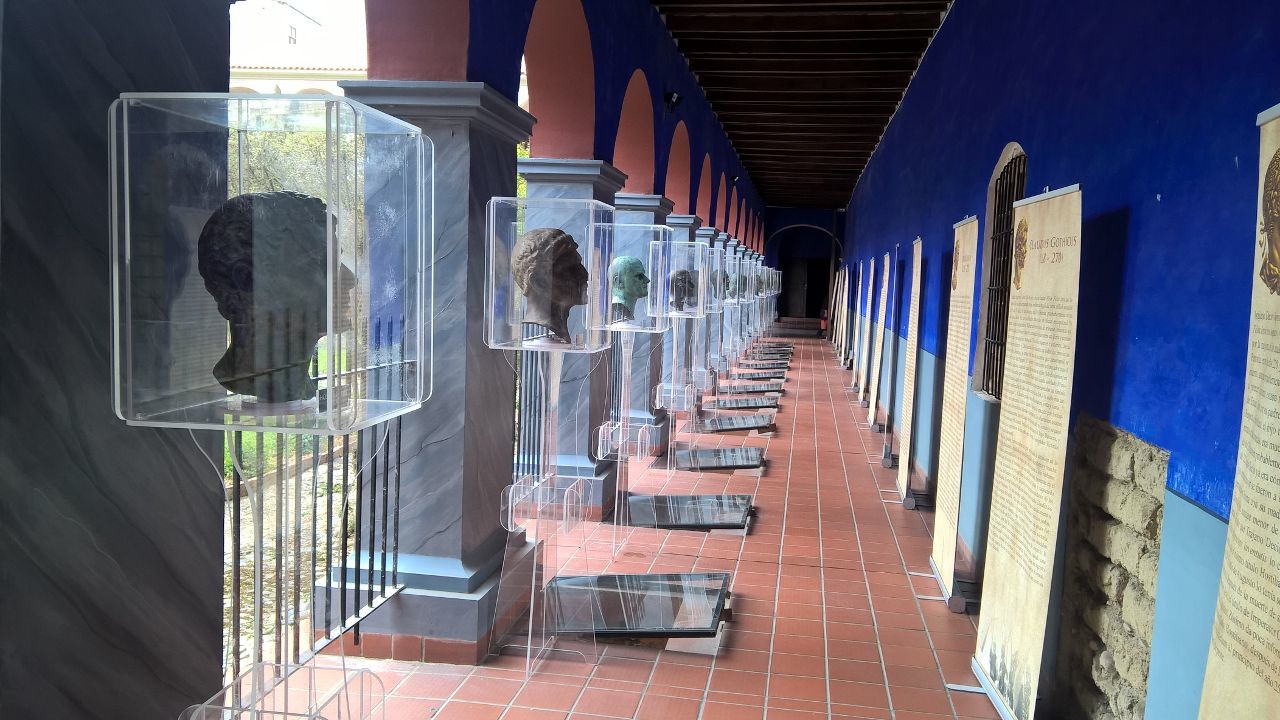 |
|
|
| Hasteamento da bandeira da República da Sérvia, nas vésperas da abertura dos Jogos Paralímpicos, Rio de Janeiro, 04 de setembro de 2016 |
|
Nas vésperas da abertura dos Jogos Paralímpicos no Rio de Janeiro, cuja realização ocorreu entre 07-18 setembro de 2016, na Vila Olímpica em 04 de setembro, com o hino nacional Deus da Justiça, foi hasteado o mastro com a bandeira da República da Sérvia. O ato cerimonial contou com a presença do Embaixador da República da Sérvia no Brasil Veljko Lazic, o Chefe da missão do Comitê Paralímpico da Sérvia no Rio, Zvonko Rot, o secretário-geral do Comitê Paralímpico da Sérvia, Bojan Acimovic, e quase todos os nossos atletas paraolímpicos que vieram ao Rio, bem como numerosos representantes de agências de mídia.
O Embaixador Veljko Lazic, acompanhado por representantes Comitê Paralímpico da Sérvia, visitou o nosso pavilhão e desejou aos atletas paralímpicos sérvios muito sucesso nos Jogos.
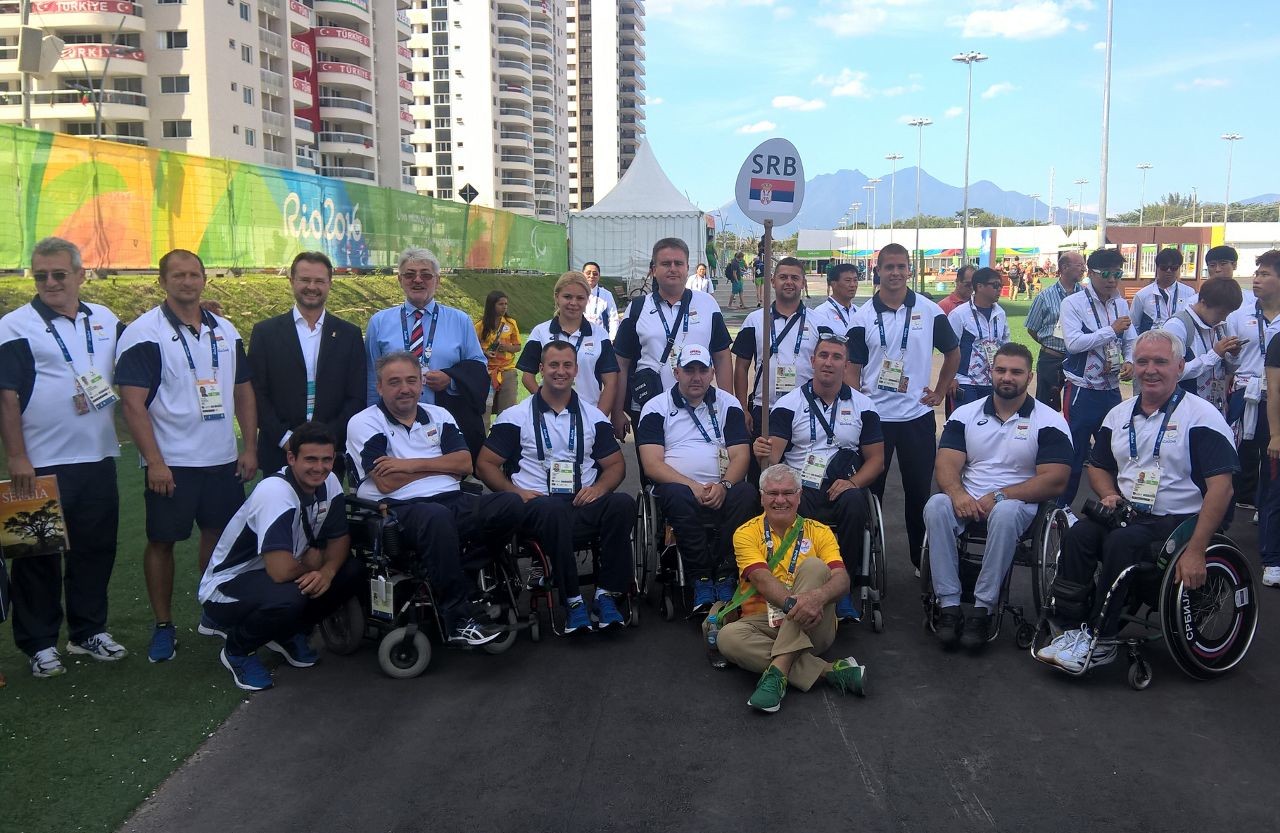 |
|
|
| Hasteamento da bandeira da República da Sérvia, nas vésperas da abertura dos 31° Jogos Olímpicos, Rio de Janeiro, 05 de agosto de 2016 |
|
Com o hino nacional Deus da Justiça sendo entoado na Vila Olímpica no Rio de Janeiro, um dia antes da abertura dos 31° Jogos Olímpicos , foi hasteado o mastro com a bandeira da República da Sérvia.
O ato cerimonial contou com a presença do Presidente da República da Sérvia, Tomislav Nikolic, e sua esposa Dragica, quase todos os nossos atletas que estão atualmente no Rio (cerca de 104), os Chefes do Comitê Olímpico da Sérvia, liderado pelo Presidente do Comitê Vlade Divac, o Embaixador da República da Sérvia no Brasil, Veljko Lazic, bem como numerosos especialistas na área do esporte e representantes das agências das mídias sérvia e estrangeireas.
O Presidente Nikolic, após a cerimônia, visitou o pavilhão onde estão alojados os atletas olímpicos sérvios e desejou-lhes todo o sucesso nos Jogos Olímpicos.
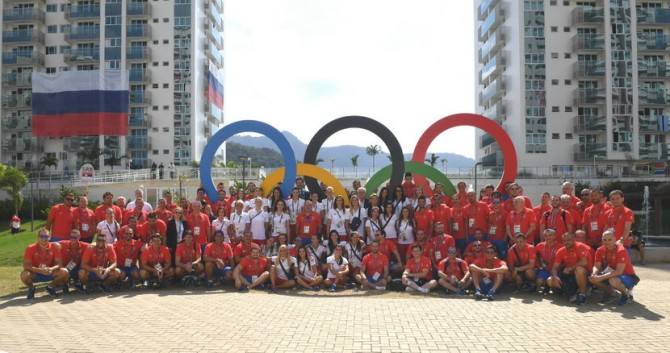 |
|
|
| Abertura da exposição em Brasília “Rota dos Imperadores Romanos na Sérvia”, 16 de fevereiro de 2016 |
|
Na Câmara Legislativa do Distrito Federal em Brasília, no dia 16 de fevereiro de 2016, foi inaugurada oficialmente a exposição "Rota dos Imperadores Romanos na Sérvia" ("Itinerarium Romanum Serbiae"), seguida por um coquetel. A cerimônia, que coincidiu com a celebração do Dia Nacional da República da Sérvia, foi prestigiada por cerca de 200 convidados - altos representantes do Ministério das Relações Exteriores do Brasil, deputados, grande número de membros do corpo diplomático, jornalistas, bem como numerosas personalidades da vida pública e cultural.
Na abertura da exposição, discursaram o representante do Conselho Curador, Sr. Teófilo Silva, o deputado distrital Wasny de Roure, o Prof. Dr. Miomir Korac, diretor do Instituto Arqueológico da República da Sérvia, o Embaixador da República da Sérvia no Brasil, Sr. Veljko Lazic, e a Presidente da Câmara Legislativa do Distrito Federal, Deputada Celina Leão.
Este evento cultural recebeu considerável publicidade na mídia e nos meios de comunicação locais.
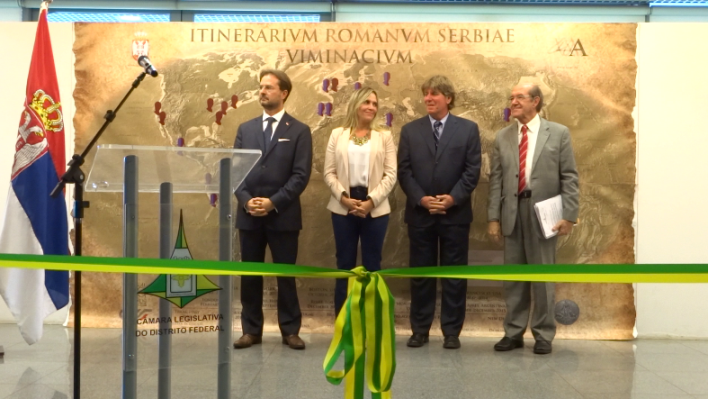
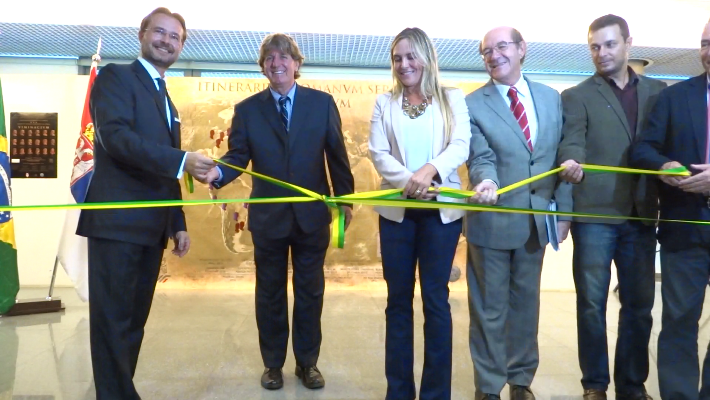 |
|
|
| Encontro do Embaixador Veljko Lazic com o Comandante-Geral do Exército do Brasil, General Vilas Boas, 16 de dezembro de 2015 |
|
O Embaixador Veljko Lazic reuniu-se com o Comandante-Geral do Exército do Brasil, General Vilas Boas, na sede do Comando Geral do Exército em 16 de dezembro de 2015.
Foi reiterado o compromisso de nosso lado com o emprenho da República da Sérvia em reforçar ainda mais a cooperação na área de defesa com o Brasil, principalmente econômico-militar. Ambas as partes concordaram que há boas perspectivas de cooperação no campo das indústrias de defesa. Nesse contexto, foram considerados projetos que possam ser de interesse mútuo.
|
|
|
| Encontro do Embaixador Veljko Lazic com a Ministra da Agricultura do Brasil, Sra. Kátia Abreu, 08.12.2015 |
|
O Embaixador Veljko Lazic reuniu-se com a Ministra da Agricultura do Brasil, Sra. Kátia Abreu, no dia 08 de dezembro de 2015.
Durante a conversa, ambas as partes manifestaram interesse em reforçar a cooperação na área da agricultura. Estima-se que nesta esfera exista uma margem considerável para a cooperação que não é aproveitada o suficiente. Além disso, o nosso lado chama a atenção pelas vantagens oferecidas pela República da Sérvia para exportação a mercados de terceiros países. Ambos concordaram em continuar as conversações sobre formas concretas de cooperação.
|
|
|
| Encontro do Embaixador V.Lazic com o Presidente da Fundação „Alexandre de Gusmão“, Embaixador Sérgio Lima, 07.12.2015 |
|
O Embaixador Veljko Lazic visitou a Fundação "Alexandre de Gusmão" no dia 7 de dezembro, 2015, a convite do seu Presidente, o Embaixador Sergio Eduardo Moreira Lima.
Durante a conversa, o Embaixador Lima apresentou as atividades desta prestigiada Fundação, que é subordinada ao Ministério das Relações Exteriores do Brasil. Ambos os lados expressaram interesse nas possíveis formas de cooperação, atividades conjuntas com o objetivo de difundir o conhecimento em matéria de política externa e da história diplomática da Sérvia e Brasil, bem como sobre questões internacionais pertinentes.
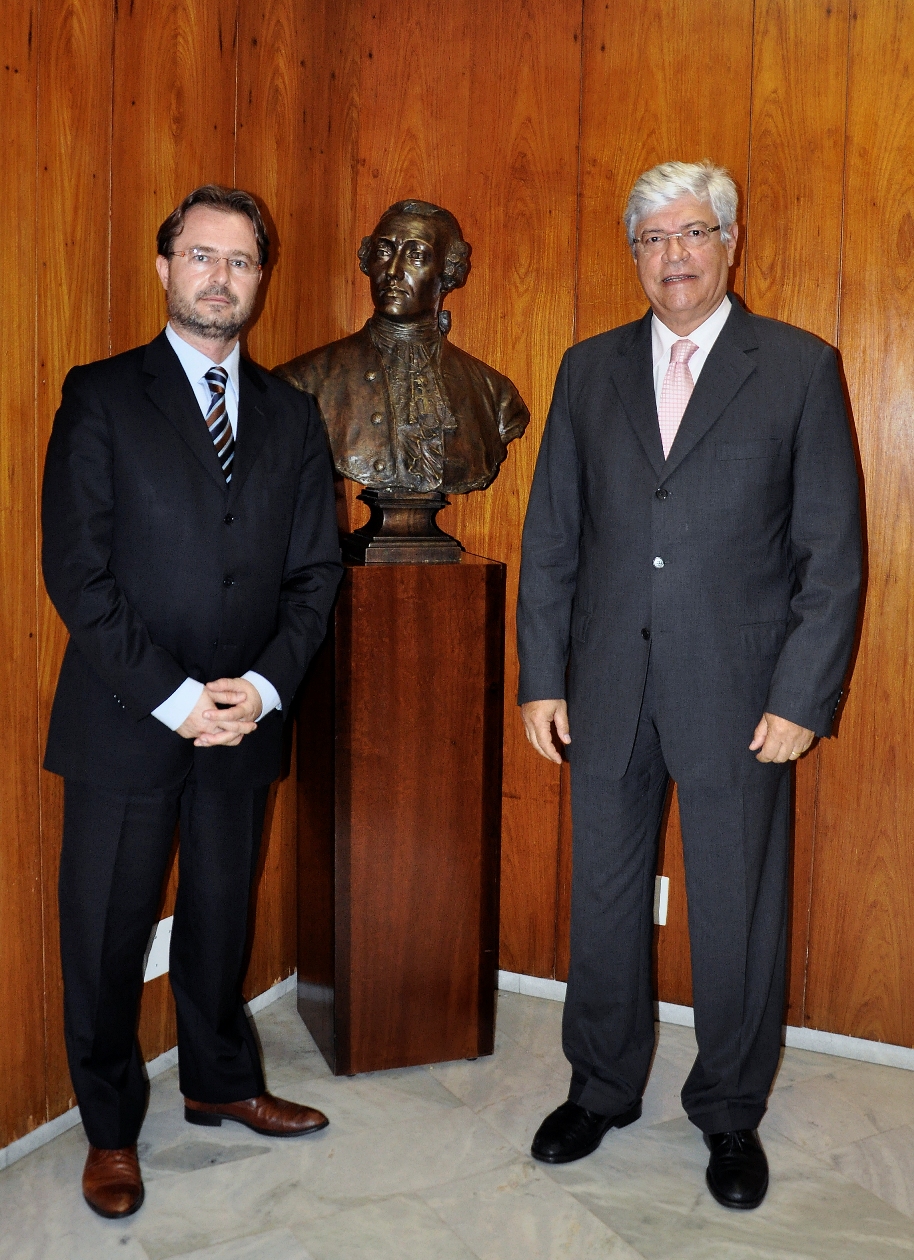
Foto do encontro doada do site da Fundação „Alexandre de Gusmão“
|
|
|
| Feira Internacional das Embaixadas, Brasília 28 de novembro de 2015 |
|
Em Brasília, no dia 28.11.2015, realizou-se a 11° Feira Internacional das Embaixadas no Estádio Nacional Mané Garrincha, cuja edição foi a mais visitada até hoje – cerca de 65.000 pessoas desfrutaram dos produtos tradicionais, gastronomia, música e dança, além de socializarem com representantes de quase 100 países.
A Embaixada da República da Sérvia participou em dois stands com artigos comemorativos, materiais informativos sobre o nosso país, sua história e cultura, bem como com produtos típicos da nossa culinária.
A feira foi inaugurada pelo governador do Distrito Federal, Sr. Rodrigo Rollemberg, e sua esposa, que é presidente honorária da Associação dos Cônjuges de Chefes de Missões Diplomáticas em Brasília, além de também ter contado com a participação do Embaixador S. Daneze como representante do Ministro das Relações Exteriores.
Todos os fundos arrecadados serão destinados à caridade, relacionados a programas sociais.
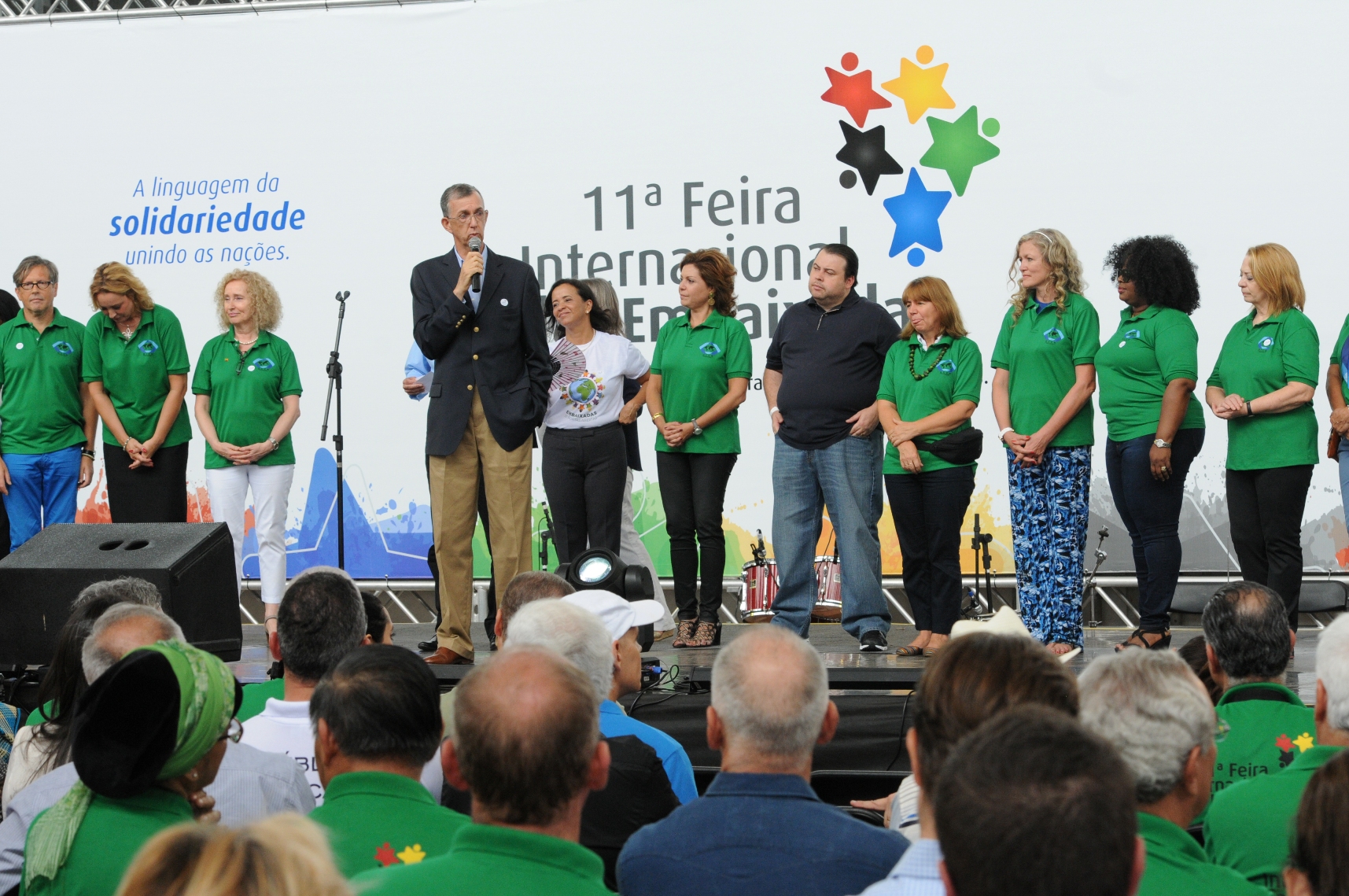
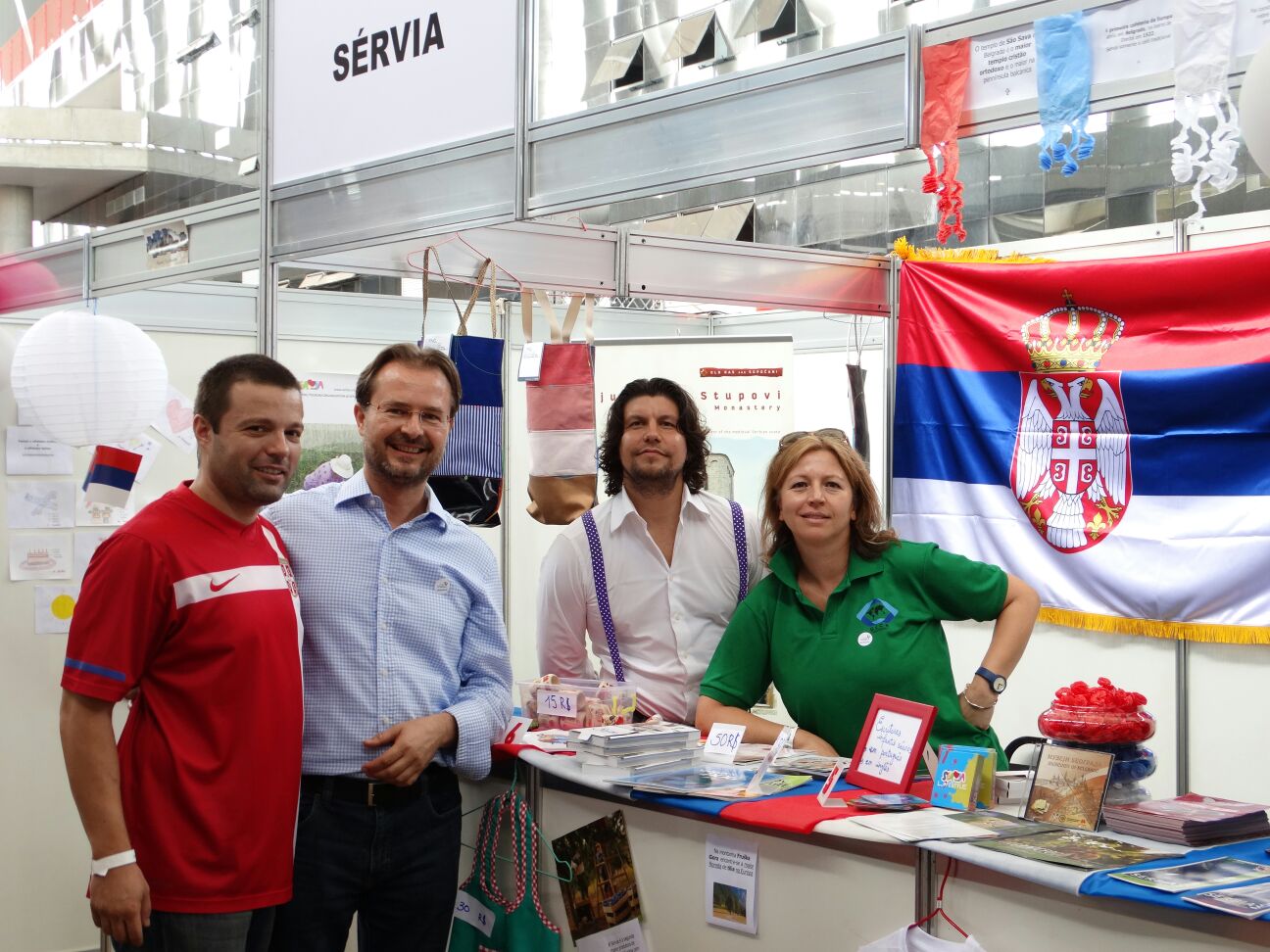
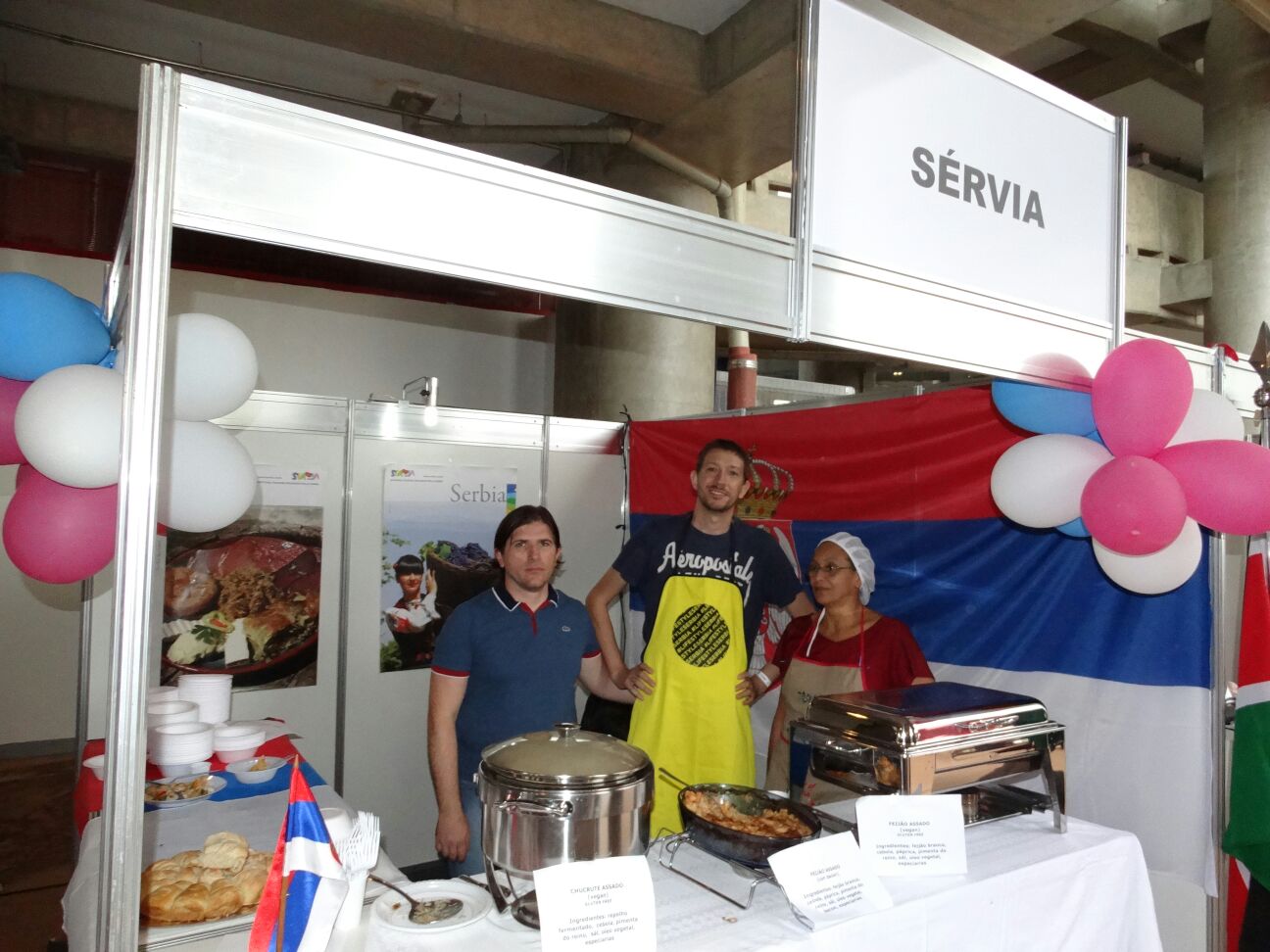 |
|
|
| Segunda Conferência Global de Alto Nível sobre Segurança no Trânsito, Brasília 18-19 de novembro de 2015 |
|
Em Brasília, nos dias 18 e 19 de novembro de 2015, foi realizada a Segunda Conferência Global de Alto Nível sobre Segurança no Trânsito (2nd Global High Level Conference on Road Safety). A Conferência contou com a presença de representantes de 130 países e integrantes da ONU (mais de 1700 participantes), cujos organizadores foram o governo do Brasil e a Organização Mundial da Saúde (OMS). A República da Sérvia foi representada pelo Embaixador no Brasil Veljko Lazic.
Após dois dias de trabalho foi acordado o texto final da “Brasília Declaration”, que foi aprovado por aclamação por todos os delegados presentes. Este documento, dentre outros tópicos, prevê o incremento de esforços para a implementação de planos nacionais e a adoção de uma legislação abrangente de acordo com o Plano Global do períod0 2011-2020.
O texto da declaração pode ser baixado no link:
http://www.who.int/violence_injury_prevention/road_traffic/Final_Brasilia_declaration_EN.pdf?ua=1
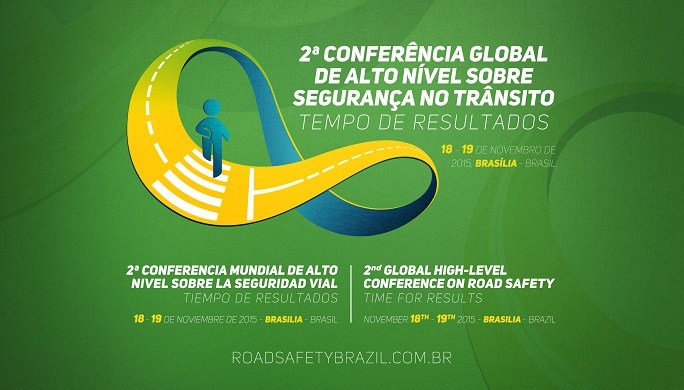 |
|
|
| Seleção nacional de handebol da Sérvia em Brasília, 27-29.11.2015 |
|
A seleção nacional feminina de handebol da República da Sérvia foi recebida em Brasília, onde jogou um amistoso com a seleção do Brasil em 29/11/2015. Foi uma espécie de reedição da final da Copa do Mundo realizada no nosso país em 2013, quando nossa seleção ganhou a medalha de prata. A partida foi a última realizada como preparação das duas equipes antes da Copa do Mundo, que será realizada na Dinamarca a partir de 04/12/2015.
O Embaixador Veljko Lazic e o Primeiro Conselheiro Dragan Vujnovic assistiram ao jogo, apoiando nossas jogadoras e desejando-lhes boa sorte para alcançar bons resultados na Dinamarca.
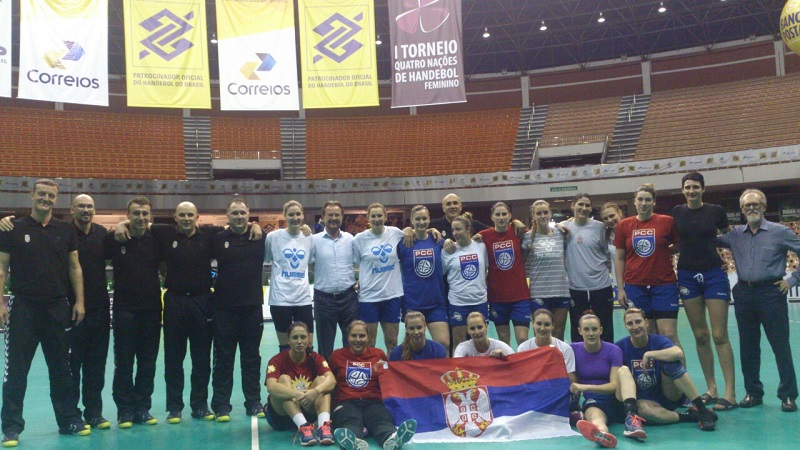 |
|
|
| Entrevista do Embaixador Veljko Lazic à edição de novembro do periódico boliviana “Datos” |
|
De acordo com as atividades de apresentação dos nossos pontos de vista, na edição de novembro do respeitável periódico boliviano “Datos”, foi publicada uma entrevista do Embaixador Veljko Lazic intitulada “O inaceitável pedido de adesão do chamado Kosovo à UNESCO”.
O texto analisa os pontos de vista da República da Sérvia, alerta para a vulnerabilidade do patrimônio cultural, histórico e religioso sérvio e indica as verdadeiras intenções de Prístina destinadas exclusivamente à promoção de “soberania”, e não um compromisso com os princípios e valores da UNESCO.
A entrevista pode ser baixada no seguinte link:
http://www.datos-bo.com/Mundo/Analisis/Es-inadmisible-la-solicitud-de-admisin-del-llamado-Kosovo-a-la-Unesco
|
|
|
| Feira Internacional das Embaixadas, 28 de novembro de 2015 em Brasília |
|
Em Brasília será realizada a 11° Feira Internacional das Embaixadas, que ocorrerá no dia 28 de novembro de 2015 no Estádio Nacional “Mané Garrincha”, a partir de 09:00h às 18:00h, que contará com a participação da Embaixada da República da Sérvia.
Esta será uma oportunidade única para os visitantes interessados (esperam-se cerca de 25.000), onde estarão reunidos em um só lugar, a cultura, as tradições, música, história, culinária e belezas naturais dos países que irão participar.
Nós convidamos a todos os interessados a juntarem-se a nós.
A receita total arrecadada no evento será destinada à caridade.
http://www.feiradasembaixadas.com.br/
https://www.facebook.com/FeiraDasEmbaixadas |
|
|
| Entrevista do Embaixador Veljko Lazic ao „Jornal do Brasil“ |
|
No site do „Jornal do Brasil“, na seção internacional, foi publicada uma extensa entrevista com o Embaixador Veljko Lazic intitulada "O Embaixador da Sérvia no Brasil comenta sobre o pedido de adesão de Kosovo à UNESCO ".
No texto foram apresentadas as posições da Sérvia sobre a inaceitabilidade desse pedido e da sua base jurídica infundada, bem como sobre as reais intenções de Pristina, que não refletem o compromisso com os princípios e valores da UNESCO, e sim buscam apenas desta forma promover sua „soberania“.
A entrevista pode ser baixada no seguinte link:
http://www.jb.com.br/internacional/noticias/2015/10/07/embaixador-da-servia-no-brasil-comenta-pedido-de-adesao-do-kosovo-a-unesco/
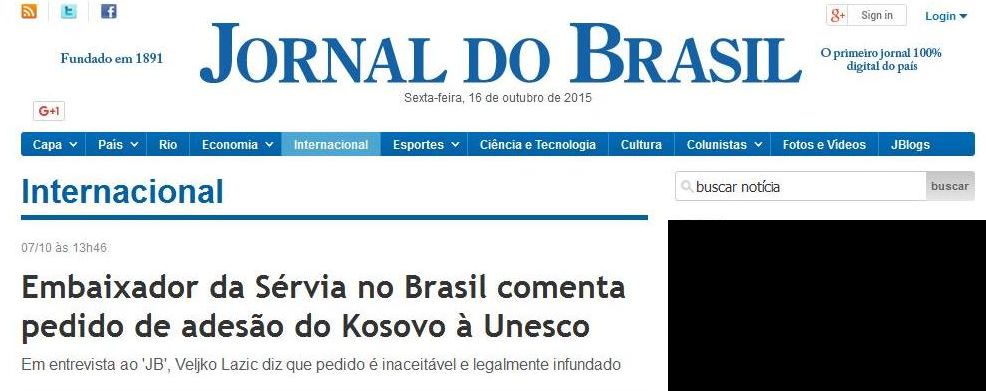
|
|
|
| Apresentação das cartas credenciais originais do Embaixador da Sérvia, Sr. Veljko Lazic, ao Vice-Presidente do Equador, Quito, 28 de setembro de 2015 |
|
Em uma cerimônia realizada no Palácio Presidencial, o Embaixador Extraordinário e Plenipotenciário da República da Sérvia, Sr. Veljko Lazic, apresentou as cartas credenciais originais ao Vice-Presidente da República do Equador, Sr. Jorge Glas, em 28 de setembro de 2015.
Em uma breve conversa, o Vice-Presidente Jorge Glas e o Embaixador Veljko Lazic expressaram sua vontade mútua para que ambos os países fortaleçam todas as formas de cooperação bilateral.
Nessa ocasião mais sete Embaixadores apresentaram suas credenciais como Embaixadores não residentes em uma cerimônia organizada de maneira coletiva.
O Embaixador Veljko Lazic está credenciado junto à República do Equador como não residente, com sede em Brasília.
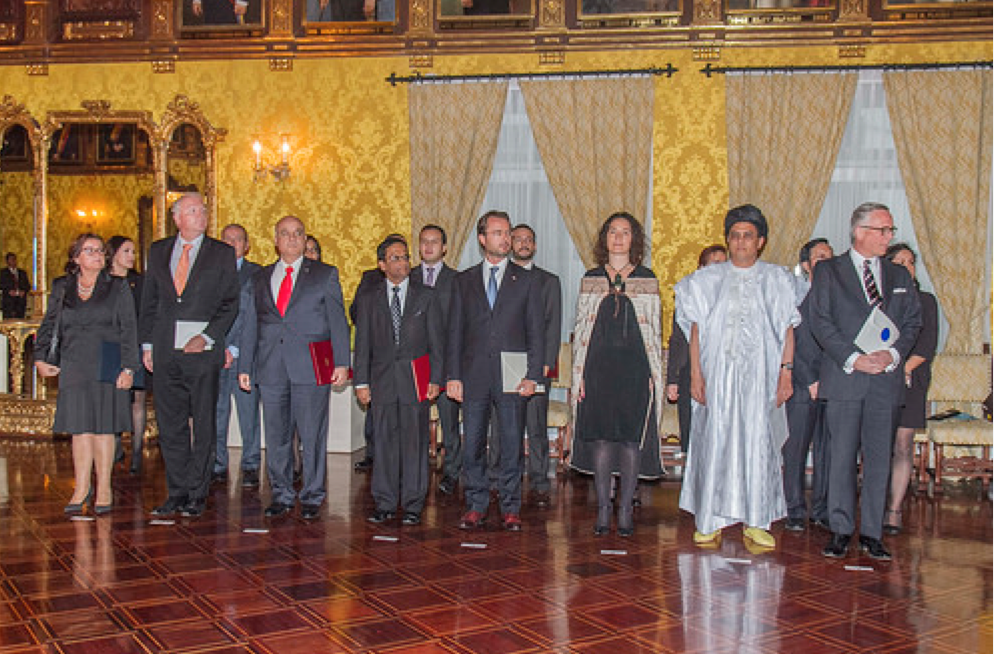
Foto - Embaixadores da Islândia, Mauritânia, Nova Zelândia, Sérvia, Sri Lanka, Jordânia, Países Baixos e UE (da direita para a esquerda)
|
|
|
| Apresentação das cópias das cartas credenciais do Embaixador da Sérvia, Sr. Veljko Lazic, ao Vice-Ministro de Relações Exteriores do Equador, Quito, 28 de setembro de 2015 |
|
O Embaixador Extraordinário e Plenipotenciário da República da Sérvia, Sr. Veljko Lazic, apresentou as copías de suas cartas credenciais ao Vice-Ministro da República do Equador, Sr. Lautaro Pozo, em 28 de setembro de 2015.
Nesta ocasião, em uma conversa, concluiu-se que as relações bilaterais entre os dois países são muito boas, e que há ainda muito espaço para seu fortalecimento, especialmente no campo da cooperação econômica.
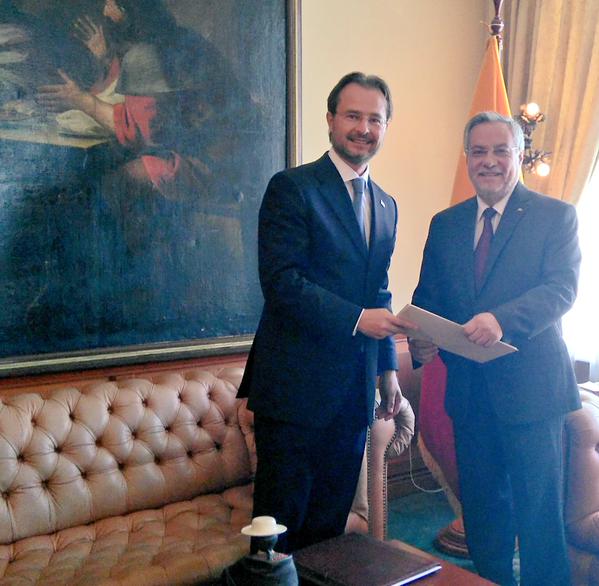
Foto: O Vice-Ministro do Equador Lautaro Pozo e o Embaixador Veljko Lazic |
|
|
| Visita da Delegação da Indústria de Defesa da Sérvia ao Brasil, 19-23 de setembro de 2015 |
|
A Delegação da Indústria de Defesa da Sérvia, liderada por representantes da ''Јugoimport-SDPR'', esteve em visita ao Brasil entre 19 e 23 de setembro de 2015, onde teve substanciais e abrangentes conversações em Brasília e no Rio de Janeiro com parceiros significativos. Os lados sérvio e brasileiro conheceram em detalhes suas oportunidades e projetos que estão em andamento. As duas partes concordaram que a cooperação econômico-militar entre ambos os países, que foi especialmente fortalecida neste ano, possui boas perspectivas num futuro a longo prazo, bem como foi acertado que ela será concretizada em breve.
A ''Jugoimport-SDPR'' e a companhia ''Condor'' assinaram no Rio de Janeiro um Acordo de cooperação técnica.
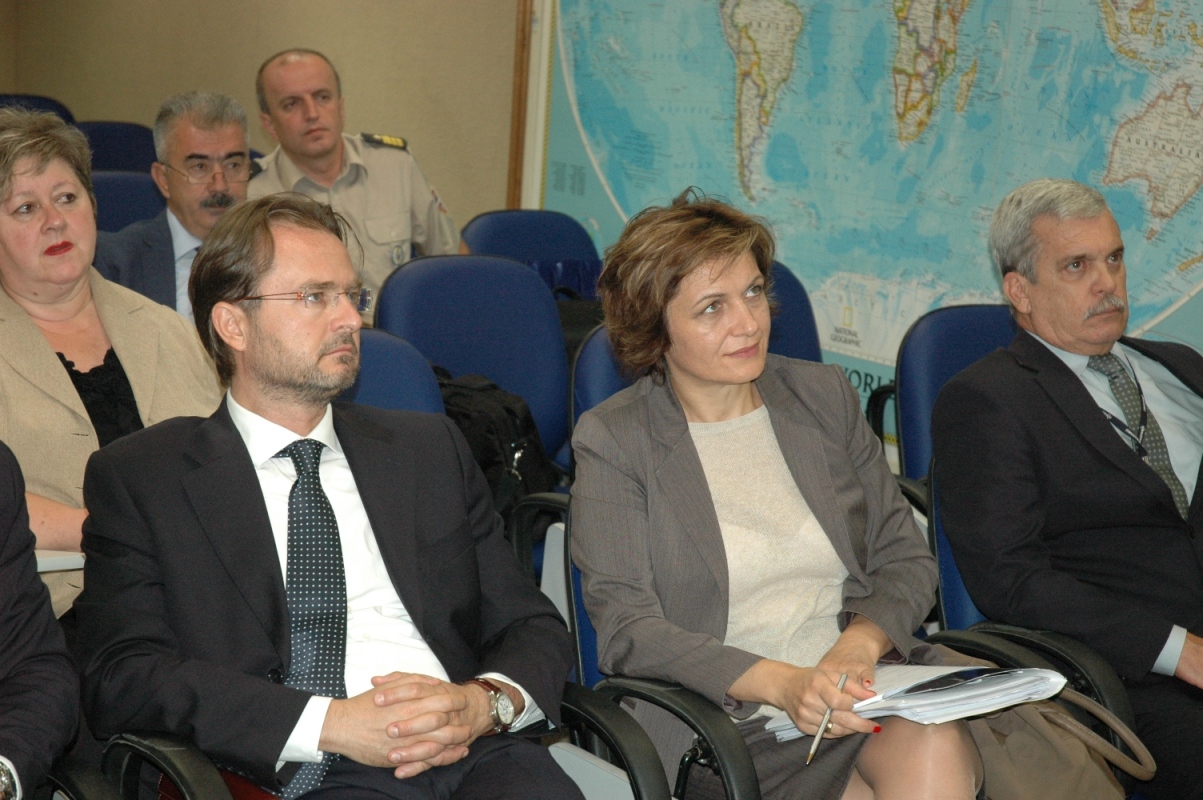
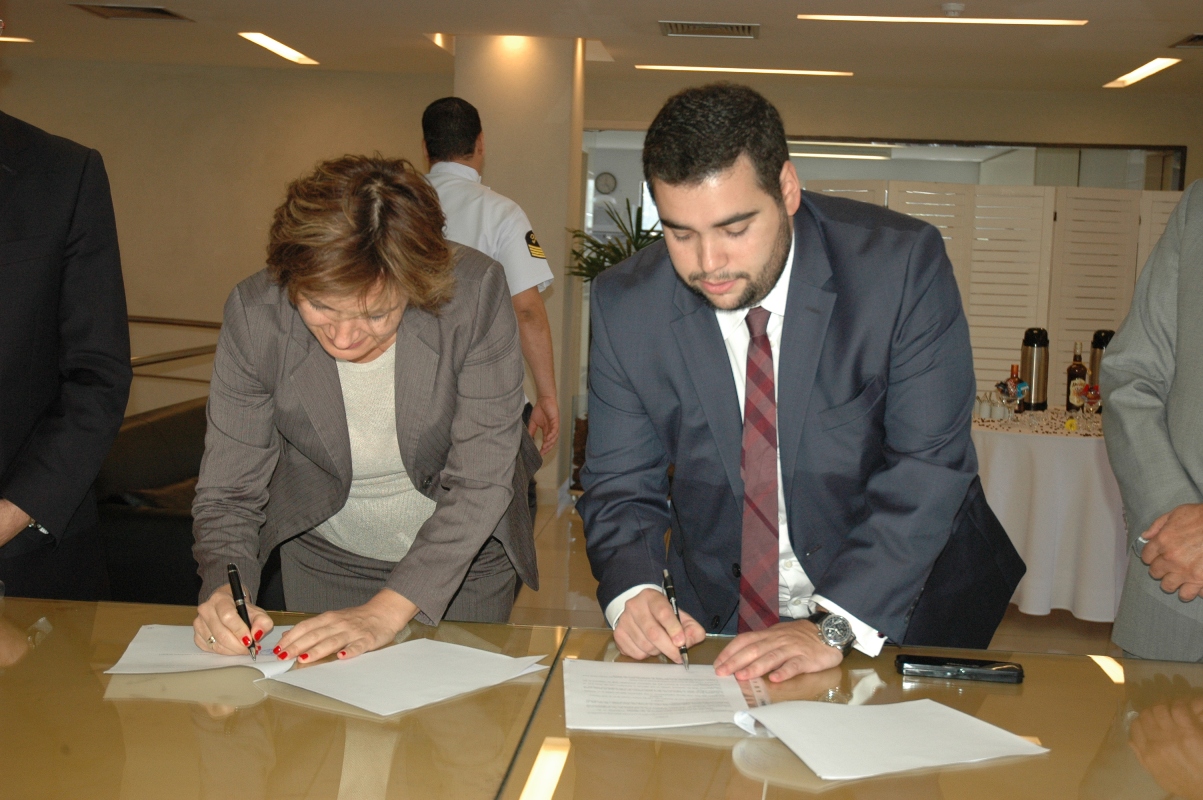
|
|
|
| Entrevista do Embaixador Veljko Lazic para a "UnB TV" |
|
O Embaixador deu uma entrevista de meia-hora ao Professor A. Procópio para a rede de TV da Universidade de Brasília "UnB TV", no programa "Vozes Diplomáticas". Este programa destina-se ao público acadêmico e também é visto pelo corpo diplomático.
A conversa incluiu um breve relato da história da Iugoslávia e da sua dissolução para o momento atual, da trajetória européia seguida pela Sérvia. Também foi comentada a mais recente onda de migrantes que cruzam a Sérvia, assim como o atual estado das relações bilaterais entre a Sérvia e o Brasil. Uma parte especial da entrevista foi dedicada ao pedido indeviso de "Kosovo" para se tornar membro da UNESCO e o perigo que isso representaria ao patrimônio cultural, histórico e religioso sérvio em Kosovo e Metohija.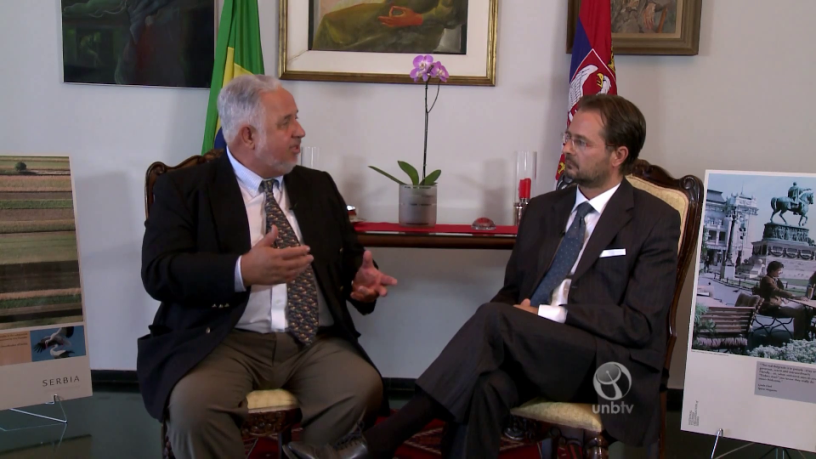
|
|
|
| Palestra do Embaixador Veljko Lazic a alunos da Escola Internacional „Escola das Nações“, 28.08.2015 |
|
Como parte da comemoração do Dia das Nações em Brasília, a convite dos organizadores, o Embaixador Veljko Lazic proferiu uma palestra para alunos da escola internacional „Escola das Nações“, dedicada à Sérvia. Após a palestra, os alunos fizeram perguntas sobre a história, as tradições, o patrimônio cultural e as especificidades da Sérvia, assim como de grandes cientistas e esportistas de origem sérvia de renome mundial.
No dia da comemoração em 12 de setembro a Sérvia foi, juntamente com a China, o Azerbaijão e a Armênia, convidada de honra especial dos organizadores, onde alunos da quarta série, vestidos com roupas tradicionais, apresentaram uma dança sérvia.
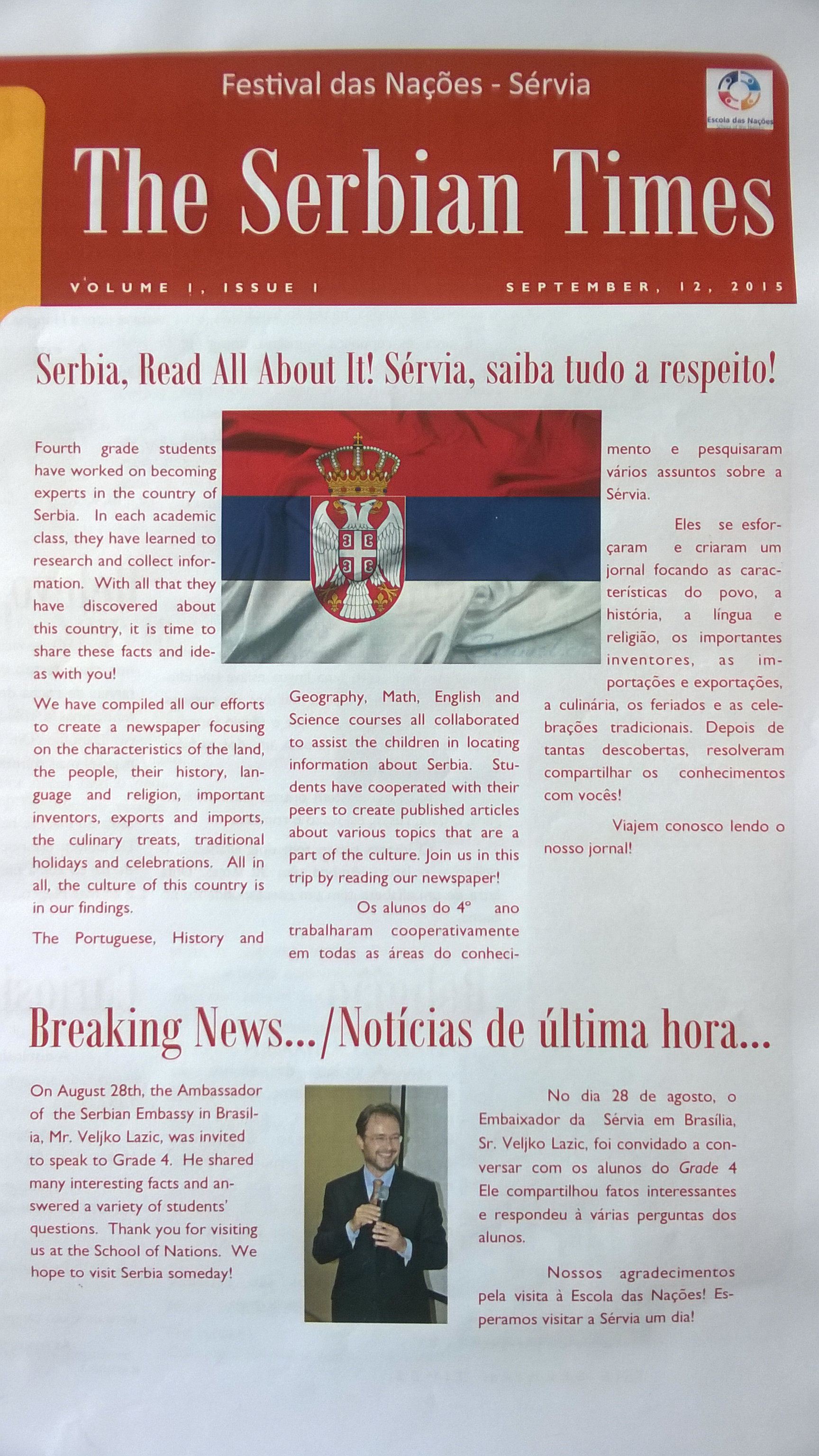
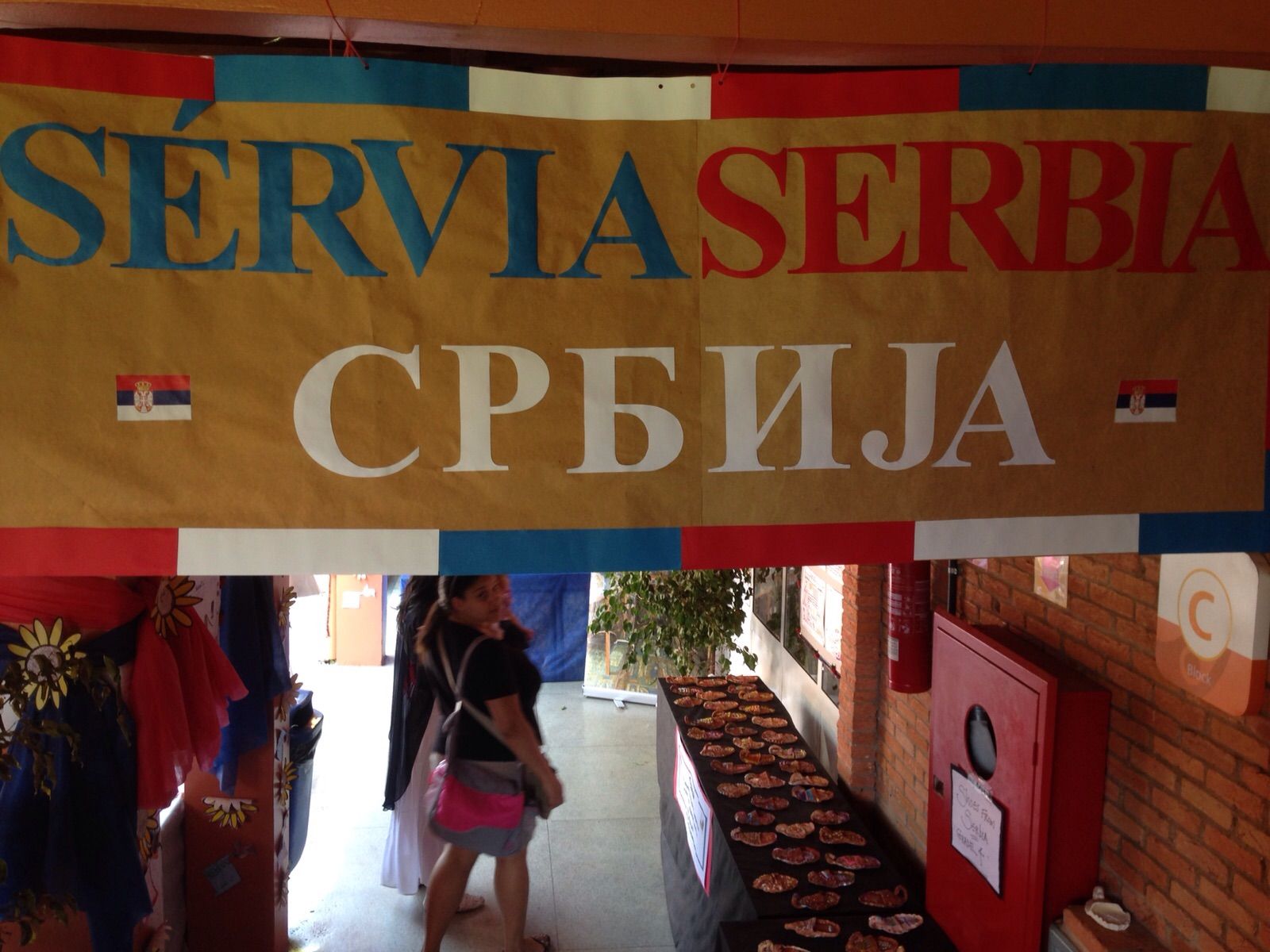 |
|
|
| Medalha de prata da Seleção de Vôlei da Sérvia na Liga Mundial, Rio de Janeiro |
|
A Seleção de vôlei da Sérvia conseguiu a medalha de prata durante a fase final da Liga Mundial, que foi realizada na cidade do Rio de Janeiro entre 15 e 19 de julho de 2015. A fase final do torneio contou, além de Sérvia, com a participação de seis das melhores seleções do mundo – Brasil, EUA, Itália, Pôlonia, e França.
O Embaixador da República da Sérvia no Brasil, Sr. Veljko Lazic, esteve presente na partida final entre a Sérvia e França e congratulou os nossos jogadores de vôlei e membros da comissão técnica.
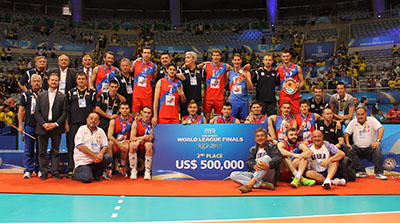
(Foto tirada do site da Federação de Vôlei da Sérvia) |
|
|
| Encontro da delegação militar-parlamentar do Brasil com o Ministro da Defesa da República da Sérvia B. Gašić, em 26 de junho de 2015 em Belgrado |
|
A delegação formada por militares e parlamentares do Brasil visitou a Sérvia por ocasião da 7ª Feira Internacional de Armamentos "Partner 2015", que foi realizada entre 23 e 26 de junho de 2015, em Belgrado. Os dez membros da delegação brasileira foram liderados pelo Chefe do Gabinete para Projetos do Exército das Forças Armadas do Brasil e representante do Ministro da Defesa, General-Brigadeiro Guy Amin Naves, bem como pelo Deputado Federal Ricardo Barros, Presidente do Grupo Parlamentar de Amizade Brasil-Sérvia no Congresso Nacional.
Durante a visita da delegação brasileira à Feira, esta reuniu-se com o Ministro da Defesa Bratislav Gašić em 26 de junho de 2015. O Ministro Gašić confirmou o compromisso da República da Sérvia em reforçar ainda mais a cooperação em matéria de defesa com o Brasil, principalmente nas áreas militar e econômica. Ambas as partes concordaram que esta visita servirá como um grande incentivo à delegação brasileira para o desenvolvimento de projetos comuns no domínio da indústria de defesa, o que contribuirá, principalmente, a próxima visita do Ministro Gašić ao Brasil em setembro deste ano.
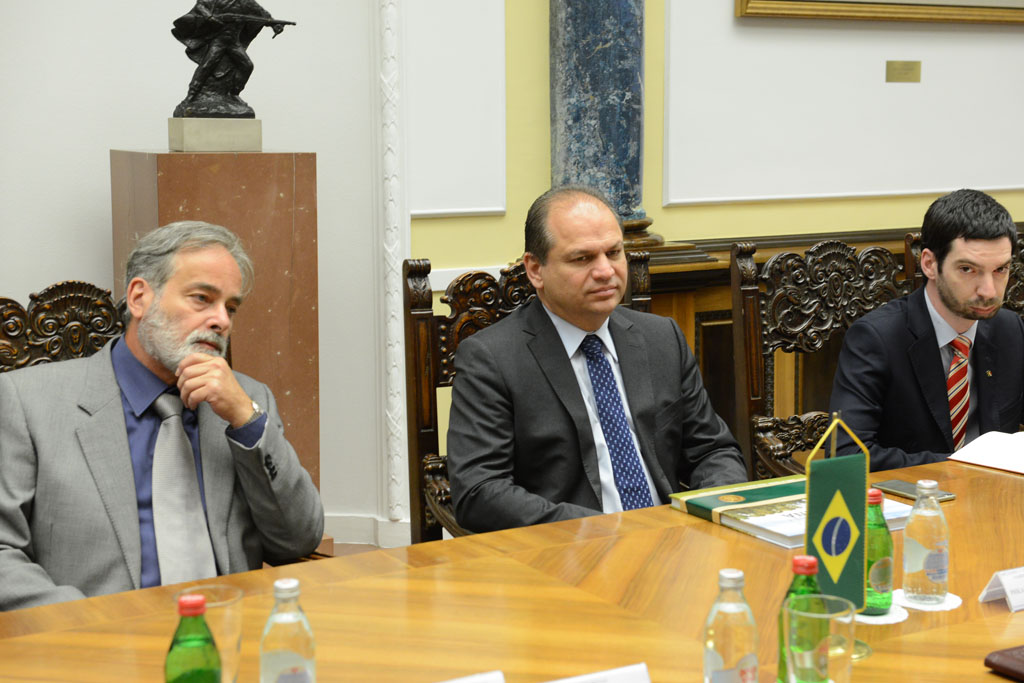
Reunião no Ministério da Defesa da República da Sérvia (baixada do site do Ministério da Defesa) |
|
|
| Decisão sobre isenção de vistos para entrada na República da Sérvia para cidadãos do Catar, Kuwait, Omã e Barein. |
|
O governo sérvio acatou a decisão sobre isenção de vistos para entrada na República da Sérvia para cidadãos do Catar, Kuwait, Omã e Barein em uma estadia de até 90 dias. Esta decisão entra em vigor a partir do dia 30.06.2015. |
|
|
| Apresentação das credenciais do Embaixador da Sérvia, Sr. Veljko Lazic, ao Presidente Evo Morales, da Bolívia, La Paz, 18 de maio de 2015 |
|
O Embaixador Extraordinário e Plenipotenciário da República da Sérvia, Sr. Veljko Lazic, apresentou suas credenciais ao Presidente do Estado Plurinacional da Bolívia, Sr. Evo Morales, em uma cerimônia solene realizada no palácio presidencial em La Paz, no dia 18 de maio de 2015.
Em uma conversa cortês com o Presidente Morales, aproveitou-se a oportunidade para tratar das ótimas relações bilaterais entre ambos os países, e que ainda há espaço para o seu aperfeiçoamento, em especial no campo da cooperação econômica.
O Embaixador Veljko Lazic está credenciado junto ao Estado Plurinacional da Bolívia como não residente, com sede em Brasília.
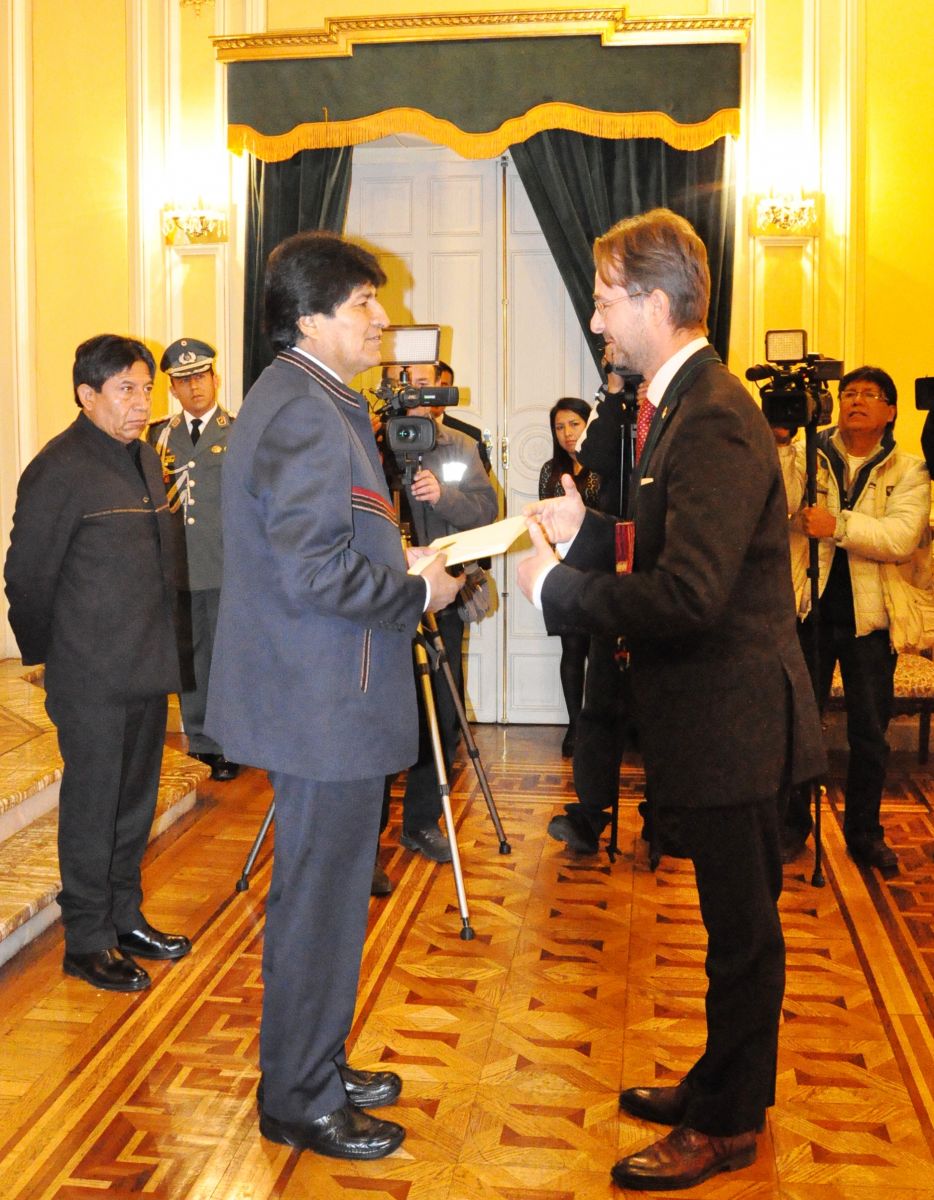
O presidente Evo Morales e o Embaixador Veljko Lazic (Foto tirada pelo MRE da Bolívia)
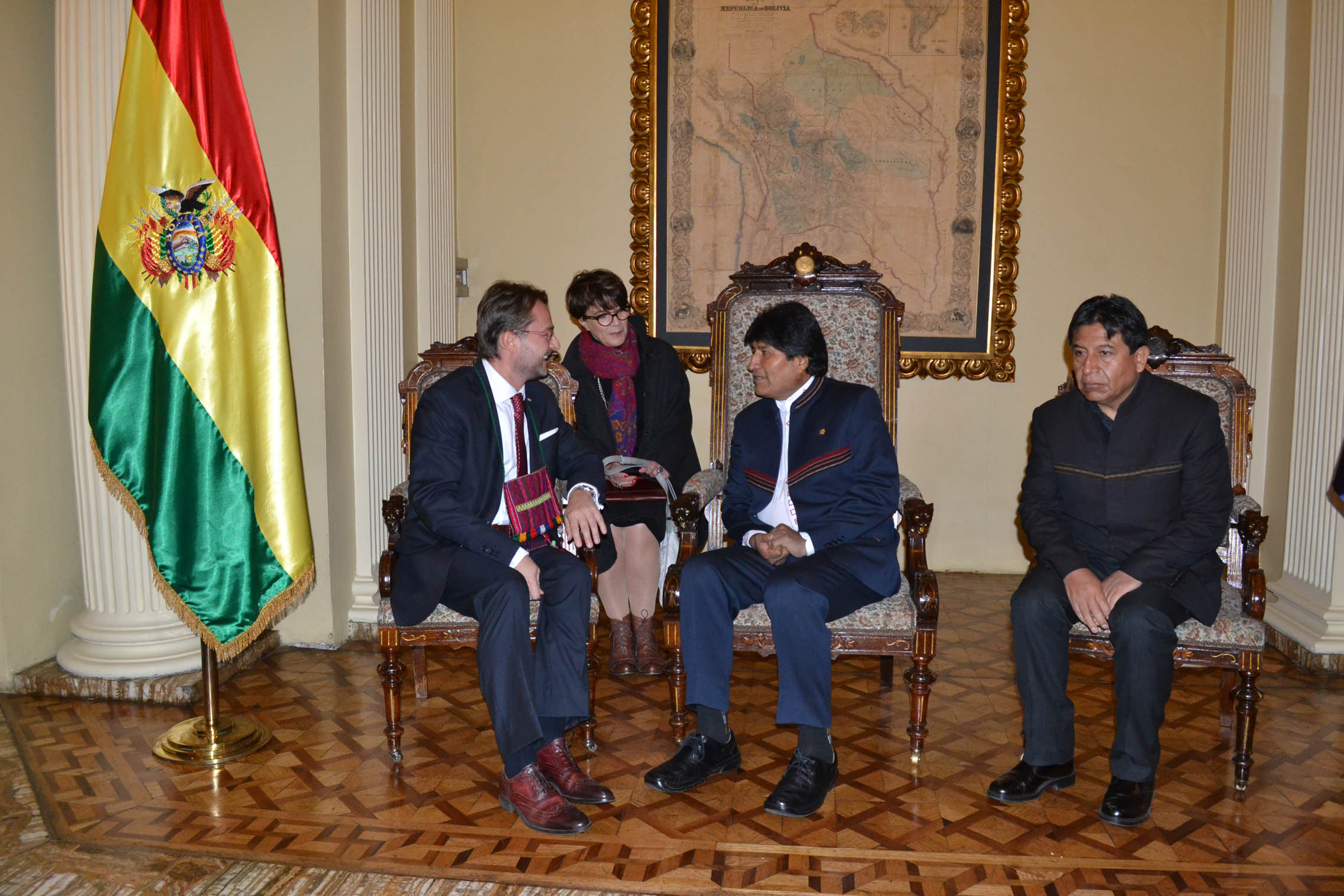
Conversa do Presidente E. Morales com o Embaixador V. Lazic, na presença do Chanceler D. Choquehuanca e a Cônsul Honorária Ž.Petković Rodriguez (Retirado do site da Presidência Estado Plurinacional da Bolívia) |
|
|
| Encontro do Embaixador Veljko Lazić com o Ministro da Defesa Brasil, Sr. Jaques Wagner, na Feira Internacional (LAAD) em 14-17. Abril de 2015 no Rio de Janeiro |
|
Na Feira Internacional de equipamentos de defesa e militar (LAAD), realizada no Rio de Janeiro em 14-17. Abril de 2015, o Embaixador Veljko Lazic reuniu-se com o Ministro da Defesa, Jaques Wagner. Neste encontro discutiu-se a possibilidade de troca de visitas a nível ministerial bem como a disponibilidade para reforçar a cooperação econômica e militar. A reunião contou com a participação de Adido de Defesa Sasa Nikolic e o representante da Jugoimport-SDPR no Brasil, Sr. Cesar. Scigliano.
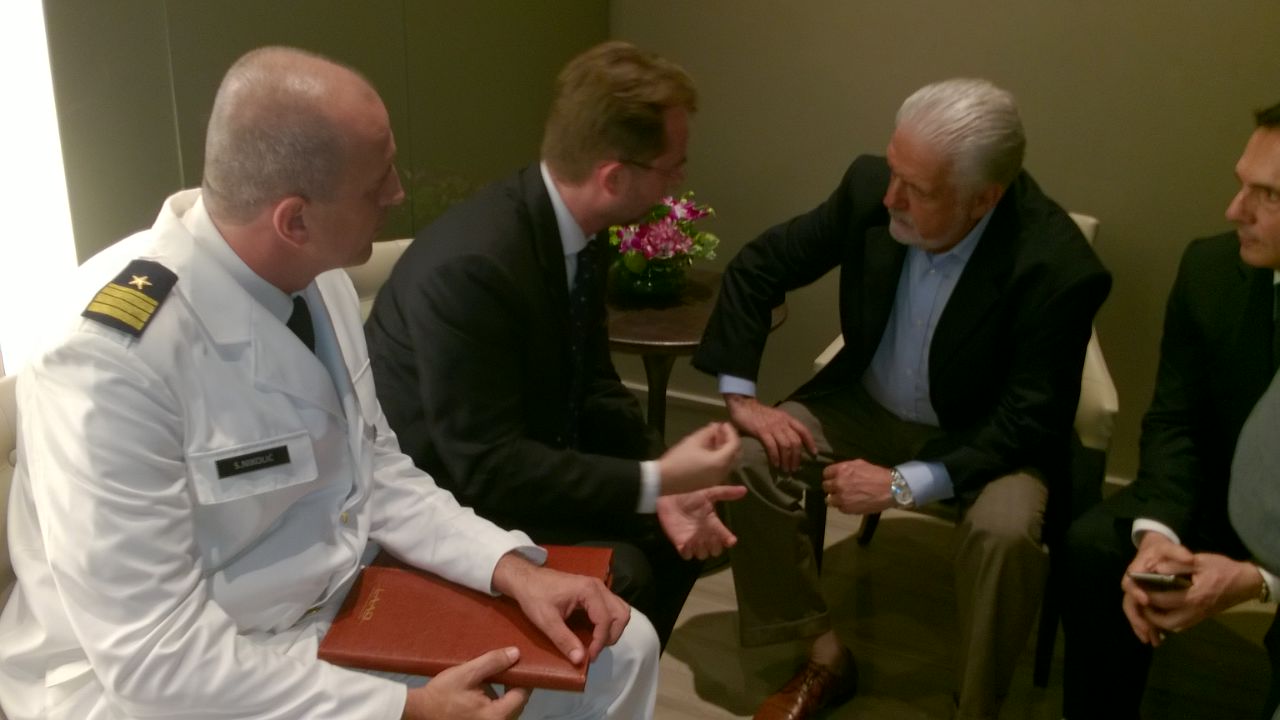
O Ministro da Defesa Jaques Wagner e o Embaixador Veljko Lazic (na presença dos representantes da Defesa Sasa Nikolic e o representante da Jugoimport-SDPR no Brasil César Scigliano) |
|
|
| Participação da República da Sérvia na Feira Internacional de defesa e equipamento militar ("LAAD 2015), 14-17. Abril de 2015 no Rio de Janeiro |
|
A Feira Internacional de defesa e equipamento militar "LAAD 2015", realizada no Rio de Janeiro entre 14 e 17 abril de 2015 reuniu mais de 600 expositores de 45 países e 158 delegações de 71 países. Foram expostos a todos os principais produtores brasileiros e estrangeiros de equipamento militar e de defesa, e os visitantes puderam conhecer os mais recentes desenvolvimentos tecnológicos nesta área.
A nossa delegação foi representada pelo Embaixador da República da Sérvia no Brasil, Sr. Veljko Lazić, e o Adido de Defesa Saša Nikolić. O evento contou com a participação de uma delegação da empresa estatal Jugoimoprt-SDPR e representantes da empresa Zastava de Kragujevac, que montaram um stand de exposição conjunta. Além de autoridades brasileiras, nosso stand foi visitado por muitas delegações estrangeiras e convidados de vários países, principalmente da África, Ásia e América Latina, com um aumento considerável no número de reuniões oficiais.
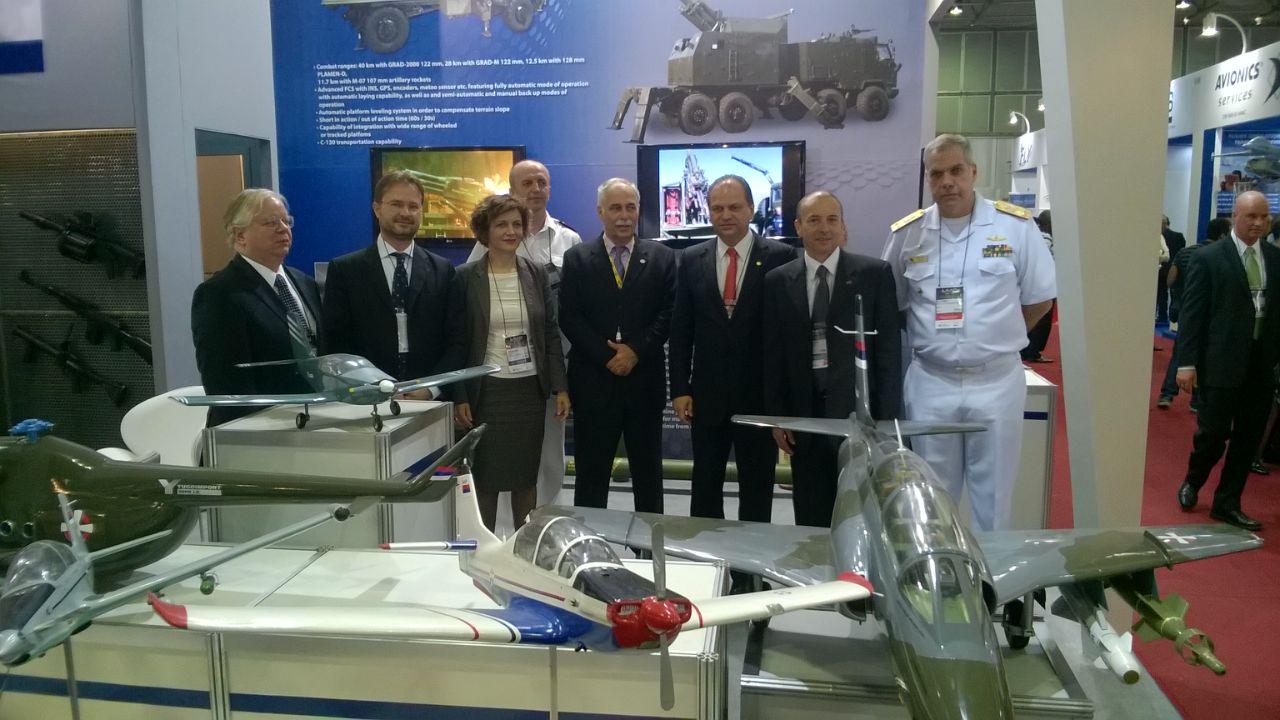
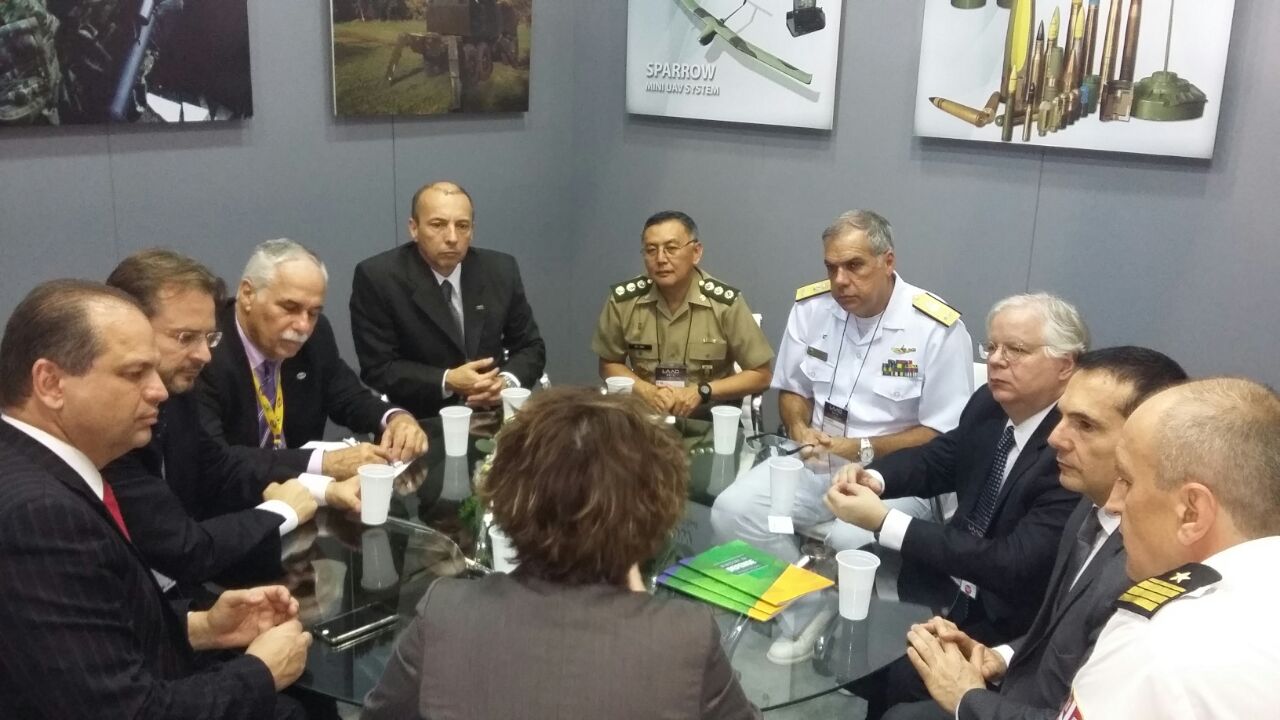 |
|
|
| Visita de delegação brasileira em Belgrado, 18-21 de fevereiro de 2015 |
|
A delegação brasileira chefiada pela Vice-governadora do estado do Paraná, Sra. Cida Borghetti, visitou Belgrado entre os dias 18 e 21 de fevereiro de 2015, por iniciativa da Embaixada da República da Sérvia em Brasília. Fizeram parte da delegação parlamentar federal o Sr. Ricardo Magalhães Barros, como Presidente do Grupo de Amizade Sérvia-Brasil no Congresso Nacional, a Deputada Estadual pelo Paraná, Sra. Maria Victoria Borgetti Barros e o Sr. Cesar Scigliano, representante da YUGOIMPORT SDPER no Brasil.
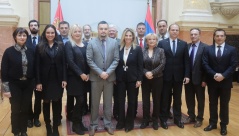
Foto - Os membros do PGP com o Brasil com a Delegação do Brasil (baixado do site da Assembléia Nacional)
Durante a visita, a delegação brasileira teve reuniões com o Chefe de Gabinete do Governo da República da Sérvia, Sr. I. Kojic, o Presidente e os membros do Grupo Parlamentar de Amizade com o Brasil na Assembléia Nacional da República da Sérvia, no Ministério da Defesa com o Secretário de Estado Z. Djordjevic e no Ministério das Relações Exteriores com a Secretária de Estado, Embaixadora R. Nincic.
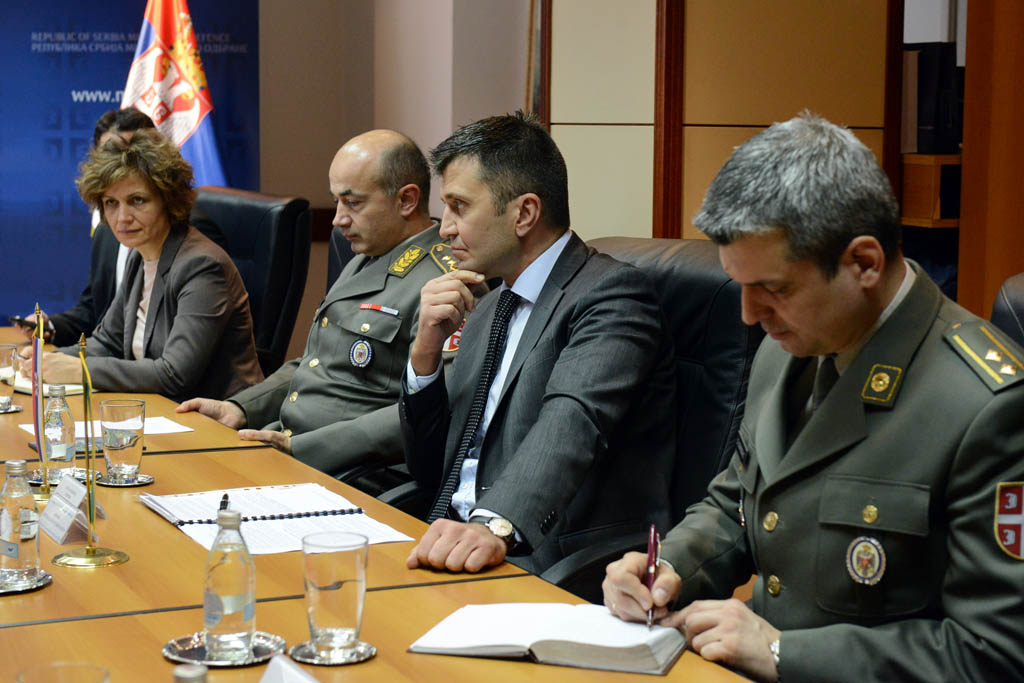
Foto - Reunião no Ministério da Defesa da República da Sérvia (baixado do site do Ministério da Defesa)
Foram discutidos também temas sobre os mais diversos aspectos sobre o fortalecimento das relações bilaterais, especialmente no domínio da cooperação militar e econômica, em que foram analisadas as possibilidades de inserção de produtos da indústria de defesa da República da Sérvia no mercado brasileiro, bem como a transferência de tecnologia e atuação conjunta em terceiros mercados.
|
|
|
| Recepção aos nossos cidadãos, 18 de dezembro de 2014 |
|
O novo Embaixador da República da Sérvia no Brasil, Sr. Veljko Lazic, preparou no dia 18 de dezembro de 2014 uma recepção para os cidadãos do nosso país que vivem em Brasília e região. Em uma atmosfera amigável os nossos compatriotas e seus familiares tiveram a oportunidade de se conhecerem melhor e partilhar suas experiências sobre a vida no Brasil. |
|
|
| Apresentação das cartas credenciais à Presidente do Brasil, Sra. Dilma Rousseff, em 10 de novembro de 2014 |
|
O novo Embaixador Extraordinário e Plenipotenciário da República da Sérvia no Brasil, Sr. Veljko Lazic, entregou os originais das cartas credenciais à Presidente do Brasil, Sra. Dilma Rousseff, em cerimônia realizada em 10 de novembro de 2014, no Palácio Presidencial do Planalto.
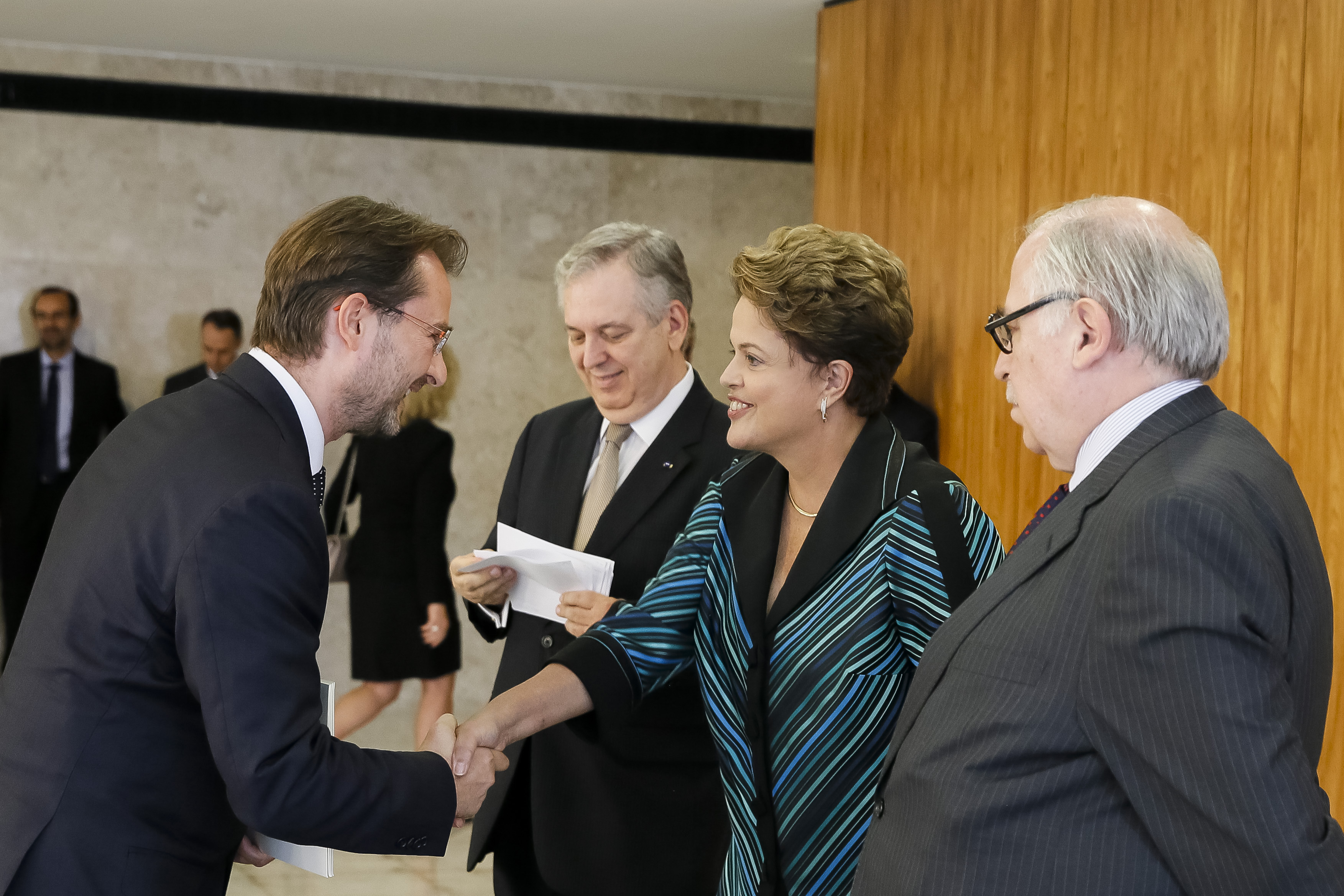
Foto - Presidente Dilma Rousseff e o Embaixador Veljko Lazic
Em uma breve conversa trocaram opiniões sobre o estado atual das relações bilaterais, o intercâmbio de visitas de alto nível e o fortalecimento da cooperação em vários campos de interesse mútuo.
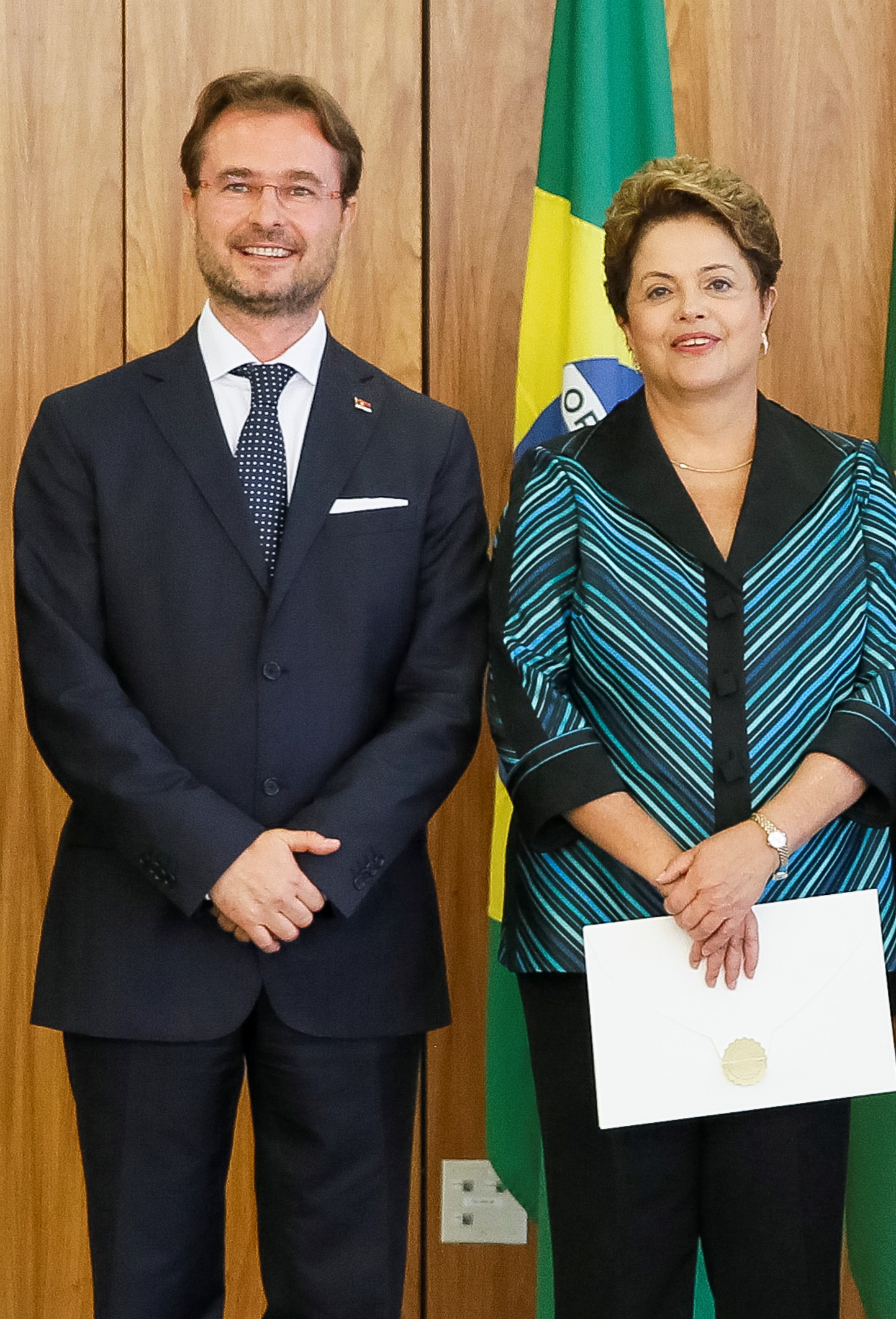
Foto - Presidente Dilma Rousseff e o Embaixador Veljko Lazic
|
|
|
| Aviso |
|
O Governo da República da Sérvia tomou uma decisão sobre a entrada na República da Sérvia, sem a necessidade de visto, para cidadãos portadores de passaportes estrangeiros com visto válido Schengen, Grã-Bretanha e outros países membros da União Européia, bem como visto válido para os Estados Unidos, por até 90 dias em um período de 06 meses.
Além disso, estão autorizados a entrarem no território da República da Sérvia sem visto os cidadãos portadores de passaportes estrangeiros que têm residência legal nos países da zona Schengen, nos países membros da União Européia e nos Estados Unidos, por até 90 dias em um período de 06 meses.
Esta decisão entrou em vigor no dia 08 de novembro de 2014.
Os portadores de documentos de viagem emitidos de acordo com as convenções internacionais ( Documento de Viagem, FremlingPass/Fremden Pass ) devem possuir um visto válido para entrar na República da Sérvia, mesmo que possuam visto Schengen válido ou visto dos Estados Unidos, da Grã-Bretanha ou não. |
|
|
| Bazar Diplomático, 08 de novembro de 2014 |
|
A Embaixada da República da Sérvia em Brasília participou em 08 de novembro de 2014, do Bazar Diplomático Internacional, para o qual foram convidadas todas as embaixadas de países acreditados no Brasil, com o objetivo de arrecadar fundos para caridade. Depois de vários anos, a nossa Embaixada participou deste evento tradicional.
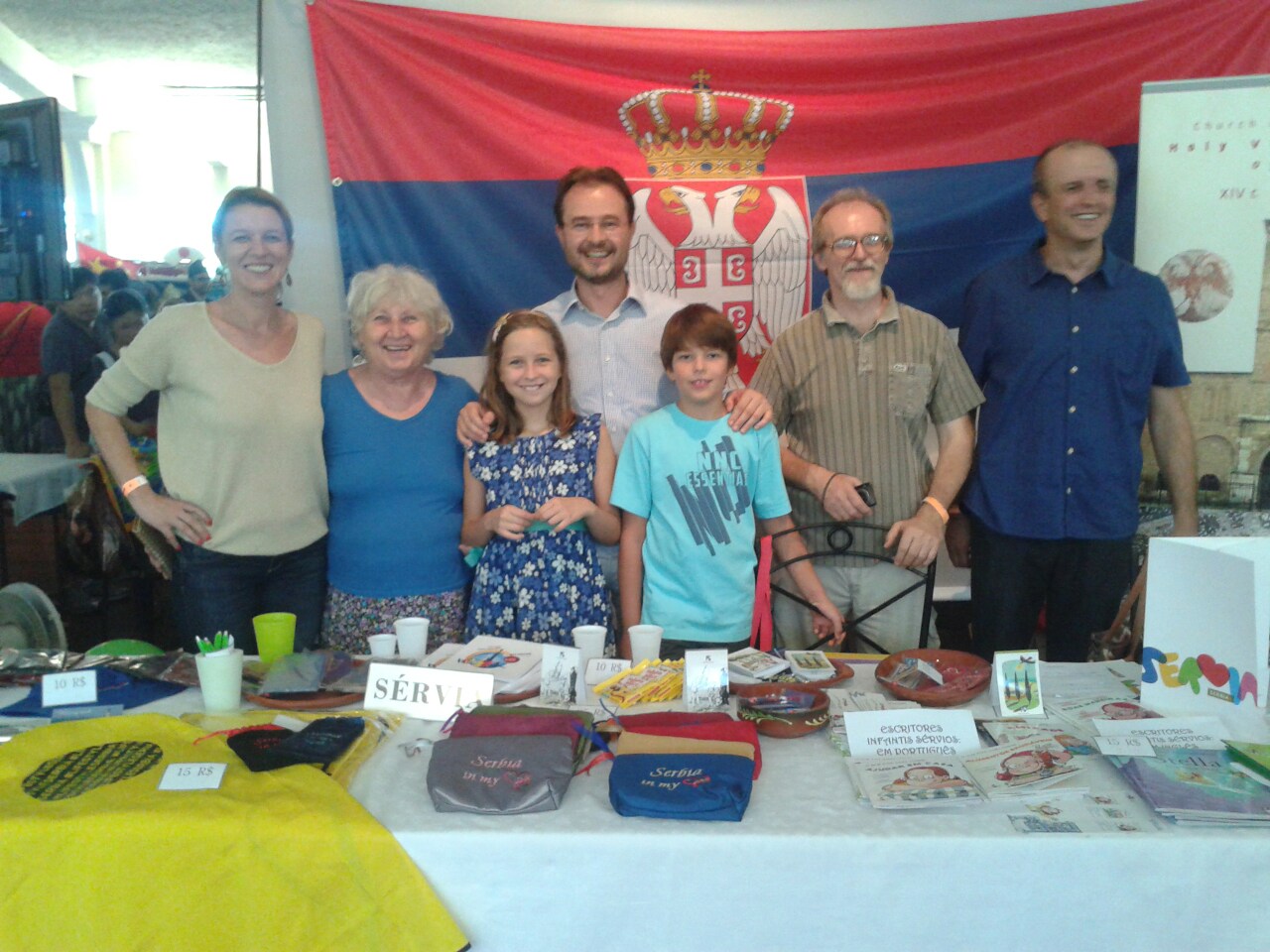
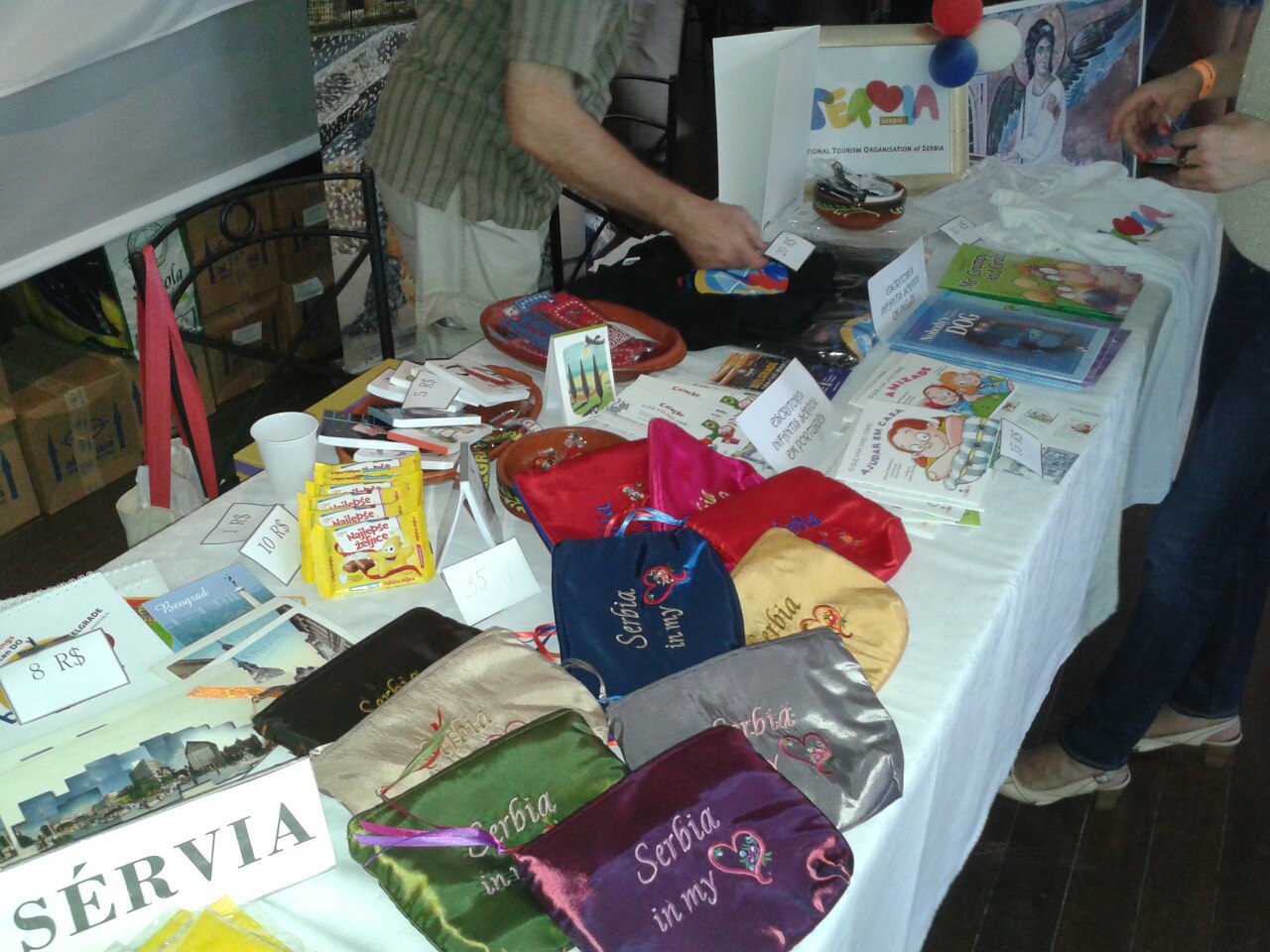
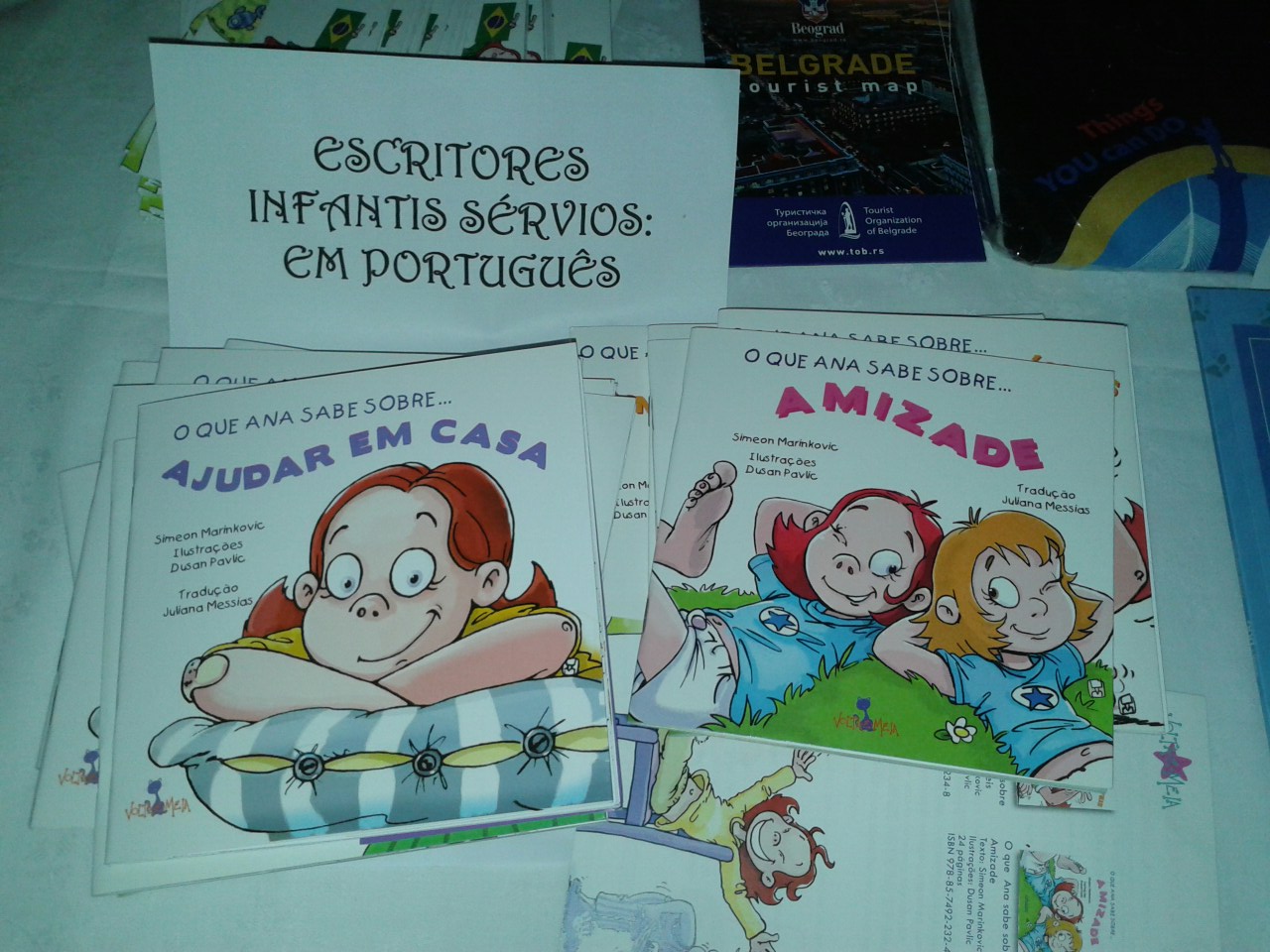 |
|
|
|
|
|